A to Z Album and Gig Reviews
All of 21 years ago, these two headlining acts unexpectedly combined their talents on a majestic (if admittedly very slightly flawed) collaborative album Freedom And Rain, which has since become regarded as an unrepeated - and unrepeatable - benchmark. At least that's what we all thought, until June and the mighty Oysters combo reunited specially for fRoots' 30th birthday gig at The Roundhouse, when the spark was so vital that a decision was made then and there to get together to record a whole new album asap.
And Ragged Kingdom, the result, has turned out every bit the equal of Freedom And Rain, inevitably informed as much by the performers' increased maturity and experience (and stature) in the intervening decades as by their own realisation that what they have together is something really special and different that both celebrates and complements what they achieve as separate acts. The delicate qualities of light and shade within June's unique dark-toned voice prove a brilliant foil for the legendary (and comparably sensitive in its own way) powerhouse energy of Oysterband, who have of late been honing back their power-chords and re-exploring their acoustic folk roots with a controlled vengeance.
All the elements come together on Ragged Kingdom to communicate the inherent drama of the songs, while striking an entirely believable, thoroughly contemporary balance between the folk and the roots-rock (for want of a better phrase) through exercising a deft selection of nuances that's harnessed truly in the service of the song. June's never sounded in better voice, I suspect, and it says much for the excellence of the production that the innumerable subtleties of her masterful interpretations aren't drowned out by the backings, which are quite often (but not by any means constantly) several decibels above her customary chamber-mode settings.
As for the material chosen for this new collaboration, well we're not just talking about traditional songs here. Some folk specialists will doubtless raise an eyebrow at the sight of the hallowed Joy Division number Love Will Tear Us Apart among the tracklisting - in his defence of which Oysters' Ian Telfer rightly posits that "modern pop has its own version of the oral tradition". but let's face it, eclecticism of taste has always been a hallmark of June's choice of material, and if Martin Carthy quite unashamedly embraces Heartbreak Hotel and Cum On Feel The Noize then why shouldn't June and Oysterband cover P.J. Harvey's That Was My Veil, especially when they interpret the lyric so knowingly?
But of course it's the realm of traditional song that sources the lion's share of the album's widescreen adventures, so to speak; the stage is set at the outset with a brooding, galloping account of Bonny Bunch Of Roses, which brings to the ballad an altogether different character of melodrama from the usual, more consciously respectful epic-folk treatment. Here, as throughout, despite the driven momentum and electric charge, there's a compelling degree of restraint to the proceedings in Oysterband's ever-thoughtful and considered accompanying gestures. Lighter mando-filled meanderings throw into strange relief the mindless blood-soaked violence of the call-and-response duet version of Son David, while June makes the most of the potent narrative of Shel Silverstein's Hills Of Shiloh with the aid of a minimalist acoustic guitar backdrop.
Another highlight, tellingly placed immediately after the sparsely-scored (cello and guitar) heartbreak of Love Will Tear Us Apart, is a rather moving acappella group rendition of (When I Was No But) Sweet Sixteen, learnt from the singing of Jeannie Robertson, which here acquires some attractive gospel-like overtones along the way. At the other end of the sonic scale come the fuller-on electric rock treatments: best of these is probably Judas (Was A Red Headed Man), which steers just the right side of bombast, retaining its drama with all instrumental strands from kantele to cello ringing out loud and proud in support of June's incantatory vocal. Maybe the more straightahead (Albion-esque?) folk-rock setting of Fountains Flowing springs fewer surprises, but it's an appealing interlude that benefits from June's unusual twist to the melody we usually hear; after which, The Leaves Of Life returns us with cantering hoofbeats and glittering mandolins to the folk theology camp, and the nail seems more firmly driven into tradition with a more orthodox romp through Dylan's Seven Curses before making the sublime trip to Dan Penn's Dark End Of The Street (a meaningful duet between John and June which forms an apt album closer).
Ragged Kingdom both sounds great (the trademark Al Scott production investing both clarity and presence in abundance) and looks great (some stunning photography by Judith Burrows adorns the package), and I'm sure it will prove to be as successful and influential as its illustrious predecessor.
David Kidman September 2011
I really don't think I can improve on the recent BBC Online description of June as "perhaps the greatest interpreter and curator of indigenous British music", and readers should need no persuading that each successive CD she releases will be worth one's immediate, and priority, investment. It can be no accident, either, that due to their alphabetical appellation, June's CDs will be destined to automatically remain on one's A-List!
Ashore, her 13th solo recording, is no exception, and affords her audience an aquamarine adventure par-excellence. It presents 13 tracks (11 songs and two instrumental interludes), each of which is in some way connected to the sea. These are neither easy nor comfortable songs, and, like the sea itself, can be dangerous: beware, for they're bound to immerse you rather than merely wash over you. Thus, the pinpoint accuracy of poised detail in June's performances enables the salty molecules to penetrate your skin with their cool, nay sometimes chilling passion. The impression of aloofness and severity that some folks get from June's stance is but the mature expression of her generous compassion and humanity, her unswerving integrity of purpose.
Musically speaking, the ebb and flow of the tides is abnormally accurately conveyed by the piquant instrumental backdrop to the first song, Finisterre, the exceptional Ian Telfer composition that first appeared on June's celebrated 1989 collaboration with Oysterband (Freedom And Rain). This new treatment is both outstanding and significantly mesmerising, and a hard act to follow – which June does stylishly with a brilliantly poised acappella rendition of The Bleacher Lassie Of Kelvinhaugh. A limpid, sanguine, in fact quite underplayed account of The Grey Funnel Line follows naturally, effacing even my fond memories of June's earlier, quite different version with Maddy Prior (on the Silly Sisters album). June later provides unique insights on another of Cyril Tawney's classics, the supremely wistful The Oggie Man. She also introduces us to the work of Shetland poet Jack Renwick through the grey, almost half-light tones of Winter Comes In (so beautifully conveyed in a telling chiaroscuro conjured by Andy Cutting and Mark Emerson), which is fast becoming one of my favourite tracks. And with her customary sense of idiomatic linguistic accomplishment, June also sings two contrasting items in French: the traditional tale of Le Petit Navire, and Le Vingt-Cinquième D'Octobre (a Guernsey-collected song which appears to explore, if obliquely, the Great Siege Of Gibraltar of 1779-1783).
Now, while noting June's practice of revisiting in full maturity songs she'd interpreted earlier in her career, it's also salutary to note the instances of "why hasn't she recorded this one before?", proving that there are still so many great songs out there. And it can often seem to take a lifetime for a singer to properly come to terms with a song and hone an interpretation with which he or she feels satisfied: Elvis Costello's Shipbuilding is evidently a case in point, for the uncommonly intuitive version enshrined on Ashore would, I would aver, be considered an immediate standout in any illustrious company. But even so, the indisputed highlight of this new collection is the final track Across The Wide Ocean: an epic, expansive, sprawling (close-on-12-minutes) treatment of the magisterial Across The Wide Ocean (which forms part of Les Barker's opera The Stones Of Callanish) on which June excels herself expressively in recounting the testimony of those forcibly evicted during the Highland Clearances of the 19th century, and her accompanists (notably Huw) excel themselves in parallel in portraying the incessant, restless momentum of the waves. June may have been photographed standing on the shore looking out to sea, but on this song in particular she feels to be more a part of the ocean itself and its swell, as well as literally inside the minds and bodies of the emigrants. This track is arguably the most extraordinary achievement of all those on the CD.
Against the overall great success of this CD I do have one small reservation, which applies in the case of two songs I've not yet mentioned – The Brean Lament and The Great Selkie Of Sule Skerry – on both of which June interpolates a rather didactic-sounding spoken passage that may well be more suited to a staged/live-performance rendition and becomes slightly intrusive on repeated home play. In the case of the latter more especially, June's very personal account of Child Ballad 113, both sympathetic and forthright in its re-telling of the legend, in which Huw Warren's strangely unsettling piano counterpoint (depicting a choppy, broken-rippled seascape) seems at first to be disembodied and disconnected, then gradually begins to make sense as the ballad progresses; to my mind, the spoken episode sits uneasily on June's thoughtfully classy (if thorny) interpretation and (I feel) blurs its impact at that point in the tale.
But to sum up: once again the oft-invoked model of classical perfection is the example by which June practises her art, but within that perfection is the indefinable element of necessary rubato that as with the best of lieder practitioners invariably marks each individual performance in time. Here again June remains right at the top of her game, with her vocal armoury (or should I say arsenal?!) ageless and intact; Ashore apostrophises its alphabetical (and allegorical) A-listing as neither affectation nor affliction but their antithesis: absolute aptitude and assurance.
David Kidman February 2011
It's back to the alpha-rich "apple-ations" (sic!) for June with this magnificent new collection, and straight to my year's A-list it goes too. There should by now be no questioning June's stature as simply one of the finest singers ever, one who transcends genre and whose approach to songs and their communication is a benchmark for any and every aspiring singer.
Here, on what is unquestionably one of her most intensely satisfying collections, she shares her love of songs that move her and for our delectation plucks some most exquisite fruits from the tree of tradition - which of course encompasses both ancient and modern writings. With typical thoughtfulness, June's choice of song-apples, like the very fruits themselves, invoke a myriad of associations ranging from sweet tastes and aromas, childhood innocence, cosy times, through to the rosy exterior concealing the worm burrowing within and the ripest fruit becoming soonest rotten; all metaphors for love and life, win and lose, subjects which June is famous for penetrating to their core.
We know that June is all too often (and totally unfairly!) accused of undue severity, so let me snuff that candle immediately by proclaiming that this new album is very much a healthy tapestry of light and shade, with a good share of more uptempo (dare I say fleet-footed?) material too. Indeed, it starts out not with doom and gloom but actually quite happily (or should I say 'apple-ly?!) with the sound of Andy Cutting's sprightly box playing introducing The Dancing (by Andy Shanks & Jim Russell), a wonderful composition piquantly conveying the excitement of the lady's prospect of romance at the Saturday night dance (sharing that lyric's theme with Stan Rogers' Lies and Bill Staines' Roseville Fair). And by heavens (you might say!), there's almost a moment of barely-concealed jollity (yes!) with June's light-tripping rendition of Child 279 (The Auld Beggarman), so enticingly contrasting with her matchless treatment of the traditional Scottish love song The Rigs Of Rye that follows in the well-considered sequence.
Back to the land of antidotes, and you can almost visualise June swirling Maddy-like round the stage on the Kalenda Maya dance that forms a delicious appendage to the archetypal trouvère chanson Ce Fu En Mai. Another standout performance comes with the spellbinding quality of expressive eloquence, and the sense of pace and structure akin to a classical Lied, that she brings to Burns' stern credo Speak Easy (and I marvel at Mark's really special piano accompaniment here, a model of subtlety and unobtrusive reflection of the sung part). The latter is rivalled, nay eclipsed, by June's unsurpassable interpretation of Lester Simpson's Standing In Line; here, with deceptively understated passion, she so unerringly conveys amidst its potent evocation of sepia-soaked imagery all the associated complex cocktail of emotions: all the bitterness, despair, barely controlled anger amidst that sense of brain-numbing routine and ... by jingo, if this doesn't get nominated for track of the year in the next Folk Awards there's no justice man! The album closer, Christopher Somerville's beautiful, gentle-waves-rocked sailors' prayer Send Us A Quiet Night, is just perfect. June's singing is peerless: precise yet not precious, and careful yet never in any way unresponsive.
I've said before that the controlled power and inherent poise of June's singing is breathtaking (pun intended), but she's definitely excelled herself in the company of the musicians she uses on Apples - the trio Andy Cutting, Mark Emerson and Tim Harries (also known collectively, and cryptically, as 1651). Needless to say June continues to be on splendid vocal form, and here she's come together with her accompanists to produce a uniformly mesmerising and utterly coherent album.
www.junetabor.co.uk
www.topicrecords.co.uk
David Kidman April 2007
June Tabor - At The Wood's Heart (Topic)
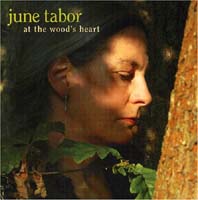
The curious thing is that even though you know that with a recorded artefact you'll get to hear exactly the same performance on each and every replay, you really do feel that June's responding to the song texts afresh each time rather than just wheeling out a predetermined response with exactly the same inflections and emphases. And another factor which makes this new CD so special is undoubtedly the close rapport that June achieves with the members of her backing crew; in a manner of speaking, June enjoys the best of both worlds with her collaborators, with gifted exponents of both what you might call "art-song folk" (pianist Huw Warren and violinist Mark Emerson) and (for want of a better term) "strummed folk" (ace guitarist Martin Simpson), all three being musicians with whom June's worked extensively in the past. And as if that weren't enough, on some tracks there are well-judged contributions from Andy Cutting (accordion) and Mark Lockheart and Iain Ballamy (saxes), and it's all reliably underpinned by Tim Harries' sensitively-moulded double-bass work.
June's careful adoption of specific instrumental timbres and combinations for voicing the mood and tenor of each song is remarkable and unerringly perceptive. For instance, there's a distinctly Schubertian air to the piano's short prelude to Ah! The Sighs (a 16th century song of courtly love), giving the piece more of a Romantic resonance than the basic acknowledgement of its source might normally call forth. Interestingly, this contrast is turned on its head when Martin Simpson's poised guitar accompaniment to Heart Like A Wheel invests that song with something of the character of a courtly troubadour ballad, allowing us to concentrate on June's heartbreaking (sorry, there's no other word for it!) interpretation of the lyric.
These are but two acute examples of the sheer intelligence within June's new interpretations of the songs presented on this CD. Just over half of the twelve songs are genuinely traditional in origin, and their selection was galvanised by the inspiration June gained from a series of concerts she undertook with this particular group of musicians including an In Session broadcast for BBC4. The repertoire June's chosen contains contrasts aplenty, too, with standout interpretations of Robert Burns' Lie Near Me (the album's final, extended track), Bill Caddick's powerful The Cloud Factory (June's always had a striking empathy with Bill's writing, as you know) and Duke Ellington's Do Nothing 'Til You Hear From Me (to name but three) interpolated with some slightly more uptempo fare such as Oh! Alas I Am In Love and The Broomfield Wager. Then, on classic folk standards like The Banks Of The Sweet Primroses, June's incredible innate talent for storytelling transcends the occasionally rarefied, quasi-classical nature of the song's arrangement and presentation (that description's a statement of fact, not a criticism, I hasten to add!).
So let's force those doubters who habitually think of June as a cool, unemotional singer to take a close listen to this CD, and prepare for the backlash - the sound of words being hastily eaten! So, without qualification, this often profoundly moving CD forms another dark and bitter masterpiece from June, and right up there on the 'A-List' in both the obvious and the oblique senses of the term.
David Kidman
This latest box-set to come our way from Topic celebrates the intense artistry of arguably the finest British female singer currently operating within what might loosely be termed the folk scene (her province is normally viewed as such by dint of convenience, purely because she has long operated primarily in acoustic music contexts).
June had been singing (and gigging) ever since her college days at Oxford (the booklet includes a page-stealing photo of "Tabor" captaining the St. Hugh's team on a late-1968 edition of University Challenge!), but her true recording career didn't begin until rather later, in 1976, and even then not as a solo artist but with Maddy Prior on the Silly Sisters LP.
The tiny handful of pre-'76 performances unearthed for inclusion on this box-set prove invaluable mementoes of June's early accomplishment as an unaccompanied singer of traditional song. The earliest recording featured here is A Week Before Easter (captured in 1971 by Andrew Cronshaw), and this gives a potent indication of her individual approach to pace and metre that even then was idiosyncratic, albeit encompassing both a mature approach to decoration and a quality of considered understanding that was rare for someone of her relative youth.
June's first solo album proper, Airs And Graces, initiated the Tabor Template by serving up what in appropriate restaurateur-speak might be dubbed "a traditional repertoire garnished with a few choice contemporary morsels". It also initiated - whether consciously or not - the enigmatic Tabor practice of beginning her album titles with the letter A (a device which, disappointingly, remains obstinately unexplained in the booklet, which otherwise contains more than a fair share of enticingly revealing snippets of background information).
It's probably somewhat of an over-simplification to observe that over and during the course of her career thus far, June has moved from being a classy interpreter and transmitter of songs mostly traditional, if accompanied then mostly by guitar (for an extended period of time her principal accompanist was Martin Simpson, indeed until he moved to the States in the late 80s), to being an equally superlative interpreter and transmitter of modern, composed song in tandem with her expertise in traditional repertoire, and accompanied most often by piano-based or, latterly, chamber-textured instrumental arrangements.
Folk song to art-song? Well no, not exactly, but it's a tempting analogy - at least until you begin to dig deeper into June's all-embracing talent for rediscovering folk as art. June's performing style mirrors her approach, in its precise diction, careful attention to detail and exemplary control and poise, whereby every syllable and nuance is weighed and measured yet never sounds coldly calculated. Her choosiness with regard to performing repertoire reflects her view that in contrast to a traditional song, a modern song, being "the creation of one person rather than an ongoing process", is presented to the performer as a finished article, and so she opines "if it isn't right for me" in that form, "then I don't touch it", an admirable policy; it works for her, though it may not suit all! In this way, June is enabled as the personification of the singer and the song; she conveys each and every song she sings as a personal experience. Martin Simpson provides a telling quote in this context: "The reason that June is such a good singer is that she can be moved and then get to the heart of the material that's moved her and chuck it right back out. She can really, really transmit pain, hurt, unfairness, anger. … (she) is capable of singing something very small indeed and making it appear big." So this deluxe box-set celebrates June as a consummate performer.
Tracks on the four CDs are not arranged in any sense chronologically, nor thematically, but the sequencing is intelligent and satisfying, with contrasts of dark and light and texture well managed. The set kicks off with a superb version of The Seeds Of Love - specially recorded for the project last year, the rationale for making it a lead track is clear, for as June says: "It's the sort of song that cries, 'Look at me again!' It's very easy to dismiss songs that you've known for a long time or you think are too commonplace." This track sets the pattern for what is to follow over the next five hours of listening. First, there's a goodly selection of classic and representative cuts, many of which - like The King Of Rome, Strange Affair, The Band Played Waltzing Matilda, A Proper Sort Of Gardener and A Place Called England (this latter track suffering, I felt, from over-exposure on the "Mr Harding sort of programme", if you don't mind my mixing my references!) - you couldn't imagine missing out of any June Tabor anthology.These acknowledged classics are sensibly interspersed with lots of tantalising previously unreleased selections (the latter category comprises 32 out of the 67 tracks, while a further five are taken from currently-and/or long-unavailable album releases). A number of these turn out to be live renditions of existing album tracks, often utilising different backing musicians or arrangements and invariably casting new light on the interpretations; Lal Waterson's Fine Horseman, the traditional Young Johnstone and Will Ye Go To Flanders, Richard Thompson's Pharaoh (a stunning 1989 performance with Filarfolket) and Mrs Rita - all these are really illuminating. There's one track from the relatively obscure We Died In Hell - They Called It Passchendaele album, a tremendously affecting "performance-piece" combining the testimony of auxiliary nurse Dorothy Nicol (spoken) with the songs Long Long Trail and (Bill Caddick's) The Reaper. Then there's a handful of top-notch outtakes or leftovers from album sessions, like The Royal Oak (an outtake from the exceedingly rare 1972 Stagfolk Live LP) and Roseville Fair (the priceless Les Barker variant, a Yelp! outtake), while still others - and herein are contained some of the finest examples of June's artistry - comprise rare performances of songs which June never got round to recording for album release.
The brightest jewel in this final crown, amongst many shining diadems, is undoubtedly a 1998 Purcell Room performance (with musicians from the Creative Jazz Orchestra) of Kris Kristofferson's Casey's Last Ride, which just stopped me in my tracks and literally reduced me to tears ("it's one of those songs", "a song of such heart-wrenching desolation", that had the very same effect on Martin Simpson too, we learn from June in the booklet). Other highlights include Virginia's Bloody Soil (a lone survivor from an aborted American Civil War-themed programme) and an extraordinary performance of Tracy Chapman's Behind The Wall, which further spotlights June's eclecticity of repertoire. She always used to pair that song with Bill Caddick's barmaid's song She Moves Among Men; the latter is itself probably the most surprising omission from this set, although Les Barker's priceless January June parody should have earnt a pride of place - while as compensation I'm glad to find that Les's variant on the Cutty Wren saga has been included here, demonstrating that June's reputation as a primarily "miserable, serious" artiste is ill-conceived as she so evidently relishes and rejoices in the genuinely humorous repertoire.
June's sense of timing and phrasing is as important in lighter material as in the more earnest fare, in the classic ballads and the torch-jazz standards alike, and there are plenty of examples of each to delight us anew here. The performances on these four CDs effortlessly demonstrates June's versatility and consistency of integrity, all without a trace of contrivance. Several times while playing through the set I was thinking "oh, I'd almost forgotten she did that so well too"! The hallmarks of a Tabor interpretation are there in abundance, and the tonal quality of her voice is unimpaired whatever challenges the song throws her way. Exquisitely stylish, June always dazzles with a quiet beauty and subtle shadings and expressively stamps her personality on the song with an intense but never overwrought passion and true feeling for the text in every case, whether it be a dramatic narrative or "a mere pop song" like Lou Reed's All Tomorrow's Parties. Then again, she'd recorded the acid classic White Rabbit for a Peel session, and there are moments (as in Pharaoh) where there's a Grace Slick-like quality of potent menace in her voice too. Indeed, part of the special stature of June's singing arises from the fact that she now sings exclusively in her low register (having abandoned her high register several years back), giving her voice a unique, cool depth. Interestingly, the set also includes, at the perfectly reasonable insistence of compiler David Suff, one purely instrumental track (Hug Pine) emphasising the importance to June of her current accompanists Mark and Huw.
Finally, mention must be made of the high-art standard of the presentation of this box, whereby the booklet not only excels in its particularly well-balanced overview of June's career thus far (by Ken Hunt), including some fascinating interview extracts, but also contains some stunningly beautiful and highly artistic photographs by John Haxby that provide the binding framework for the text and ancillary archive photos. So, how to sum up? Well, in the true spirit of Tabordom, I'll just say, as in the words of the "A" Team, that Always, as an ambitious anthology, absolutely astounds!
David Kidman
Taiko to Tabla @ Ocean, Hackney - 5th April, 2001

'Taiko to Tabla' is two world-class percussionists, 40 drums on stage and a skin-tingling, mind-blowing and brilliant fusion of Indian, African and Japanese drumming. This is expressive and musical drumming at its aural and visually thrilling best.
I'll paint you a picture. Pete Lockett (tattooed arms, plaster-protected thumbs and forefinger, fair hair flying and shoeless) attacks his drums with passion and purpose alternating with sensitive singing drum patterns from fingers (the tiny tambourine-like Kanjira from south India, pitch bending with one hand whilst drumming with the other) or voice accompaniment to finger drumming on a frame drum (reminiscent of scat singing. There is a name for this and I know someone will enlighten me).
Joji Hirota conjurs up the spirit of Buddhist temples with bowed brass gong, bamboo flute and resonating prayer bell. He is intensely in control of the elements: you 'hear' the birdsong, water falling on stone, the sound of distant thunder as bongos and taiko take you to a stormy crescendo.
Together they weave, oppose and compliment one anothers techniques. Their Heartbeat finale, playing the huge Japanese Taiko drums with sticks, is like a display of martial arts or an army at war. The two of them drum in powerful unison until every atom of the venue is vibrating in a huge technicolour soundscape. Outstanding!
Pete Lockett's exploration of rhythm and texture by way of skin, wood, brush and vocals has taken him to several continents and many collaborations, including Network of Sparks with Bill Bruford, with DJ Luke Vibert & pedal steel master BJ Cole, and with Sin E's Steafan Hannigan. There's much more to know and appreciate about this master magician and the rhythms he conjurs. I recommend the following albums, a visit to his website and to get out there and see him 'live':
Network of Sparks featuring Bill Bruford: One (MELT2000) and Taiko to Tabla recorded live at the Bruges Festival (Zoka-EMI)
Sue Cavendish
Springsteen drummer Max Weinberg reckons; the 20 year old Canadian singer-songwriter is the most exciting talent he's come across in years. I'd have to say he should get out more, but on the evidence of his debut album Taerk (pronounced Turk) certainly has something going for him.
Crisply produced by Terry Brown, although Grace borrows some reggae drum stylings and People In The Room has 70s soul elements, the default mode is guitar based roots rock, built around big anthemic melodies and delivered in a clear, confident ringing voice that, while a bit harsh at times, has hints of the young Bruce Cockburn in its intonations.
Lines about sitting in school listening to someone else's robotic rules in Smell The Roses or 'she's my...little snow white dove' on My Angel suggest he could do with a little more work on his lyrics, but numbers like the driftingly dreamy Hopelessly, the choppy rhythm Virginia where he conjures a twangier version of Turnstiles era Billy Joel and the rousingly anthemic, stadium aspiring Start Again are ample proof that he has the makings of a real song-writer.
Mike Davies September 2011
Henry St. Claire Fredericks - aka Taj Mahal - is a long-time icon of the blues and roots scene, who rose to prominence in the late-1960s largely through his work with Ry Cooder and a series of widely acclaimed and influential solo albums. His Massachusetts upbringing exposed him to a veritable gumbo of musical influences, which he carried through into his own eclectic brand of blues, folk and gospel that took in indigenous musics from Afro-America to the West Indies along the way. The Real Thing is the 1971 album that was recorded live at the Fillmore East , which places Taj in the role of charismatic band-leader and soulful front-man on a generous hour-long set that takes in the occasional solo country-blues offering (Fishin' Blues) amongst the deliciously brassy bigger-band outings where Dixieland and swamp meets stewball R&B and including a couple of significantly extended jams which showcase a good-time vibe alongside the expressive versatility that was (and still is) such a hallmark of Taj's musical personality. Passionate and driven, yet at the same time relaxed, this set is a paragon of its type, with universally excellent performances from all ten musos involved. This timely new reissue of the album (licensed from Sony) is well presented, with notes which maintain a sensible perspective and give just enough detail to satisfy. If you don't have it already, then don't pass it up this time round.
David Kidman June 2008

Talbot's fourth album both consolidates and develops the success of 2010's The Last Star. Vocally, she sounds even more lusciously attractive than ever, but the most notable advance she's made in the intervening couple of years is in the sphere of songwriting, nowadays as often as not teaming up with John McCusker and/or Boo Hewerdine. And that's the modus operandi for several tracks here, including the gorgeous Rusby-like closer Arcadia, the swirling Parisian-café waltzer title song (with Hewerdine) and the playful, skittering jazzy-ska Will I Ever Get To Sleep? (with McCusker). In fact, the only solely-Talbot composition on the disc is the tender, bittersweet torch-ballad-style I'm Not Sorry.
Other joint compositional ventures here include Button Up, a co-write with King Creosote (Kenny Anderson), on which the two duet, and sensitive album standout The Loneliest, co-written with (and done as a touching duet with) Louis Abbott of Scottish indie-folksters Admiral Fallow, this latter cut's sparse backdrop featuring just Mark Knopfler and John McCusker.
Two tracks feature bluegrass maestro Tim O'Brien: the co-write Wine And Roses and an arrangement of the traditional When The Roses Come Again, the latter also featuring the voice of Julie Fowlis. And yet another pair of tracks incorporates the lovely voice of Karine Polwart: these being the old-time-flavoured Dearest Johnny (which also features Dirk Powell on banjo and fiddle) and New Cajun Waltz (the start of the melody of which bears an uncanny resemblance to Sandy Denny's old-fashioned variety).
Having expended a couple-hundred words on ostensibly invidious (but rather necessary) namechecking of Talbot's fellow-travellers and collaborators, it might now seem somewhat of a miracle that her own musical presence still manages to provide the album such a startling degree of musical unity. Of course this is down to her sweet (but not cloyingly so) and pure singing voice, which on quite a number of occasions it's impossible to resist comparing (favourably) with the aforementioned Kate Rusby. With whom, it turns out here, she audibly shares much common ground, in terms of the key involvement of a number of musicians who've previously collaborated with Our Kate (including Ian Carr, Michael McGoldrick, McCusker, Neil Yates and Donald Shaw), as well as the likes of Phil Cunningham, James Mackintosh, Ewen Vernal and Jerry Douglas. These fellows' presence alone ensures top quality musicianship, of course, and they all contribute meaningfully to the appealingly arranged demeanour of the CD as a whole – which should not be taken to imply any lack of substance in the music. Far from it, for this is a confidently outgoing yet also quite intimate personal statement from one of the scene's most enchanting voices, who should not be criticised for making particularly good use of a circle of super-talented friends.
David Kidman February 2013
After Heidi's "impossibly lovely" third album In Love And Light (2008), and her subsequent appearances on CDs by other artists (McCusker-Drever-Woomble, Michael McGoldrick, Boo Hewerdine, Eddi Reader), album number four has been even more keenly anticipated.
The Last Star finds Heidi now firmly ensconced on the "nouvelle Scottish" scene in Edinburgh, and although her singing – especially in matters of intonation and lilting phrasing – is still informed by her past life with Cherish The Ladies the dominant impression here is the fit-for-purpose blend of singer, material and arrangement, complementary almost to a fault (and that's not meant as a criticism). Heidi's vocal assurance is both matched and directly inspired by that of her musical companions – you guessed it: Messrs McCusker, Carr, Vernal, Shaw, McGoldrick, Yates, Dodds and Mackintosh, with more-than-occasional appearances by Phil Cunningham, Andy Cutting, Kris Drever, Alan Kelly, Boo Hewerdine and John Douglas, and Eddi Reader and Karine Polwart providing some harmony vocals.
Once again, it's a mellow, intimate set of recordings, predominantly sweet in character (this quality deriving mostly from the timbre of Heidi's voice) but, it must be said, not without a necessary degree of fire. The balance of material is weighted roughly (just) in favour of the contemporary writing, but Heidi's adaptations of traditional songs (in conjunction with members of her team) are persuasively managed. And Heidi's now developing a talent for songwriting too (in creative as well as personal partnership with Mr McCusker), on the evidence of the coquettish, charmingly bittersweet and quirky Tell Me Truly, the deep, if finally understated desolation of the title track, and in contrast the comforting Start It All Over Again, the latter composition finding a soul-mate echo in the disc's final track, an ably sensitive cover of the Sandy Denny tearjerker At The End Of The Day.
Heidi's treatment of Kris Drever's composition Hang Me, in contrast, is altogether more sparely contoured, and shows her to be equally capable of expressing more melancholy sentiments (I can't avoid hearing more than a touch of Waltzing's For Dreamers in there too). And the broodingly insistent pounding tomtom rhythm and brass backing adds a slightly ominous tone to Boo Hewerdine's Cherokee Rose. The prevailing mood of the record, however, is one of delicate emotions and gentle opulence, in the midst of which a real shock to the system – albeit a thoroughly pleasurable one – comes with the two uptempo tracks: a vigorous rendition of the shanty Sally Brown that has a spicy brassy kick, and an exhilarating, animated jig-style treatment of Bleecker Street.
I can't praise highly enough the various musicians' contributions, which fit Heidi's singing like a glove yet still allow scope for judicious licks and fills (Ian Carr is especially inventive in this regard, I find). In all honesty, there are still isolated moments when it's impossible for Heidi to completely escape the superficial "Kate Rusby with an Irish accent" tag, notably on songs like The Shepherd Lad (Karine's adaptation of a traditional narrative which bears a distinct kinship to Clyde Water) and occasionally when singing in her middle-register. But all through The Last Star Heidi remains very much her own woman, and here she's given us another immensely satisfying personal statement that eclipses even the magic of In Love And Light.
David Kidman October 2010

Brought up in Co. Kildare, Heidi moved to New York with her brother at age 18, then in 2002 she had a lucky break when she was invited to join Cherish The Ladies when their then lead singer Deirdre Connolly left the band. Since which time, she's subsequently relocated, initially to Ireland and then to Edinburgh, and herself finally left the band last year. In Love And Light turns out to be Heidi's third solo record, and on this showing I can't imagine why the previous two never reached me for review.
This latest is an impressively assured collection, with the focus this time in the main falling on songs by contemporary writers (Tom Waits and Boo Hewerdine being the best-known) and drawing from a diverse spectrum of influences. Heidi also gives us sparkling renditions of three traditional songs, of which Bedlam Boys is especially vibrant in its reel-rich setting. While the primary purpose of the album is naturally to showcase Heidi's typically "awestruck and tender" vocal timbre, her thunder is almost stolen (albeit quite subtly!) at times by her "core backing band" comprising Boo Hewerdine, Neill MacColl, Roy Dodds, Ewen Vernal, John McCusker, Michael McGoldrick, Donald Shaw and Andy Seward, with guests on specific tracks including John Doyle, Eddi Reader, Rosalie Deighton and Ivan Drever (the latter duetting with Heidi on The Blackest Crow).
Heidi's voice has been described as "impossibly lovely"; her phrasing is smooth and largely intuitive, much like you'd imagine an Irish Kate Rusby might sound (that's meant as a compliment to both ladies!) - this is specially apparent on her treatment of Glenlogie (the "Dick Gaughan version"). There's also a distinctly Rusby-like soft-focus air to the musical arrangements on the majority of the tracks, with light and airy textures skilfully managed, though the additional string section on If You Stay is perhaps a tad obtrusive. The best of the songs suit Heidi's approach down to the ground and need no special pleading: J.B. Goodenough's fond Parting Song and Tom Waits' tender Time work especially well, as do the pair of Boo Hewerdine songs (Invisible and Everything), and the Tim O'Brien/Darrell Scott song Music Tree. Less successful to my mind are Whispering Grass (no contest with the celebrated Sandy Denny version!) and the disc's rather cloying finale When They Ring The Golden Bells. The arty design and presentation of the digipack housing the CD are intended to be a selling-point I'm sure, but I find it less appealing simply because the typeface used is rather fussy and cramped and not at all easily readable, and the booklet reprints lyrics for only seven out of the 12 songs (presumably for copyright reasons?).
www.myspace.com/heiditalbotmusic
www.heiditalbot.com
David Kidman February 2008
Record companies have had a field day releasing 'remastered' CDs of classic albums but the value provided to the listener can, sometimes, be questioned. In this first batch of Talking Heads releases, some benefits are immediately obvious as 'Talking Heads: 77', 'More Songs About Buildings And Food', 'Fear Of Music' and 'Remain In Light' arrive in a CD/DVD format. The CDs all contain additional tracks and the DVDs have 5.1. Surround Sound for those suitably equipped as well as some added videos.
I'm sure that I don't have to spell out their legendary status. They are a band without comparison because nobody sounds at all like them. Though they have influenced many others from their contemporaries such as Gang Of Four to the modern day Franz Ferdinand. Taking each of these in turn, let's look at the detail.
'Talking Heads: 77' arrived at the start of the punk era with a staccato style and a true classic in 'Psycho Killer'. As a debut album, it was staggering and is found here in all its splendour. To complete the picture, there are the singles or b-sides 'Love = Building On Fire', 'I Wish You Wouldn't Say That', and 'Psycho Killer (Acoustic Version)'. Add to this, the hitherto unreleased 'I Fell It In My Heart' and 'Sugar On My Tongue' heard for the first time on an earlier compilation. Great additions to the original record.
'More Songs About Buildings And Food' is less rewarding in terms of the additions with alternative versions of 'Stay Hungry', 'I'm Not In Love', 'The Big Country' and 'Thank You For Sending Me An Angel' that are interesting but not essential.
'Fear Of Music' was the record that loosened any links to recognisable musical influences and set them apart from the pack. Here, the additions provide tastier alternatives with growling guitar being layered over versions of 'Life During Wartime', 'Cities' and 'Mind' sat alongside the intriguing, unfinished 'Dancing For Money'. These are worthy alternatives that might have been preferred at other points in their career.
'Remain In Light' threw funk and world music into a musical pot that was already rich and distinctive. Unfortunately, the four additions are all unfinished outtakes with 'Fela's Riff' flagging up where their influences were coming from at this point.
So, as you'd expect, the additional tracks are variable though they all offer interest to the Talking Heads fan. If there is a disappointing element to this first batch, it is the rather dull videos that are all from live appearances. However, bleating at this is pretty churlish given that these double discs are currently available for under ten quid. Roll on the next set of reissues from them.
www.rhino.com/artists/talkingheads
Steve Henderson
Talking Heads fans have, hopefully, perused my trawl across the first batch of CD/DVD issues - if not, take a look there because I don't want to repeat myself here! You can check out formats and chat of their legendary status in that Netrhythms review. Let's get down to the nitty gritty here.
The first one in this second batch is 'Speaking In Tongues'. It was their last release for WEA Records and a point in their career where rumour suggested that the band started to fall out. Certainly, some of the material is fairly lightweight and hardly at the cutting edge of earlier records. It was the dawn of the drum machine and the disco beat in their music. It sparked bemused comment from some disconcerted fans. However, it does contain the mighty 'Burning Down The House'. There are remixes of this track on the CD and DVD as well as a video on the latter but it seems to be one for the completist.
Their first record for EMI, 'True Stories', seemed to suggest some slight recovery with the drum machine despatched for use with offshoot The Tom Tom Club. However, the album still had some filler material and the extra tracks - yes, even the Pop Staples version of Papa Legba - are pretty disposable. The main plus is that the DVD contains the promo videos as opposed to live versions of the songs.
With their next record, 'Naked', there was something of a return to form with Mr Byrne's interest in South American music seemingly introducing a funk that had been lost amongst the studio gadgets. Unfortunately, the extras here are pretty limited with interest only added by some more music video promos.
With the last release here, 'Little Creatures', that return to form was sustained and provided one of their best-known songs, 'Road To Nowhere'. This CD/DVD includes an early version of the latter as well as an early 'And She Was'. If you're a big fan of the song, the DVD contains the music video, too.
So, all in all, the second batch isn't as enthralling as the first batch and might suggest that the Talking Heads fan pulls down the 'Storytelling Giant' video from their shelves with all their promo videos on it - what price this available on DVD soon? On the other hand, if you wish to explore their back catalogue further, why not start here with these cheap CD/DVD combinations.
Steve Henderson
Getting a full release after being available for some time as downloads from his website, these cds are ample evidence that James Talley's talent and musical vision remain intact more than thirty years after his debut recording. His vision is to bring us tales of ordinary lives - his own and those he works among - and to mark in song the familiar trials and tribulations that most of us would recognise.
'Heartsong' is James' first release of new songs since 2000 and demonstrates an undimmed ability to write simple direct songs which he then dresses up with quite lovely arrangements of grace and subtlety. All his influences are here: swing, country, folk, blues and even some rock. All of these are stamped with his warm, laid -back baritone. Frustratingly, at times, he has a tendency to sing in stacatto phrases which is a shame because when he connects the phrases you could bathe in the warmth of his voice. On occasion here he sounds remarkably like Willie Nelson - that nasal twang - but mostly he sounds remarkably unchanged from that 34 year old debut record.
As a performer, he's definitely on the mellow side which might lead you to overlook the steel core at the centre of his music. There's sentimentality here and overt Christianity but in his own quiet way it's a radical Christian message that Jesus himself might recognise. On 'Cold Blooded Killers' - a country blues song if there ever was one - and 'The Most Influential Teacher', which has a blunt directness of language that George Orwell would have been proud of, James makes clear his disdain for those in power who would wrap themselves in their bibles whilst pursuing the most un-Christian behaviour.
'Journey - The Second Voyage' is part two of some live recordings made in Italy in 2002. Performances of songs that cover his entire career, the first selection was released previously as 'Journey'. (Cim1012). This second batch of songs has been added to in the studio to flesh out the sound but still retains the warm feel of a performance and features some beautiful musicianship. In fact, throughout both of these albums I'm reminded of liner notes Mike Nesmith wrote back in the 70's in which he said - to paraphrase - that his aim was to achieve the purity of intent and execution that Jimmy Rodgers and Hank Williams achieved in their time.Making it look easy is where the art lies, and that's what James Talley and his musical pals pull off.
John Davy September 2009
James Talley - Got No Bread, No Milk, No Money, But We Sure Got A Lot Of Love (Cimarron Records)
"30th Anniversary Edition" of the original 1975 issue, this cd comes with a bonus cd of a radio interview recorded at the time that lends an insight to the background of James Talley and his music. Apparently the record made quite a splash at the time, it's simple directness contrasting hugely with most other Nashville product of the time. Sadly, perhaps, for James Talley, it didn't lead to a lasting career as a musician; though still writing, he's had to earn his living in other ways. He takes a deep pride, though, in being a working man, working alongside ordinary folk, so maybe he's happy enough that that was how life turned out for him.
Described in contempotary reviews as country-folk, these songs straddle those fields of music as much, and as well, as any other record you might care to name. The album opens with a swinging tune motored along by Johnny Gimble's fiddle that celebrates Talley's Oklahoma childhood and the Saturday nights when they would dance to "W.Lee O'Daniel and the Light Crust Doughboys". Lyrically, that about sets the tone for the rest of the album: celebrating the simple rhythms of working people's lives, people living on dreams and the love of family, Saturday nights and finding the good gal who'll make your life complete. So far, so sentimental, and the sweetness of the singing and the arrangements re-enforces that sentimental sound. Thirty years on when we've embraced the darker moods of alt. country this might seem a bit cloying for modern tastes, too close to John Denver for comfort. There is, however, a rugged spine to these songs, a rootedness in real lives that means they deserve their place of honour in the line that leads from Woody Guthrie to where we are today. "Give Him Another Bottle", for example, is a simple expression of fellow feeling for an ex-railroad man begging dimes on the street corner after an accident cost him his livelihood and his happiness. So, "Give him another bottle, let him ease his mind". And whilst the Nashville mainstream would have given this a slow sickly over-sweet arrangement, Talley and his fiddler turn it into a fast-chugging railroad song, a celebration of the drunk's earlier life.
Elsewhere, he gives us his take on "Red River Valley", beautifully played and with an added verse of his own in the middle; the famous tune is abandoned for a sparse dreamy sequence at that point in a songwriting experiment that reminds me of stuff Don Maclean was doing at the time, all of which makes it about as "folk" as you can get in an American context. Not content with that , "Sing Song Kitty", which I only knew from Doc Watson's version, turns up with different words - nonsense and otherwise- as "Daddy's Song", and sounds just great. It seems there are as many versions of that song as there are households that sang it.
Throughout, the playing is warm, lively and sensitive and Johnny Gimble's fiddle is a particular delight; recording back in 1973 was a protracted and informal affair and the core musicians were augmented by more than a dozen others who "happened by", including a young John Hiatt who contributes the lead acoustic guitar on one track. All in all, a quiet delight.
www.jamestalley.comJohn Davey
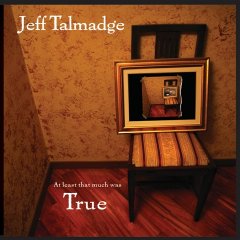
For his latest release, Jeff Talmadge has gathered some of Nashville and Austin's top musicians and produced an album that is as gentle as it is deep. Texan Talmadge has a rich experience to draw on for his poetic songs and has worked as a janitor, a Capitol Hill Congressional press secretary, an associate scout for a major league baseball team and a board-certified lawyer. He opens this, his second album for CoraZong, with Never Saw It Go. This is Alt. Country and very easy going. Let Her Go showcases Talmadge's velvet voice and is some more easy going Country. Wrong Train sets me to thinking that it is going to be gentle sounds all the way through the album. This guy is so laid back and the idea for the song came from a time that he caught the wrong train in Groningen in the North of Holland. He says that he enjoyed the journey even though he was going in the wrong direction and sometimes in life we have to go in a different direction to reach our destination. Austin When It Rains has an obvious drumbeat! However, it picks up only slightly from those that have gone before but does have a sense of melancholy. Bob Dylan's Girl Of The North Country is played as a lonesome cowboy song with obligatory wailing harmonica. Talmadge says that this is one of his favourite Dylan songs and that he'd always wanted to record it. He should be pleased with the result as the band plays as one.
Because Of You gets him out of first gear - almost. Like the others, this skirts the area between folk, Americana and Country. Train From Amsterdam slows things back down again and is just so easy to listen to. This song came from his thoughts about how much his life had changed whilst on another train in The Netherlands. White Cross remains firmly in the slow lane and mixes Americana with Country. In the US it is common practice for people to place small white crosses at the scene of road accidents and it was spooky that both Talmadge and his friend, Claudia Russell, were both working on a song on this topic at the same time. They thought it would be best if they collaborated and the result is here. So The Blues Would Stay is Americana and very slick. Scrapbook is an almost seamless transition from its predecessor and keeps up the gentle theme. This idea came from Talmadge thinking that every place he visits is like turning the page of a scrapbook. The slightly jazzy Chet Baker Street closes the album and Talmadge doesn't crank it up, even for the last song. This album is perfect for when you have a few friends around and don't want the music to completely drown out the conversation but still want to raise a few talking points.
David Blue August 2007
Texan singer-songwriter Jeff writes strongly and powerfully, much in the tradition of Townes Van Zandt and Guy Clark (those especially called to mind) - well at least that's on the evidence of Blissville, which would seem to be Jeff's fifth CD release. I was very much taken with the warmth of Jeff's idiomatic, honest, intimate, sometimes half-spoken vocal style, and by his plain-speaking and simply evocative lyrics. He cloaks his stories of regret and oblique reminiscences in attractively homespun and often decidedly ironic philosophy, a fetching combination that yields as much intellectual as pure listening pleasure. Examining the liner notes, though, Blissville would also seem to be, at least in part, an anthology of sorts, for it's stated that of the album's thirteen tracks, three had originally appeared on Jeff's 2001 album Bad Tattoo, whereas a further two are from 1999's Secret Anniversaries and two others from 2000's The Spinning Of The World (the versions here differing in that they benefit from remixed vocals, it says). That leaves just six tracks having been newly recorded in 2004. But whatever the provenance or vintage of the songs here, Jeff's output is heard to be mightily consistent and always better than likeable, with the more recent tracks in particular really characterful in a soft-edged alt-country mode that's often reminiscent as much of the rootsy mid-period Band albums as anything else. Backing musicians never let Jeff down either - no worries when they're of the calibre of Larry Seyer, Gene Elders, Bradley Kopp, Tim Thompson and Chip Dolan. Blissville sure makes you want to hear more of Jeff's work; indeed, I can't quite fathom why he'd never appeared on my own personal radar before.
David Kidman
Jeff Talmadge - The Spinning World (Bozart Records)
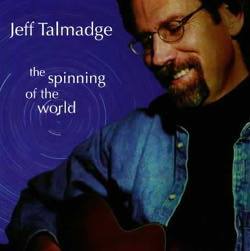
Singer-songwriter, acoustic guitarist Jeff Talmadge is an impressive talent from Austin, Texas who we haven't heard of this side of the pond for the usual reasons: own label, no distribution, no PR company, no UK tour and no national radio play. We are privileged at NetRhythms that sometimes we get sent music that we wouldn't otherwise get to know about. Who is Jeff Talmadge? His website gives a little background information about the man, 'Associate Baseball Scout for a major league baseball team, Capitol Hill spin doctor, award-winning poet, practicing lawyer... Jeff Talmadge is a man of multiple talents and many hats.' The musical 'hat' he wears is the one you guess he likes to be recognised in - and so he should!
The Spinning World is an album of polished songs which I've found easy to play again and again and hard to chose a favourite from. Care and craftsmanship are evident throughout - the lyrics are sharp and insightful, wry and witty, the musicianship (with the assistance of Stephen Bruton on slide guitar, mandolin and mandola) is excellent and on the twangy side of folk, and the backing vocals from Iain Matthews and Eliza Gilkyson are a joy. Throughout the collection of eleven songs the professional production (by Bradley Kopp) is bright, full and warm with acoustic guitars, gentle bass and percussion, strings (cello and violin) and touches of accordion and harmonica.
His latest release, Bad Tattoo, which I've yet to hear, brings back several players from The Spinning World plus (and she's always a 'plus') Annie Gallup on backup vocals. Want to hear more? You may download soundclips from his website before clicking on to Amazon.com for the real thing. We may live in a spinning world but Jeff Talmadge's albums are for those important 'time out' moments - lay back and enjoy!
Sue Cavendish
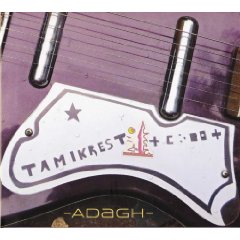
Singer-songwriters of the Saharan desert, the Touareg ex-rebels Tinariwen, birthed distinctive blues grooves - intense and enthralling - now taken up by the young seven-strong Touareg blues-rock band Tamikrest.
Their name "Tamikrest" is Tamashek (the Touareg language) for "union" and "knot" - a symbol for the desert, language and culture which unifies and binds them.
And unified they are. A western band might be considered "tight" but Tamikrest are another thing entirely. The slow-paced caravan of bass-driven rhythms, electric guitars, tunes layered with claps and harmonies punctuated by the ululation of female backing singers (and even echoes of the Eagles and a few reggae beats), become trance-like. Tamikrest's début album "Adagh" (another name for the Touareg) is a wondrous work of hypnotic beauty.
The words of lead vocalist of Ousmane Ag Mossa in the Tamashek language seem totally comprehensible to the Western heart, even if to the ears they aren't. It's the universal voice of pain and passion of struggle, of war, the beauty of the desert, of travelling grooves and - ultimately and hopefully - prayers for freedom. If you need an actual translation, the sleeve notes are also in English and French.
Sue Cavendish February 2010
Tamikrest are appearing at the Borderline on 19 May 2010
Tamikrest - Double bill with Dirtmusic
The Borderline, Orange Yard, Off Manette Street, London W1D 4JB
Admission: £10
Borderline
John Tams - The Reckoning (Topic)
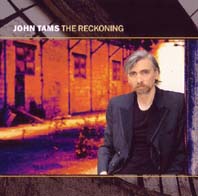
David Kidman
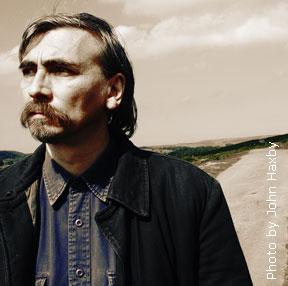
John Tams rocks - oh, yes he does! You don't believe me? You think he's all songs of desolation, Napoleonic adventure and industrial turmoil? Think again, my friend. Just as it was surprising to realize that Unity, the album before this, was Tams' first solo outing, it's still a little shocking that, with more than 30 years' experience and a hand or two in at least one of folk-rock's seminal albums, Home is only the second collection to carry the Tams monicker.
And, as might be expected, he's learned a thing or two with all those years under his belt. One of those lessons is to keep your material varied, for that way is the path to holding the attention of your audience. Thus, possibly with that thought in mind, he's penned some stirring uptempo firecrackers and sprinkled them, like hundreds and thousands, across his latest home-baked offering. The first of them, to draw the punters in, is track number one, You don't know me anymore. With telling, hurting observations, it concerns a man's realization that the relationship with his lover has lost its spark. But, though the song brims with sadness, it's sung to a strident beat pushed along by Keith Angel's drums, swollen by the lovely rich tones of Alan Dunn's Hammond organ and lifted by the first of many fine lead guitar breaks from Graeme Taylor.
In stark contrast to the (superficial) happiness of the album's opener, track two is like a damp, overcast afternoon stood among the ruins of a derelict northern mill. It's called Another grey & grim old grimy day - he'd be hard-pushed to find a more forlorn title - and I love it. Featuring just Tams - singing and playing guitar, bass and keyboards - and Angel, it's dark and doomy, with the percussionist really coming into his own. His marimba soaks through the melody with all the persistence of a relentless drizzle at the same time as his staccato drums seem to mimic short, sudden downpours. The song has a bleak beauty that's hard to ignore.
In The ballroom, Tams slips into his pumps for the first of two songs marking the lure of the dance. Littered with characters looking for something they'll not find in this palais de danse, the song's filled with a sadness not entirely bereft of hope. Dunn again shines, initially on piano accordion and then with a delicious Hammond organ pattern filling the latter half of the song. Red gown starts with Tams' acoustic guitar and vocals, and the organ, this time played by Barry Coope, before Taylor lets rip with a perfectly measured lead break. Unlike The ballroom, the lyric is filled with the excitement and expectation of an evening's fun: "Throw away your troubles, lose them one by one and come on put your dancing shoes on".
But it's historical ballads at which Tams excels and Home has a belter right at its heart. Track five (of ten) Hugh Stenson & Molly Green, tells how a love-struck soldier of King George becomes a deserter to be again with his girl, Molly Green: "She is a beauty I do declare, she come from Highchurch in Shropshire. She was an angel all in my eye, which made me from my colours to fly". He is eventually betrayed, court martialled and executed with a timely warning to all young men who fall in love. Other top-notch tracks on a top-notch album are: Right on time - Tams solo with his acoustic guitar - The traveller and Bound east for Cardiff.
It may say John Tams on the front of the package but due credit must go to his fellow players, each of whom more than earns his crust here. In addition to the already mentioned Taylor, Dunn, Angel and Coope, Andy Seward 's bass is bang on the money throughout. Home is an album that reveals new treasures with each play. It's a natural progression, and a more than worthy follow-up, to Unity and it's stating the obvious to say that any who enjoyed Tams' first album will love this. JT call Home (sorry!).
Fred Hall
John Tams, Graeme Taylor, Chris Coe et al. - NO. 47: Music Of The Good Hope (T2)
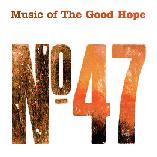
The recent National Theatre production of the play The Good Hope, relocating the tale in Whitby, provided the vehicle for a new musical collaboration between Messrs Tams and Taylor (reunited in an echo of former Home Service and Albion Band glories), providing a telling 17 minutes' worth of soundtrack that's recorded here. They've roped in the talents of Chris Coe, Alan Dunn, Charlie Hart and Clare Taylor; Chris Coe's is certainly the dominant presence, contributing some extraordinary vocals, hammer dulcimer and even some clogging! Personally, I could easily have done with three times as much music, but the absorbing and riveting nature of what there is proves a sufficiently poignant and effective tribute to the fishing communities around the tragedies of which the play is based. (Distributed by ADA)
David Kidman

Named for a favourite hiking spot in the Adirondacks region of northern New York state, this is the new project by Mike Ferrio, the former frontman of Tandy which came to an end with the death of multi-instrumentalist fellow member Drew Glackin.
Deciding to start over rather than continue without Glackin's integral input, Ferrio assembled a collective of musicians who played with names such as The Silos, Ron Sexsmith and the Guthries plus violinist Eleanor Whitmore to put together what he describes as 'an artistic project for a lost friend.'
Recorded live on vintage analogue equipment, the songs inevitably deal with the big issues of death, friendship, life and love, the music embracing elements of soul, rock, folk, gospel, and Americana with instrumentation that includes organ, horns, harp, strings and, notably on the wide open prairie skies ambience of More Than A Feeling (no, not that one), harmonica.
With tracks clocking in between two and a half and six and a half minutes, it's clearly a work born of great personal emotion, Ferrio's dusty timbre leaking wistful reminiscence and sadness but also, as with the uptempo The Seven Sisters, alight with hope.
Lyrically there's much religious imagery alongside that of mortality and transience with, as on the sparsely arranged The Perfect Circle with its otherwordly background ambience, calls to make the most of the 'diamond days', before 'your deal goes down.'
One to let wash over you as things like Requiem For Andrew, On Faith and Heaven In The Haze (with its gospel choir) seep into the soul, it's both a poignant, reflective elegy and the birth of a new future.
Mike Davies September 2011
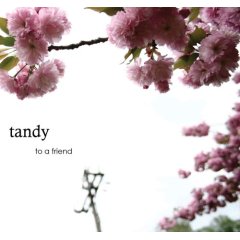
You know you're good when such an august figure as Steve Earle is in your corner. Just how good is demonstrated by the fact that yours is the first music he featured on his radio show.
As welcome as the endorsements are , New York band Tandy – the brainchild of singer-songwriter Mike Ferrio - will never need to rely on others, the sheer effortless brilliance of To A Friend and Did You Think I Was Gone will surely be enough to sustain a long and deservedly critically acclaimed career. Rarely has a set of songs contained such an impact and achieved it so deftly.
Both albums - initially a limited release on Yellow Slipper records - refuse to take the easy route of wave after wave of trite, clichéd lyric and catchy melody, the effects are much more subtle. Tandy draws you into an intimate and personal world until you're not so much a listener as a welcome confidant.
Ferrio's voice sits squarely in the middle of some gossamer delicate melodies and, throughout both albums, tracks build thoughtful layer upon thoughtful layer until they become utterly irresistible.
Listening to the emotion charged but decidedly non theatrical To A Friend/Did You Think I Was Gone is akin to studying an oil painting, like a skilled painter Ferrio only reveals his songs bit by bit and it takes time and effort to fully uncover what lies within each one.
Ferrio is joined on his endeavours by kindred spirits Ana Ege and Malcolm Holcombe. The trio combine to deliver what can only be inadequately described as – at least in the case of Home – a restrained and refined brand of folk.
While both Ege and Holcombe are talented musicians, it's the combined spirit and determination of the three to cosset and comfort the music that provide the albums true delights.
To A Friend/Did You Think I Was Gone are songwriter's albums, each track is fashioned and crafted until it's the best it could possibly be, it's then delivered with a sympathy and intelligence that is all too rare. Tandy may not shout from the rooftops but its music is deafening in what it has to say. Ferrio and co display an unerring accuracy in getting to the root of every note and word, there is not a wasted second on either album.
Musicians like Ferrio, Ege and Holcombe don't deserve labeling, leave that cheap trick for lesser talents. What they do on To A Friend/Did You Think I Was Gone is throw open the windows to the souls of some wonderful songs
www.yellowslipper.com
www.myspace.com/abandcalledtandy
Michael Mee June 2008
(Ed: To A Friend/Did You Think I Was Gone?Two for the price of one - with a bonus track on each! Tandy's new label (2 Minutes 59 Records) has re-released both 2006's Did You Think I Was Gone?, and To A Friend, both previously sold out.]
Tandy - Did You Think I Was Gone (AAD)
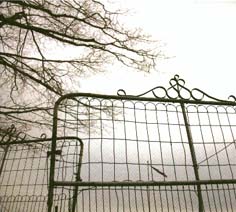
There's two ways of looking at this. Either Tandy's publicist is pursuing the 'less is more' line of thinking or the band prefers to let its music do the talking because biographical details are scarce.
The songs are written and sung by Brooklyn based, upstate New Yorker Mike Ferrio. The other members of the band are: Drew Glackin, Bruce Martin, Larry Campbell, Sibel, Malcolm Holcombe and Lucy Hollier.
Whatever the detail (or lack of it), the important thing is that the effects of Did You Think I Was Gone? will last for a very long time. Whether they are roots rockers, rock n rollers or something completely different, I'm A Werewolf hits with the force of an express train. A malevolent harmonica stalks it, like some unseen predator in the night, you can almost taste the fear.
If you have a gravelly singing voice and write the kind of deep, dark songs that fit that voice perfectly, then there are certain people you must expect to be compared to. Tom Waits is one, Tom Ovans and Warren Zevon are a couple of others and Ferrio slots right in with them, however this is an album that has as much light as shade.
Without cooling the white-hot intensity of the rock 'n' roll, the album moves into Bait. To describe it as 'lighter' would be wrong but it's certainly airier than its predecessor.
Much of the force of Did You Think I Was Gone? is generated by the power of Ferrio's songwriting, On A Hill for one gathers momentum until becomes almost unstoppable.
Listening to Tandy is akin to being caught in a vice-like grip, even if you wanted to escape there's no chance. All you can do is sit tight and listen intently, the effort is rewarded by the tender Evensong. After the maelstrom to hear a heart being poured out is a startling moment.
It's brought into even starker relief by the almost operatic feel to Misery Boys, a song of distinct parts - neither the lyrics nor the melody are there merely to support each other - which come together to produce a much grander whole.
Tandy and in particular Mike Ferrio will just have to endure the comparisons but 'Did You Think I Was Gone' is quite wonderfully unique.
Michael Mee
Tandy - To A Friend (Yellow Slipper)
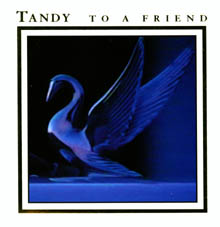
Singer-songwriter Mike Ferrio is occasionally joined by Ana Egge, their duets creating the sense that he's Gram, and she's you-know-who! Incidentally, in terms of packaging this CD ought to be regarded as the benchmark against which all self-released albums are judged. The package includes a lyric booklet, sticker, personally signed band photograph and the video for Girls Like Us - all mightily impressive for a release limited to a mere five hundred copies. This would, of course, matter not a jot were the music not so captivating. To A Friend is an album as intimate as it's title suggests, a mature, crafted meditation on the past, which is destined for 'buried treasure' status in the future.
John Lonergan
Tandy - The Lowdown 1997-2002 (Gammon)
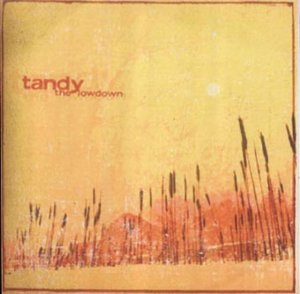
Fronted by gifted songwriter Mike Ferrio who has a voice somewhere between John Prine and Steve Earle, the New York quartet have been making the rounds now for some six years, totting up three self released albums along the way. With a rising awareness of their brand of Americana and now signed to a proper label, they've taken the opportunity of gathering together the best of the old tracks with a couple of new numbers for good measure. The presence of tabla on Becky California is indication that they're prepared to explore beyond the usual roots rock fence without sacrificing their distinctive rural mood, and if more recent numbers such as The Truth Is Better Than A Lie or the Byrdsian pedal steel driven Sister Golden Hair are stripped down, the more musically fleshed out likes of The District Doctor, Shine and Ted are no less convincing testimony to the band's keening charms.
Their 1999 Lichtenstein's Oriole album pricked up ears when they played the UK a few years back, and it's good to revisit their lollopping bluesy collaboration with the late Dave Von Ronk on Lorna and be reminded of the Steve Earley I Signed A Circle and the simple but complex storytelling childhood reminiscences of Pictures of China. Equally, discovering such gems as The Band sounding Facing Winter (Alone Again), the heartfelt Ship To Shore and the excellent acoustic Prine-like strummer New Candy Necklace for the first time is like having Christmas and your birthday come at once.
www.yellowslipper.com
www.myspace.com/abandcalledtandy
Mike Davies
Tandy - Lichtenstein's Oriole (Yellow Slipper 2000)
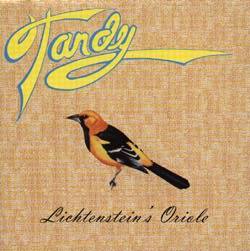
Tandy's latest album 'Lichtenstein's Oriole' is an ornithologist's delight: the sleeve notes fold out to make a nice poster for your wall!
Artwork out of the way, the music is pure joy: rootsy, rocking alt. country fare from Mike Ferrio's band. It's tight and it's got a groove, laid down by singing drummer, Irish Tom McCrum and George Rush, bass. The album drives along with acoustic and electric guitars from Ferrio and Jay Sherman-Godfrey, aided by Dobro and lap steel from session man David Hamburger, fiddle from Miss Darlene, Sibel Firat's cello, cajun accordion from Charlie Giardano and Ferrio's harmonica. It's a fine, fine album with hidden depths and secrets beneath the instant pop appeal.
'Live', Tandy is a wonderful surprise. At the 12-Bar Club and a pub gig, Rosie O'Grady's in Camden, in May, they produced as perfect a sound as a band can make, even with a slightly changed line-up, without losing any of the vitality or magic of the album. Maybe it's the other way round - the album perfectly captures the 'live' Tandy. How? Well, the album was mostly recorded 'live' in the studio and they have at least three elements working perfectly together in both album and 'live': Tom McCrum's acoustic sticks drumming (on tour he used just brushes and acoustic sticks on snare and never missed a beat). Virginian Miss Darlene's fiddle was a smoothly mellifluous constant. Mike Ferrio controlled the whole with his songs: poetry which is sharp, literate, quirky and funny. Language can be percussive in its own right; here the words roll rhythmically along, as much an instrument as his harmonica. And there were no jokes or wisecracks between songs - just straight into one great song after another. Unforgettable. An album to hug to death and buy for special friends.
Mike Ferrio's Tandy (named after a character in Sherwood Anderson's 'Winesburg, Ohio') formed in 1996 and are New York-based. I hope they come back to the UK soon.
Sue Cavendish
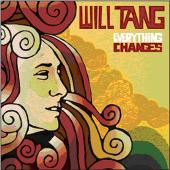
Rochdale's Will Tang hasn't exactly taken the conventional route to gaining UK recognition. He made his name in Hong Kong by starting off in the burgeoning blues and jazz scene before going on to be a highly rated session harmonica player playing for, amongst others, Jackie Chan. From there he went on to his first record deal and paling 10,000 seater stadiums. After a further four albums he decided to come home to the UK, settle in Manchester and release his debut UK album.
Opening with the eponymous title track, Will sets about realising the boast of the album's title. There is certainly a big change from his last album, The Other Side although eight of the thirteen tracks on offer are from that very same album. The title track is acoustic rock that has him in the same class as Paulo Nutini and David Gray. Troubles Down, one of the new songs, is sedate country rock with well executed slide guitar. On My Way, another of the new tracks, stays in the acoustic vein and sees him straying away from the blues. This shows a level of sensitivity and vulnerability. He beefs it up a bit for The Other Side, which heralds the return of the electric guitar and, more importantly, the harmonica. This gritty, blues influenced rocker is a welcome addition. Red City Blues returns to an acoustic setting and is not a blues, as such, but rather a slinky rocker. Something Special is a new one and although it is upbeat, it is unmemorable.
Stories is more soft acoustic rock but Love Bites is a bit harder and his voice suits this. He gives the harp another airing on Time Of Day and the fuzzed vocal adds to the overall stormy effect. Drifting is not the blues classic as you may have expected but another acoustic rocker, this time much in the style of the aforementioned Mr Nutini. The last official track is Sun Down, which is a harmonica blues which is short, sweet and cuts the soul. There are two bonus tracks, remixes of Travellin' Man (the normal mix of which is not on the album) and Love Bites. The former is a contemporary acoustic blues and the latter adds snappy drums from Geoff Holroyde to give another gritty modern blues.
They say that a change is as good as a rest so Will Tang must be completely rested for his next charge for widespread recognition.
David Blue January 2008
William Tang - Out Of The Blue (Blue Wail Records)
A Hong Kong harp player, you've got to be kidding? Well, I'm not and William Tang has as much right as anyone to express his love of the blues. This album, about 50/50 on covers and self-penned songs, goes a long way to showing how much talent the man has.
The opener, Walkin' Round is excellent and a song that any U.S. blues artist would have been proud to produce. It is a very good introduction to the playing of William and he has surrounded himself with good musicians. This is a 'live' studio album and gives us a feeling of how the band would sound in an intimate club - fantastic. Mercy Blues is full of wailing, top level harmonica and is a slow & moody song, written by Tang himself. Next up is a funky version of Nick Gravenites Born In Chicago where Patrick Murdoch gets to let rip on guitar.
Gonna Make My Way, written by Tang and Murdoch is classic Chicago style blues and the band finds a groove on Sugar Sweet with the funky bass of John French and Tang's lungs of steel. It's Alrite rocks - it's another Tang song and guitarist Murdoch produces some good slide guitar before William goes almost apoplectic at the end. Sweet Little Angel is a B.B. King song and he has done the right thing by not trying to sound like the great man and there is some more strong guitar work from Murdoch.
The Thrill Is Gone is the song made famous by B.B. King but William's voice is not really suited to this but the interesting use of harmonica redeems it. The closing track is Go Foo Guy and guitarist Patrick Murdoch wrote this. It is an instrumental finish to a good album and, like the other tracks, is held together by the tight drumming of Mark Menezes.
This is a serious blues band and don't let anyone tell you otherwise.
www.williamtang.com
www.bluewail.com
David Blue
Canada's Tanglefoot have become one of that country's most popular exports, with a loyal following in the UK largely due to their storming, swashbuckling appearances at festivals. In the flesh they've an almost overwhelming, distinctly larger-than-life presence which draws you into their stirring and passionate music: intriguing and powerful stories drawn from episodes in Canadian history are couched in universally well-crafted settings. One special thing about Tanglefoot is that even though the band's always had a strong "corporate identity" as a performing unit, each of its members is a more than capable front-person when taking the lead role on a song. Another of the band's strengths is that they are fortunate to have within their ranks a number of gifted songwriters each with a style all his/her own yet when their songs are collected together they complement each other superbly. Tanglefoot's latest studio offering, Dance Like Flames, proves no exception to that rule, comprising a varied collection that ranges stylistically from the boisterous lumberjack tale The Whiskey Trick and Al Parrish's feisty acappella Hard Work (done in the mode of a gang-worksong) to the gentler, appealing story of The Songwriter (co-written by pianist Bryan Weirmier and ex-band-member Joe Grant) and mando/banjo virtuoso Terry Young's nostalgic Lunenberg Skies. There's a wide gamut of emotions on display, from Al's deliciously menacing theatrical portrait of the Bishop on Boot Soup and guitarist Steve Ritchie's charming swing-idiom retelling of When Dad And Uncle Archie Lost The Farm, both of which contrast nicely with Tanglefoot's tremendous, lively take on the traditional Paddle Like Hell (done in authentic French-Canadian dialect, naturally!). The band's newest recruit, flamboyant fiddle player Sandra Swannell, contributes loads more than just a pretty face and some spirited musicianship, and not just in the vocal-harmony department but in the shape of a fine song, the story of Maggie, which fits in really well with the rest of the group compositions. Steve's anthem For The Day (another well-harmonised acappella item) forms an ideal closer. Maybe you'll feel that the brief sequence of slightly silly extraneous outtakes tacked on at the end should have been left on the cutting-room floor, but at least you can exit before they start. Any mild sense of underplay at moments during the set is only apparent while memories of the band's massive live presence remain in your mind; what's important is that Tanglefoot still make a suitably big sound even on disc and they're on splendid form both vocally and instrumentally here.
David Kidman February 2007
After five studio albums and even more UK tours, the big hairy ones have finally got round to releasing a live CD. Captured Alive brings right into your living-room (or bedroom, car or privy!) the full-throated abandon of this energetic Canadian sextet (careful!!). Recorded in Toronto over three nights in May last year, and following hard on the heels of the release of their successful Agnes On The Cowcatcher CD, this 74-minute selection of definitively passionate, full-frontal Tanglefoot performances marks a watershed in the band's development. It acts as both a swansong for the retirement of original member Joe Grant from performing with the band (although he continues to write for them) and as an introduction to new recruit, fiddler Terry Snider (they appear together on the set's finale La V'la M'Amie).. If you don't already know Tanglefoot from their many riotous UK festival appearances thus far, take heart: I need to come clean myself, for during the early years of their career I was wondering what all the fuss was about. I couldn't deny their energy, passion, musicianship and artistry, but somehow their larger-than-life presence, at least on CD, seemed overly concerned with maximising the impact with over-the-top delivery and a certain amount of posturing, which, although designed to impress, left me somewhat cold in the end. But more recently I've been a bit of a convert (even though it's still the case that not all of their material totally convinces me), and not only because experiencing the band live is a whole different kettle of fish. Quite simply, Tanglefoot are a top-flight live act, working hard, giving value aplenty with their supercharged, upfront performances of folk-tales that veer credibly from the good-natured and cheekily witty to the tragic and highly poignant, counterpointed by a true instrumental versatility and a hell of a stage presence. Tanglefoot are true showmen, who know how best to present their uniformly strong material and how to please an audience and keep their interest throughout a set. There are no longueurs, and every song's a winner, whether rollicking or thoughtful. Vocally as well as instrumentally, Tanglefoot invariably come up trumps too – each of them is an excellent singer, and on a-capella numbers like Secord's Warning they come at you seriously lusty (almost like Canadian cousins of the Wilsons, it's been said, but on songs like There's A Bit O' That Goes On they're more akin to a crack barbershop ensemble). With 14 songs ranging far and wide through the band's healthy back-catalogue, together with five intros, and all encased in a handsome, heavy-duty digipack with photos, lyrics and notes, Captured Alive is as essential for the Fan as for those who still need convincing of Tanglefoot's already legendary status.
David Kidman
David Kidman
Tarbox Ramblers - A Fix Back East (Rounder)
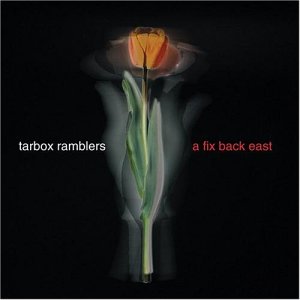
David Kidman
Tarbox Ramblers (Rounder Records)
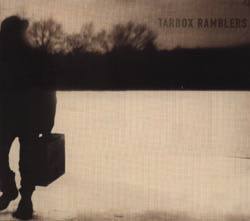
"Sounds like they crawled out of the Delta with their instruments in tow after being frozen for 100 years!! Their honest vocals and sweet grooves propel this CD from track to track" (Ken Coomer - Wilco). This is Boston's The Tarbox Ramblers recently-released debut album - a wonderful delta folk/blues collection of mostly traditional songs which leave you grinning from ear to ear.
A sure-fire chart hit? We'd be happy, shiny people, tapping our toes, embracing our fellow man/woman, but it's unlikely it will even get into the racks here, let alone get a sniff of a DJ's turntable. What's new? That's the way it's always been for those of us who have found our music in the margins; the 'word' passed by a friend, a great review in an American magazine, a link on the internet. We find our music under the radar.
Michael Tarbox's unpretentious foursome, with himself on guitars and vocals, Jon Cohan on drums and percussion, Daniel Keller on violin and vocals and Johnny Sciascia on bass fiddle and vocals, strut their raw, rootsy rockers with a genuine feel for the soul of the South. There's a wonderful dirty arrangement of Down South Blues, a gospel acappella and tambourine Stewball, a sliding, rocking, Bukka White's Shake 'Em On Down and a jolly fiddle-swinger of a St James Infirmary and much more. It's unpasteurised and so real you can taste it. Fresh arrangements guarantee you're not left with that 'jeez, there goes another blues standard again' feeling.
Look out for those Tarbox guys, they're wonderful.
Sue Cavendish
Tarras - Walking Down Mainstreet (Topic)
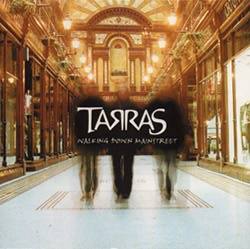
Tarras are a five piece that hail from the Border area that links England to Scotland. The core of the band started with Joss Clapp(acoustic bass) and Rob Armstrong (cittern). Having worked together intermittently as a duo, they were soon joined by Ben Murray (accordion) and Jon Redfern (drums) and ultimately Emma Hancock (fiddle). This is their second album, and although it does not feature Emma, still gives a good impression of the band as they are today. Not folkrock red in tooth and claw, but a much more subtle variation. There are tinges of Bert Jansch, celtic, cajun, jazz, and other influences (even Pink Floyd) on a pot puree of memorable tunes and songs.
The rather down beat title track kicks off the album - actually it's a bit of a grower - followed by a splendid instrumental, Russian in feel with Celtic overlays. Next up is the sprightly song 'Fires', featuring some nice accordion and acoustic guitar. 'Los Troyas' is another instrumental track - a slow and stately tune with some excellent bass playing from Joss Clapp.
'Only One' reminds me of Pink Floyd in 'Wish You Were Here', with a distinctive vocal performance by John Redfern, plus massed female backing voices. 'The Siege' is another instrumental that builds nicely and includes an exciting percussion break and some great soprano sax from Luke Murray. 'Ye Mariners/Cajun Malaysian' could easily come from a Jansch album, and works perfectly. 'Calico' starts with an Eastern swirl and then develops into a Bothy Band sounding, but loose, and subtle, exploration of the trad tune. Next up is a real gem - 'Dark Eyed Sailor'. The well known trad song given a drop dead gorgeous acoustic arrangement. The CD is worth buying for this track alone. Finally, is 'Bagels', another well played and enjoyable tune set. All in all, a real gem of an album, and one to add to anyone's CD pile.
Jon Hall
From the name alone, Tattie Jam might be deduced to be either frivolous or fusionist, but although this Scottish duo incorporate elements of those traits they're embraced as entirely positive qualities that don't overstay their welcome.
Here we have two very accomplished instrumentalist-singers: well-respected cellist Seylan Baxter (who's also a member of Ken Campbell's Ideal Band and a collaborator with Alaskan harper Cheyenne Brown) and multi-instrumentalist Ruaridh Pringle (who plays guitar, tenor banjo, octave mandolin and didgeridoo). Each of them is intensely (but wholly naturally) capable of switching between lead and supporting roles during the course of a song or instrumental set, as the music demands, and their open-minded versatility enables them to maintain a constant freshness of approach that, though employing a necessary measure of thoughtful pre-arrangement, also retains both a healthy degree of spontaneity and the all-important element of surprise for the listener within the unusual flavourings and often strange twists and turns of text and texture.
In this way, Tattie Jam always manage to tread the fine line, and maintain the all-important balance, between the contrasting elements of their musical personalities, allowing each of these to percolate to the surface at the appropriate moments. Their respectful attitude to tradition is given due weight, while the slightly more facetious side of life is not neglected, being cheekily conveyed in a lively Scottish fashion. Entertainment value is high throughout the disc in fact, as is the level of invention in the musical arrangements. In the duo's takes on traditional ballads (Earl Richard and The Birken Tree), no stone is left unturned in their enthusiastic communication of the narratives, yet their responses are finely tuned and sensitive with it, and you never feel that they're selling their material short.
Ruaridh himself has had a direct involvement in the composition of seven of the disc's 13 tracks: four of the instrumental items (including the abundantly lyrical Arisaig 2: Forty and the sprightly Summer Shower jig) and three of the vocal items. The Doctor's Dochter has been clearly much inspired by traditional sources, whereas Ruaridh's remaining songs display a certain piscine preoccupation - the quirkily whimsical fish's-eye-view of Different ably complements Winch Away, a commentary-cum-shanty taking a skewed (and hitherto ignored) stance on the decline of the fishing industry.
But in all honesty I'd have to go as far as to say that every single one of the disc's tracks has distinctive and commendable qualities all its own, right from the attention-grabbing (nay, arresting), spectrally bluesy album opening, the prelude to the duo's driving rendition of Robert Tannahill's Are Ye Sleepin', Maggie?, through to what for me is the standout cut, Hallowe'en, a bewitching acappella duet rendition of Jim Reid's setting of words by Angus poet Violet Jacob, which manages to be both chilling and tear-inducing: a strange effect which is eerily accentuated, albeit ever so gently, by the subliminal tolling of distant bells (for those who died as cattle in the first world war, one might say) – a stroke of genius methinks.
Lest it be thought I'm concentrating unduly on the duo's vocal prowess (both are excellent solo singers, with an unerring ability to harmonise with each other as a bonus), I must emphasise that their instrumental skills are also second to none. Seylan, playing a five-string electric instrument, coaxes with her determinedly syncopated bow-strokes some of the most attractively funky cello playing you're ever likely to encounter, balanced by an equally determined sensuous lyricality, while Ruaridh's sense of rhythm (whether on tenor banjo or guitar) is utterly infectious and balanced by an understated dexterity and sureness of purpose (hear how he negotiates the tricky contours of the Nine Pint Favourite set for instance).
One final point: the overall sound on this CD is a touch fuller than you'd encounter when seeing Tattie Jam perform live, for both musicians (and their colleague Steve Foreman) also creatively overdub some percussion to add rhythmic spice and fun to the proceedings; however, the effect is genuinely invigorating rather than unnecessarily gimmicky, and each of the participants has a keen ear for what and how much embellishment to usefully add. This vibrant duo certainly have a lot going for them, not the least a unmistakable sound, and they've produced what I can only describe as an outstandingly inspired debut CD, one which I'd not hesitate to class as undoubtedly one of the finest Scottish albums on the market at the moment. If you're looking for a seriously different angle on Scottish tradition with a contemporary slant, then Tattie Jam will fit your bill very well indeed.
David Kidman March 2010
It's great to see on CD at long last this treasured LP from the tail-end of the 1960s that first appeared on the Argo label in1969; it forms part of the tentatively continuing programme of reissues from the admirable Talking Elephant stable (In Port is set to follow very shortly).
This record does exactly what it says on the tin – without any fuss or pretension, and without any elaborate arrangements, silly voices, unnecessary gimmicks or patronising condescension. Just Cyril and his genial personality, helped along just occasionally by the deft, animated guitar of Tom Paley and/or Trevor Crozier's jaw's harp, mandolin or concertina, all coming to you across the grooves absolutely bright and clear in this fresh remastering. Admittedly, Cyril owns up, in his sleeve note, that even he just does not know what we mean by the term "children's songs", but goes on to explain that the record contains a wide selection of suitable candidates including delightful "nursery songs crooned by Nanny" (The Snail), cautionary tales like Tommy And The Apples, fun "cumulative" songs like The Tree In The Valley and I Had A Little Cock, and a handful of adult songs which are "sufficiently simple and humorous to appeal equally to young folk". Finally, the wonderfully "scarey" There Was A Lady All Skin And Bone leaves the attentive child in exactly the right frame of mind!… Folk favourites like The Cuckoo, Old Daddy Fox, The Herring's Head, Three Scamping Rogues and Carrion Crow come from Baring-Gould collections, while others may be more obscure in their sources but are equally persuasively sung by Cyril. Well then, so what if (with one possible exception) all the "children's songs" on this record were obtained from grown-ups?
The release comes with faithful reproduction of all the original liner notes and text, as well as some attractive additional artwork, but I do need to warn you that the published track listing is slightly awry, as items 2 and 3 have been banded together as track 2 so all successive tracks are one cue adrift. But this is still without doubt one of the most charming and yes, treasurable records of children's songs one could hope to come across.
David Kidman November 2011
Talking Elephant's latest crop of enterprising reissues finds the label testing the waters by licensing a select few LPs from the long-deleted Argo catalogue for well-overdue first-time-reissue in CD format. In tandem with the iconic initial fruits of Peter Bellamy's exploration of the Kipling legacy, here's the first of what I hope will be many reissues of key albums by the late Cyril Tawney.
A Mayflower Garland, which was recorded in mid-December 1969 and released in 1970, is a miscellany of traditional and contemporary material connected in some way or other with the counties of Devon and Cornwall which was offered as a tribute on the occasion of the 350th anniversary of the sailing of the Mayflower. Some of these are regional variations of folksongs heard throughout Britain, whereas others are uniquely local. Perhaps the most celebrated of the latter is Cyril's matchlessly steadfast rendition of The Bellringing, which in the sound of the human voice imitates the flow of the bells but "forgets that bells don't have lungs"!
Among other staples of Cyril's repertoire of the time, included on the LP are three of his own compositions, each having as its subject some aspect of life in Plymouth (the wonderfully tender, affectionate and yet plaintive portrait of The Oggie Man, the modern-lullaby-cum-caustic-farewell Beacon Park and the necessarily slightly exaggerated satirical commentary of Second Class Citizen's Song). But the LP can also be celebrated for Cyril's uniquely spirited renditions of gems such as Truro Agricultural Show and his authentic accounts of seafaring fare such as Outward Bound, Rounding The Horn (aka Amphitrite) and Sir Francis Drake. Not quite so authentic, but more fun, is the silly Devonshire version of the maritime ballad The Cruise Of The Calabar which relocates the action to a clumsy barge in the comparative safety of a canal… !
Cyril's special presence, not to mention his expertise as a soloist, is nicely complemented by the supporting musicianship of Tom Paley (guitar or banjo) and/or Reg Hall (melodeon) on a handful of the tracks, and the songs are punctuated by a series of readings on the disc's anniversary theme (by Gary Watson). A Mayflower Garland has long been regarded as one of Cyril's finest albums, which makes it all the more surprising that fully three-quarters of its song contents has never before been available on a Tawney CD. Happily, that omission has now been rectified, and the present handsome reissue package comes complete with original sleeve notes. Yes, it's a cause for rejoicing that this fine, sensibly wrought collection can now take its rightful place on our CD shelves.
David Kidman August 2011
This handsome double CD was specially compiled for the Celebrating Cyril day held at Cecil Sharp House on 14 April this year, and in no way is it just an ephemeral memorial issue. Cyril's legacy, like his music, reaches far and wide, and this is evidenced by a realisation of the extent of his impact on the folk scene, an impact which in turn we can gauge not only by the sheer number of performers performing his songs (itself a hefty tally), but also by the strength and depth of the tribute anthem from which this compilation takes its title: a brilliant composition by Mick Ryan which (in the words of the liner note) celebrates "the living tradition which keeps alive the songs of all those who have gone before - something (we) are all encouraged to do with every song in this collection". Exactly!... The Song Goes On here receives a splendid roof-raising rendition in a recording made at the Sidmouth Festival Tribute Concert of 2005 (led by Mick Ryan, this also features Pete Harris, Keith Kendrick, Sylvia Needham and Doug Bailey); that says it all! But before that closing anthem, we're treated to 31 songs performed by Cyril himself, taken from existing available recordings made over a wide timespan. These either derive from the Cyril Tawney Archives or are (expertly) re-mastered recordings of gems of his repertoire both traditional and self-penned. The actual selection is both canny and salutary, and is actually (contrary to what you might expect) weighted heavily towards traditional song, for Cyril's talent for reinterpreting traditional song can easily get overlooked during the course of one's enthusiastic appreciation (albeit well-founded) of his original songwriting. Cyril's versions of such staples as Ball Of Yarn and A Jug Of This could easily find a natural place on a future Voice Of The People collection, I feel, while his tender, lyrical rendition of the usually-pub-thumping Wild Rover is masterly, both astute and beautifully apposite. Cyril's easy, naturally expressive delivery and adept, deceptively simple accompanimental style (on nylon-strung guitar) may always have betrayed the influence of Burl Ives, the man whom he readily admitted was the catalyst for him taking up the singing of folk songs in the first place, but his was a distinctive voice - and presence - that once heard was never mistaken (or forgotten!). His commanding tones ring out on the one non-solo track, the shanty Roll Down (in the performance taken from the original recording of the ballad opera The Transports). It's probably fair to say that this compilation, consistently entertaining though it is, doesn't necessarily paint the most complete picture of Cyril the folk legend; for that you really need also to collect at least one (but preferably more) of the other Cyril Tawney titles (Navy Cuts or Nautical Tawney) now available on CD from the same excellent label, as well as the brand-new Live At Holsteins release (reviewed separately). And personally I'd have liked the package to have included those important discographical details such as recording dates and sources. But in every respect - performance, fine re-mastered sound quality, presentation - The Song Goes On is a magnificent celebration of Cyril Tawney's artistry.
David Kidman June 2007
The latest album from Allan, his 20th, is heralded as showing a return to the more folk-inflected style of troubadour song that characterised his earlier songwriting years. Whatever, Allan remains the consummate craftsman-in-song, and he hasn't in any way abandoned the key themes and concerns that he's developed and made very much his own over his long and illustrious nigh-on-40-year career as a premier singer-songwriter.
Leaving At Dawn is absolutely quintessential Allan Taylor, instantly recognisable for its telling combination of a uniquely expressive, warm and inviting vocal delivery and an attractive, precisely captured instrumental backing, centred as ever around Allan's own intricately moulded and mellifluous guitar playing. But it's also the product of an artist of maturity and integrity, always delivering work of the highest self-imposed standards and exhibiting (in every single aspect of its presentation) supreme confidence without complacency. This new batch of songs was written (with just one 1993 exception) between 2001 and 2007, each one a prime example of Allan's second-nature ability to directly share his emotions in simple yet always profoundly literate language, thereby taking the listener on a journey that feels personal yet contains universal truths aplenty. Allan's musings are affectionate and eloquent, yet often more complex than they appear, primarily because they're shot through with the perceptiveness and realism that are the hallmarks of a true observer.
Leaving At Dawn is full of songs that follow the songwriter's eternal preoccupation, reflection with regret, either musing sensitively on love (Lay Soft On Your Pillow, Back Home To You) or embodying a strong sense of genius-loci (Provence, New York In The Seventies), often memorably bringing together both strands in the same song. Especially beguiling here are two songs composed in a pastiche-traditional vein (Firefly, already celebrated in Tom McConville's fabulous recording, and The Last Of The Privateers), The Almost Man (a chokingly pertinent tribute to Allan's father), and Winter (a beautiful and masterfully poetic expression of tender reassurance), while Red On Green is Allan's own translation of a poignant song of farewell composed by Massimo Bubola based on a WWI love-letter written by Massimo's uncle.
The disc's exceptional, state-of-the-art recording draws you in right close, with Allan's very special and intimate delivery cocooned by the immaculately judged and empathic contributions of a handful of other musicians (variously playing guitar, dobro, accordion, banjo, bowed psaltery and fretless bass). I feel sure that Leaving At Dawn will rapidly come to be judged one of Allan's finest collections. Little wonder that Tom Paxton praises Allan to the skies, for Allan's songs share a longevity and definite kinship with the very best of Tom's own.
David Kidman September 2009
Allan's one of the key songwriters of our time, a true professional as much respected by fellow-musicians as by his loyal audiences. Over close on 40 years now, he's produced a large number of intense and significantly enduring songs, and his own recordings of many of those most frequently requested remain obstinately (though unavoidably) unavailable, languishing on long-deleted LPs and CDs (and yes, there's three of Allan's albums that I've never even owned on disc myself!). With this in mind, Allan has chosen to go into the studio and re-record a dozen of his best songs which fall into that unfortunate category. Yet considering its status as a collection of songs from different periods of Allan's writing career (spanning the quarter-century from 1970 to 1994) and its originally-intended function as a kind of stop-gap pending Allan's next album of brand new material, this set works fantastically well as a strongly unified offering in its own right which highlights both the mighty consistency of Allan's writing craft and the unstintingly high quality of his singing and playing. It also points up the stature of Allan's own continually evolving interpretations of his earlier material, by presenting the songs in stripped-down settings (just voice and guitar or piano) which in most cases are radically different from the original recordings. This method permits an altogether closer focus on the vocal nuances of Allan's increasingly mature renditions, which embody what I can only describe as a more conversational delivery that brings a more intimate expression of the emotional climate and extracts further (hitherto unacknowledged) subtle insights from the lyric. The unadorned new settings serve to retrieve the essence of the songs, meaning which may over the course of time been lost in indifferent or over-cosy cover versions or buried beneath inappropriate instrumentation. The incredibly heartfelt simplicity of Now You Know still speaks emotional volumes, as do other oft-requested songs such as Flower In The Snow and For An Old Friend. Priceless observational pieces like Urban Love Song glisten like freshly-polished jewels, while the reflective Chimes At Midnight (one of three songs on which Lutz Moeller's grand piano takes the place of Allan's guitar) also gains much from being shorn of its late-80s full-band arrangement). Yes, Allan, at the present moment you very probably "couldn't possibly play and sing any of them better than (you) have here": snapshot in time though any recording inevitably is, I'm strongly inclined to agree. It shouldn't be so easy to temporarily lose count of just how many great songs Allan's written, but I suspect that even his biggest fans can be guilty of doing just that - so this immensely rewarding new CD will provide a further salutary reminder.
David Kidman February 2008
Several times BBC Young Tradition Award finalist, Manchester-born Becky is one of the few female players of the uillean pipes in England today, and she's already a session and festival veteran of several years' standing. She's built a considerable reputation for her distinctive interpretations of traditional tunes - not only on the uillean pipes, but also on the Northumbrian smallpipes, whistle, fiddle and duet concertina - and for her skill in composing and arranging tunes that continue the tradition. Her debut CD was released over five years ago, a modest and unpretentious offering which eschewed precocious showing-off and instead concentrated on the music-making in the convivial company of her informal band of friends. Ireland Bridge, the followup, moves on a step by broadening the instrumental palette to include piano and demonstrating the increasing sharpening of Becky's arranging skills to incorporate countermelodies and layers of harmonies into her individual presentation of the tunes. Becky clearly feels no further need to prove herself, as there are no purely solo tracks this time round. But there's ample compensation in the shape of the quality of her playing in consort with her principal accompanist, here the skilled and tastefully virtuoso guitar/bouzouki player Dave Wood, while she's also retained the services of Hugh Bradley (bass), and Leigh Stothard (drums), Paul Cowham and David Kosky also contribute at times. Whether the tunes are traditional or self-penned (and there are plenty of both on offer here, with the latter just in the majority), Becky's approach is genuinely exhilarating, full of verve and dynamism, retaining a solid base in traditional form and setting, but she brings in touches of folk-rock and even baroque at times and the textures she employs are invariably full of interest, ensuring the listener stays awake! Right from the vibrant opening title track with its multitracked melody line, through the smallpipes showcase Smallcoalpiper and a stately treatment of O'Carolan's Captain O'Kane, and on to the more pictorial River Rose and finally the Can't Help Smiling set that rocks away to close proceedings - and I bet you can't too... A most pleasing instrumental album that's just a bit different from the usual sequence of tune-sets - and therein lies its freshness and appeal.
David Kidman April 2008
Bram's been a mainstay of the renowned folk label Fellside almost since its inception, and Song Singer, his appositely-titled ninth album for the label, keeps the faith by maintaining his proven, winning formula - that of presenting another fine selection of songs that Bram obviously loves singing. It's inevitably a very personal selection, so not all the songs will be to everyone's taste (there's one that I personally just can't get on with for instance), but if anyone can make a case for a song then Bram's your man. His genuinely accommodating performing style has been labelled "easy listening folk", but while that has an element of truth (in the sense that it won't frighten the horses with radical or aurally challenging arrangements, say), it should not be taken in the pejorative sense, for Bram's an entertainer in the old-fashioned sense, a purveyor of good honest artistry: what you reliably get from Bram is good songs well sung and attractively arranged (and thankfully, without an excess of bland keyboards!). On this latest offering, Bram's unpretentious yet wholly committed renditions are ably and tastefully accompanied by decent (and primarily acoustic) textures co-ordinated by engineers Paul Adams and Bob Hallard and featuring string virtuoso Stevie Lawrence, fiddler Iain Anderson, cellist Wendy Weatherby and other similarly expert musicians of unassuming excellence. Several of the songs are ones that Bram's been featuring in his live sets for a long time but not got round to recording despite repeated requests - until now, that is, and so his fans will welcome this disc with open arms for its inclusion of favourites like Rose Of Allendale and Huw Williams' Geordie (Will Dance The Jig Tonight). The songs that work the best for me are those where song and setting truly cohere (though it helps if I personally respond to the song anyway, of course). On this occasion I'd single out for special mention Judith Haswell's moving song of farewell Harbour Lights (some particularly lovely harmony vocals from Linda and Sue Adams on this one), James Keelaghan's Hillcrest Mine (why do songs about mining-disasters often have such jolly, even brilliantly catchy tunes?!!), John Richards' uplifting If You Can Walk You Can Dance, Jean Ritchie's See That Rainbow Shine (done in suitably uplifting acappella), and one completely new to me, Writing Home by Miv Cameron and Kevin Hughes (and thanks Bram for introducing us to it!). I also liked Bram's thoroughly appropriate (if unusual) interpretations of two recent but quite well-known songs dealing with the cotton industry of his native Lancashire (songs which in lesser hands tend to get saddled with a glib, overly cheery treatment). I could best sum up by saying that's what I've always liked about Bram - ie. it's clear that he really understands the songs and cares about putting them across: his expressiveness is natural and without a trace of affectation. This album does him proud, and it will quite probably come to be regarded as his best to date.
David Kidman December 2007
Bram Taylor - The Night Is Young (Fellside)
Though a constantly reliable and entertaining performer who remains loyal to the folk scene, Bram never gets the level of recognition he deserves it seems. I thought his previous album of all-new material, Fragile Peace (which I reviewed in Stirrings 109), might well have been the one to bring him a healthier profile. Bram's stature as a performer could only be enhanced, I felt, by his perennially attractive and accessible presentation of a series of well-chosen songs, many from the pens of unjustly neglected writers. But somehow that didn't quite happen, and I fear it's still unlikely to with this new CD. That comment shouldn't be taken to imply any lack of quality or consistency - far from it; it's just that Bram treads a roughly similar path again, using his customary artisan-like approach, which many listeners in this age of immediate impact and gushing trendsetting will persist in regarding as old-fashioned. For The Night Is Young, Bram has gathered together a generous selection of top-quality material, but tips the balance just a little further onto the side of the traditional than usual; here five traditional songs get his own special interpretative treatment along with one by Robert Burns and nine by modern songwriters. One of Bram's strengths has always been the seeking out and performing of fine songs by contemporary writers (Larry Kaplan, Brendan Graham, Willard Gayheart, Ian Chesterman et al.) that have been brought to his attention through his travels around the folk clubs of Europe. In fact, I'd not heard the majority of these songs outside the confines of the better class of club singarounds, and it's good to hear them being given permanent take-home exposure (as it were) by a true professional. For, to his credit, Bram always manages to choose songs that suit his own vocal characteristics; he's in particularly good voice this time round - pleasing, firm and enviably even in tone, though its very evenness can sometimes give the erroneous impression of blandness, one which is reinforced at times by a slight over-use of reverb on his voice. But Bram certainly appreciates some lovely supporting harmonies and/or chorus vocals on several tracks from Linda and Sue Adams, and Bob and Michael Hallard; these combined forces are perhaps most impressive on Eileen McGann's Wisdom Guide Me, sung totally unaccompanied. Instrumentally, aside from Bram's own guitar and occasional duet concertina, the audio signature of the album mostly revolves around the consort combination of the bouzouki of Steve Lawrence and the fiddle of Stewart Hardy - a glorious sound. The audio signature of just a few other tracks concentrates on the piano keyboard of Ian Kellett; at times this is attractively classical (especially when boosted by Stewart's fiddle and viola), too close to "easy listening" for my taste on If I Should Leave You (beautifully sung though it is). I'll close by giving honourable mention to Bram's treatments of traditional material, notably his gentle, wistful, decidedly non-raucous take on The Holy Ground (the arrival of which coincided with Tom McConville's similarly considered recent recording) and his inspired, welcomingly non-lugubrious revisit of Annan Water. Bram clearly still enjoys singing and discovering both new songs and fresh aspects of familiar songs, all of which he communicates strongly on The Night Is Young.
David Kidman
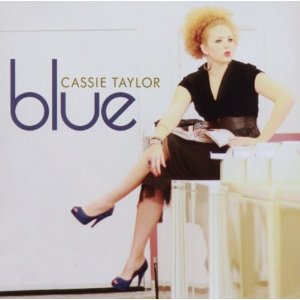
Blue is the debut album from multi-instrumentalist Cassie, who just happens to be the daughter of award-winning bluesman Otis Taylor (on eight of whose albums she's already appeared!); but it's her voice, rather than her bass or piano playing, that dominates the airwaves on this collection of ten self-penned songs.
Her music is a reasonably forthright, at times quite chirpy blend of contemporary blues, pop and rock with a touch of country. If that implies it lacks a specific or defined identity, then I tend to feel that way, at least for much of the skimpy 32-minute duration of this album. Cassie displays a passion for music-making, sure, and her songwriting is par for the course for a young lady her age (exploring the trials and tribulations of a 20-something woman), but her melodies often owe more to the pop stylings from which she derives much inspiration than to the blues in which her music might be more expected to be rooted. Perhaps the most memorable tracks are the jangling odyssey of Keys, the driving Make Me Cry and the shimmering Haunted.
Yes, Blue is a confident enough first-step, but I suspect it wouldn't make the impact it does without the powerful contributions of guitarist James Rooster Olson and the solid drumkit-grooves of Jeremy Colson, and neatly-staged guest appearances from the likes of harmonica player Steve Marriner. It's all very well recorded, though: suitably crisp and bright with plenty of presence and with a keen ear towards radio play. You might like to know that Cassie will be part of an intensive European tour of the all-female group Blues Caravan "Girls With Guitars" later this year.
David Kidman March 2011
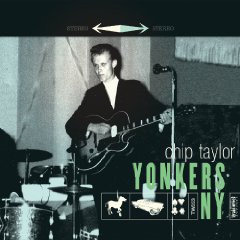
I'm a bit ambivalent about this one. I like Taylor, he's an excellent live raconteur and he's written some great songs. However, this heavily autobiographical album seeks to capitalise on the former without providing any of the latter.
Released as a special edition with a 32 page booklet annotating the songs and 2CDs, one featuring extended versions of the songs containing Taylor's stories and one with just the short non-narrative versions, it's basically conversational reminiscences about his Yonkers childhood (when he was Jamie Taylor) and family.
The opening banjo strummed Barry Go On, for example, recalls brother Jon's Hollywood ambitions, eldest sibling Barry's nascent geological aspirations (he went on to become a renowned vulcanologist), his own musical ambitions and how it took six years to figure out his dad was a golf pro and not the FBI agent he'd persuaded them he was. Then he breaks off to talk about how 8 yr old Barry stole $10 from his dad's pocket for he and Chip to take a train ride and how they ended up cave exploring.
There's more sibling memories with Bastard Brothers (about how they had mom stop him playing the fiddle), Charcoal Sky tells of trips their father took them to the train station so they could flatten nickels on the tracks, and 4/4 shuffle Gin Rummy Rules wryly recalls how he learned maths through gambling.
As with the title track's nostalgic reflections, there's several songs about 50s Yonkers life. The honky tonking 50s rock Yonkers Girls pretty much speaks for itself while Saw Mill River Road and Hey Jonny respectively tell how Johnny Cash and Bill Haley turned his life around in a town where the only music was 'white fluff stuff. The former references Big River, the song he wrote for Cash, while, incorporating Rock And Around The Clock and namechecking The Blackboard Jungle, the latter is a pithy summation of how rock n roll revolutionised a generation.
None of them are going to rank alongside his classics, but there's a comfortable relaxed warmth in their telling that ensures they slip down easy.
Mike Davies January 2010
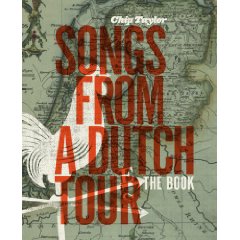
Chip's musical career has been fragmented, in fits and starts. The first phase was as legendary songwriter and then country-rock performer of the early 70s, which culminated in a tour of the Netherlands in 1975. The second phase followed his return to music in the 90s, and had as its highpoint the series of duet albums he made with Carrie Rodriguez. Right at the end of their musical partnership, in 2007, they toured Holland; during this tour, Chip wrote a series of songs capturing the events of that tour, his thoughts about ending the partnership and the people he was meeting along the way. This CD presents solid studio performances of these songs, with Chip backed by a simple guitar, bass and drums lineup (Hans Holzen, Kyle Kegerreis and Tony Leone), and it's a quality collection, sure. The vast majority of the songs are personal and reflective, performed in a confidential tone and clearly deeply felt: titles like Song For A Dutch Girl (Tess), Rose Of Arnhem Town and Song For A German Girl (Lisa) say it all really, and these are fine songs indeed without exception. Dance With A Hole In Your Shoe is another masterly evocation which shares with That's It From Here a semi-spoken method of delivery, and Jack Of Diamonds/Queen Of Hearts is an especially poignant self-portrait of the Taylor/Rodriguez partnership. For this tour, Chip also revisited the first song he ever wrote, Faded Blue, and there's a loving new rendition of that song midway through the disc.
But the complete package is so much more than a 42-minute music CD. The book's role as a raison-d'être and companion to the CD ensures that it contains Chip's essential background notes to the composition of the songs, together with their lyrics reproduced in full, and a blog-style chapter of notes to the individual dates on that final tour. But the book is so much more, for in its preceding 70 or so pages Chip takes you through a kind of potted autobiography (chapter one) and an overview of the years with Carrie (chapter two); these pages are liberally laced with period and archive photos, and bring the legend alive most attractively. Inevitably then, it's more of a personal memoir than an official autobiog, and as such it probably doesn't yield any fresh insights for the existing Chip Taylor fan, but it's still a document worth having and I'd say an essential purchase for the music on the CD alone, notwithstanding the fact that the various elements of the project dovetail so well together.
www.myspace.com/chiptaylorsolo
www.trainwreckrecords.com/chip.html
David Kidman April 2009
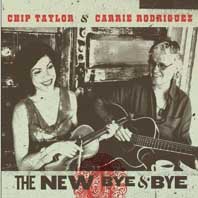
Anyone who thought that the fact there's been no album together for five years indicated some sort of fall-out between the two will be happy to discover that this best of compilation from the four duo releases between 2002 and 2007 is preceded by four brand new recordings.
However, to take the retrospectives first, debut album Let's Leave This Town furnishes its title track, Sweet Tequila Blues and Him Who Saved Me while the even better sequel, The Trouble With Humans, takes the lion's share with five cuts; the co-penned waltzing Memphis, Texas and fiddle driving stomp All The Rain, plus three Taylor numbers, the uptempo Laredo, the superb Don't Speak In English, and the forlorn loveliness of We Come Up Shining.
From Red Dog Tracks comes fiddle scraper Keep Your Hat On Jenny, barroom swayer Big Moon Shinin' and Must Be The Whiskey, though it must be said that the actual best numbers on this somewhat underwhelming third offering were a cover of I Can't Help It (If I'm Still In Love With You) and the lengthy instrumental Elzick's Farewell.
The final two old numbers are taken from the live album recorded during the 2005 German tour, a chance to roll out two Taylor standards with a vocally low key but musically growly Wild Thing and soaring Angel Of The Morning.
The new stuff, then and it's like there's been no time between as they trade verses and harmonise on seductive bluesy slow waltz The Island, the reflective lost love Play It Again Sam, the title track's harking back to the domestic spats in song of George and Tammy and, one of the best things to come out of their time together, the achingly resigned Your Name On My Lips with Carrie's fiddle in heartsplitting form. They may never make another full duet album, but if separation can inspire work like this let's hope they at least find time to get together now and again.
www.carrierodriguez.com
www.trainwreckrecords.com
www.myspace.com/chiptaylorsolo
Mike Davies November 2010
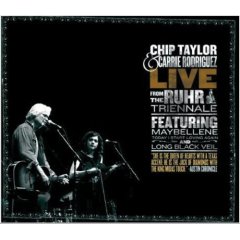
The annual festival at Germany's industrial heartland (the Ruhr) has been going for five years now, and an integral part of it, the Century Of Song concert series, is dedicated to the art of the great songwriters: the participating artists are mandated to feature their own songs as well as their favourites from the past century. So on this concert, the inclusion of numbers like Long Black Veil and Merle Haggard's Today I Started Loving You Again (and Chuck Berry's Maybellene, come to that) are no surprise to Chip's fans, and they receive warm, accomplished renditions that don't disappoint (especially the wonderfully atmospheric LBV), while for the origjnals Chip draws for the most part on songs from his three joint albums with Carrie, turning in performances that, while significantly better than respectable, don't spring any surprises or add much to those on the studio albums - and although the songs themselves are pleasing enough it would I think be fair to say they're not considered to be quite Chip's very finest work. But it helps that Chip and Carrie are blessed with a crack backing band which includes among its ranks Bill Frisell, Greg Leisz, David Piltch and Kenny Wollesen, all at their best here; Carrie's own fiddling is just fine, while they even draft in Buddy Miller to contribute (including playing a fairly spectacular solo) on Wild Thing, which (inevitably!) is saved to last just to round off the gig (capping off a rather fine take of what's arguably Chip's next most well-loved composition, Angel Of The Morning).
David Kidman January 2008
Chip Taylor and Carrie Rodriguez - The Trouble With Humans (Trainwreck)
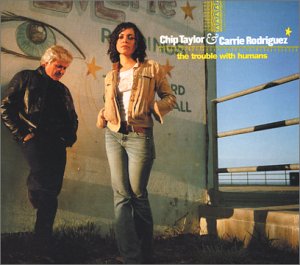
Now comes an even better follow-up, one which doesn't mess around with a winning formula (thought the social issues have taken a breather this time) but which also marks their first co-writing partnership on three tracks, Memphis, Texas (a get to know who I am song titled for the town where Rodriguez's grandmother was born), the stomp around fiddle driving they won't tear us apart All The Rain, and the two men in my life sparse ballad Confessions.
The other 10 are down to Taylor, a familiar collection of his aching stories of regret, broken relationships, self-recrimination and holding up. Around the live set for a while Don't Speak English is a wry love song about being honest with your feelings and letting music do the talking, the gentle lullaby title song echoing similar sentiments while elsewhere Oh Ireland's a love letter to an old flame, Fall a hymn to letting go and trusting someone catches your heart on the way down, Laredo and the surely George Jones influenced Dirty Little Texas Story both stories of love that's taken some twisted roads looking to find its doorstep.
Wrapping it up with I Need A Wall, a stripped back scraping fiddle and dobro duet which puts a divide between its failing lovers and their hurt, and the equally forlorn but rather more optimistic weather the storms of We Come Up Shining, it then sneaks back up on you for hidden track Oh Me's harmonica blowing swipe at corporate music and celebration of radio stations who still play good old country music because they like it and includes Chip doing a passable Johnny Cash.
At some stage down the line I'd like to hear Taylor revisiting the social and political notebooks that provided the reference points for his stunning Black & Blue America, but for now I'm more than happy to share a whisky glass with the pair of them and sweep out the ashes in the morning.
Mike Davies
Chip Taylor & Carrie Rodriguez - Let's Leave This Town (Trainwreck)
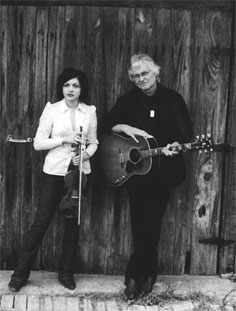
If for nothing else you should know Taylor as the writer of Wild Thing and Angel of the Morning, reworked by Shaggy for his No 1 hit Angel. He's about a lot more than that. The brother of actor Jon Voight, uncle to Angelina Jolie, a former professional gambler and a veteran singer-songwriter and storyteller of American roots-country. After a 16 year sabbatical he returned to the music business in 1996 with The Living Room Tapes album. Since when he's enjoyed something of a career renaissance, both as a regular live performer and with a clutch of new albums of which his last, Black and Blue America, contained some of the best things he's ever written.
He returns now in tandem with 23 year old Texas fiddler/singer Rodriguez, daughter of singer-songwriter David, their relationship having gone from support slot to duet to full fledged collaborative album within a year, a fine collection of new Taylor material that features her twangy Lucinda Williams-ish vocals on harmony, duet and, on the Texas hot club fiddle swing Extra, even lead.
Jazz-blues rear their laid back head on Do Your Part, while elsewhere the moods veer between jaunty upbeat and wistful reflection, from the lost love regrets of There's A Hole In The Midnight and leaving song His Eyes to the defiant rebel lovers of You Are Danger (where she sings I'm their bitch on the run... I got ways I can shoot right through them') and the politically veined He Who Saved Me which finds Taylor sounding a lot like John Prine.
There's a couple of covers too, Rodriguez leading a rousing bluegrass fiddle stomp through Say Little Darlin' and a Celtic hued reading of the trad instrumental Midnight On The Water recorded with Boys of the Lough guitarist Malcolm Stitt. And, just to bring things full circle, a gorgeous version of Taylor's vintage Storybook Children, the old Billy Vera and Judy Clay hit that provided that onstage duet that set the teaming in motion. Could well prove the start of a roots-country teaming to stand up there with Gram and Emmylou, Lee and Nancy, and Kris and Rita.
Mike Davies
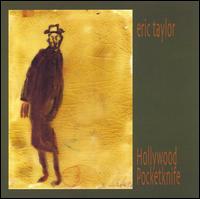
With the recent passing of John Stewart, the list of Class A Americana storytellers grows ever shorter. Fortunately, the 59 year old Texan is still going strong with his songs of lovers, losers and scraping a living among the barrooms, flop houses, carneys and highways of his landscapes.
Honed and sharpened, this is one of his best collections, opening in future classic form with the title track's journey through the past as the ghosts of James Dean, Marilyn Monroe, Robert Mitchum, Chaplin, and Richard Burton pass through the narrative leaving a trail of sadness and regret but also compassion and celebration of life lived.
The difficulty of keeping a relationship together when you're divided by different dreams informs the dust coated bluesy Carnival Jim and Jean while Postcards, 3 For A Dime offers another tale of love gone bad, sung from both sides of the divide and both the sax streaked Jail Widow's Walk and the spare, stark Better Man offer mini screenplays of characters mired in their private hells and quests for salvation.
Perhaps one of the most moving numbers is Peppercorn Tree, a first person reflection on childhood and youth, and of the girl who became a wife and now lies buried in the shade of the tree by their little house on the border.
There's a definite personal input to Olney's Poison and the Houston Blues, a trad sounding blues folk number that both lyrically and musically references old friend and fellow Texan songwriter David Olney.
Both men were also friends of Townes Van Zandt, so it seems appropriate that he should provide one of the album's three covers with a desperately aching version of Highway Kind drawn from a deep well of loneliness.
For the other non originals, he's turned to Susan Lindfors, who also lends her vocals to the slow dancing melancholic A Matter of Degrees, and dug into the Civil War songbook for a sparse and weary July 4 reading of Rally 'Round the Flag where, among others, he's joined by Lindfors, Steve Fromholz, and Vince Bell. Treasure him deeply, there's far too few of his kind still around.
Mike Davies March 2008
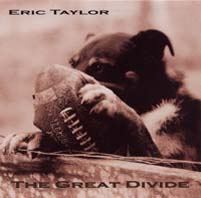
Inspiration and mentor to Steve Earle back in the early 70s, Taylor grew up in Atlanta, soaking up soul music and learning to play the blues guitar stylings from the likes of Lightnin' Hopkins and Mississippi Fred McDowell before moving to Houston and finding his own voice, as both guitarist and songwriter, in American folk roots. Having won the New Folk competition at the 1977 Kerrville Festival, finally Taylor released his debut, Shameless Love, in 1981 but, while he was supplying songs for the likes of Nanci Griffith and Lyle Lovett, it would take a further 14 years before the self-titled follow-up emerged. Three years after that came the critically acclaimed Resurrect, but there's been nothing new since the release of Scuffletown back in 2001.
Still waiting for the wider world to latch on to someone Griffith has called "the William Faulkner of songwriting in our current time," he now resurfaces with an album that may yet prove his masterpiece. A storyteller in the tradition of John Stewart and Springsteen, blessed with a dust coated voice, Taylor writes small screenplays about characters trying to live in a world that constantly seeks to bring them down or pen them in. Listen to Big Love, a heartrending story on the overweight James Willis Hardin who calls up a number scrawled on a box of matches to talk about a life circumscribed by his mother and her florists. In a throwaway line, we realise he's committing suicide, still worried what mom will say about the blood on the floor.
Or then there's the broke and busted musician of Manhattan Mandolin Blues, the two old hearts whose love has endured time and the loss of a child in the poignant Bonnie & Avery, Mickey Finn's down on his luck gambler and the metaphor of despair knotted in the image of "a high-jacked hung man" to be found in Whorehouse Mirrors & Pawnshop Knives.
Loss, failure and (beautifully captured on Storms) loneliness colour Taylor's songs, but as detailed on Shoes ('something's goin' to happen today") there's hints of hope and relief too, even if, as with the title track, it comes from stolen moments with 'another woman just rocks me when I cry".
It is though, the blues that prove the inspiration and mood templates, and fittingly the album's two non originals pay respect to the influences with covers of Arthur 'Peg Leg Sam' Jackson's Ain't But One Thing Give A Man The Blues and Townes Van Zandt's Brand New Companion, the latter incorporating variations on Lulu's Back In Town and Dirty, Dirty. If it produced albums like this, long may misery walk by Taylor's side.
Mike Davies, Sept 2006

Tricky things covers, stray too far from home and it all becomes a bit of a self indulgent hodge podge, stay too close and what's the point? But you just knew that a master craftsman like James Taylor would get it just right. No song has ever suffered when exposed to his natural warmth, intelligence and sympathy and this is no different.
He sets his stall out right from the off. However, if you were to write a wish list of James Taylor songs, I doubt that Oklahoma's Oh What A Beautiful Morning would feature highly, if at all but once you've listened, the penny drops. Taken out of the theatre, the song is transformed from a rousing anthem into a more thoughtful almost introspective observation. It's almost as if Taylor had thrown open his curtains and was simply but eloquently giving voice to his thoughts about the scene that confronted him. A song that is restricted to the European is a curtain raiser to remember. There are two other Euro only tracks, a haunting version of Tom Waits' Shiver Me Timbers and an OK Knock On Wood, it's fine as far as it goes but Taylor never seems entirely at ease with it.
Strangely, the Grammy-winning song that should be made for James Taylor is one that takes a little time to get used to. Again it's little to do with Taylor himself but it takes a couple of listens for the voice of Glen Campbell to finally fade from the background of Wichita Lineman, a song that can make grown men cry.
It's definitely a fine line that James Taylor treads, he is so ingrained into popular culture that it's difficult for the man not to dominate the music but he manages to keep the balance right with some challenging choices. A classic like On Broadway retains its own identity but Taylor gives it an added assurance, the song now sounds the result of a considered judgement.
Part of maintaining that delicate balance is that Taylor hasn't entirely given up his own unique qualities, a warm, thoughtful and intelligent appreciation of the music's roots. Perhaps the only times that are not 'pure' James Taylor are three of the most recognisable, Hound Dog, Summertime Blues and Not Fade |Away are surely golden memories and who amongst us could deny James Taylor either his fun, or his fond nod to his youth.
Suzanne, Shiver Me Timbers and a majestic, flowing Seminole Wind return things to more familiar territory. If the latter doesn't make the hairs stand on end, the fault lies with you. The bond between singer and song is unbreakable, proving that no-one gets under the skin quite like James Taylor.
It really shouldn't come as a surprise that Covers is the triumph that it is. If anything, the unexpected elements are the freedom and fun that James Taylor discovers in someone else's music.
Michael Mee February 2009
James Taylor - October Road (Columbia Records)
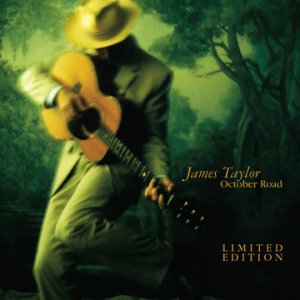
The excitement. The anticipation. Like caressing gift-wrapped parcels under the tree before Christmas Day. Savoring that feel; building the expectations. Then preparing for that moment to arrive. In this context it was listing the song titles in their running order. Don't Let Me Be Lonely Tonight. Freudian slip or over exposure to Presley? Then, catching Elvis's 'Aloha From Hawaii' concert on TV, he did Steamroller; mere coincidence or synchronicity? I never realised that Elvis had covered this song. The self-control it took to stay focused on his sister's album, until that review was finished, says a lot for Kate's CD. (If you missed it look under 'Taylor, Kate', in the Ts below).
Pen in hand; ready to make notes as I listened to each track for the very first time. Don't worry. This is not going to be a review track by track. The hyperbole would be way over the top, besides how many different ways can one say: 'Wow'? For dedicated Taylor fans this is it for now and no more needs saying. For those who are not, this one could be the CD that will reel you in. Yes. It is that good. It is not only as good as he has ever done, but the best so far.
Over the years his lyrics have contained a myriad of nautical references. Sometimes direct, sometimes tangential. His love of the open freedom of the sea is known and well documented. For me though, from the start of my awareness of him and his music, the references to 'Sun' and 'Sunshine' stand out. Within the first 10 seconds of the start I knew we were in for a bumper goodie. The guitar opening was enough. And then came even more: sun and geese, just as on his first single Carolina In My Mind. Two words into September Grass, the first track, a reference to the Sun appears. This song paints a vivid picture, with its simplistic sophistication.
Having listened to the CD right through, I then consulted the liner notes (with magnifying glass) and realised, that many of the different musical peaks I had noted, many were played by one guy: Bob Mounsey: from keyboards on the opening cut to synth line on track three to synth bagpipes, penny whistle and percussion on Belfast To Boston. The latter song is amazingly powerful. Taylor has never been afraid to nail his flag to the mast. With this song he has done it again. Music is a great leveler and avenue of communication across all Nations and Cultures. If music has the power to make people stop and think - well, this song will earn its place in history. I now find myself going back to it frequently. The combination of bagpipes, penny whistle and percussion is spine tingling. It just so happens that a while back I had reason to talk to a number of Irish musicians; when politics came up the telling message I got was that religion did not feature at all. If the music felt right on stage or in the studio then that was it.
Can we take it as a given that all the tracks are great? That way, I only have to name check a few which, for me, stand out. Saxes, percussion and Ry Cooder's contribution on October Road are memorable. James' tongue in cheek humour sneaks out every now and then, especially so on Mean Old Man in both the lyrics and the panting dog. Orchestration sublime. The jazzy 30's feel. This is a song that will endure.
Taylor does not, like many, hate having to regurgitate his most popular songs. When he is performing he takes himself back into the space, or spaces he was in back then and from which his inspirations sprang. On The Fourth Of July, his guitar and voice flow out seamlessly. He hardly seems to stop to draw breath, his lung capacity should make those of us who still smoke, sit up and listen! It sure sounds like James whistling along with the chorus before the last verse. Then straight into the very punchy opening of Whenever You're Ready with the horns and a far bassier and 'in your face' vocal sound. Again JT whistling along towards the end.
The track that resonated the most for me, however, as by far the most significant song, was Carry Me On My Way. I got goose bumps. James is a master craftsman in song writing and a perfectionist to boot. He has had joy and tears in his life - as we all do. The reason for my reaction was in the lyrics of the final verse:
"Who knows where the time goes
Only everything is everything
Feels like I'm wearing my father's clothes
Singing a song my brother would sing."
Who Knows Where The Time Goes, was covered by Judy Collins and used as the title track of that album. It is, possibly, the most compelling song of the British singer/songwriter, Sandy Denny, who died in 1978. It was not until '98 that more came out of the real story behind her tragic death. Then, in 2000, her biography was published. James has been on the same bill as Sandy and was aware of her work. James is an incurable romantic and the love songs, inspired by his wife Caroline, known as Kim are impeccable. Caroline I See You and Fourth Of July are the most obvious ones.
He had not worked with producer Russ Titleman for 25 years. Their interaction and collaboration on this CD, both building on the wealth of experience between them, reinforces the old cliché that 'the total is greater than the sum of all the parts'. Sally Taylor sings back up vocals with James on My Traveling Star. Her voice blends so well with her father's that she is hard to catch, so crank the volume up. Baby Buffalo is another goodie. Help! I am in severe danger of mentioning every track here. The rhythm section: Jimmy Johnson on bass and the tight drumming, of the well-respected session man Steve Gadd, are rock solid on every track. This newest album of James' radiates, yet again, a beacon of hope. He has brought so much sunshine into the lives of so many over the last 38 years.
I have been very lucky to see JT perform at least once in each decade spanning the last four decades of the 1900's. The last time was in Cardiff in 1999. The concerts on his up-coming tour of the U.K. and continental Europe are not easily accessible for me. I am disappointed but I do have another 8 years of this new decade to catch a concert. However, if you do get the chance to see him live; then please don't miss it. You could regret it later.
www.jamestaylor.com
myspace.com/officialjamestaylor
Miranda Ward 2002
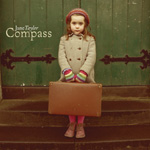
'Discovered' when Johnny Walker played a track off her self-financed shoe-string debut album Montpelier on Radio 2 and listener response went crazy, the Bristol singer-songwriter has since found herself supporting the likes of Seth Lakeman, Paulo Nutini and Jools Holland.
She's now in the solo spotlight to launch her second album, a collection of songs about the beginnings and ending of relationships, of reflection, and of self-exploration and self-confidence.
Her alternatively hushed and soaring gingham and girlish vocals building on core backing of cello and double bass, the instrumentation also includes piano, banjo, ukulele, violin, the Grimethorpe Colliery Band's cornet, horn and euphonium on Home and, on the gospel hued closer I Will Get There, even a choir.
While loosely fitting into the folk bracket (Nick Drake touches to Old Friends), her canvas also encompasses shades of blues (Where Is Your Grace?) and jazz (I'm Fine) while piano based numbers like Lay Down Your Sword. Home and the title track evoke a less quirky, more direct Tori Amos reared on Joni Mitchell. The jazzy-folk hypnotic rhythms of opening highlight Cracks also suggests she may have heard some Dave Brubeck along the way.
There's an infectious summer breeze and dragonflies over rippling waters feel to All Things Change while melancholy leans over the shoulders of Home's song of self-encouragement to carry on and the marvellous Hallelujah is a tenderly touching, grace-infused memory of childhood at her grandmother's side.
Weaving quiet charms and emotions that talk to direct to universal everyday emotion experiences, it's ultimately an album about journeys; you could do worse than become a travelling companion.
www.janetaylor.co.uk
www.myspace.com/janetaylormusic
Mike Davies October 2008
This set of reissues proves a veritable feast for those fans of this acerbic commentator who haven't replaced their worn vinyl copies of the various LPs concerned. Taking Ag Pleez Deddy first: all but four of its tracks were recorded way back in 1961 - "testimonies of a time which will not come again", complete with often extremely riotous audience reception - and you can guess both the classic status of these now-vintage recordings and their heady historical importance. Sadly, however, we are left to pontificate on the actual provenance of the remaining four tracks, seemingly studio recordings with a small-band accompaniment (from an EP perhaps?)… the only slight clue being in the date of Jeremy's own pithy liner note, 1996. The present disc appears to be the third CD issue of the album, so confusion can easily be forgiven I suppose. Shearing The Poms is a record of Jeremy's tour downunder in 1998, exactly as first issued on CD in 2004. It includes gems such as Half The World (aka Bugger Me!), Voice Of The People, Jobsworth and an extended I've Got My Rights!, also Jeremy's celebrated All Along The South Coast monologue. An appreciative audience, and Jeremy on good form.
Moving forward in time, Live In Chicago gives us a potent record of Jeremy's 2005 tour of the Chicago area, again to overwhelmingly responsive audiences. Those concerts included energized live versions of more of Jeremy's own favourites, including The Lift Girl's Lament, Hoddle Twaddle and a revisit of Black And White Calypso, as well as performances of some of his first new material in years like The Post-Apartheid Talking Blues; happily, there's not a lot of duplication between this set and the material on the above-mentioned earlier discs, which is helpful.
Folksound has done us all a great service by reissuing these albums, but it's a shame that the accompanying documentation is sparse indeed, or else merely reproduces that from the earlier CD reissue without providing any extra information that would put the recordings in greater (or any) context: a missed opportunity there. Especially since - as I commented when reviewing the first of the batch of reissues last year – a significant proportion of Jeremy's material will (paradoxically?) be considered hors-de-concours in today's ultra-PC climate..David Kidman February 2009
This set of reissues proves a veritable feast for those fans of this acerbic commentator who haven't replaced their worn vinyl copies of the various LPs concerned. Taking Ag Pleez Deddy first: all but four of its tracks were recorded way back in 1961 - "testimonies of a time which will not come again", complete with often extremely riotous audience reception - and you can guess both the classic status of these now-vintage recordings and their heady historical importance. Sadly, however, we are left to pontificate on the actual provenance of the remaining four tracks, seemingly studio recordings with a small-band accompaniment (from an EP perhaps?)… the only slight clue being in the date of Jeremy's own pithy liner note, 1996. The present disc appears to be the third CD issue of the album, so confusion can easily be forgiven I suppose. Shearing The Poms is a record of Jeremy's tour downunder in 1998, exactly as first issued on CD in 2004. It includes gems such as Half The World (aka Bugger Me!), Voice Of The People, Jobsworth and an extended I've Got My Rights!, also Jeremy's celebrated All Along The South Coast monologue. An appreciative audience, and Jeremy on good form.
Moving forward in time, Live In Chicago gives us a potent record of Jeremy's 2005 tour of the Chicago area, again to overwhelmingly responsive audiences. Those concerts included energized live versions of more of Jeremy's own favourites, including The Lift Girl's Lament, Hoddle Twaddle and a revisit of Black And White Calypso, as well as performances of some of his first new material in years like The Post-Apartheid Talking Blues; happily, there's not a lot of duplication between this set and the material on the above-mentioned earlier discs, which is helpful.
Folksound has done us all a great service by reissuing these albums, but it's a shame that the accompanying documentation is sparse indeed, or else merely reproduces that from the earlier CD reissue without providing any extra information that would put the recordings in greater (or any) context: a missed opportunity there. Especially since - as I commented when reviewing the first of the batch of reissues last year – a significant proportion of Jeremy's material will (paradoxically?) be considered hors-de-concours in today's ultra-PC climate..David Kidman February 2009
Kate Taylor - Beautiful Road (Front Door Records)

“We chose Beautiful Road (written by Erica Wheeler) as the title track because the metaphor of a beautiful road so poignantly describes the journey one takes through life”. And what a good choice it is. Since this CD arrived it has been listened to many times. I have also re-visited her first album Sister Kate. In the thirty + year interim she has had two albums but I never managed to catch up with them. However, for me, this long gap is more than compensated for with this marvellous new CD. The range of both musical directions and influences has been superbly blended. From a soft southern folk-gospel feel, along with soul and good old r'n'b and ending with the traditional 'Auld Lang Syne' - the album has been a long time in the making. It was started 5 years ago, produced by her husband Charlie Witham, who also wrote six of the tracks, and bassist Tony Garnier. Charlie Witham died last year after a long and protracted illness. He managed to see the project through to the end and it comes across as a positive testimony and celebration of his life and their combined love of life, family – both immediate and the extended clan – and music.
A lot of joy and laughter can be felt, especially in the song 'Blue Tin Suitcase'. 'He's Waiting' is another track that really cooks and has a driving energy to it. It is very effective mix of R'n'R and Country. Written by Kate, it reflects the diversity of the musical influences in her youth in North Carolina. The quality of the musicianship is sustained throughout and the whole CD stands up in its own right. However, there are nice surprises in some of the tracks, which feature guest musicians. The production is pristine and tight, although I would have liked Kate's voice brought more to the front in parts. Her vocals move from assertive to reflective to 'story telling' mode, especially in 'Shores of Paradise', yet another beautiful track, which, for me, has been mixed with her vocal levels spot on.
The opening track 'I will Fly' flows out in a gentle, country feel with her brother's voice making it, effectively, a very poignant duet. His in-put is rather more than just as a back-up singer. It closes, fittingly, with 'Auld Lang Syne'. This track has a lyrical adaptation by Charles Withem and musical arrangement by James as well as his guitar and vocal harmonies.
The album runs the gamut of emotions and styles, just as in life. The sun does still shine. A beautiful CD from a beautiful person: a joy.
Miranda Ward 2002

The fifth album release from Vermont-based Louise sees her developing and honing even further her uniquely sensuous brand of writing and her equally sensuous, husky vocal delivery on another fine set of original compositions that in their very obliqueness and economy some may find a mite less immediate than those on her predecessor (2000's excellent Written In Red), although I find this new set just as remarkable in its own way, as its specific virtues and slightly different brand of atmospherics together make for a very special kind of attraction. The wonderfully laid-back though intense ambience often recalls the work of our own Helen Watson (play Maps Of Venice or Strike The Set, and you'll hear what I mean), and the sparse-but-rich texture contains plenty of telling and intriguing touches such as the use of vibraphone as a defining instrumental colour on the opening Something Like This and the funky Midnight Rain and piano on the exceptionally sultry title track. The musical arrangements really breathe; just feel the acute sense of airiness and space around the jazzy vocal on Muddy Hudson, for instance, which features some characteristically hot'n'cool electric guitar work. And the skittering, clanking industrial funk groove of Firebox Coaltrain, which evokes prime Lowell George. Aside from Dean Sharp and Richard Gates (percussion and electric bass respectively), Louise uses a different crew of backing musicians here, which include Ken McGloin, Eugene Uman and Stephanie Winters, and this time round her co-producer is Annie Gallup, which may explain the inspiringly quirky nature of some of the instrumental balances. Like the playful, mbira-like chatterings of Call My Name (with delicious harmony vocals from Kristin DeWitt) for instance. All making for an appropriately distinctive setting for Louise's moody miniatures, gnomic masterpieces each and every one and of considerable lasting power.
David Kidman

Formerly 50% of Azure Ray and once part of the Saddle Creek roster, Taylor's new solo home finds her in upbeat guitar and bright melodies mood despite the fact most of the songs concern the break up of a relationship, gone' just like that' as she sings on Time Lapse Lifetime. There's skittering beats scurrying across It's Time while train rhythm drums drive along the summery dance skips of Green Butterfly, but generally speaking the album falls comfortably into the pop end of the folk-country spectrum. Lacing melodies with strings and piano, numbers range from the title track's strummed alt-folk and the 60s French cafe chanson airs of Broad Daylight and My Favourite...Love to the breathy sunlight on ripples Fiona Apple cheeked 100,000 Times and, co-penned by Michael Stipe, the shiny hula hula campfire sway and singalong closer Cartoons And Forever Plans. Taylor recommends that you listen to it 'in a dark room, with a candle or two...but definitely horizontal.' I'm more inclined to think it will have you spinning in the sunshine.
www.maria-taylor.com
www.myspace.com/mariataylor
Mike Davies April 2009
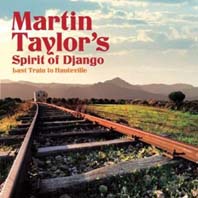
This music is all about feeling good. And I mean feeling good. Dubbed "the ideal soundtrack to driving through the scented country roads of France on a hot lazy summer's day" - yet with an invigorating dash of breeze to accompany that drive. Actually, this album's more of a travelogue than a car journey I guess, not least because there's a freewheeling, carefree spirit that just whips you up in the opening bars and carries you along with the bonhomie and abandon of the ensemble like that proverbial train along the track and straight as a dye down the line to Hauteville. And when that train has hit the buffers at the terminus, well there's every opportunity to chill out, to relax bossanova-style in the station bar at the Rue De Dinan, then contemplate peacefully in Le Jardin Anglais, then stroll by the ocean humming a chanson and observing les oiseaux blancs (La Mer), then paying a visit to the swinging saucery of Madame Haricot (clearly no has-bean!).
And so it goes. Every stopping-off point is thoroughly delectable. You get the (loosely impressionistic) picture... And it's all in the scintillating and entirely convivial company of our bon ami the master guitarist, whose effortless artistry is breathtaking in the nicest possible way. Martin's own compositions, which form the bulk of the set, afford plenty of space for neat little solos that as ever are impeccably judged and create space for the other musicians. Oh yes, please let's not forget Martin's compadres, his crack gypsy-jazz ensemble Spirit Of Django, now-reconstituted after a short layoff. Still comprising Jack Emblow, Alan Barnes, Alison Burns, John Goldie, Terry Gregory and James Taylor, they prove idiomatic and generously soulful right down to the very last soupcon! And Alison even gets to step up to the front mic for a couple of delicious numbers too. Et voilà! What a holiday! The drawback, as with all great holidays, is that you never want to come back home! But when you do, there's always the memories, the photo album - this album. Thankfully.
www.martintaylor.com
www.theguitarlabel.com
David Kidman May 2010
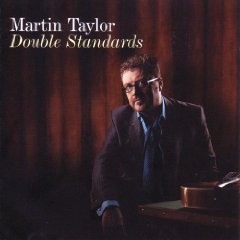
Over the course of his long and illustrious career, it's been continually impossible to imagine award-winning acoustic guitar virtuoso Martin Taylor coming up with a fresh angle for each successive album - but once again, on his latest he's proved himself more than capable of providing a new twist on his talents and produced so much more than just another guitar record.
In fact, for Martin it's the timely realisation of a long-held ambition, to create a guitar duo album consisting only of (overdubbed) parts played by himself on the same instrument - as the delightfully punning (I'm tempted to use the term "double-edged"!) title denotes - on a superbly chosen selection of standards (principally, though not exclusively, culled from the broader jazz repertoire). These range widely in mood and style, yet each title has a special resonance or association for Martin.
The opener Triste is a première (for Martin) recording for Martin of the early Latin fusion tune by Antonio Carlos Jobim. Then there's the forthright yet relaxed swing of the Duke Ellington number Drop Me Off At Harlem (with its integrated Big Band Guitar Sound) followed by a wonderfully tender, lilting rendition of the Burt Bacharach film theme Alfie (inspired by Matt Monro's treatment). Elsewhere, Martin's new take on Gershwin's Someone To Watch Over Me features some seriously inventive rhythmic embellishments, while his version of Young And Foolish features a melody part inspired directly by Tony Bennett's vocal line and enjoys a telling degree of insouciance amidst the knowing maturity of the phrasing. The scintillating finale Just Friends is built around fresh improvisations recalling how Martin and Joe Pass used to play the tune together. Every single track yields fresh insights into the material, both in terms of Martin's evolving response to it and his exemplary, unrivalled technique (faultless but never soulless).
Finally, we've come to expect a world-class recording quality from this source, and there's not a smidgen of disappointment here either. My only quibble would be with the decision to fade Estaté, a piece which Martin has over the years performed live as a duet with several different guitarists. But there's no escaping the fact that this is a spellbinding, classy, truly top-of-the-stack release whose appeal should by rights not be confined to guitar buffs.
David Kidman November 2008
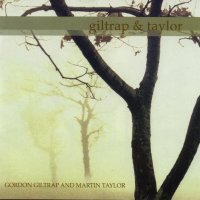
Both guitarists are so well known and respected in their own genres of folk and jazz guitar - the adjectives world-class and legendary spring instantly to mind - that there's no point taking the first paragraph to tell you all about them. But I will talk about the album and it's history!
From Giltrap's website: "Whilst touring in 1989, Gordon happened to be playing in Martin's home town. They met up after the concert, chatted generally and agreed to keep in touch. The following year Martin did get in touch suggesting the possibility of them playing together. Gordon's initial reaction was one of apprehension having never worked with a jazz musician let alone one of Martin's calibre. Eventually they did meet up and proved the point that, given the right choice of material and the desire to make it work, a collaboration of this kind can work. 'A Matter of Time' was released to coincide with their tour in the autumn of 1991".
This album of original compositions from both musicians has been digitally remastered and is re-released now with four bonus 'live' tracks. It's as smoothly polished as instrumental guitar music can be and yet retain it breathtaking freshness. The collaboration works exceedingly well. At times it's impossible to believe it's not an orchestra but just the two of them - guitar synthesizer and bass lines give it breadth and depth. And then there's the perfection in the detail: playing, phrasing and improvisation ...
Giltrap & Taylor is a Classic. This is true artistry for all those who love and play acoustic guitar - and for the latter, the tunings are given in the sleeve notes for each track! You know you'll want it - Oh yes you will! - go on, go on, go on!
www.martintaylor.com
www.giltrap.co.uk
Sue Cavendish
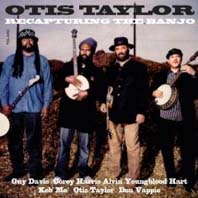
Otis Taylor's best known as a bluesman - a guitarist-extraordinaire and storyteller-songwriter of deep integrity and with an emotionally charged political and historical sensibility. He's also renowned for coming up with something both thought-provoking and usually entirely unexpected, and this new album, his seventh, proves no exception.
The clue, of course, is in the title, which rather implies a thesis in the making; and this turns out to be both correct and true, the central idea being that the banjo has been hijacked away from its African origins by folk and bluegrass, and the connection needs to be re-established. To achieve this act of recapturing (and make an important political statement), Otis not only proudly showcases his own extensive banjo chops (not many fans know he was nominated for Best Instrumentalist in the banjo category in two consecutive years of Blues Music Awards), but also enlists the help of some of the most accomplished black (African-American) banjo players on the current roots scene: Guy Davis, Corey Harris, Keb' Mo', Alvin Youngblood Hart and Don Vappie, to whom Otis yields the primary spotlight on key occasions.
With the way the banjo's played on this album, you really can hear, and appreciate, how the original heavily percussive playing style of the African griots was transmuted, with the addition of syncopated melody, into a more obviously "European" style. Fascinating and absorbing, Otis takes the listener through revealing treatments of songs we all know and love (Little Liza Jane, Deep Blue Sea, Hey Joe and Walk Right In) and on into no fewer than seven of his own choice compositions (the pick of which for me is the poignant Ten Million Slaves, on which he's joined by Cassie Taylor for vocal backup), with a delightful Keb' Mo'/Lisa Linson cut (The Way It Goes) providing a gently laconic finish to the set. And hey, the sound of four banjoists together on Simple Mind and Ran So Hard The Sun Went Down is also a revelation!
Well, the humble banjo has long been the butt of endless - and often entirely unjustified and unjustifiable - bad jokes, but this stimulating CD should go a very long way towards the overdue rehabilitation of that much-maligned instrument.
David Kidman May 2008
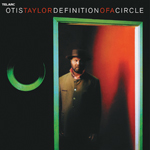
Reviewers have a great life, new album comes in and new favourite artist emerges. I've had at least ten new favourites this year alone! The latest of these is Chicago bluesman, Otis Taylor. He's released seven albums, before Definition Of A Circle, since returning to the music business after an 18 year break and this is the first time that our paths have crossed. Definition Of A Circle opens with the sustained guitar of Little Betty, provide by Gary Moore. The Hammond organ, operatic vocals and Taylor's smokey voice supplement a track that has it all. The only drawback is the addition of acoustic guitar late on - I don't think it was really necessary. The track listing on the sleeve gives a potted summary of each song and Taylor describes this as "A banjo player is seeing a married woman. The situation gets too hot and he decides to leave town". Black's Mandolin Boogie is not a boogie as such but is a hypnotic classy roots offering. It is also about the plight of the European Gypsies and inspired by the book, Princes Amongst Men. Rich Sharples and Nick Amodeo provide the mandolin. Looking Over Your Fence is another rhythmic, mesmerising song and he certainly pays his dues to the old-timers here. Charlie Musselwhite adds his stunning harmonica to this tale of wife and land stealing. Hurricane Katrina influenced They Wore Blue is pared down blues rock and is without percussion. Taylor has a style of his own and I am amazed that he is not a bigger star than he is. The U2 style guitar and elegant organ build the song up to a wonderful finish. Taylor shares the vocal with daughter Cassie on Few Feet Away. This very soulful acoustic lullaby has a telling cornet contribution from Ron Miles.
Something In Your Back Pocket opens up a noise-fest and has a spoken vocal on top. Jimi Hendrix influences abound. The piano-led My Name Is General Jackson follows and the cornet and cello backing are sublime. This is rootsy and contemporary at the same time and that is no mean feat!! Taylor returns to blues rock for Love And Hesitation and it is no surprise that the snappy guitar belongs to Gary Moore. Moore's guitar work is simply stunning and sometimes means that Taylor's voice is glossed over but don't fall into the trap of thinking that he is not an accomplished vocalist. Maharaja Daughter is a tale of travel and the fusion of banjo, cornet and cello quartet adds up to a very strong tune. Just sit back and take it all in. Taylor tries a little free form jazz on Long Long Life but it just does not do anything for me and is the weakest track on offer. He is back to form on Mexican Cowboy as he pulls all of his influences together, adds drums by John Kelly and organ from Brian Juan and loops it all together in a J.J. Cale style. This excellent album finishes with Lifetime Of Freedom. This is either repetitive or hypnotic, you choose, and he manages to stay contemporary whilst remaining true to his obvious roots. The sentiment of the song will ring loudly with my fellow Scots; you can take my land, you can burn my house but you will never take my freedom.
Otis Taylor is my artist of the week but that could easily stretch to months or years.
www.otistaylor.com
www.myspace.com/tranceblues
www.telarc.com
David Blue April 2007
Otis Taylor - Below The Fold (Telarc)
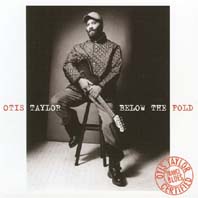
You've not heard of Otis Taylor? You have now - he's being spoken of in high places as the most relevant blues artist of our time.
With his 7th album, Below The Fold, he's continuing a creative journey through new blues territory. If the Blues is about traditional blues roots, purists take note; Taylor did not wake up this morning in urban Chicago (although he was born there) or the Mississippi Delta. However, their ghosts remain deeply within him and his family's past history includes the odd murder and shooting - as all true bluesmen's history should.
Musically, Otis Taylor's Below The Fold is a collection of pulsing guitar and bass grooves accompanied by or surprisingly punctuated with drums, slide guitar, trumpet, cello, fiddle, organ, harmonica, mandolin and banjo - but it's the Blues for sure. Lyrically Taylor writes and sings of poverty, politics, passion - dark thoughts and stories in a minimalist, free-form, stream-of-consciousness-John-Lee-Hooker way.
This new blues engine is powered by multi-instrumentalist Otis Taylor on guitar and his talented daughter Cassie on bass. The opening track, Feel Like Lightening, is a shout-out, slide guitar, fiddle and banjo stomper that'll get you on your feet and keep you there. The mood then slows and darkens and the rest of the album's ten tracks unfold in hypnotic and relentless fashion: original, unconventional, painful, provocative, yet accessible. Cassie sings backup along the way and solos on the Working For The Pullman Company.
If you love fresh blues, buy the album and listen to Otis Taylor. The blues is a broad church and Otis Taylor is a compelling preacher.
Sue Cavendish
Yes, this is the self-same Ron Taylor who first cut his singing teeth with the Songwainers down in Cheltenham, then with Sue Burgess and Graham & Eileen Pratt formed the mighty Regal Slip. What a lineage - two of the finest (and most inventive) vocal harmony ensembles in folk history, yet each so different in character. Probably no wonder, then, that Ron's glorious vocal tones are the principal focus of this fine new CD. His voice has such a memorable timbre, incorporating within its ornamentations a distinctive warbling tremolo that gives the line a definitive strength and purpose; there's also a quality of forthrightness of attack in some of the upward leaps which (and I hope neither singer will object to this observation!) much recalls a similar trait in the singing of Brian Peters.
But let's not go too far: Jeff's instrumental contributions should not be underestimated either. As the duo's right-on "manifesto" states regarding their approach to the songs they've recorded: "When it comes to the interpretation and arrangement, the song comes first, the singer comes second and the accompaniment comes last. The accompaniment must be sympathetic so that it enhances and does not constrain the song - but that doesn't stop the accompanist from having a really good time and even showing off occasionally (as long as it doesn't get in the way of the song). One thing that we find particularly helpful for the creation of sympathetic accompaniment is when the accompanist knows the words as well as the singer does..." And Ron and Jeff clearly practise what they preach, for Jeff's accompaniments - equally proficient whether on guitar, mandola, mandolin, English concertina or Appalachian dulcimer! - are the model of taste and intelligent restraint yet able to revel in the tunes (which have to be worth singing too, of course) while proudly displaying a complementary personality all their own. These abundantly lithe accompaniments, even the more delicately phrased of them, really do enhance the power of the voice singing the songs, making a significant contribution to bringing the words (and importantly, also their tunes) alive. The opening track, Lisbon, being a case in point: a very compelling reading indeed with a weight that belies the apparent gentleness of the accompaniment. Throughout the disc, the balance between voice and accompanist is ideal, with all due resonances fully exploited in the clear, crisp yet full-toned recording. Thus proving the CD's title: both performers shining as one indeed.
So what of the songs (which according to the manifesto are the most important part of the package)? Well at first quick glance the tracklisting appears distinctly unpromising, with some overly well-trodden titles (John Barleycorn, Green Bushes, Rocking The Cradle, Thomas The Rhymer, Seven Little Gypsies...) - but stifle that yawn, for these all turn out to be truly refreshing renditions of interestingly selected and compiled versions (sources for which, both documentary and sung, are properly itemised in the duo's concise yet informed booklet notes). Boring they ain't! Jack Caundle turns out to be a delightful variant on Sam Hall, while the two selections with John Barleycorn in the title are completely different in character. Having mentioned the above titles, I'd point out that the CD does have its share of more obscure songs too, such as Ferryland Sealer (a Newfoundland sealing song) and The Soldiers' Return From The Wars. The duo's accomplished vocal harmonising on All Among The Barley demonstrates a ready ease to their craft and I'd liked to have heard more of them singing together. Their hearty unison singing on the finale Kind Friends And Companions then provides a perfect, warm end to the disc. I was intrigued and amused to read, incidentally, that this fine example of the farewell song genre was acquired from Sue Burgess, who "learned it from Taffy Thomas while he was getting his hair cut"! (so does that mean he was being treated most barberously, I wonder?!)
David Kidman October 2006

Joanne Shaw Taylor first burst onto the scene at the tender age of 16 when she was discovered by Dave Stewart of Eurythmics fame. The following summer she toured with Dave, Candy Dulpher and Jimmy Cliff and has been honing her blues themes ever since. Her debut album, White Sugar, has been produced by the legendary Jim Gaines and he has pushed her to the limit.
She opens with Going Home, a beefy opener which suits her smokey voice. She is the complete package as she is a more than competent guitarist too. She has been described as the love child of Dusty Springfield and Stevie Ray Vaughan so just close your eyes and imagine what she sounds like. Just Another Word is a mid-paced funky rock and Bones is gritty blues rock with a scorching solo which slides along very well. Who Do You Want Me To Be? is high energy and Time Has Come is a slow, classic blues with a big solo.
The eponymous title track is a funky, biting blues but Kiss The Ground is an altogether more rock influenced sing although it is nothing out of the ordinary. Heavy Heart is soulful and a strange change of direction towards the end which is a little bit unnecessary. Watch 'Em Burn is a pulsating rocker and shows how good a guitarist she is. She closes off with Blackest Day, a classic blues with one of her big, blossoming solos. As far as debut albums go I think that Joanne Shaw Taylor has shown that she has tremendous potential.
David Blue January 2009
I was distinctly impressed with this Kilburn-based singer-songwriter's 2009 release Calcutta Grove, notably for its compelling combination of intelligence and soul that could be more expected of an artist with twice Sean's age and experience. What I never quite understood at the time was folks' insistence on bracketing Sean's music as blues: sure, it has elements of blues within it, but that's more in the way of soul and sensibility than actual idiom, strictly speaking, and if I'm pushed perhaps the closest comparisons would be with John Martyn or Eric Bibb.
Even so, Sean's followup album Walk With Me starts off on another tack entirely, with a tender little piano-backed ballad, Perfect Candlelight, before the juicy yet gritty swamp-blueser Hold On takes grip on your senses. Gently aching, reflective balladry comes to the fore again on Slow Dance and For You, while the shuffle-swing-etched title track proves suitably seductive in its own way (indeed, more than a touch reminiscent of Dr John, I thought, is Sean's drawling singing on both this cut and the funky Feel Alright). Sean's niftily minimal prowess on the simple guitar comes to the fore on the closer (Fare Thee Well) and on So High, which employs a Chris-Smither-style clapped rhythm for its ostensible "in praise of the drug experience" stance. OK, so there's nothing on this new album that quite stands comparison with the feverish Nightmare on Calcutta Grove, but there aren't any letdown moments either, even though one or two of the new disc's curveballs may take some degree of accustomising. For instance, Sean turns in an imaginative cover of She Moved Through The Fair that transforms the song entirely with an insistent, lean bass riff backing Sean's weary vocal line that ushers in piano and electric guitar interjections and eventually a peculiarly Latino-tribal percussion groove and some spicy sax and Hammond organ interplay. And Sean's personal setting of Shakespeare sonnet Love Hate On is nothing short of elegant, with more piano and this time cocooned by Vyvienne Long's sweeping cello lines.
Trevor Hutchinson's thoroughly professional co-production for Walk With Me somehow gives Sean's music a slightly less overtly rootsy cast than his previous offerings (no criticism intended there); while the presence of extra musicians at judicious moments – B.J. Cole on pedal steel, Justin Carroll on Hammond organ, Michael Buckley on sax and Dave Hingerty on drums – only adds to the classy feel of the album.
David Kidman March 2011
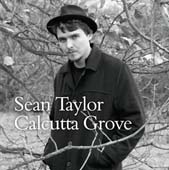
Kilburn-based Sean is described as a singer, songwriter and multi-instrumentalist, but that tag doesn't begin to do the breadth of his talent justice. Calcutta Grove, his third recording, is a veritable one-man extravaganza that shows Sean to be a consummate artist indeed.
Blessed with a uniquely compelling combination of intelligence and soul, Sean impresses right from the off, with sharply characterised and exquisitely moulded guitar work, a voice that speaks volumes in its expressive nuances, and some emotionally sensitive songwriting that makes thoughtful commentaries on the human psyche and the state of the world. Over just a few years he's keenly absorbed sounds and influences ranging from classic blues, soul, R&B and Motown to contemporary roots mavericks, yet his singing always takes a long, deep breath to convey its thoughts, more than anything recalling John Martyn (in its smokily hushed confidentials) but at the same time remaining original and supremely distinctive. Sean's guitar playing, while admirably economic, is tough in character and attack, and yet it can be remarkably understated; whatever, it's abundantly imaginative at every juncture.
The title song is a sparse and close-rendered lyrical metaphor for life's journey, intoned to an eloquent, almost improvisatory guitar part with telling but bare interleaved piano soundings. Three tracks in particular stand out within a record with no disappointments and many high points: Buried Alive is a bleak, pained and claustrophobic depiction of abuse and violence, eerily embellished and darkly atmospheric. Sean's highly innovative and strongly individual take on Skip James' Hard Time Killing Floor Blues takes the song out of its rhythmic and structural straitjacket and floats timelessly in the aural void yet retains its essence through a Chapmanesque drawling delivery of the lyric set against cascading, rippling electric slide figures. Finally there's the extraordinary eight-minute Nightmare, which fuses a feverish scattergun stream-of-consciousness lyrics with a dreamlike, almost hallucinatory backdrop (psychedelic acoustic and electric guitars generating a weird pulsing onward-driving beat, overlaid by insistent piano interjections and Norman Whitfield-style jazz trumpet (courtesy of the album's only guest musician, Gemma Fuller). Sean also bravely reinterprets Richie Havens' own celebrated version of Freedom, in a kind of musical homage inspired by having personally seen Richie perform; in contrast, Hold On To Your Love is a simpler, tender exhortation in the form of a Liebeslied piano ballad, while the jauntier tempo and slightly banal glittery keyboard and harmonica setting chosen for the more country-blues-styled Revelations offsets (and yet is strangely appropriate for) its pointedly biting commentary tinged with hope.
The brief instrumentals Salvo and The Concept Of Irony function as concise, almost Eno-esque ambient scene-changes, the drawing-across of a musical curtain between songs. The River Merchant's Wife is an impressionistic but beautifully reflective Satie-esque shifting piano piece inspired by an Ezra Pound poem, and forms an unusual, if in the end fitting conclusion to the record.
Sean will be taking to the main acoustic stage at Glastonbury, and he's many other dates in the offing.
David Kidman June 2009
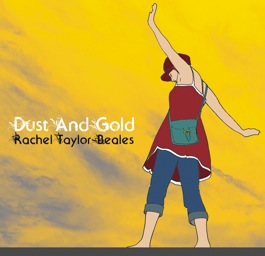
The final release of her colour trilogy (following Brilliant Blue and Red Tree) is a bit of lyrical globetrotter, charting her physical, emotional and spiritual journey to this point in time, though the songs are often told from a character's pov rather than her own.
Born in Australia, her homeland provides the setting for the first two tracks. Child In The Sun offers up a barefoot and blistered free spirit playing among the eucalyptus trees of Melbourne suburb Mt Macedon, ending with a wistful recognition of the same lost innocence that surfaces in Turnaround Town where, aged 10, she recalls a disturbing encounter with a distressed Aboriginal woman who, clutching a beer, grabbed at the handle of her mother's car begging to be run over.
Somewhere in Copenhagen is a playful tale of a couple of hungry newlyweds finding 'salvation' at a burger van at 3am, though the subtext - underscored by the Eastern European sax and gypsy violin fade out - is clearly taken from Bram Stoker. Life on the road - without Hammer Horror references - informs the piano accompanied Sing It Out, a musician's two year tour diary of arguments in Nashville and madness in Ireland by way of Mexico, London and Ludwigstadt, in Bayern.
Other tracks are more obscure and while one review claims Digging Down with its banjo and worksong rhythm and lines about the dry crumbling land refers to Australia it could just as easily be about the lost mining industry of Wales where she now lives. Equally, the poetic Feathers And Flowers with its double tracked vocal, cobwebbed folk air of spooked fecundity and images of petal, bone and rings of wire might have origins in Welsh mysticism or Aboriginal folklore alike.
However, searching to pinpoint inspirations and allusions can distract from the music and the overall thematic mood which, while almost all the songs talk of places and spaces, seems to be about soaking up life (Come On In), hanging on to the rollercoaster (a feverish gospel tinged Here We Go Now) or simply numbing yourself to the pain (She's OK) to make it through another day. As the title track, backed by simple acoustic guitar, puts it, 'hold out a palm with a kiss to that anger, make it disappear'.
I've noted before that's she's an extremely literate writer and much here has a novelist's turn of phrase or keen observation with imagery designed to conjure pictures or words (like 'aggregate') used as much for their sonic resonance as their meaning.
Musical texture is equally important. With Dylan Fowler producing, co-arranging and providing assorted guitars, clarinet, taragotta (a Hungarian wooden sax) and something called a tabwrth (answers on a postcard, please), and guest musicians on dulcimer, strings and accordion, the album was recorded 'live' - and partly improvised - in Abergavenny with Rachel noting that the rootsy tones of the banjo create a dusty feel with the sax and piano providing the gold texture. No surprise then to find the final track, Waiting For You, a spare combination of the three.
Melding together element of jazz, folk, blues, Americana, and gospel, the result (again illustrated by the closing number) is often deliberately dry and, even when the tempo picks up, there's an earthiness to the timbre that will again evoke thoughts of Nick Drake, early Joni Mitchell or Gillian Welch. On the title track she uses the phrase 'alchemy road'; it's albums such as this that provide the tarmacadem.
www.racheltaylor-beales.com
www.myspace.com/racheltaylorbeales
Mike Davies May 2010
York-based Holly's one of those self-assured singer-songwriters who's difficult to categorise: the acoustic indie nu-folk tag doesn't do her any justice.
Unlike some s/s of that persuasion, Holly's not at all precious: she's very personable – so much so that you feel easily drawn into her world even though she's mostly writing about relatively trivial, even mundane experiences that you wouldn't expect to be caring much about. She displays a real delight in sharing them with you, and there's an almost childlike simplicity to her no-longer-entirely-innocent communication of those experiences through her songs – Toes, for example, with its companionable reminiscence of the sheer effort of simply trying to get risen up and out of the house, and the opening Bush Song which is not a political rant about the USA but instead a cheeky ode to a patch of greenery being cut down in its prime. 7am is directly concerned with Holly's fragile relationship with her neighbours, while 24 Hours may state the obvious but it does so with a freshness and charm that proves irresistible.
Holly's own brand of wistful reflection produces some cannily-formed jewels of song that stick in your mind beyond that crucial first hearing, but her work does (if gently) demand your close attention. For by and large, on this collection of 10 new songs and one live track (making up her second full-length CD), young Holly naturally and effortlessly escapes the potential charge of ephemeral insubstantiality and making something out of nothing, as much through the beautiful and truly seductive immediacy of her vocal delivery as through the unpretentious and accessible poetry of her actual songwriting. Economy, and a sensible refusal to make a meal or a mountain out of a mere molehill (as it were) is a virtue, and a talent that fewer songwriters actually possess than claim – and Holly's one of those natural bearers of that skill. Perhaps the only drawback is that almost all of the tracks weigh in at a broadly similar tempo, a gentle and unforced ripple that can seem a little unvaried after ten songs.
One could also argue that the delicately managed backings are a touch too twinkle-toed; they employ Holly's regular collaborator (and producer) Carl Hetherington as well as Mark Mellack and Dave Hartley, the soft-textured palette including telling smatterings of guitar, piano, banjo, dobro, glockenspiel and minimal percussion. Even so, and although Holly may consider waking up hard to do – and making a CD even harder! – she's certainly managed to deliver on this enchantingly personal and admirably under-produced collection.
www.hollytaymar.com
www.myspace.com/hollytaymar
David Kidman August 2009
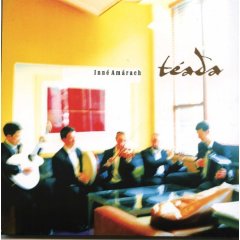
Inné Amárach (Yesterday And Tomorrow) is the third album from this talented young Irish traditional band, and builds well on the success of 2004's Lá An Dreoilín. Benefitting from members drawn from diverse backgrounds, Téada easily retain their original freshness, strongly displaying the typical Sligo penchant for deriving a great lift from their concentration on, and clear definition of, the rhythm of the tunes and delighting in the gentle ornamentation of the melodies. And when they're firing on all cylinders they're still absolutely superb - as the opening set of reels and the spirited pair of hornpipes (track 7) unarguably demonstrate. Téada don't have to play hard and fast to make an impact though, and their unhurried, relaxed approach almost always pays considerable dividends for the listener (while you can invariably tell the musicians themselves are having a ball too).
Since their second album Téada have undergone a further lineup change, whereby Sligo man Damien Stenson has replaced John Blake on flute (and as a consequence Seán McElwain now moves across to play guitar as well as banjo and bouzouki). One other minor change is that the new album is wholly instrumental, so we're denied any chance of hearing Oisín Mac Diarmada's fine singing voice, which is a shame. I suppose there are times when the flute is possibly marginally more prominent in the band texture than I'd noticed hitherto, but that's not a bad thing when the total recording balance is so well managed and the band's sense of internal dynamics so unerring and beguiling; for Téada have a canny, truly democratic way of expressing the music's subtleties. I specially liked the blend Téada achieve on the set of jigs (track 6), maintaining constant interest in the exchanges between instruments among and within the melodic lines. While the carefree mood of the playing on the set of jigs (track 10) is infectious, leading well onto the final track, a storming set of reels. The sections of comparative repose, such as the delectable introductory planxty to track 9's polkas (this being a little-known O'Carolan composition), are enchantingly managed too; and Paul Finn's button-accordion contributions are vibrant as ever. Happily, the moments which don't quite convince me are very few, and mostly comprise the times when Oisín moves across to the piano in order to thicken the texture but it cloys a bit I find on the track 2 jigs and the closing part of the track 4 polka set. And the use of what sounds like a tambura-drone that introduces the "descriptive piece" Nóra Críona is a slightly curious touch.
As for the choice of material, this goes even further than album number two in the direction of lesser-known tunes, with a few particularly delightful selections towards the middle of the disc being acknowledged in the notes as coming from recordings of John Kelly. Others come from the repertoires of Kildare fiddler Muintir Uí Chatháin, Séamus Ennis, Michael Coleman and Clare whistler Micho Russell, so there's no overt bias towards Sligo-sourced tunes here! Téada prove equally persuasive whatever regional sources they adopt for their tune-sets, and with their acute propensity for spotlighting different varieties of tune alongside the usual session fare have once again produced a thoroughly engaging CD. And a good extra sales gambit is the bonus DVD which takes the form of a 25-minute documentary exploring Téada's fascination with the interaction of past and present through one of their key influences, the rich musical culture of the Sligo region; it has some musical material in common with the CD, but it's largely a worthwhile exercise giving much of the desired flavour and a decent feel of the session craic as well as the studio, helped along by brief interviews with native Sligo musicians and some archive material. This new package persuasively shows that in their own way, Téada are up there near the top of the tree alongside other young outfits such as Danú.
www.teada.com
www.compassrecords.com USA
www.copperplatedistribution.com UK
David Kidman 2006
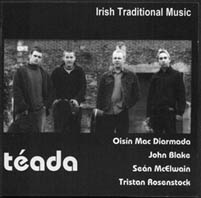
www.teada.com
www.compassrecords.com
www.copperplatedistribution.com
David Kidman
This new Irish band (the name means "strings") claims to focus on "creating a soulful, traditional sound with a subtle approach to adornment". No argument with that description, for the primary feature of the group's sound is the sweet and vibrant fiddle playing of young Sligo musician Oisín Mac Diarmada (whose previous release Traditional Music On The Fiddle, Banjo And Harp garnered considerable critical acclaim on its release in 2000), though the counterpoint with remaining group members John Blake (flute), Seán McElwain (banjo, bouzouki) and Tristan Rosenstock (bodhrán) is at all times scintillatingly managed. Oisin and John also contribute occasional piano or guitar respectively to underpin the group dynamic, proving particularly effective on the sets of reels.
The intriguing shuffling arrangement of the slow hornpipe Rossinver Braes is most appealing too. I do like the energy all four band members bring to the music, and the admirable infectiousness of the ensemble playing generally is a strong feature of this CD, though I find this is sometimes compromised when tracks seem to end prematurely – several of the cuts are rather short, and indeed, the whole album clocks in at only 38 minutes. As well as the instrumental selections, the album contains just two songs, and pretty brief ones at that, which is a shame as they are very well managed, notably the a-capella Peigin 's Peadar. Look out for Téada at festivals and suchlike, you'll not be disappointed I'm sure.
www.ceolproductions.com
go.to/copperplate
David Kidman
Susan Tedeschi - Wait For Me (Artemis)
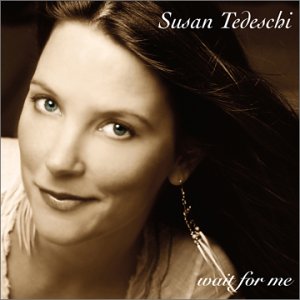
Mike Davies
10,000 Maniacs - Campfire Songs: The Popular, Obscure and Unknown Recordings of (Rhino)
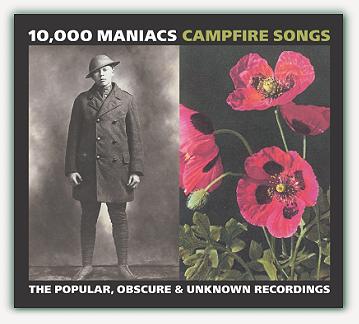
Essential stuff naturally, but it's Disc 2 that holds the real collector interest, if not necessarily the actual nuggets.
It opens with the swirling organ driven Poppy Selling Man, a previously unissued outtake from 83's Secrets of the I-Ching and adds three further unissued demos in the shape The Wishing Chair's Can't Ignore The Train (a rather ragged version) and, from Our Time In Eden, a less polished Noah's Dove and alternate lyric versions of Circle Dream and Eden. The remaining tracks are covers, all, with the exception of Jackson Browne's These Days from the Rubaiyat Elektra tribute, taken from singles.
There's an unexpectedly good rework of The Smiths' Everyday Is Like Sunday and a transformed version of Tom Waits' I Hope That I Don't Fall In Love With You while their cover of Prine's Hello In There and Iris De Ment's Let The Mystery Be just about survive the curiously heavy handed approach they could take to the work of others. Rather less fortunate is a clunkily arranged Peace Train, the overblown live unplugged (with unnecessary brass!) To Sir With Love where Michael Stipe has to show Merchant how the song should be handled, and, it must be said a reggaed up mutilation of Bowie's Starman for which they should have been taken out and publicly horsewhipped.
Having seen them live twice and being respectively bored rigid and thrilled silly, they could be suicidally inconsistent, but there's little argument that the best moments here elevate them to deserved legendary status. News is too that the band is relaunching itself with a new line up featuring Oskar Saville taking over vocal duties from Mary Ramsey (who departed along with husband Lombardo) and Jeff Erikson picking up the guitar baton from sadly deceased mentor Buck.
www.10000maniacs.com
www.10kmaniacs.org
Mike Davies
I discovered the 30 year old New York based Chinese-American pianist singer-songwriter (born t Cynthia Yih Shih) three years ago when her 2004 sophomore album, Warm Strangers, finally made it to these shores on the back of a shared tour with Sarah Harmer, to flag up their recent signing to Zoe. Bizarrely, released that same year, her third album, Dreaming Through The Noise, failed to get a UK release which rather seemed to defeat the purpose of the awareness building dates, However, her fourth is getting into stores outside of America, so hopefully interest can be reignited.
There will, of course, be references to Tori Amos and/or Kate Bush, especially when it comes to the piano arpeggios of Stray Italian Greyhound and the soaring vocals of Antebellum with its cascading piano frills and classical violin arrangement. Some have cited Sarah McLachlan, but there's far more blood in Teng's alto and, if anything Imogen Heap, Shawn Colvin or an on form Aimee Mann might be better comparisons, and she's certainly a far more adventurous writer and arranger than the Lilith Fair stalwart.
Listen to the lovely almost hymnal, choral blossoming opener The Last Snowfall complete with fake vinyl crackles that sound like a warming winter fire before she launches into the spiky White Light with its staccato rhythms, electronic wibbles and raging electric guitar courtesy of Kaki King.
Then there's In Another Life which with its bubbling oboe and clarinet and piano fills heads into territory more familiar from cabaret or Broadway musicals, while the advice dispensing Grandmother Song is an a capella gospel with syncopated handclapping accompaniment and the Suzanne Vega-like Radio is a terrific number that takes a fairly conventional jazz-folk rock template and etches it with rhythmic and tempo contrasts, sonic ebbs and flows from languid lullaby and surging urgency and what sounds like someone playing wine glasses.
My personal Teng preferences are for her less itchy numbers like the scuffed and moody Kansas, the hushed slow building piano balladry of St Stephen's Cross, the horns, lap steel and sandpaper that embellish No Gringo's storytelling and, best of all, the glorious touch the sky anthemics of Augustine.
With rich poetic lyrics that tell of illegal border crossings, spin paranoid urban fears of suicide bombers, draw parallels between a military campaign and a failed relationship, and paint romance with images of reincarnation and the fall of the Berlin Wall, she's as gifted a wordsmith as she is a musician. Her time is long overdue. As Billy Joel put it, "When will you realize...Vienna waits for you."
Mike Davies July 2009
Vienna Teng - Warm Strangers (Rounder)

If Ben Folds were Shawn Colvin, the result might be akin to what you'll find here with Teng's craftsmanship on the keyboards and warm, emotion flecked vocals. She's got unbridled confidence too, certainly enough to open the album with Feather Moon, a vaguely droning, lyrically non specific number designed to evoke the sensation of breathing in and out that pulls off the trick to masterful effect. Then listen to the different time signatures of the soaring love song Harbor or how she sings Taiwanese lullaby Green Island Serenade in the native tongue.
Along with Mission Street, a reflective song written about a former apartment, My Medea is one of the few specifically self-referencing numbers; a classical flavoured slightly Tori-esque tune of piano ebbs and swells that talks of the 'mild depression' syndrome from which she suffers, causing unexplained bouts of grief and anger. Elsewhere though other characters take charge of the songs. Shasta is a Billy Joel-like rolling chords number about Carrie, a girl who's decided not to have an abortion, Homecoming the heart-clutching story of a balding lonely trucker who makes a late night stop at an Arizona desert cafe late and who may well be the father of Carrie's child. And Anna Rose was written for a girl who'd sent Teng a picture after hearing a track on the debut.
It's a classy album throughout, with all the tracks hallmarked with quality but there are a couple that really stand out. Sung a capella and drawing on the unaccompanied folk heritage, part influenced perhaps by Brecht and Weill, Passage is a stark song sung in the voice of a car crash victim noting the effect of their death on those left behind. The other is The Atheist Christmas Carol, a hymnally beautiful song of hope, grace and emotional salvation that sends shivers down the spine.
A new album, Dreaming Through the Noise, is due out in America this July. Let's hope that doesn't take forever to make its way to these shores too because I fear the withdrawal symptoms may be too much to handle.
Note: The UK release of Warm Strangers features two bonus live cuts, a version of album track Hope On Fire that displays Kate Bush touches and the otherwise unrecorded Boy At The Piano, a skittishly playful jazz tune that shows off her piano chops and stems from a crush she had on a piano playing kid at high school.
Mike Davies, May 2006

It's book and cover preconception territory here. Seeing the sleeve and promo images of Matt Millership, you're primed to expect some sort of 70s Bowie glam rock or Siouxie Soux goth-punk. Then along comes the wrenchingly beautiful opening love song Go Out On The Weekend and, confronted with the husky, throatily tremulous vocals, piano and the plaintive strings, suddenly you're swept away by comparisons to early Tom Waits, Jimmy Stevens and Ray Lamontagne.
And that's just the start. A classically trained pianist, Millership has a voice that sounds as though it's lived twice as long as his body and his songs are veined with emotions that have followed it every step of the way.
Musically, he pivots around an Americana/soul axis. Sentimental Feelings is a Johnny Cash rockbilly chug, City Of Dreams sits him behind a saloon bar piano for a boogie woogie number that suggests a dusty throated Ryan Adams hanging out with Ronnie Lane's Slim Chance, Sentimental Streets pulls out bluegrass banjo and thoughts of Steve Goodman while Angel Of London takes him back to cruising down the boulevard looking for the heart of Saturday night in company with a soulful Hammond and horns.
There's nothing here you won't fall in love with from the opening notes; Stains a melancholic piano ballad streaked with weeping viola that has him sounding like James Blunt remodelled by God, the soulful, spare Love The One You're With a haunting duet with Aurora Schmidt backed by a reverberating electric guitar that should never be played more than twice in succession for fear of reducing you to sobs. And they'll be rolling out the Jeff Buckley references for the melancholic Sell Another Soul with its quivering lonesome heart and aching strings. Jeff would have taken it as a compliment.
If his tenor voice is like sadness, yearning and hope distilled into an elixir and his melodies ripple like tears, he has the lyrics to match. The moving Flying Cars finds him in a scuzzy hotel room overlooking Leicester Square, reflecting on regret, disappointment and isolation with a chorus that references the Easter Island statues and, in a wry Bowie allusion, rhymes the song title with Life On Mars.
However, he saves the best for last with Paradise, a folk-blues song flecked with mournful pedal steel, spare piano, acoustic guitar and hushed rumbling percussion that, sounding like a meeting of Cash and Harry Chapin and inspired by a car crash victim and images of flowers on fences and a child's ice cream cone on the floor, picks the nerves of grief, death and the numbing alienation of urban society's merry go round.
An unqualified album of the year, Tensheds deserves to be a huge hut.
www.tensheds.com
www.myspace.com/tensheds
Mike Davies November 2010
SF-born fiddler fell under the early influence of Alasdair Fraser, later studying with Mairead Ni Mhaonaigh and Buddy MacMaster; but at age 16, she'd already recorded a duo album for Culburnie with fellow Californian Laura Risk. Now, several years later, after many other projects, Athena's finally got round to releasing a solo album with the help of John Doyle, whose signature expert, clear, crisp guitar and bouzouki work runs through the record, either directly driving, or in keen interplay with, Athena's own busy, infectiously energetic yet always highly musical fiddling, where litheness and real passion go hand in hand. The cross-syncopations and responses between the two musicians are always a true delight to behold (just marvel at Hold The Reins on the track 9 reel-set for example). Athena's technique is almost breathless in its accomplishment, her command of phrasing outstanding, and there's a feeling of playful delight in every step of the music, not least in the way Athena forms a ready bond with her fellow-musicians. Indeed, it might almost be said that John's own contribution as musician is as key to the disc's success as Athena's own scintillating bow-strokes, but as the disc's producer John does keep the focus on Athena throughout, and is well mindful of whoever else is within the aural picture at any one given point. The disc's fourteen tracks are a fine showcase for Athena's skills, with sets of reels, barndances and jigs more or less alternating. The lone slow air (Bi Falbh O'n Uinneig) is left right to the end of the CD, but it's a masterly performance on which to close the disc, with a distinctively forlorn (almost Scandinavian) aspect that gives it a supremely haunting quality. One of the special joys of the other tracks too is that a good contrast can still be provided over the course of the faster sets by virtue of the variation in instrumental timbre from track to track. The whole album has a really engaging freshness of sound and approach, in fact. Much of the repertoire is of Irish origin, which reflects the time when Athena immersed herself in west-of-Ireland sessions with Sharon Shannon (who along with fellow-accordionist Billy McComiskey also guests on this CD); even so, there's a healthy spread of Scottish material as well (two idiomatically-snapped strathspeys) . Particular favourite tracks of mine are the In Memory Of Coleman's/Paddy Fahy's set (track 4), where Natalie Haas's cello weaves a lively counterpointing melody; the track 5 duet with Liz Carroll (and its sprightly rhythmic enhancements from Chico Huff's bass and Ben Wittman's deftly brushed snare); the almost delirious kickback rhythms of the Paddy Kelly's set (track 7); and the jaunty but oh so persuasively driven set-dance-and-fling set (track 8). On the track 12 reel-medley, Athena fairly motors along with the boxes, while in contrast on the previous selection the lyrical restraint of John's guitar lines is quite miraculous. Unlike some entirely instrumental set-based records, there's a real sense of purpose to all the playing here that transcends any mechanical note-counting or metrical display of technique: I'm sure you'll have as great a time listening to the recording session as Athena and her musicians did in making the record..
David Kidman February 2009
Terry & Gerry - From Lubbock To Clintwood East
Currently to be found working with Nick Quarmby as the much praised Colvin & Quarmby, Gerry Colvin's past catches up with him with the CD release of the first and sadly only album from his original outfit. Peel favourites of old, there were plans four years ago to release a definitive collection of the band's material that, for various wranglings between the former members, never materialised, so it's good to find this finally out there for old fans to replace their worn out vinyl and for newcomers to discover the joys of what was one of the freshest and finest combos Birmingham produced back in the mid 80s.
Sharing the moniker with Gerry was the reliable double bass slapping (along with guitar and back up vocals) Terry Lilley while the band nucleus also included Su Richardson on washboard and keyboards (of sorts) and Andy Downer adding guitar and extra singing. An acoustic country skiffle rockahillbilly outfit with a leaning to Buddy Holly (listen to the slow version of pizzicato forlorn break-up song Hello) and a lyrical sensibility that juggled whimsy, wit, poignancy, insight and social observation, both their recordings and their shows were characterised by ebullience, unpretentiousness and an infectious good time, something that's remained constant in Colvin's musical career and which, listening again to this album, remains as fresh as ever. The ability to affectionately skewer dreams, foibles and the sometimes absurd nature of our ridiculousness is evident on such compact gems as The Good, The Bad, The Usherette, How Long Johnny, Joey, Fashion Rodeo, A Sea Shanty For The Gravy Boat and The Armchair Terrorist's Song while Reservation delivered a singalong swipe as much at council estate policy as the treatment of Native Americans. In addition to the original album, there's four bonus numbers recorded live at Birmingham's long defunct venue The Powerhouse. It'd be good to see singles like the bitter anti-Thatcher themed Last Bullet In The Gun and some of the unreleased gems make it to CD at some stage, meanwhile, do yourself a favour, log on and order yourself up a shot of Brum nostalgia.
Mike Davies
In a partnership that lasted more than thirty years, Sonny Terry & Brownie McGhee were seen by many as the acceptable face of folk-blues, and yet they provided many British and European blues fans with their first tastes of the genre, emphasising for those fans who knew no different at that stage the homespun origins of the blues. This new collection, part of SPV's "Essential Blues Archive" series, brings together 20 recordings that epitomise the duo's appeal and show them at their strongest in a whole series of styles within the blues ambit. Harmonica ace Sonny Terry (Saunders Terrell) had originally been teamed up with Blind Boy Fuller, but when Fuller died in early 1941 his manager looked on Walter Brown McGhee as his successor, and after a period spent with the circle of radical folk performers (Guthrie, Houston, Ives et al) in New York, the duo cut their first sides together. Perhaps their most typical recordings were made in the early 50s, and this disc contains some good examples (Mean Old 'Frisco Blues, Worried Life Blues), but many of the sides chosen for this compilation also provide persuasive evidence that either of the two men could've become a star in the then-fast-rising R&B scene. Yet each man retained his strong sense of individuality during their quarrelsome musical partnership, which surprisingly lasted for close on two decades through to the mid-70s. All tracks on this new collection feature that signature harmonica playing, of course, and some tracks prominently display the special hallmark of Terry's rough-house whoopin' and hollerin' (the disc's title track for starters), whereas others focus more on McGhee's precision guitar playing. Equally, some cuts depart from the norm in other ways (eg the curious counterpointing vocal line of Stranger's Blues) and cuts like The Woman Is Killing Me, complete with pounding piano beat, border on rock'n'roll. This is a good-sounding collection, but its true value is mildly compromised by the omission of recording date details for most of the individual tracks (only careful reading of the booklet note reveals anything useful in this regard).
David Kidman June 2007
Formed in the early 90s by Tex-Mex legends Doug Sahm, Freddy Fender, Flaco Jiminez and Augie Meyers, their good time beer-drinking fusion of rock n roll, Mexican folk, polka, R&B and country was irresistible. From the moment the first notes squeezed out until the last echo faded away, every record that made was guaranteed to keep the feet moving and the heart soaring.
Sadly, Sahm's death in 1999 meant Live From The Limo would be the line-up's final album and the remaining members called it a day. A reunion might have been on the cards, but when Fender passed in 2006, there seemed no likelihood of the Tornados ever blowing up a storm again.
However, following a studio session with the two surviving members, Sahm's son Shawn suggested a revival might be in order. And, with the trio recruiting the band's original backing musicians, guitarist Louie Ortega, bassist Speedy Sparks, and drummer Ernie Durawa, this album is the result.
It honours the past in more than just spirit too. The opening track, the instantly catchy singalong Who's To Blame Senorita? was written by Shawn and his father, several Meyers songs, among them My Sugar Blue and Velma From Selma get their first Tornados treatment, and Girl Going Nowhere comes from a lost 1990s demo from Doug Sahm whose Chicano is sung here by Jiminez.
In addition to this, Fender himself lives on, singing from beyond the grave on five previously unheard songs, including They Don't Make 'Em Like I Like, the honky tonk rolling Another Shot Of Ambition and If I Could Only, written just before his death. It's enough to make you want to jump in your car and find the nearest cantina.
Mike Davies April 2010
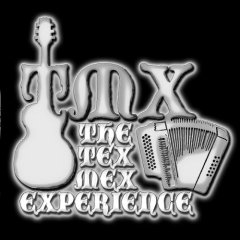
Fronted by Doug Sahm's son Shawn, this makes no bones about what it is. A straightahead, good time meld of Tex Mex, country, blues, polka boogie and Liverpool beat rock n roll. Had The Beatles ever hooked up with a Texicali accordion player then Bajo Betty might well have been the result, likewise Hippie Girl (My Little Groover) sounds a lot like I Feel Fine with She's About A Mover organ. There's no pretension to be anything more than a bunch of guys making music to drink and dance to, getting down and grooving like a border town Chuck Berry partying with Rockpile for Mama's Out Rockin', while Comin' Around, She Would If She Could, Who Don't Cha and the cover of Roy Head's Lemme Kiss Ya are the sound of a cantina Status Quo. Order a cold one or several, twist in the lime and enjoy.
www.myspace.com/thetexmexexperience
Mike Davies June 2008
This is a veritable Jake-feast, almost beyond the Thackray enthusiast's wildest dreams. Jake In A Box is a lavish four-disc box-set containing all four of Jake's EMI studio LPs from the decade 1967-76 (The Last Will & Testament Of Jake Thackray, Jake's Progress, Bantam Cock and On Again! On Again!) with a sizeable array of bonus material in the shape of previously-unissued studio recordings from 1970, a different (mono) acoustic version of his first LP, singles (including the French version of La Di Da/Le Cygne Noir), plus sundry demos and alternate versions. All you could ever want and much more, then. And EMI's presentation is first class too, well-filled discs comprehensively annotated and with excellent booklet notes by Victor Lewis-Smith. There's absolutely no argument that Jake deserves such exhaustive treatment, though, for his art has been celebrated only fitfully in the past, unexceptionally served by various compilations which though OK in themselves have merely recycled a broadly similar collection of "greatest hits" at the expense of usefully restoring to the catalogue via the more permanent medium of CD many all-but-neglected gems - which this new collection of course does. The opportunity to experience the man's pre-'76 œuvre in glorious totality is therefore one to be savoured (I'm tempted to say quick before it gets deleted!).
Perhaps the best way to describe Leeds-born John Philip ("Jake") Thackray is as a chansonnier par excellence whose strong suit was the portrayal of peculiarly English mores, foibles, idiosyncrasies - and characters! - by dint of an acute gift for astute observation and a distinct talent for deft wordsmithery rivalling W. S. Gilbert, Flanders & Swann – and in the present day, Leon Rosselson. Jake's idol, though, was Georges Brassens (whose influence, and that of Brel, was nurtured during Jake's post-grad teaching stint in France), though Jake's own delivery had more than a soupçon of what one might call the deadpan, quasi-lugubrious "Noël Coward hoot" (a trait, nay mannerism, which some folks considered more of an affectation). Jake's enviable lightness of touch and elegance of expression gave rise to impressions of superficiality, and unfair allegations that his songs were little more than "light entertainment", but listening to this amazing corpus of songs again now I'm struck anew by the quietly stunning craftsmanship, the sheer inventiveness, richness and depth of the writing, the intelligence and poetic literacy that's sometimes partially belied by the musical settings bestowed on them by EMI house producers, but more often overshadowed due to the unassuming ease with which Jake so subtly accompanied himself on guitar, the mellow-sounding nylon strings of which imparted an almost classical air of sophistication to his music. A sophistication which partly arises through Jake's creative approach to rhyme, partly through his quirky treatment and transmutation of dance rhythms and neo-baroque figures; nevertheless, it's worth pointing out that you don't tend to encounter this degree of sophistication in writers of song generally. In Jake's work, one song can quite miraculously encompass the conflicting emotions of comedy and tragedy, happiness and sadness, pleasure and pain, all at once and very often with a delicious, yet completely inoffensive irreverence. Endearing little barbs punctuate his warmly accessible humour, yet his humour doesn't date, his targets remain relevant today. Yet even within the satire, the righteous ridicule of figures of pomposity or authority, there's often also an almost painful degree of compassion, and a healthy tolerance and acceptance of other human beings. Salaciousness, lust, sex and religion, love and romance in improbable situations – these aren't just cheap devices to grab the listener's attention but like his subjects themselves are treated with due affection; he conveys his fables with a loving yet decidedly unsentimental expressiveness.
Nobody could deny the unbelievable (sometimes in both senses!) appeal of classics like Sister Josephine, The Castleford Ladies' Magic Circle, Isabel Makes Love On National Monuments, Bantam Cock, Jumble Sale and On Again!, but it's also all too easy to underestimate the tenderness couched in the deceptively simple constructions like the almost-nursery-rhyme Old Molly Metcalf. Genius I call it. And what's more, the vast majority of the previously-unissued cuts are real treasures, and all the more extraordinary for remaining unreleased up to now; The Prisoner, Famous People and The Policeman's Jig represent the poles, the extremes of mood, equally powerfully cutting.
Now Jake's diffidence was legendary, and he was self-deprecating to a fault, yet he was feted by his audiences, as you can hear on the splendid Live Performance set (reissued in tandem with the main box, and expanded from its original 1971 single-disc to two discs, so that we're now treated to that celebrated November 1970 Queen Elizabeth Hall concert in its glorious entirety). So, listening to the entirely fitting memorial that's represented by this handsome six-discs'-worth of Jake's recordings, of course we're doing more than just "gather a bud or two" in his memory. The Rowan Atkinson-like pose on the cover of Jake's Progress reminds us subliminally of his days as a TV celebrity, while it's salutary to recall that like many a genius he ended his days in obscurity. Yet the forthcoming August Bank Holiday weekend will see a Jakefest in Scarborough, and a BBC documentary on Jake's life and work is scheduled for the autumn; two volumes of the Live At The Lobster Pot series have been issued thus far, so with good luck and a following wind the Jakefeast looks set to continue for a while!
David Kidman August 2006
Thamusemeant - Silver Seed (Frogville)
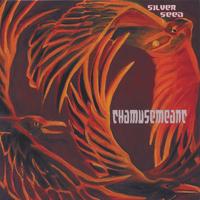
Thamusemeant had an eight year career in the 90s and mainman Nathan Moore has produced several solo albums as well as working with other musical projects; sadly for me it's only with this thamusemeant reunion record that I've come to hear of him, and them.
Silver Seed is an absolute cracker, different from anything I've come across and endlessly satisfying in musicianship and songwriting. Apparently the earlier incarnation of the band was quite rocky, but Enion Pelta on fiddle has taken the place of the drummer, and Nathan Moore now descibes them as a "string band" . That suggests the raucous pre-bluegrass sounds that are currently being revived, but notwithstanding a beautiful old-timey tune, "Invisible Banjo", that could have been lifted from a Union Station album, the overall sound is much more sophisticated and, somehow, European. The violin is in the lead a lot and plays melodies that sound to me like they're inspired by cabaret music or European folk music; whatever, it's the violin that at different times makes you want to dance or sing or smile or cry. And if that's not enough the singing of Aimee Curl and the playing of Nathan Moore and David Tiller are all wonderful, adding colour and depth to the whole, impressing with their own virtuosity without ever being flashy.
Silver Seed opens with "Sweet", a song by Skip Shirey, which amounts to a statement of intent as Aimee Curl's jazzy, maybe a bit Bjork-like,vocals and the band's turns at the mic set the tone for the sweet music to follow. The closing track("Been A While") celebrates the band's reunion nicely. In between there are three instrumentals by David Tiller who plays the mandolin and banjo wondrously. In fact he gets so many subtle, delicate sounds from his banjo I can't think I've ever heard the like, and you wonder why there were ever jokes about banjo players.
The other five songs are Nathan Moore originals, ranging from love to politics - on "Protest Song" he takes a pop at avowed Christians like George Bush who appear to have lost touch with Christianity - and his lyrics are elliptical enough to bear frequent listening as you tease out his meaning, or maybe simply enjoy his gentle hooks. All in all, a total joy and one of my top five*for 2004, no question.
*The other four, in no particular order, being:
Joe West: South Dakota Hair-do (also on Frogville)
Nels Andrews: Sunday Shoes
REM: Around The Sun
WrinkleNeck Mules: Minor Enough (actually from 2002 but I only heard it this year)
www.frogvilleplanet.com/tmm.html
John Davey - www.scoraig.com
In April 2008 the legendary Dutch guitarist celebrated his 60th birthday in style with a real big bash at Vienna's Metropol Club, which was attended by a large number of fans and musical friends from all over the world. From among the latter, the names most likely to be best-known to NetRhythms readers are Donovan, Allan Taylor and the Dubliners, then Jack Clement and Terry Evans – whereas several others (like Nalle & Möller, the trio Insingizi, Erik Trauner, Gottfried Gferer, Lukas Resetarits and Vlado Kreslin) don't really figure on our radar at all.
No matter – for this lavishly-presented two-disc set does its job superbly, in recording the unique atmosphere of the occasion: the abundantly joyous sense of celebration, the musicianship, the mutual respect and the affectionate good-humour, all shot through with the special presence and personal qualities of the magisterial Hans T, who performs on a healthy majority of the numbers himself. Each of the "name" musicians mentioned above gets to perform a couple of songs from his own repertoire, either self-penned or associated with him. There are delights and surprises galore, and the whole affair sounds suitably spontaneous and playful even though it must have been planned down to a fair level of detail. The choice of material and performance styles amiably reflect Hans' own famed musical eclecticism, and the vast majority of the individual numbers within the evening's entertainment certainly stand repeat play (only the obligatory Happy Birthday chants can be skipped after first playthrough).
Favourite contributions for me will be those of Allan Taylor's (the quintessential, timeless Back Home To You and his famously evocative Derroll Adams tribute Banjoman), but I also enjoyed Vlado's duet with Hans on Leadbelly's Bourgeois Blues. Donovan also turns in a convivial Catch The Wind and Colours, the latter suitably amended for the occasion! Hans' own presence permeates the discs, but after all it should, for hey, it was his party, and this release is the next best thing to being there to celebrate with him.
David Kidman September 2009
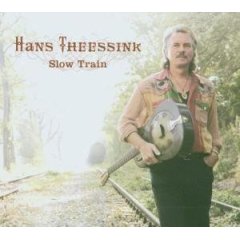
Austrian based Hans Theessink is a Dutch Country blues guitarist who has built an international reputation as a leading practitioner of blues and American roots music. And on Slow Train has expanded his blues roots to include Gospel and World music genres to great effect. In fact it is worth making the point that had not both Ry Cooder and Paul Simon been here before with high profile World music albums, "Slow Train" would probably pick up even more accolades than it is already destined to receive.
Hans's yearning vocal style is one that has been honed in over 30 years of learning his craft and he brings an unhurried style of emotive phrasing to bear on some poignant lyrics that deal uncompromisingly with contemporary events. His sublime guitar playing is so subtle that you strain to hear every slight change in emphasis in tone while his sultry slide runs beautifully underpin some warm gospel accompaniment on Run For A Long Time.
Together with a fine band and three wonderful gospel singers nick named Ramuda, Blessings and Vuda, Hans tackles songs about 9/11 and Iraq as on God Created This Land and Mugabe's Zimbabwe as on Thula-Oh Mother Don't You Weep, without once pandering to sloganising. The biting lyrics are written as if in the first person bringing an extra emphasis to the lyrics. There's a further beautiful blend of gospel blues on Cry Cry Cry another album highlight complete with sumptuous slide guitar and deft use of handclaps. There's also a JJ Cale feel to the wistful Let Go, while Love You Baby is a delightful joyous dobro outing, again with tasteful bv's. Such is the confidence of this project that the spiritual Old Man Trouble never once hints at cliché in spite of its lyrics that include the line, 'I thought I heard Blind Willie Johnson sing'.
Ry Cooder would probably love to have written something like this and perhaps the biggest compliment I can give this truly superb blues album is that at the very end of the closing When Luther played the Blues you feel compelled to find out more about an artist who has just cut one of the albums of the year.
Pete Feenstra March 2007
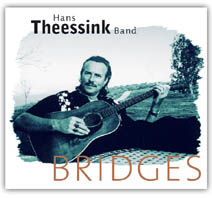
David Kidman
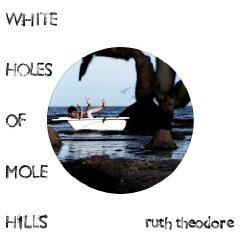
You struggle for comparisons to give an idea of what to expect from the slightly lisping, breathlessly voiced Southampton singer-songwriter. Perhaps the closest you can get is an intermingling of early Melanie, Victoria Williams, Leo Kottke, and Martha Wainwright with a large side order of whimsy and quirk.
This is her second album and, while I've never heard Worm Food, it's immediately apparent that she falls into the love or hate category with her cryptic, often childlike lyrics, skittering rhythms and that very individual little girl conversational delivery.
She sings - and partly speaks - False Alarm rather like a six year old confessing their latest mischief while woodwinds scamper around the jumping bean of a tune before launching into the six minute, album title containing jazzy ADHD cabaret Eris as, again switching between spoken and sung - she relates a frustrated astronomical courtship between Pluto and dwarf star Eris; as in the planet and the dwarf star. It's either a brilliant latter day Edward Lear or irritatingly barking, depending on your sensibilities.
And so it goes through an oddball assortment of songs about love, death, the circling of relationships, self-confidence, growing old, being young, scale and perspective, and, on the carnival, classical and cabaret tempo shifting Race Cars, the case for more haste less speed.
There's something endearingly winsome yet deeply sad about The Evolution Of Mr. Charisma who "kissed all the girls until he made himself cry" while Friendly is a near eight minute prevarication about romance and, just so you know she's not just mucking about, Sisyphean Rock 'n' Roll finds her showcasing her instrumental virtuosity (and those Kottke influences) with a six minute acoustic guitar piece that's finds her as adept at wordless storytelling as she is with her eccentric verses.
www.ruththeodore.com
www.myspace.com/ruththeodore
Mike Davies February 2010
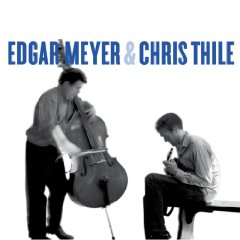
The current album, however, is their first record as a duo; and it's absolutely stuffed with top-class musicianship and inventiveness, everything you'd expect from these brilliant musos and perhaps more. But as is sometimes the way with products from that kind of stable, it's a difficult record to come to terms with. For a start, its character is persistently knotty, with almost every single track proving a determinedly tough individual nut to crack; although repaying your attention, the deal is that it must be undivided – this is emphatically not wallpaper music by any stretch of the imagination. Secondly, the designated soundscape is best described as chamber-newgrass, and thus necessarily sparse – there are no guest musicians, so if the idea of pure-toned duets of mandolin and double-bass (performing fresh-minted, exclusively self-penned compositions with no "history") doesn't grab you then it's probably fair to suggest you might better deploy your listening energies elsewhere. If, however, you keep an open mind and relish the spirit of adventure and a bit of a complex challenge, then you'll find much that's enchanting, charming and stimulating here - although you do have to be in the right mood to become fully involved in the music's relentless invention, its sometimes wilful-seeming but entirely natural hyperactivity, its manifold and often quite bewildering twists and turns.
Just when you think you've got a handle on the onward progress or development of any given track, the musicians gleefully career off into the nether regions - just take the central number FRB, which toys with a jazz riff like a cat with a fishbone. Or take almost any other track: from the breathtaking, skittering virtuoso runs and tricky syncopated time-signatures of Fence Post In The Front Yard and the playful Farmer And The Duck, the slippery, unstable I Wasn't Talking To You and the jumpy dissonances of Rabbit Cake to the more carefree abandon of G-22 and the glorious breathing-space of Slow Song For A Dog and the cautious lyricality of Cassandra's Waltz. Perhaps the most conventional track in terms of expectation and development is This Is The Pig, but even this is preceded by its antithesis, a brief glissando-ridden excursion.
So in conclusion, be prepared to be dazzled by the precision technique and astounding empathy of these two musicians at their absolute peak, even if very occasionally that technique threatens to get the better of their musicality and either leave the listener a little cold or leave a mild lingering taste of "so what?". Myself, I find the majority of these compositions growing in stature with repeated plays, with initial irritation giving way to an appreciation of the keen internal logic at work here.
www.edgarmeyer.com
www.myspace.com/christhile
David Kidman September 2009
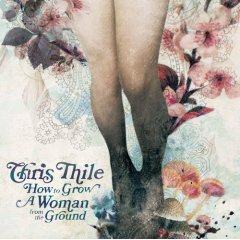
Solo album number 5 already from the young mando-maestro, and it's for the most part a switch back into the progressive-bluegrass territory of Nickel Creek. In fact, Chris had taken a conscious decision this time to get together a five-piece bluegrass band, and was quick to seize on the immense potential of some talented players he'd recently discovered: Noam Pikelny (banjo), Gabe Witcher (fiddle), Chris "Critter" Eldridge (guitar) and Greg Garrison (bass). He also made good use of the guiding hand of Ronnie McCoury as "bluegrass guru" for the album sessions. Opening with the breakneck Watch 'at Breakdown, with vicious duellin' mando and banjo, Chris then moves on through a cover of White Stripe Jack's composition Dead Leaves And The Dirty Ground, before returning us to his own writing skills for the tender, almost painfully introspective Stay Away; this mood of regretful, self-aware introspection continues on the intensely forlorn I'm Yours If You Want Me and You're An Angel And I'm Gonna Cry (this one sort-of has the air of a lost Hank Williams number and yet deals with the eternal bluegrass heartbreak theme). The lazier homespun philosophy of the title track may appear to be a challenge to Chris's eternal youth, but the fine supporting playing helps him cope! On other songs, Chris may take on the persona of Jimmie Rodgers (Brakeman's Blues) or The Strokes' Julian Casablancas (Heart In A Cage), but still retains his own individuality. There are some breathtaking instrumental cuts too, of course, including Chris's own compositions The Beekeeper (a sparkling and distinctive moto-perpetuo study) and The Eleventh Reel. As Chris says, the developing spirit of the band and the album - of being able to hear the instrumentalists react to the vocalists and vice versa, by cutting everything live without headphones and separation - was certainly well captured in the sessions, as you'll hear.
www.christhile.com
www.myspace.com/christhile
David Kidman November 2006
Chris Thile - Deceiver (Sugar Hill)
Solo album number 4 from Nickel Creek's spirited mandolinist sees him branching out into altogether weirder musical territory, with a noticeable reduction in mando-tones on much of its determinedly unusual 34 minutes' length. It's a very strange record all told, in fact; every bit the Deceiver of the title, for at first you could well be forgiven for thinking you'd got the wrong disc on the player - or at least The Wrong Idea, which starts out as a piano-ballad a bit in the Rufus Wainwright mould. But strangeness and unpredictability are the disc's virtues, as well as a superbly clear production (one of the best I've heard lately).
There's not a lot of what you might call true bluegrass - or even newgrass - here, and precious little of Chris's trademark breakneck showoff picking as such (except on the brief instrumental Jessamyn's Reel), for Chris's intense virtuosity is evident in a different way by dint of his inventive phrasing and genuinely innovative song construction with at times a rather more experimental bent. Both Empire Falls and The Believer are electric-guitar-led rockers with a strong indie-punk feel that retains the spirit and unpredictability of the best of that sub-genre. This Is All Real explores eastern modal string textures alongside a rippling piano accompaniment that offsets the pithy philosophy of the lyric. And even the melody of the gentle flowing instrumental Waltz For Dewayne Pomeroy doesn't quite go where you expect it to!
Throughout the whole album, there's a definite concentration on Chris's songwriting and arranging skills (the notes imply he's played everything himself) rather than merely reiterating our perception of Chris as simply a brilliant mandolin player and increasingly fine singer, and on this evidence he's clearly developing into a very interesting artist indeed - or as the album's final track implies, Chris is, musically at any rate, Ready For Anything! (and his vocal work on this track reinforced the Rufus W comparison for me). But shame on Sugar Hill for shortchanging us on playing time yet again, for this is another of those recent releases that ought to be half as long again at least, to do full justice to Chris's talent.
David Kidman
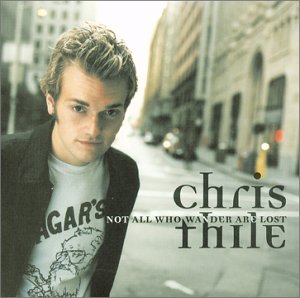
David Kidman
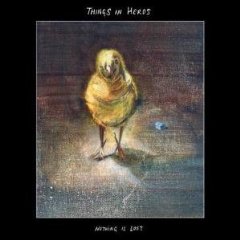
Part of the Fence Collective, the Brighton duos' third album again tips the hat to Pete Lush and Miss Ping's love of Nick Drake with music that conjures images of summer meadows, leafy woods, clear streams and lazing on hay bales. They get unexpectedly poppy on a veritably jaunty Nothing Means A Thing, but otherwise the mood's kept tranquil and warmly melancholic, the spare acoustic guitar and sepia hued vocals lightly brushed with minimal percussion, the occasional harmonica or lonesome piano and, as on You Know, murmurs of electronica. Love lost, clung to or sure to end provide the heart of Lush's songs, As You Were Ending, Once Were, Nothing Is Lost and Where Do We Go flowing with a gentle intimacy like prayers dancing in the rays of sun skittering between church pews.
Mike Davies June 2008
Third Ear Band - Alchemy / Elements (Gott Discs)
Even in the exceedingly receptive and open-eared climate that the early "underground/progressive" label Harvest reliably fostered, the Third Ear Band must have seemed very strange bedfellows for the likes of Pink Floyd and Edgar Broughton. With (in "rock" terms) completely unorthodox instrumentation (shock horror – no guitars, just violin, cello, oboe, recorder and hand drums), their music gave us not so much the shock of the new, then, but the shock of the old, even primordial. The story is that out of the ashes of the Giant Sun Trolley, free-jazz stalwarts of London's UFO Club in around 1967, Glen Sweeney (initially with Dave Tomlin) formed Third Ear Band with Richard Coff and Paul Minns, ostensibly to play "electric acid raga" – at least, until most of their equipment got stolen and they were left with just an oboe, a violin and some hand drums! Their music was uncompromising and highly esoteric, with the emphasis firmly on establishing (and maintaining, often over an extended timespan) a trance-like connection with the audience. To my mind, this music translated surprisingly well to the medium of vinyl – but then, it was obviously my only way of experiencing it at the time (and at my tender age!)… It sat well on my shelves alongside other obscurities or unclassifiables and LPs of Indian classical and medieval music, and was played often. Alchemy in particular was drenched in the atmosphere of times past yet timeless and cryptic, unnerving in its sparse simplicity of purpose and execution, its fragile, curiously brittle strength, its maddeningly hypnotic flow, at once deeply reassuring and deeply disturbing, even occasionally frightening; it exuded a unique and subtly awesome vibe that I couldn't begin to describe at the time, but it sure was something pretty special. There was nothing at all like it in its day (1969), and even in the context of today's burgeoning world/ethnic sensibilities both of the early Third Ear Band artefacts still sound remote and unusual. Alchemy included such quintessential Third Ear workouts as Ghetto Raga and Mosaic alongside shorter essays such as the altogether folkier Lark Rise, while there was even a guest appearance by John Peel, pinging a jew's harp through Area Three. The outfit's starkly eponymous second record gained its unofficial subtitle Elements through its programmatic nature; essentially a 36-minute concept album in four "movements", it presents highly contrasted mood pieces that stylistically range from pre-New-Age stratospheric weirdness (Air) to earthy (sic) Eastern European peasant music (Earth), to insistent, pulsating yet strangely controlled frenzy (Fire) and stately, atmospheric dance (Water). Compared to Alchemy, the stretching-out of musical ideas on this second record is ultimately less satisfying, with a tendency to ramble. Each of the Elements is undeniably complete in itself, yet I find it somehow less impressive, even when taken as a sum of its parts. Even so, it makes a striking companion piece to Alchemy, and points the way towards the band's next ventures – film soundtrack work, notably that for Polanski's Macbeth (still available on BGO, I believe) – before disappearing into the mists of time for around 15 years (another story…!). These freshly-remastered discs bring new life to the ancient grooves; the admirably clear sound quality is especially apparent on Alchemy, I feel, compared to the earlier, intermittently-available Dropout CD issue. The reasonably-priced double-disc set is well presented (house standard for Gott Discs!), with perceptive sleeve notes by Chris Blackford. (I've always wondered if there were any outtakes from those sessions though…)
David Kidman
Thirteen Senses - The Invitation (Mercury Records)
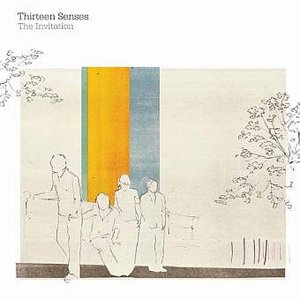
Just about everyone else has said it, so here goes. There is more than a faint reminder of Coldplay about Thirteen Senses debut album, The Invitation. See, the world didn't cave in, night will still follow day.
After all, what is wrong with a good band being mentioned in the same breath as another good band? It has happened before.
However, Thirteen Senses deserves to be judged on the merits of The Invitation and not be pronounced guilty by association.
While the similarities are undeniable, particularly on Salt Wound Routine, Thirteen Seses has found a harder edge. The towering Thru The Glass is more industrial, a touch more artisan than art school.
However, this is not an album you will immediately take to your heart, there are no heartfelt, humble outpourings of emotions. The grandeur of it all means it will be admired rather than become a soundtrack to treasured memories. I don't see couples leaning over in 25 years time and saying wistfully 'Ah remember the night we danced to Angels and Spies'. The Invitation is just not that kind of album, it's very much here and now. That said, it is still a stupendous album, never mind for a debut. Listening to it is like standing on top of a mountain and imperiously surveyng all below. Do No Wrong has a feeling of invincibility (not that surprising given the title).
There is even enough in Will South's voice to make grey-haired old Yes fans go misty-eyed and, even in these early days, Thirteen Senses displays the same love of scale if not yet of over-indulgence.
Michael Mee
Both album title and band name could so easily have signalled this offering being a real turkey, but I'm so glad that the opposite is the case. Frontman Johny Lamb, co-founder of the Devon-based indie record label Drift, cut his teeth in The Small and Actress Hands, and has now shifted his focus to absorb into his personal take on life some more lo-fi, rootsy folk influences. He's termed Thirty Pounds Of Bone a quick-fire assembling of musician friends (Actress Hands frontman Matt Eaton, label-mate Sally Megee and producer Steve Grainger) to realise his artistic vision in a set of songs that reflect his life-long love of folk music, yet whose sparse and touching demeanour arguably owes as much to the likes of Sparklehorse and Nick Cave as it does to more traditional musical modes of expression. Except on the rabble-rousing untitled seventh track, which sounds like a peculiar homage to the Clancy Brothers and the Pogues. Elsewhere, Johny produces some determinedly intense and moving music from his collection of guitars, harmoniums and synths, with occasional touches of accordion, banjo, bouzouki and percussion. The opening When She Goes Up strides purposefully out of a tinny old piano to a doomy Joe Meek rhythm, then ushering in an imitation bowed-gimbri (well at least that's what it sounds like Johny's trying to emulate) backing for the wonderfully-titled, hypnotic The Sorrowful Cry Of The Final Kidney. Later, When I Call and the title track both exhibit the bleak romanticism of Alasdair Roberts, while the strangely tender lament Uyeasound is like Robin Williamson filtered through Will Oldham. The would-be-epic closer, Waves For Ketches, stretches the dreamy seafaring voyage-atmosphere of much of the rest of the album far across the waves with expansive choral effects and gloriously distorted frequencies (it's almost all too much, you might say). It may all sound a curious and yes, occasionally ramshackle mix, but it makes for highly compelling listening – really
www.driftrecords.co.uk
www.myspace.com/thirtypoundsofbone
David Kidman April 2007
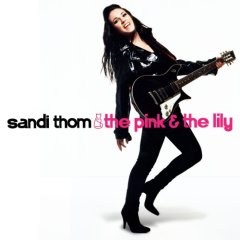
Named for a pub in Buckinghamshire set up in the late 1800s by a Mr Pink and Miss Lillie rather than a jokey play on old Scaffold hit Lily The Pink, Thom's sophomore album is a far stronger, more focused affair than her debut, proving that I Wish I Was A Punk Rocker was no isolated flash of brilliance.
There's a lot more country and roots influence this time round, opening track, Devil's Beat, all handclappy gospel pop while Shape I'm In, the skirt swinging Saturday Night, a rowdy chugging boogie Remote Control Me and I'm A Human Being wouldn't be out of a place at a beer-swilling Nashville juke joint line dance. She does the big country power ballad well too with Wounded Heart and the excellent, emotion packed The Last Picture House, which uses the closing of an old time cinema as a lament for a lost golden age as it builds from simple acoustic strum to a swelling, orchestra laden show stopper. Thom's had her fair share of sniping, but these songs are ample evidence that she's a writer of note while the unaccompanied intro to Success's Ladder, a tale of getting out of the office drone rat race, show she has the voice to match. Pity about the Joan Jett style cover photo, though.
Mike Davies June 2008
Earl Thomas - Intersection (Memphis International)
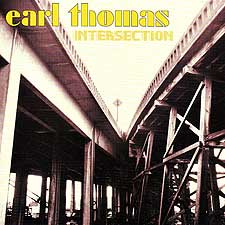
Earl Thomas' second album for Memphis International covers his background in blues and soul whilst adding a few other styles into the melting pot. He's spread his wings a little and has some serious backing. The opener, Workin' Together, was written by Ike Turner who rates Thomas very highly. By coincidence, Thomas only took up music because of Turner's performance in the film Soul To Soul. So, mutual appreciation all round! The sentiment of the some is perfect for today but the ideals are a little unobtainable. The Higher Ground (Everything Is Alright) was written by the Danish duo, Emil Soegaard and Assi Roar, who contributed to his first album. The result is an uplifting and very optimistic song. Next up is The Bright Side Of You (Let Me See), also written by the Danish song-smiths, and Thomas sets loose the husky side to his voice as opposed to the crystal clear delivery that is prevalent on the rest of the album. They call this bluerosofunk (blues/rock/soul/funk) and they're not too far off the mark on this slow burner and it's very difficult to pigeonhole, as is the rest of the album.
There are a couple of famous covers on the album and the first is Marc Bolan's Get It On, renamed Bang A Gong. Thomas funks this up and had Marc Bolan been around at a different time and maybe been American then this is possibly how he would have played it. Thomas has been a fan of Marc Bolan for some time and it shows. Steve Selvidge deserves special mention for his guitar solo on this. Sweet Like Sugar is another that's hard to categorise. It's a little bit funk, a little bit soul and he's backed by some Memphis heavyweights on this one. Earl turns in one of his most powerful vocal performances on The Lucky One, a bluesy soul offering that has Hammond B3 and horns aplenty. Life Of My Broken Heart was written by Jeff Paris who has, in his time, written for Jeffrey Osborne, Mr. Big and Rod Stewart. This is chart rock and little else.
No Two Wrongs was co-written by Earl Randle, a real Memphis heavyweight, and Maurice Williams did the music but it's no more than middle of the road soul even though it is sung so well. Your Daddy's Eyes is American soul sung by a man who is coming into his own as a vocalist and one who has grown in the past two years. To finish with, Earl chooses to take on Brown Sugar – yes, The Rolling Stones! This is given a funked up, bluesy treatment that is slower than the original but the horns come into their own here and there's a big drumming performance from Edward 'Hot' Cleveland.
This is a smooth, professional album by a performer of whom Ike Turner says, "I'll tell you something I really believe. I think this guy is going to make it, not even if he's given half a chance; he'll make it if he only gets a bitty spot of a chance and that ain't no bull".
www.memphisinternationalrecords.com
www.earlthomasblues.com
David Blue
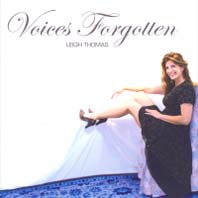
An Air Force kid, born on a base in Louisiana and constantly on the move, Thomas now calls Newport, South Wales home but you can still hear a restlessness in her bluesy Americana. Appropriately then, her first fully fledged album charts her journey, from childhood with a difficult, disciplinarian father, through her parents' divorce and the many different towns in which she grew up. The album's seven minute last track, the slow burning Back Home, a mash of gospel, blues, mountain folk and handclaps rhythm, was even written in honour of her grandfather, whose brutal murder in New Orleans remains unsolved (crime buffs check out www.lonzyhaywoodminshew.com).
It's an interesting collection, ranging as it does from the retro feel torch country of Man From Idaho and the Celtic tinged ballad I'm A Woman to Blytheville's twangy folk rock chug and Down With You, a smouldering southern funky blues that calls to mind a steamy Bobbie Gentry.
The blues burn potently too on Least Of You while Men is a raunchy slice of slinky barrelhouse designed to be heard while clutching a bottle of JD, a mood firmly contrasted by the late night melancholy of Beautiful Pain.
Arguably the album's strongest moments, in terms of backstory if nothing else, hark to her childhood. Differently was part born out the day in 1978 when, at the end of a summer visit to mum, she stayed on while dad took her younger sister away, while I Don't Understand, where Gentry's spoken southern blues resurface, is written from the perspective of a confused kid trying to make sense of the upheavals of her life. Given the music it's produced, hopefully she'll never get too settled.
www.myspace.com/leighthomasmusic
Mike Davies February 2009
Molly Thomas - Shoot The Sky (2005)
Shoot The Sky from Nashville's Molly Thomas arrived out of the blue and hit like a thunderbolt.
I have absolutely no idea who the subject of the withering opening track Blueprint is, only that it's obviously someone who she knows well and I'm just glad it's not me. Her voice rises out of the rubble of a devastated relationship to condemn unequivocally and without mercy.
At times it's almost impossible to hear anything other than Thomas' voice. It's not that she's louder than anything else but the heartache poured into songs like Bad Timing is deafening. They are so intense that listening to them produces the same feelings of guilt as slowing down to rubberneck an accident. The accident analogy doesn't end there because there's a great deal of emotional wreckage attached to the album. It's bittersweet, heavy on the bitter, easy on the sweet.
But Molly Thomas is no little lady, bemoaning her trials and tribulations at the hands of the wrong kind of man. There's a streak of defiance a mile wide in her voice and, as a writer, she kicks where it hurts and with unerring accuracy.
That defiance is epitomised in Crack Cocaine, which has nothing to do with drugs and everything to do with the kind of all-consuming love that leaves hearts broken and lives shattered.
It's fitting that the album closes with I'll Be Fine, the title of the song is the only time Thomas strays from the truth, as the notes fade and the door closes, you realize that fine is the last thing Molly Thomas will be. Shoot The Sky is so confessional and close to home that, for her own well-being, I hope that she's finally exorcised whatever demons drove her to record it.
Quite what the country capital of the world makes of this rebel poet in its midst, is anybody's guess. One thing is sure, Nashville will have to sit up and take note because you just can't ignore the power of Molly Thomas or Shoot The Sky.
Michael Mee, Editor, The Hawick News
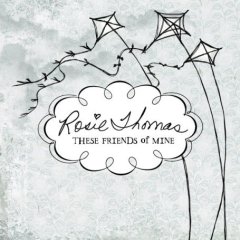
Singer-songwriter and sometime stand-up comic, last time around Thomas' circle of chums included Ed Harcourt who duetted on a Gilbert Becaud cover. Here, the appearance of Sufjan Stevens (who affords the lovely call and response Say Hello) has been highlighted but it should also be mentioned that the friends also include Damien Jurado and Dave Bazan on backing vocals and, much praised by Netrhythms, Denison Witmer supplying voice and vocals as well as her cover of his own Paper Doll.
Her first release for Nettwerk after leaving Sub-Pop, as before, Thomas' voice conjures thoughts of early Joni, Shawn Colvin and the young Carole King while her delicately crafted acoustic songs lay out her feelings and experiences, her longings, friendships and (as on Much Farther To Go for example), her ambivalent love for New York with unaffected, heart-touching openness. Recorded on the hoof, most within minutes of having been written, over a couple of years, shorn of studio polish it's a soothing, relaxed listen that gently winds its arms around you.
Aside from Paper Doll, there's two further covers, included in homage to the versions performed by Witmer and Stevens during the trio's tour; REM's The One I Love (duetting with Stevens) recast as a tenderly hushed acoustic ballad, Christine McVie's Songbird infused with the tang of a clean sea breeze and radiantly blue skies.
It says much that her own songs stand shoulder to shoulder with both, her hymn to the Big Apple If This City Never Sleeps, the nigh hymnal Kite Song, the banjo strummed Why Waste More Time?, and, back to those Brooklyn streets, the Janis Ian flavoured All The Way To New York City all highlights on an album that's destined to find a place in many year end best of lists.
www.rosiethomas.com
www.myspace.com/rosiethomasmusic
Mike Davies May 2007
Rosie Thomas - If Songs Could Be Held (Sub Pop)

The Seattle singer-songwriter has a parallel life as a stand-up comedienne under the alter ego of Sheila, a pizza delivery woman in an arm-sling and neck-brace. I can't vouch for her comedy, but I can say she has the voice of an angel and writes beautifully hushed, heartaching female-centric songs of personal reflection on which she conjures thoughts of Joni Mitchell, Carole King, and the early work of Janis Ian.
This is her third, most assured and best album, one that digs under her own skin to rummage among her uncertainties, hopes, fears and disappointments. Opening with the folksy double tracked vocals of Since You've Been Around as she confesses to having a lot of things to figure out, it slips into Pretty Dress and while the chorus harks to shades of Alanis, the verses channel Ian, not just in the rising falsetto but in its parable of beauty and identity, the awkward teenage girl's need to be noticed for herself. It's a theme that also inform the simple piano backed Death Came and Got Me with its questioning of self-worth and whether anyone cares.
A loose blues-spined Loose Ends draws the image of a worn out sweater, its stitching coming undone, to describe a woman unravelling, It Don't Matter To The Sun deals in loneliness and the way the crushing of a relationship can be the end of a world even when the planet keeps spinning. Break ups are there too on the filigree delicate Clear As A Bell while Say What You Want's emotional memories reflect on regrets of placing other priorities above love. Fittingly, learning to love and figuring it all out occupies the concerns of the McGarrigles-like Guess It May.
Sat in the middle of the album's 11 tracks is its sole cover, a lovely duet with Ed Harcourt on the Gilbert Becaud standard, Let It Be Me, before she achingly winds things down with the heartbreaking Time Goes Away. Based on her mother's stories, it offers woman's memoir of her father and mother and the times spent together, and the fear that memories of the moments will fade away. It closes with the whispery Tomorrow, a grab the time pledge of devotion, offered up over a simple acoustic guitar and distant strings, that sounds a dying fall note of hope and comfort, a hymn of belonging. If songs could be held, this is an album to embrace.
Mike Davies
Rosie Thomas - Only With Laughter Can You Win (Sub-Pop)
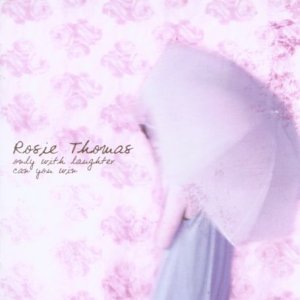
The Detroit singer-songwriter has a parallel life as a stand-up comedienne under the alter ego of Sheila, a pizza delivery woman in an arm-sling and neck-brace and her own cover band, Strawberry Jam.
I can't vouch for her comedy, but on the basis of her this album I can say she has the voice of an angel and writes beautifully hushed, heartaching songs of personal reflection on which she conjures the spirit of Joni Mitchell and Carole King, though you may also detect a trace of Janis Ian and Emmylou. If Let Myself Fall, the album's brief a capella opening track hymn to surrendering to love recorded with her mother in an old Detroit church, doesn't send shivers down the back of your neck then you need your pulse checked. And it just gets better. On the fragile folksy Red Rover, perhaps the closest to Emmylou here though also evocative of the McGarrigles, she's joined by Sam Beam for the sort of love song duet to make you go weak at the knees while One More Day muses over lost opportunities and the simple piano and violin accompanied You and Me celebrates the depth and fragility of love and the resilience and determination to handle the pain that, as on Sell All My Things, enables you to carry on if it breaks. I Play Music she affirms on the album's most upbeat and self- affirming track, and she does it wonderfully too.
Mike Davies
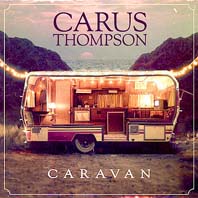
Australian singer-songwriter Carus is probably best known in the UK for his stints of opening for Seth Lakeman on tour – twice so far, with another set of dates coming up in mid-December this year. And to coincide with those appearances both Carus and Seth are releasing new albums – although for some inexplicable reason Seth's own album, Tales From The Barrelhouse, is not being made available at all for review (how dumb is that!), so I'm sorry but you'll not be able to read about it here.
But thankfully Carus' latest, Caravan, has been sent to us. It both consolidates and expands his œuvre on 13 new songs (well actually 12, for Imperfect Circle was penned instead jointly by Christian Thompson with Kim McDonald). Carus explains that these were all written very much "against the wall", in that the process of throwing himself hard into touring provided just the emotional pressure he needed in order to be creative. Even a songwriter of some 20 years' standing needs that impetus, but on the other hand a dozen years of constant touring inevitably drains the songwriter's soul and there's a palpable undercurrent of desperation that drives this latest batch of songs. The situation of an independent artist "peering off a cliff's edge" and wondering whether to have to return to the full-time day-job – well that's a familiar one to any artist, and Carus expresses this and other associated pitfalls of the lifestyle in introspective yet conversational language and terms with which we can all readily identify.
His stance is persuasive, and it's easy to appreciate the thoughtful nature of his world-view on songs like You Can't Find Me, while on the other side of the coin, and despite that desperation, the simple honest optimism of Beauty Is Your Way is attractive too. Not all of the songs are specifically personal in subject-matter, either: for example, Bright Star is a powerful tribute to the bravery and integrity of track athlete Peter Norman and Fifteen chronicles a police shooting of a boy of that age. It's a pity, then, that on some of the songs the poetry of Carus' lyrics is not entirely matched - and can even be undersold - by their comparatively plain settings (the opener Red Sky is one that arguably deserves a better melody, for instance).
As for the sound of the album, well it's mainly punchy contemporary-acoustic with distinct rock leanings, and this is reflected in Carus' use of his live touring bands from both continents; one of the lineup permutations spotlights the feisty violin of Seth himself, with brother Sean on electric guitar, and it's a shame that they don't appear more often (especially with the withdrawal symptoms we're now getting from not being able to hear Seth's own album!). The most interesting (and satisfying) tracks tend to be those with the more stripped-down settings – the string-backed Whistleblower, the reflective, world-weary Luke's Song (just Carus and his acoustic guitar) and the title song's gently tolerant odyssey. Production and mixing duties are handled by Carus' trusty long-time team of Greg Arnold and Brad Jones, and overall it's an appealing and consistent set that will sound good on radio too. Plenty of units will no doubt also be shifted on those upcoming tour dates…
David Kidman November 2011
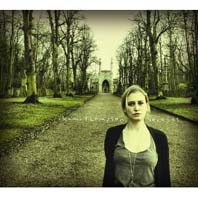
After Teddy firmly established himself as his father's son, now comes Richard and Linda Thompson's daughter proving the illustrious musical genes have been equally inherited by the female side of the family too. Now calling herself Kami rather than Kamilla, she calls herd debut album "self-indulgent break-up music", which following on from last year's Bad Marriage EP, would seem to set an underlying theme to her relationships.
I remember hearing demos as far back as 2006, which lends credence to tales of the album having been languishing in limbo for the past two years, reinforced by the fact that the two tracks from the EP that don't appear here (the third is her 60s beat blues cover of George Harrison's Don't Bother Me) are more musically experimental and aggressive than the generally more straightforward folk-rock material elsewhere, and feature completely different backing musicians.
One of the early demos, the allegorical Nice Cars ("ladies shouldn't drive nice cars, they're only going to break our hearts"), turned up on her mother's 2007 Versatile Hearts album and reappears here, but in a blusier, drier and, to be honest, superior version. Likewise, chugging opening folk rock number, featuring her dad's signature guitar work, has been around a while too, so it's good to finally hear it in a finished setting.
Given the message behind Nice Cars and the upbeat Gotta Hold On's advice to " hold on to what you've got even if it ain't enough', it might feel as though experience has battered self-respect and feminism out of her, but while singing how she can't bear to hear her former lover's voice 'and know that you're not there', on the bluesy dark 4,000 Miles (where PJ Harvey's influence looms), no one with a defeatist personality could make an album containing songs of such power.
For all the emotional turbulence she sails through, this is the voice of a survivor not afraid to examine the scars on her heart and who channels the wounds into words and music that are wordly wise as well as world weary, and, as on Blood Wedding (a song that may well refer to her parents' divorce), ultimately hopeful rather than fatalist.
Although Linda's absent, it's very much a family and friends affair. Dad's there on several tracks of course, as is brother Teddy but fellow musical scions Sean Lennon and Lucy and Martha Wainwright all contribute while the latter's husband, Brad Albetta, both produces and plays bass with the late Jeff Buckley's long time sideman Matt Johnson on drums.
It's taken an inexplicably inordinate amount of time for this to see the light of day, but the wait has been worth it. It's just going to be very frustrating to now have to wait longer to discover how her music has evolved in the interim.
Mike Davies October 2011
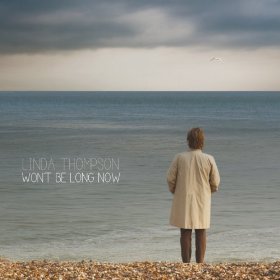
She doesn't rush things. This is only Thompson's fourth solo album in 28 years, a mere six after Versatile Heart, but as ever it's been well worth the patience. Recorded at various times and studios in New York, London and other parts of the UK, like its two predecessors it's very much a family affair, Linda co-writing three of the six self-penned songs with her son Teddy, who also contributes two of his own as well as providing acoustic guitar and backing vocals here and there.
Daughter Kami not only sings on four tracks, she actually takes both lead and harmony on a breezy romp through Anna McGarrigle and Chaim Tannenbaum's As Fast as My Feet which also features Linda's other children Jack on bass and Muna on harmonies while the latter's own son, Zak Hobbs, provides the twangy guitar. And if you're wondering where Richard hot to, well the icing on the family cake is the superb trad-flavoured opening track Love's For Babies And Fools (originally written for Rufus Wainwright) on which he plays acoustic guitar while his ex-wife sings.
And if the family's impressive, take a look at the list of friends which (while the backing's never overstated) includes such luminaries as David Mansfield, Sam Amidon, Dave Swarbrick, Martin Carthy and daughter Eliza, the latter three all featured on Mr Tams, a playful tongue in cheek drinking song (with suitably intoxicated chorus sway) tribute to fellow musician John Tams (even if, of necessity, it casts his wife as the party pooper), recorded in Eliza's Scottish home studio with both her and Susan McKeown taking a verse each.
There's a whole troupe too on the mother and son penned slow waltzing spinster's lament Never the Bride, among them Kirkpatrick providing accordion, Jenny Muldaur on harmonies and, roping in the family again, son in law James Walbourne on slide. The tale of a woman who lost not one but two lovers to the sailor's wanderlust, it's one of four nautically-themed songs, the second being Never Put To Sea Boys, a pulsing shanty co-written with a featuring Irish singer-songwriter John Doyle and, with its brooding atmospheric atmospheric programming, the only track not to be wholly organic in its sound. Doyle also pops up again, alongside Swarbrick and Glenn Patscha on pump organ, on Teddy's traditional styled stark bitter anti-war coming of age Father Son Ballad.
The third briney ballad has a somewhat unexpected co-writer in the form of Ron Sexsmith who, introduced to her by her son, provides the tune for the Appalachia meets Yorkshire flavoured If I Were A Bluebird that sees Amidon on acoustic guitar and banjo, Mansfield on Weissenborn guitar and Levon Helm's daughter Amy on harmonies.
The final sea song is one of three numbers taken from the public domain. Having been singing it to herself for 45 years, she now finally joined by Martin Carthy with Garo Yellin on cello for Nursery Rhyme of Innocence & Experience, Tony Callen's sombre setting of Charles Causley's poem that infuses the traditional feel with a hint of Kurt Weill.
The first of the two trad numbers, featuring just her and Teddy, the bare-boned Paddy's Lamentation is taken from the soundtrack of Scorsese's film The Gangs Of New York while, also recorded some years back, Blue Breezin Blind Drunk is an electrifying unaccompanied live performance from New York's Bottom Line of a traditional (with Thompson adding a final verse) Glasgow battered wife ballad.
The album closes with the title track, a folksy McGarrigles-like tune featuring mandolin and banjo (courtesy Tony Trischka) about getting older and preparing to face mortality without regrets of things undone or words spoken in anger. A bit of an odd one for a son to have written specifically for his mother, but given the whole family reunion that the album encompasses not, perhaps, without poignant meaning. Despite the long gaps between albums, with Thompson sounding in marvellously expressive voice and her writing as sharp as ever, hopefully this is far from a swan song and that the arrival of the unreleased tracks referred to on the sleeve thanks won't, indeed, be long now.
Mike Davies, October 2013
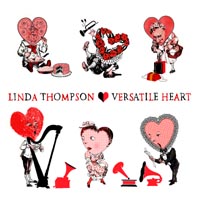
It's been five years since Thompson returned to making music with Fashionably Late, but, working with her son and daughter, Teddy and Kamila, as well as collaborators that include Antony, Martha Wainwright and both Eliza and Martin Carthy, the wait has been well worth it. Bookended by Teddy playing his own acoustic instrumental number, Stay Bright, while essentially rooted in folk rock, it's a stylistically eclectic affair, at times recalling the halcyon days of I Want To See The Bright Lights Tonight recorded with former husband Richard, at others mining the English folk tradition, Americana, rockabilly and torch.
The title track is the first of the mother and son compositions, opening with the mellow warm Northern brass sounds of The Downtown Silver Band and featuring David Mansfield on mandolin, it's an instant singalong chorus Thompson classic; a bitter love song to a cheating two faced partner - "you should have told me, should never should have sold me down the river".
The first of her songs that Teddy put a tune to, The Way I Love You, is another melancholic love song with a fine set of lyrics ("all these wasted years I never have been sure when to ask for less and when to beg for more") John Kirkpatrick's wheezing anglo concertina roots it in the English tradition while Thompson's voice will draw thoughts of the McGarrigles. Which makes the fact that Martha Wainwright provides harmonies all the more spooky.
Brother Rufus wrote the following track, Beauty, especially for Thompson but, even after several listens, it remains messily difficult to love. A typical Wainwright torch lament in its sentiments, it's not a bad song and there's no faulting Thompson's aching delivery or the yearningly romantic strings but it feels like it could have done with another pass to hone the lyrics (the 'what about Michael Jackson' line sounds particularly jarring) while Antony's counter vocal appearance mid-way in just sounds as though the playback track was a few seconds out of synch. some will likely count it one of the album's best numbers, but for me it remains a slow grower.
Katy Cruel is album's trad folk nugget (one of the ay fiddle ay di do day types), a song she learned some 40 years ago that finally finds it way to album co-arranged by John Doyle who also provides guitar alongside Flook bodhrán player John Joe Kelly. It's on to a definite contrast then with Nice Cars. Written by Kamila (who also provides harmony), it's a witty spare bluesy folk lament about the death of a favourite motor. 'Ladies shouldn't drive nice cars," sings Thompson, "they're only going to break our hearts", declining to call the mechanic who'll "only lay his dirty hands on it" as she mourns the beloved ("more than my three children") Merc that's gone to 'auto heaven'. Slight but clever, it bodes well for Kamila's own album.
Driven by Mansfield's lazy twangy guitar and recorded live in Brooklyn, in one take Do Your Best for Rock 'n Roll is one of the album's best moments, a world weary barroom waltz co written by Teddy that might have been penned by Cohen had he been a 50s rockabilly king and comes with a classy vintage middle eight and the great chorus line 'if there is a God save my soul, and if you can't do that do your best for rock n roll'.
Recast as an English folk ballad with Thompson on marvellous bittersweet vocal form, Day After Tomorrow is a cover of the Tom Waits/Kathleen Brennan anti-war song written as a soldier's letter home from the Iraq War, in turn followed by Blue and Gold, a simple but wry lost love song written from an idea by Richard Thompson that lightly steps along as an English folk dance style tune featuring Kirkpatrick on button accordion.
The mood shifts to Americana for Give Me a Sad Song, written many years ago with Kentucky country singer Betsy Cook, another simple singalong highlight with a jogging Appalachian barroom melody and a great chorus; "I'm not a winner, everything I touch turns to stone; give me a sad song, I'm in class of my own."
The second track recorded live in Brooklyn. shades of the McGarrigles resurface on the simple guitar/vocal of Go Home, musically and emotionally evocative of their classic Go Leave. Which just leaves the finale and arguably best track, Whiskey, Bob Copper and Me, a self-penned self-styled "really hardcore folk" song in tribute to the great English folk patriarch Bob Copper , written before his death in 2004, and also name-checking Shirley Collins and Davy Graham while underling the living tradition with musical backups from the Carthys and Susan McKeown. It's a beautiful ending to what may well come to be seen as the best album of Thompson's long and illustrious career.
www.myspace.com/lindathompsonmusic
Mike Davies August 2007
Linda Thompson - Fashionably Late (Topic)
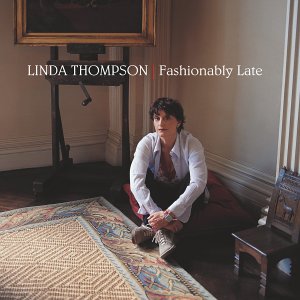
Titled with a knowing sense of irony, this is Thompson's first solo album in 17 years, a long delay caused by her suffering from hysterical dysphonia, a psychological disorder akin to severe stage fright that prevented her from producing speech.
It's been worth the wait. Although she covers Lal Waterson's Evona Darling (recorded with Van Dyke Parks on accordion for the Lal and Mike tribute, misheard from Yvonne Ah Darling), and son Teddy contributes All I See, everything else is either self-penned or collaborations with Teddy or - on Paint & Powder Beauty, a Noel Cowerd-like 40s style ballad about an ageing call girl - Rufus Wainwright, underlining that fact that Richard & Linda Thompson was very much an equal partnership.
Talking of her ex, there's even a brief reunion here providing guitar on the opening backwoods country-hewn Dear Mary. Other guests dropping by include daughter Kamila, Wainwright and sister Martha, Kate Rusby and Martin and Eliza Carthy, but Thompson doesn't need any support crutches for her comeback album to reaffirm her status as one of the finest female singers this country's produced.
Musically, it very much harks back to those early acoustic story-telling folk-rock days with Richard, indeed The Banks of the Clyde and her own unadorned redemptive love song No Telling and could have come from the Bright Lights or Fall Down Like Silver sessions, recorded on the sly when Richard was out of the studio. Like those classics, the album relies simply on the voice, the song, the melody and the musicianship.
It needs nothing else. Thompson has the ages of the world in her voice, a seasoned observer who brings a wounded world weariness and wisdom alike to wistful death song Miss Murray and Nine Stone Rig's reinvention of Scottish murder ballad Barthram's Dirge that expands the story to the recount its aftermath.
Weary Life is a delightful cautionary tale about the way marriage takes the spark out of men's courtship, a song you can't help but listen to in tandem with the closing Dear Old Man Of Mine (Teddy on sparse guitar, Kamila on harmony) an obvious nod towards Richard that puts the past to bed but wipes a tear from the eye in doing so. With the recent collection of old and unreleased material - compiled by the current album's producer Edward Harber - a timely reminder of what was, this is a wonderful portent for what is hopefully yet to come.
Mike Davies
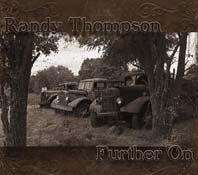
If you're going to release an album as 'traditional' in tone as Randy Thompson's Further On then you need to do it with spirit, heart and soul, otherwise you become just another member of a huge herd, following a well-worn path.
Thompson confirms his and the album's freedom of spirit in the first two tracks, Don't You See and Songbird and then reveals the heart and soul in a stunningly beautiful and gloriously simple Riptide. Riptide also throws up another dilemma for Thompson. Its basic, from the heart storytelling could be easily and lazily but mistakenly labelled clichéd and dated. However dig below the song's surface and you discover just what makes country/roots music one of the most noble of genres, a simple truth, honestly told. And it's because of that ability that musicians like Randy Thompson will and must thrive, their craft is based on something more important than the latest music press headlines.
It's not surprising that Randy Thompson's music is built on rock solid foundations, he can trace his Virginia bloodline back over 300 years, you can't get more rootsy than that and in the case of Further On roots isn't a genre of convenience, it's a cherished heritage. Musicians like Randy Thompson make music on their own terms, everything else is there to serve that purpose and it's that unshakeable belief that intensifies the country ballad Don't You Remember and the old-time bluegrass of Ol' 97. On their own they would be good but with Randy Thompson's total commitment driving them, they become much more. He evens finds room to add the odd tinge of country rock just to spice things up a little.
If you accept Further On on its own terms, you'll discover a treasure trove of everything that is wonderful about country music. Thompson himself describes Further On as "Virginia Red Dirt Roots With a Pulse", sums it up perfectly.
www.myspace.com/randythompsonjackpotrecords
Michael Mee July 2008
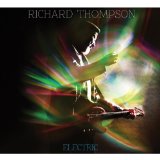
Yes, in the scheme of things this new Thompson studio album falls into the Electric category – but as always with RT, that's never quite the whole story. Coming out in good preview time for Richard's major 30-date UK tour (starting 20th February), and produced by Buddy Miller in Nashville, it features his core touring power-trio that basically retains bassist Taras Prodaniuk and drummer Michael Jerome from the band that backed him on the recording of 2010's Dream Attic album. These guys mean business – and then some!…
The record crashes straight in, lunges at our consciousness with a raw, garagey feel and a seriously heavy-duty thundering beat, Stony Ground providing a significant addition to RT's gallery of sleazy characters in Old Man Morris, who's shoved right in our face and almost doing the Back Street Slide to the staccato rhythm of a tear-stained letter and a series of archetypally breathtaking axe-winder solos.
The ensuing memorable and evocative Salford Sunday could by comparison pass for almost lyrical, impressionistic Brit-pop of a particularly classy kind, whereas Sally B adds a further portrait to that rogues' gallery, its solid growling bass parallel-shadowing the lead guitar line in a chunky, funky rhythm. Then comes a new entry in RT's canon of "industry" songs, Stuck On The Treadmill, a numbingly desperate funk-rock juggernaut beast of a track with a strong Zep (Physical Graffiti) feel (a sly reference to the fact that Buddy's recently produced Robert Plant, maybe?) and some absolute killer guitar work including another of those gritty, gutsy, intuitively twining and logically meandering solos with bitter and twisted progressions that've become RT's distinctive trademark and stun and surprise over and again however familiar they might've become over repeated plays.
After that monster rampage of a track, textures lighten rather for the majority of the remainder of the disc, starting with My Enemy, which gloomily probes into the extremes of love and hate, and burns into your brain with its plaintive and doomy folky melody that shoots off in a somewhat unheralded direction, boosted by some understated but effective harmonies from guest vocalist Siobhan Maher Kennedy (who also appears on five more tracks). A deeply Duane Eddy-twangsome riff pervades Good Things Happen To Bad People, an almost gleefully catchy relationship ditty with a totally classic pop-song structure, then the album seems to coast just a little with the more relaxed country-rock of Where's Home?, one of several tracks to prominently feature the ace fiddle playing of guest Stuart Duncan (his Nashville compadre, bassist Dennis Crouch, also guests on a few tracks by the way, as does producer Buddy, of course…).
Another Small Thing In Her Favour, though folksy and quite tender in its own way, is another classic RT end-of-relationship departure song with a distinct bite to its almost wistful sentiment, and is followed by the Farfisa-soaked fairground-pop vibe of Straight And Narrow that might well've come straight off the wall of death to haunt you down the years. This interlude over, it's back to business with the simply-scored acoustica of Snow Goose, which with its "She is like a snow goose, Pale and rare and footloose" lyric may not exactly be the Beeswing it kinda seems to emulate, but is an affecting, if quite morose little creation, incidentally sporting a gorgeous (though not excessively sweet) and inventively-harmonised backing vocal from guest Alison Krauss. After which, the album closes with Saving The Good Stuff For You, an uncharacteristic (for RT) kind of number, one of those yearningly regretful country waltzers with keening fiddle, where you're sat right there on that barstool seein' in the dawn.
But that's not all – for lucky early purchasers can wallow in a second (bonus) disc which delivers a sizeable 25-minute appendix to the main menu's 50-minuter. It contains a total of 7 tracks, the first four of which it would appear were recorded at the main album sessions. These don't quite carry on where the first disc left off, but they take us (with Stuart's fiddle again along for the ride) from the jovial driving rock'n'rollery of Will You Dance, Charlie Boy through the plangent I Found A Stray and the assorted toorah-looras and Jimmy Shands-style hoedown of The Rival to the more sinister portrait of The Tic-Tac Man.
These arguably-not-quite-so-daring adventures are then topped up with a track from last year's Cabaret Of Souls extravaganza (another portrait from the gallery, that of unrepentant murderer Auldie Riggs) which segues into a new recording of an associated dance-movement; the disc closes (less than logically, it must be admitted) with a brief number taken from the 1000 Years Of Popular Music project of around six years ago. I can't fathom the rationale for stretching this material out onto a second disc, when the album sessions proper could've easily fitted well within the capabilities of one generous 70-minute disc (without the 1000 Years extract, that is). Although the package includes lyrics for the main menu disc, it omits those for the songs on disc two (although with commendable efficiency they do appear on the Song-o-Matic page of RT's website).
So – a final verdict? Perhaps it's too early to vote Electric as one of RT's best-ever albums, but it does contain some standout material, and while there's nothing seriously sub-standard or specifically weak here in terms of the actual writing, it does harbour a bit of a warning sign in that some of the songs, while not exactly feeling to have been writ by rote or formula, just manage to sidestep a degree of contrivance in their rhyming scheme. In many respects, what will probably live as much in the listener's memory is Electric's integral musical signature, for it's a duly spontaneous-sounding, almost-as-rough-as-live diamond that doesn't require polishing.
David Kidman February 2013
Richard Thompson - Summer 2011 promo to accompany new box set
Richard Thompson "Live At The BBC" deluxe boxset out now on Universal (3 CD's plus DVD)
Remarkably, this is the first ever compilation of Richard Thompson's post Fairport Convention BBC recordings. Only one John Peel session from 1974 has ever been released before in this collection of 61 audio tracks - plus 19 track DVD. Live At The BBC also includes exclusive new interviews with Richard Thompson and Linda Thompson.
Spanning Thompson's solo years from his first John Peel Session (with Linda Thompson) in January 1973 through to a Hub Session for Six Music in 2009, Live At The BBC features an entire disc of sessions and concerts from Richard And Linda Thompson including an In Concert performance with a full band recorded just after the release of the couple's classic 1982 album Shoot Out The Lights.
The remaining audio discs feature Thompson solo or with a series of great Richard Thompson Bands, drawing from all Thompson's Island, Polydor, Chrysalis and Hannibal albums in the 70s and 80s plus Thompson's independent releases since 2001 from The Old Kit Bag to 2009's Sweet Warrior. Highlights include an extraordinary acoustic session for Andy Kershaw in 1987 featuring ten stunning solo versions of tracks mostly drawn from Thompson's mid-80s albums Daring Adventures and Across A Crowded Room but stretching back to poignant performances of 'Withered And Died' and the 'End Of The Rainbow' from the first Richard and Linda Thompson album I Want To See The Bright Lights Tonight. From 1986, a top notch Richard Thompson Band augmented by accordionist John Kirkpatrick is captured in full flow at the Hammersmith Palais, with songs including 'Valerie', 'Wall Of Death' and 'Fire In The Engine Room'.
There are four otherwise unreleased songs written by Richard Thompson in this set: 'Dragging The River', 1973, 'Modern Woman', 1982, 'Kidzz', 2003 and 'Time's Gonna Break You', 2009. There are also several traditional songs Thompson has not recorded elsewhere, including 'William Brown' and 'A Hunting The Wren' which Thompson performed for Bob Harris in 2008 as part of his chronological music history lesson, 1000 Years Of Popular Music.
The DVD Disc features superb performances from the 70s and 80s, all unseen since they were broadcast aside from one clip of Richard & Linda performing 'A Heart Needs A Home' on the Old Grey Whistle Test in 1975. The couple are also captured on the Jake Thackray Show and in concert for BBC Bristol's A Little Night Music, both from 1981. A solo clip of Thompson's 'She Twists The Knife Again' from the Whistle Test in 1985 and a Richard Thompson Band show recorded at Barrymore's Club, Ottowa the same year, complete the DVD disc.
Live At The BBC offers a fascinating selection of alternative recordings spread across Thompson's extraordinary forty year solo career. He revisits one classic song after another including 'The Angels Took My Racehorse Away' from his eccentric debut album Henry The Human Fly, 'Wall Of Death', 'Dimming Of The Day', 'Tear Stained Letter', 'Gethsemane', ''Dad's Gonna Kill Me', and a rare cover by Richard and Linda of Sandy Denny's 'I'm A Dreamer'. Live At The BBC concludes with Thompson most renowned early song 'Meet On The Ledge' which he played acoustically on Six Music in 2009 - the only Fairport era song in this set.
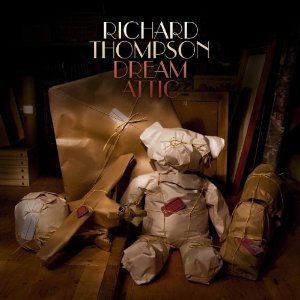
Richard's latest offering is an intriguing proposition from the outset: a brave artistic statement which takes quite a number of risks and yet manages to deliver right down the line in that boundary-defining way the true greats of the music world inevitably make their own - for his latest record comes in an innovative format that as far as I know hasn't been tried before.
The basic package is a live album, on which Richard and band deliver a set of 13 brand new songs (yes, new: now there's something very unusual for a start, as live albums tend to be mostly reworkings of hits or older material). But here's the best news: there's also a deluxe edition which supplements that live album with a second disc that presents the same 13 songs in acoustic demo versions (mostly just vocal and guitar). This gambit yields some really interesting and fruitful comparisons, with some songs unexpectedly making more of an impression in one format or the other, but the most striking thing of all is that in whichever guise the songs are presented, there's no let-up in quality - indeed, I'm already convinced that a sizeable proportion of the new material is destined for classic status even considering Richard's already extensive pantheon of killer songs.
To say that Richard and his band (Pete Zorn, Joel Zifkin, Michael Jerome and Taras Prodaniuk) are on heat here is an understatement, for the live set is characterised by a ferocious energy that blazes bright and spreads right across the canvas, from Richard's own explosive vocal delivery - inextricably wedded to a clutch of violent yet hyper-sensitive live-for-the-moment guitar solos - to the brilliantly empathic band support that fires off its salvos of musicianship, respect and trust in both directions. RT's the man who habitually delivers the goods with serious solos to match, but I'm still left gasping at the majestic, blistering displays of inventive axework on If Love Whispers Your Name, Sidney Wells, Haul Me Up, Crimescene and The Money Shuffle (to namecheck but five); even after several playthroughs, familiarity doesn't breed any hint of staleness or predictability. Against which, the more lyrical of Richard's guitar-solo excursions (such as the coda of Stumble On) are almost as cathartic in their own way.
And we mustn't underestimate the ancillary yet brilliant primary colours and shadings of Pete's various saxes and flute consorting in merry and creative juxtaposition with Joel's fiery and often distinctly frantic fiddle, over a constantly forward-driven rhythm section that's also the solidest of foundations.
Lyric-wise, Richard's lost none of his talent for directly and tellingly engaging, identifying with and conveying a variety of emotional states. There's his trademark heavy sarcasm and feverishly angry bile in railing against the attitudes and inefficiencies of certain professions (bankers in The Money Shuffle, for instance) and the conceit, hypocrisy and shallowness of individuals (in Here Comes Geordie, where RT's sprightly, jaunty folky setting gives further credence to the application of the epithet "sweet warrior"). There's also two strong vignettes: Sidney Wells, set to a tumbling jig rhythm that sounds like it's crossing the Rocky Road To Dublin with Manic Depression by the time it gets to the blind rush of the cascading guitar solo, while Demons In Her Dancing Shoes, by contrast, is comparatively upbeat in its affectionate depiction of the "working girls of Chapel Street". And there's the "doom and gloom" of deep self-examination and despair (Stumble On and Crimescene), with the decidedly forlorn Burning Man then set against the heartfelt (and just as deeply reflective) explorations of loss on A Brother Slips Away and the traditional-sounding Among The Gorse, Among The Grey, and the more playful, even tongue-in-cheek honking, stonking rock'n'roll of Bad Again (musically, harking back both to the Crowded Room and Time To Ring Some Changes). After which, the queasy emotional climate of If Love Whispers Your Name is a masterly, if risky choice for set closer.
It's interesting that the dynamic of the set of songs taken as a sequence is quite different on the bonus disc, which proves a fascinating exercise in comparison that goes beyond mere consideration of acoustic vs electric clothes, reaching right into the character of the songs themselves. It's emphatically not an album of first thoughts and tryouts, but a fully formed set of interpretations that stands on its own terms and in some cases illuminates the murky and more enigmatic recesses of the lyrics in a way that the white-hot incandescence of live performance (inevitably) slightly obscures. On the swings and roundabouts principle, there are gains and losses in intensity and impact between the two versions, but there are no total-loss situations, and in all cases each version is totally convincing on its own terms and thus has much to commend it.
Stumble On and Burning Man are strong and impassioned contributions to the canon in both guises, whereas Among The Gorse… is even greater misty folk magic in its acoustic garb, with keen use of drone instruments. A Brother Slips Away is simply the kind of song that would stop you dead in your tracks in any context; whereas Crimescene probably undergoes the most startling transformation, from the chillingly resigned inward contemplativeness of the demo to the more consciously developed full-blown dramatic scena of the live version - but either way it's another of the standout tracks. The strict-tempo reel that polishes off Demons is especially delicious on the demo, as is the dancing mandolin playing on Sidney Wells (though the latter loses some of its epic narrative quality in gaining economy of scale in the acoustic version); Bad Again is even more cheeky in its acoustic garb, while there's an almost alien delicacy to If Love Whispers Your Name on the demo disc. Big Sun Falling In The River is the only song that doesn't quite convince me overall, although it's hard to find fault with either its construction, sentiment or expression (or is it that chord change, I wonder?).
So here's an artist still writing and performing at the very top of his game and after how many? 20-odd? albums still giving us something fresh yet oh so recognisably Thompson yet this time taking a different slant to presentation, a gamble that has paid off in spades - and aces.
David Kidman August 2010
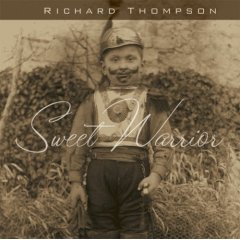
Unlike last year's Front Parlour Ballads, this is for the most part an electric Thompson offering, the first such since 2003's Old Kit Bag, and first impression is very much that the man hasn't lost his touch one iota, the quality of songwriting is uniformly high throughout, consistent to a fault you could say, and the whole affair is unmistakably RT. That doesn't mean it's predictable, just predictably brilliant. But then, you'll say, I'm biased. I've always rated Richard's signature electric guitar work very highly indeed, and he's unique among exponents of that instrument in still being able to reduce me to tears (of whatever kind) with the sheer expressiveness of his playing.
On Sweet Warrior, Richard get the chance to open up and stretch out on 68 minutes' worth of music containing 14 new songs that run a typically varied Thompson gamut from reflective doom-and-gloom and tenderly yearning romantic creations to vitriolic bile and provocative, scathing political comment. And I'll bet that around half of these new songs are likely to be considered Thompson classics. For most of the time Richard's backed by his current core touring band (Michael Hays on rhythm guitar, Taras Prodaniuk on electric bass, Michael Jerome on drums and Judith Owen on harmony vocals), but for just over half the tracks Danny Thompson takes over on acoustic bass, while two feature Joe Sublett on tenor sax and a further three Nickel Creek's Sara Watkins on fiddle, and one (She Sang Angels To Rest) even has a string-trio arrangement. So as you'll gather it's not a bland unadventurous stock-electric-combo sound, and Richard himself injects imaginative colours into the mix with occasional bursts of mandolin, whistle, accordion, autoharp, harmonium, hurdy-gurdy and organ.
Individual highlights for me include the almost unbearable melancholy of the beautifully-paced Take Care The Road You Choose and the mournful closer Sunset Song, the almost cinematic narrative sweep of Guns Are The Tongues, the powerful soldier's-eye-view of Dad's Gonna Kill Me (the inspiration for the album's title?), the less-is-more neo-classical understatement of She Sang Angels To Rest, and the deceptively cheeky nod to traditional song within the pithy commentary of Johnny's Far Away. Elsewhere, Bad Monkey rings the changes on its opening Tear-Stained riff and develops into a satisfying retro-rocker in the best Thompo twist-the-knife tradition (and I'll bet it comes with a killer guitar solo live!), whereas Francesca is a moody ska-inflected number with deep twang underpinning the enigmatic questioning of the lyric and Sneaky Boy is an edgy Costello-style putdown; only the humdrum riffing of Mr Stupid palls on repeated hearing perhaps. Oh, and vocally I might add that RT's on splendid form throughout this set. Yes, I feel sure that Sweet Warrior will shortly come to be regarded as one of the finest in the Thompson canon.
David Kidman May 2007
Richard Thompson - RT: The Life And Music Of Richard Thompson (Free Reed)
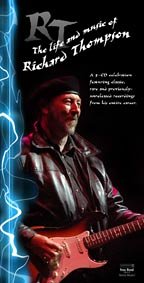
Click here for David Kidman's in-depth appreciation of this impressive Box Set
Richard Thompson - Grizzly Man: Soundtrack (Cooking Vinyl)
Werner Herzog's latest movie, Grizzly Man, chronicles the life, and eventual death by bear attack, of naturalist and film-maker Timothy Treadwell; unusually, the film itself inspired the music and not vice versa. In this instance, the soundtrack is the result of a collective improvisation involving an ensemble whose musicians had never played together before; the ensemble comprised - as well as Richard Thompson himself - Danielle De Gruttola (cello), Damon Smith (acoustic bass), Jim O'Rourke (piano, organ, guitar) and John Hanes (drums, percussion), with Henry Kaiser contributing some of his signature futuristic electric guitar to one piece (Big Racket). The sessions for the improvisation were produced by Henry Kaiser and supervised by Herzog himself, and took place over two days last December. So this album, containing all 63 minutes of the soundtrack score, is obviously not Thompson "doing a Ry Cooder", even though he gets the composer credit for the vast majority of the music it contains. The idiom is definitely predominantly contemporary rather than folksy, and often almost Satie-esque (elliptical in content and structure). The exceptions are the brief twangy setting of J. Scott Skinner's tune Glencoe (this one could've come straight off Richard's Strict Tempo album) and the extended Treadwell No More (a lament?), which betrays a distinct folk-modal influence in Richard's keening electric lines. (Oh, and of course the Main Title theme, which is a thinly-disguised reworking of the introductory figure from one of Richard's most celebrated compositions...) On a few of the pieces, Richard's guitar weaves counterpoint in and out of melodies played by Danielle's cello, rather than supplying the melody line itself; he shows great skill as a composer-improviser - a skill that's may come as a surprise to those who know and appreciate the tightness and sense of strict, often "closed" economy with which his songs can be constructed. And although it's not quite the same as with most film scores, where the musical ideas aren't allowed to develop too far and the listener reaches the point of frustration (ie you want them either to be twice as long or not there at all!), there's still that nagging sense of transience and unavoidable insubstantiality to some of the pieces – but even at its least compelling it proves to be superior-quality mood music. And, against expectations perhaps, there's more than just Richard's own musicianship to marvel at (typical though that is), and Danielle's cello playing often steals the limelight. There's some variety in musical idiom and approach too, from the gamelan-inspired tones of The Kibosh to the stately pseudo-classical Bear Swim, the onomatopoeic snarling of Bear Fight and the sharp avant-garde percussive interjections of Small Racket and Big Racket. There's a snatch of scripted narration on That's My Story, and the final piece, Coyotes (a Bob McDill composition), is performed not by Richard and the ensemble but by the guitar and vocal of Don Edwards. It would have been a neat touch to have included a synopsis of the screen action associated with each of the 19 pieces, but otherwise I found this a strangely satisfying album for repeated listening.
David Kidman
Richard Thompson - Front Parlour Ballads (Cooking Vinyl)
What a superb follow-up to 2003's The Old Kit Bag, with RT unpacking his troubles all over again for our close scrutiny. Well OK, I feel sure the man won't ever disappoint, but this is a particularly strong set even by his own exacting standards.
It's billed as a solo acoustic venture, his first of that ilk since 1981's instrumental set Strict Tempo and (almost unbelievably, given his extensive discography) his first-ever acoustic studio album of original songs. Symptomatic of his highly-driven temperament (Thompo gets twitchy if he hasn't written a new song in a couple of weeks, apparently!), here he presents us with 13 fully-formed brand new compositions, ranging in entirely typical Thompson fashion from often sinister reflections on doomed relationships (For Whose Sake?, Should I Betray?) to grubby, dingy sepia-tinted reminiscences (The Boys Of Mutton Street, When We Were Boys At School) to tender traditionally-inflected love songs (Old Thames Side, Miss Patsy) and laments (Precious One) through to delicately cautious, more cryptic love poetry (Cressida) and suitably vitriolic observations on other folks' lives and loves (Let It Blow). Which is where it all starts, jumping onto the player deceptively with Let It Blow, which soon develops into a primitive kickstart electricity-punctuated rocker that made me wonder whether I'd read the right press release - but rest assured, it's one of those characteristically word-filled-verse-with-catchy-pop-chorus numbers that RT excels in.
From then on in, however, RT settles down to the solo mode - well, with the benefit of masterful and judicious multitracking, that is. Richard is credited as playing "several things" - which means two acoustic guitar parts, also occasionally mandolin, accordion and/or electric bass, with just two tracks on which he was tempted to plug in his electric guitar and on which he called in Bonnie Raitt's percussionist Debra Dobkin to "bang rhythmically on various handy objects"! Emphasising the home-made nature of the recording and providing the rationale for the album title - referring to the fact that the album was recorded entirely in RT's "front parlour" (=garage home-studio in LA.). And boy, does the guy manages to achieve an amazing variety of instrumental textures with such minimal resources.
It goes without saying that his playing is altogether stupendous, with so many subtle yet ultimately attention-grabbing details that make you want to play each track again right away in case you've missed something (and you have!). Musically, well it's inevitable I suppose that there'll be resonances of former glories (eg. the opening chuntering guitar figure of Boys Of Mutton Street definitely recalls the rhythm of 1952 Vincent, though the songs are markedly different in character), but nobody can (or should) ever accuse RT of cheekily plundering his back-catalogue 'cos he's run short of ideas! I can't resist focusing on a few more highlights: the seriously beautiful Old Thames Side, the deep-toned yet sweetly ingratiating wheedling of Precious One, and the gunmetal-grey premonition of A Solitary Life (a "life of small horizons" up there in Muswell Hill). The sultry tango of Should I Betray? with its squeaking guitar fingerplay left in rather than edited out (emphasising the up-close frisson of the experience).
When the acoustic spell is partly broken, as it were, it's My Soul, My Soul, whose doomy chant could almost be a lost opus from the Crowded Room period. And then there's what may well turn out to be the album's masterwork, the disturbingly reflective, moodily jazzy How Does Your Garden Grow? which is remarkable not only for its elliptical guitaristic virtuosity (truly unbelievable what that fella can do with those fingers!), but also for its vocal part, weird and dark and deeply unsettling; and it all compresses into the compass of a mere fraction over two minutes! This impressive economy of expression is becoming increasingly apparent in RT's songwriting, mirrored here too by the deliberately non-sprawling musical settings. High drama and delicacy side by side, and even simultaneously conveyed - quite a feat that! So the verdict - brilliant! Thompson treading water? No way!
David Kidman
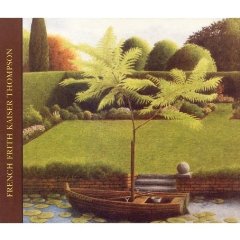
This relatively short-lived and somewhat unimaginatively-named fin-de-1980s combo brought together four maverick talents: our own Richard Thompson, experimental guitarists Fred Frith (of Henry Cow) and Henry Kaiser, and drummer John French (Drumbo from Beefheart's Magic Band). Last year saw the reappearance, courtesy of the good auspices of Fledg'ling, of the first of this foursome's two albums (Live, Love, Larf & Loaf), and now comes the similarly expanded reappearance of the second, Invisible Means, which originally came out on the Demon label in 1990. It was, if anything, an even more wayward-seeming collection, its 17 tracks again covering a bewilderingly diverse spectrum of musical genres. It's like taking a heady rollercoaster ride through distinctly oddball territory, in the company of some equally unorthodox bedfellows. The contemporary R&B of the title track is prefaced by Kaiser's delightful chamber-pictorial miniature Kalo Takariva (which like The Nearsighted Heron and The Book Of Lost Dreams betrays a definite oriental influence), the Beefheartian drumbeat figures driving Quick Sign and Lizard's Tail contrast with the more delicate percussive import of Kaiser's pieces. For many of us, the real pearls of the collection will to be found within the four numbers penned by Thompson - the plangent Begging Bowl, the stunning, epic Killing Jar, the caustic, if quirky Peppermint Rock. But RT's also responsible for the album's weirdest track, the unconscionably bizarre March Of The Cosmetic Surgeons, which features a florid mezzo-soprano solo and an episode of aural torture. Almost as strange, but somehow rather more musical, is Kaiser's Twin-Peaks-style playlet Days Of Our Lives (Zappa meets Rawlinson's End, anyone?). It's a reflection of the standing and musicianship of the four participants that they manage to bring it all off without any sense of embarrassment. As they do with an Eddie Cochran-style charge through Loch Lomond, while the rather jaunty black-humour of French's hammy (or should I say Hammy-horror?) Now That I Am Dead is nothing short of priceless. Even the more ostensibly "orthodox" of the compositions (French's To The Rain and The Evening News) are greatly redeemed by some stellar instrumental work, and the arrangements themselves are perennially imaginative, while for all the inherent and potential disparity of the musicians themselves, their ensemble work is both classy and truly inspired, and each of the four proves wholly supportive to the talent and writing of the other three. The sizeable bonus track is a wonderfully eerie, brooding nine-minute live rendition of the old Stones B-side Play With Fire led by Thompson - this rather amusingly sports a (deliberately dyslexic?) composing credit to "Nanker Phledge"! - and this features some killer guitar soloing that's worth the price of the disc on its own. The whole disc contains over 79 minutes of music, and not a moment is superfluous. And, needless to say, the new digipack presentation is in the very best traditions of the Fledg'ling house.
David Kidman November 2008
A most welcome reappearance in the racks for the infrequently-heard 1987 Rhino label debut album from the dependably quirky combo that united four master musicians - our own Richard Thompson, experimental guitarists Fred Frith (of Henry Cow) and Henry Kaiser, and drummer John French (aka Drumbo from Beefheart's Magic Band). The album's 13 tracks encompassed a bewilderingly diverse gamut of musical styles, and showcased compositions by all four band members. Highlights of these were three durable Thompson creations, notably the wonderfully gloomy Drowned Dog Black Night, and the cryptic joint Kaiser/Thompson piece Tir-Nan-Darag. Frith's somewhat frenetic Where's The Money? also hits the mark, and French contributes a contrasted pair of instrumentals - the distinctly Beefheartian Disposable Thoughts and the percussive extravaganza Drumboogie. These were topped up with four even more idiosyncratic covers, ranging from Hai Sai Oji-San (which sounds like it might be a traditional Okinawan song) and a skewed, rather Muppety-sounding Surfin' USA to a workmanlike runthrough of a Willie Dixon number. There are plenty of fine instrumental moments scattered through the disc, with all three guitarists on great form and yes, plenty of ear-bending RT solos (while the more avant-garde techniques and gestures of both Frith and Kaiser are less to the fore in this group context than might have been expected, a factor that may please less adventurous listeners). I recall feeling slightly overwhelmed by the album when it first appeared, and mildly frustrated by its waywardness, but time seems to have given it a certain coherence and this time round my attention only really started to drift during the aforementioned blues cover. So, congratulations to Fledg'ling for licensing this rare album and re-releasing it in an attractive digipack, but double congrats for unearthing 24 minutes' worth of bonus material, in the shape of four tracks recorded live in Berkeley; it doesn't say when, but I'd guess around a year post-album-sessions, for the live material previews Invisible Means, the title track of the foursome's second (1990) record. Two Thompson numbers appear in the live set: Night Comes In and Madness Of Love, and both receive better than reasonable performances, the latter containing an especially well warped RT solo but also being of incidental interest for letting someone other than the song's writer take the lead vocal role.
David Kidman June 2008
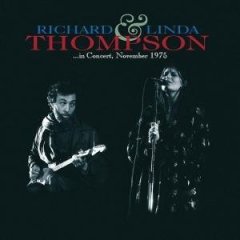
This release is another absolute must-have for anyone who's ever been into the music of the good Mr. T.... Here's the background then: in 1975, Richard and Linda (not long since married) were going from strength to strength as a performing and touring duo, and in November of that year, with the all-but-seminal Pour Down Like Silver LP just out, they embarked on their second headlining tour of that year, ostensibly to promote that very album (though as it turned out, only five tracks from the album were performed on the three nights when the Island Mobile recording truck was present and operational). Richard and Linda were joined by squeezebox maestro John Kirkpatrick and that celebrated (and, at that time, very much in demand session-wise) rhythm section of Messrs. Pegg and Mattacks, and together they could tackle anything from rocked-up Morris tunes to contemporary folk balladry, rockabilly to Hank Williams, all within the space of an hour or so - as the expansive set-list for this particular Thompsons' tour demonstrates. Adding these three talented guys to the mega-talented Thompsons sure made for a remarkable musical experience, and the recordings making up this 77-minute-long CD (basically, replicating the sequence of an entire concert from the tour complete with encores) make the most of their skills. And most important of all, Richard & Linda are on a roll throughout - Linda in particularly fine voice (just feel the never-again-surpassed intensity of A Heart Needs A Home for instance) - making it all the more galling for music-lovers that right after this tour they were to retire from the music business completely, retreating to a Sufi commune for over two years and not returning till the recording of First Light in 1978. So what we have here is as important historically as musically. On this tour, alongside the choice cuts from Pour Down Like Silver, they played just a very few tracks from the Bright Lights Tonight and Hokey Pokey albums to keep us all happy, alongside some from Richard's solo LP, an unforgotten Fairport song (Now Be Thankful), a couple of rockers, a couple of country covers, and yes, the morris tune medley. A varied and well-paced set, with the shorter, lighter items balancing the weightier doom-and-gloom songs and strategically focusing on the two major workouts on Night Comes In and Calvary Cross, the latter in particular containing some seriously virtuoso electric guitar playing courtesy of RT himself. Sound quality is damn fine, aside from the inevitable instance or two of feedback in the first half-minute of Bright Lights Tonight. Anyone still hesitating? Oh, there's the issue of duplication from the two tracks recorded on the same tour, on the Oxford date, which had previously surfaced on the ... guitar, vocal... compilation: well, those two tracks (It'll Be Me and Calvary Cross) appear here in what are described as alternate takes. Convinced that you need this disc? Well you should be; I'd say it's self-recommending in every respect!
David Kidman August 2007
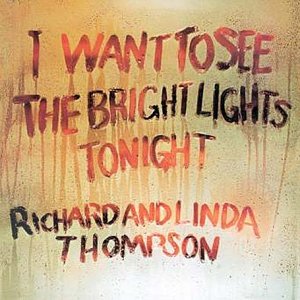
http://www.thebeesknees.com
www.richardthompson-music.com
Richard Thompson - 1000 Years of Popular Music (www.richardthompson-music.com
An album to which the sobriquet "eclectic" could truly be applied & one in the running for most bizarre recording of 2003. Piqued at the relatively contemporary contenders for Playboy Magazine's "Greatest Songs of the Millennium" list, the ever left of centre Mr. T decided to record his personal selection.
Thus we have a live recording of 23 pieces ranging from an old English round, a song in Latin, the inevitable English folk & rock n' roll, light opera, jazz and contemporary pop. All have informative & amusing sleeve notes (including Richard's apologies for being light on the 17th & 18th Centuries).
Performances are primarily by Thompson on acoustic guitar & vocals with embellishments from Judith Owen (backing vocals & a very fine "Cry Me a River") & Michael Jerome (spartan percussion). He's clearly enjoying the challenge of compressing full arrangements into this trio format - faring unexpected well with Abba's "Money" & Prince's "Kiss" (one octave down).
Thompson sings & thrashes out the songs with the gusto & relish of the drunk who found a guitar late into your Christmas party (only with more talent). He's clearly having enormous fun especially when playing to the crowd on music hall numbers & enticing them to sing along on "Sam Hall" (a distinctly English acapella version) & "Oops! I Did it Again" (yes that one, as performed by Britney Spears!).
The songs & performances are easily good enough sustain listeners' interest after the initial novelty value has passed. In fact this curious collection seems to improve with every play.
James Hibbins
Richard Thompson - The Old Kit Bag (Cooking Vinyl)
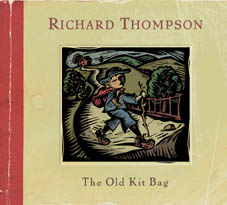
His first studio album in four years finds Thompson going the indie label route and recording as a trio, overdubs kept to a minimum to produce a spare, taut sound that pulls the focus onto the songs' substance, atmospherics and musical muscle. Recorded in Hollywood under the supervision of John Chewel, producer of Five Blind Boys of Alabama (so a man who knows a thing or two of bringing the most out of the basics), it teams Thompson with long time cohort Danny Thompson on double bass and Michael Jerome (who was in Thompson's 99/00 US touring band and provides the same for the Blind Boys) on drums with Judith Owen reprising her Mock Tudor background vocal duties so there's an easy familiarity with each other that lets the music flow and breathe. The result is almost uniformly immaculate.
Written over the past couple of years and worked out on recent live gigs (though audiences may lament the absence of the Kenny G bashing I Agree With Pat Methany), that trademark Thompson marriage of tension and elasticity is evident in the soundscapes, his resonant oak-aged voice stirring the dark waters of melodies and rhythms that draw on his eclectic influences, a shade of trad English folk here, Eastern shimmers there, jazz inflections and tumbling pop chips peeking around the arrangements.
Despite its reference to the old WWI song about packing up yourtroubles in your old kit bag, one things Thompson tends not to do is smile smile smile.
Gethsemane is a powerful opener with its images of "headstones ...crypts and tombs" and "war-whoops and secret signs in the trees" as it details loss of innocence and a crushing of spirit (a striking reference to army bullying) to a driving classic Thompson guitar and surging, soaring chorus. As usual relationship troubles provide the album's mainstay. Jealous Words finds things falling apart over misinterpretation (and a blistering guitar solo), A Love You Can't Survive a classical acoustic guitar mournful ballad as the narrator - a drug baron as it appears - laments the murder that makes it impossible to return to his true love, One Door Opens (with its infectious raga tumble) adopts a couldn't care less stance to the end of things as he sings "make believe that there's ice runs through my veins shrug my shoulders, as if it doesn't matter" while on the adult poppy Destiny (love that cascading chorus) he adopts a sense of humour to get past another implosion ("Venus aligned with Mars always really takes it out of me") and I've Got No Right To Have It All (late night jazz club brushed percussion, torch blues acoustic guitar) finds him putting on the stoicism as she walks away for another.
That songs can both pin and ease heartbreak is the point behind the closing Happy Days and Auld Lang Syne, a slow dance across the battlements that opens with a break-up at a party and ends with the acknowledgement that "All the old songs they're singing such comfort they're bringing to a heart that's as empty as mine. O it lifts you so high does the Sweet Bye and Bye Happy Days and Auld Lang Syne."
It's not all emotional downers. I'll Tag Along is a rousing good time Thompson number even if it is about one of life's third person in a crowd who usually winds up causing the problems and, by way of total musical and emotional contrast, First Breath is a moody bittersweet worn down but seeking salvage plea to "let's love what's left Last dance First breath."
If there's a weak track it has to be Mr Pearly Jim, one of those cliched diatribes about (among other things) the sharks who encourage you to get in beyond your limit and means, a loose unformed lyric that includes such talent unworthy lines as "Chairman Mao's got a whole lot of thoughts and R.D.Laing's got me tied up in knots" to go with its old prog blues riffs. But then comes perhaps two of the album's strongest moments. An almost anthemic Word Unspoken Sight Unseen that slow gallops like the four horsemen of the Apocalypse, Thompson and Owen melding voices over its soul stripped naked 'take me as I am' love song like the vintage days of Richard and Linda, and the ferocious slow burn Outside of the Inside that cites Charlie Parker, Einstein ("curse his devious mathematics curse his deadly atom war") Van Gogh, Shakespeare and Isaac Newton in its cautionary warning about what can be unleashed by ignorance and the refusal to confront yourself and your actions. It's not immediate, but it works its way inside.
That he's no longer with a major label is to some extent an acknowledgement that after over three decades of releases he's never going to have the sort of sales the industry place above prestige and talent, but there's a legion of loyal admirers out there for whom this is certainly going to be the highlight of their year.
Mike Davies

It's difficult to assess just who this CD's aimed at. On the one hand, you have those who don't know Richard Thompson's work - and they, alas, are the huge majority of the record-buying public. Is this, admittedly very fine, compilation going to do the trick and shine light into those poor souls' murky darkness? On the other hand, you have the cognoscenti, the fans who have followed his career from his early days as a founding member of Fairport Convention and have eagerly bought each album on release or those who have discovered his special talents later and eagerly, albeit belatedly, bought each album to catch up on that which they've missed. Chances are, most in this group will have most of these tracks already. I say "most" because, as is usually the case with this sort of end-of-contract release, the disc includes tracks not previously commercially available on CD - just the thing to get those in the latter of my two groups to put their hands in their pockets.
So, marketing matters aside, is Action Packed action-packed? Well, any 77 minutes - a double album in old vinyl money - of Richard Thompson music is not going to be without incident. Here are 19 tracks written and performed, acoustically and electrically, by the man many consider to be this country's greatest living songwriter and a guitarist of supreme skill and imagination. They run chronologically from 1988's Amnesia up to 1999's Mock Tudor, stopping off en route at Rumor and Sigh, Mirror Blue and You? Me? Us? and running the gamut of styles from the quiet introspection of King of Bohemia, carefully picked out by Thompson on acoustic guitar, to the exuberance of I feel so good, which rocks along infectiously with full band and the killer backing vocal pairing of Christine Collister and Clive Gregson.
And the songs are populated by all manner of ne'er-do-wells, inadequates, users and losers. So, in Turning of the tide, we have the hooker facing up to the insidious effects of the passing of time on her once-youthful beauty; we witness the unfolding story of the ill-fated love of biker renegade James and his leather-clad girlfriend Red Molly in 1952 Vincent Black Lightning; we catch the insecure lover going through his woman's personal belongings to find out about her past loves in Cold kisses; and we watch the cold-hearted collector of male hearts "kiss every victim twice" in Bathsheba smiles.
Thompson is blessed with the rarest of gifts in being able to fill his songs with the most inventive guitar playing linked with brilliant lyrical imagery. It's difficult to imagine anybody else pairing "looks beyond compare" with "pre-Raphaelite curls in her hair" (Cooksferry queen); and who else could encapsulate a free spirit with the observation "they say she even married once a man named Romany Brown but even a gypsy caravan was too much settling down" (Beeswing)? Of the three "new" songs, Mr Rebound and Fully qualified to be your man were recorded during the Mock Tudor sessions and released on thelimited edition vinyl version of the album, and the gently beautiful Persuasion, which Thompson sings with his son Teddy, has previously been available on Celtschmerz, an official Thompson bootleg.
So, who'll be buying Action Packed? Maybe somebody keen to show a disbelieving friend what a towering talent Richard Thompson is. Maybe an established fan who has to have everything released under the Thompson masthead. Maybe the record-shop browser, who recognises the name, has heard the odd song here or there and is prepared to give it a chance. Whoever buys it, they're guaranteed a collection of intelligent, well-crafted songs full of surprises, interesting twists and turns and some of the best guitar-playing anywhere. They'll not regret the decision to buy.
Fred Hall
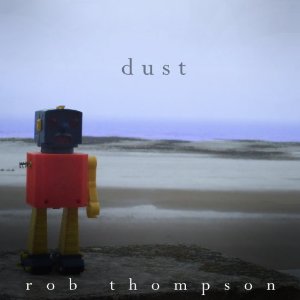
It's unclear whether Thompson recorded this prior to or after The Storys decided to disband, either way it emerges as the singer-guitarist's debut album, featuring contributions from fellow former Story members Andy Collins and Alan Thomas. Not surprisingly given his input into that outfit, his own album has a similar soft rock musical feel (he has, after all, had songs featured on One Tree Hill) with a balance beween laid back swaying ballads like It All Makes Sense In The End and the mid-tempo roll of the poppy Could You Come Around?
Where things do depart, however, is the way in which Thompson's other influences make themselves evident. He cites Crowded House, Wilco and the Jayhawks and they're clearly present in the soft delivery and melodies, but he also includes Pink Floyd on the list. Listening to the full length version of the title track, the seven minute The Director's Cut, Watching How All The Dust's Drawn To The TV and The Ending Credits, while not going over the top into Floydian dramatics, there's certainly lurking echoes of Dark Side of the Moon and I'd suspect he's more of a Waters than a Gilmour fan.
While its chances of success are probably higher in American than the UK, this is a highly accomplished and immensely listenable album. Dare I say it, you really should gather Dust.
www.myspace.com/robthompsonofficial
Mike Davies August 2010
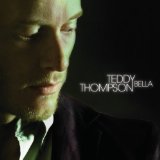
After three albums (one, a country covers collection) that reaped critical praise but little commercial success, Thompson finally made his chart debut with 2008's Top 10 gem A Piece Of What You Need, an album of 60s influenced country tinged rock and wry, witty lyrics that drew comparisons to Springsteen, Roddy Frame and, especially, Roy Orbison and saw him step out of father Richard's shadow once and for all.
Not a great deal has changed for the follow-up except that, disappointingly, he's broken with tradition and not included an old Everlys song, hidden or otherwise. Still, it's hard to hold this against him when he's delivered such a terrific collection of confessional songs and moods.
As with its predecessor's In My Arms, it kicks off with the obvious airplay single, Looking For A Girl, a tongue in cheek list of his ideal woman's attributes (drinks, smokes, takes drugs, sense of humour, good in bed but "knows when to knock it on the head") that has the same Orbisonesque twang and country pop bounce but swaps the former's Doug Sahm for The Mavericks.
Retro 50s/60s pop and the acceptable face of Nashville hallmark several other numbers custom built to be heard on the car radio as you cruise the highways; the strings swished impossible to live with or without you swayer Delilah, I Feel's guitar driving rolling country rock (another song about screwing up his love life), arguing lovers Jenni Muldaur duet Tell Me What You Want (with a guitar solo shows the apple's not fallen far from the tree), and the strings soaked lovers parting ballad Take Care Of Yourself with Thompson's soaring Orbisonesque falsetto finale.
On The One I Can't Have he declares he suffers from "chronic hard to please" to a jaunty Beatlesy bounce along, but he doesn't spend all his time regretting the relationships he's scuppered in the same musical key.
Over And Over is a moodier, slightly bluesier affair with violin, rumbling drums and hints of his close friend Rufus Wainwright as he confesses a defence mechanism to "shit on myself so no one else can" while the delicate, lullabying Home (tellingly, he seeks solace and refuge but is soon restless to leave) is stripped back to just string quartet, clarinet and his voice, the falsetto delivery of the title almost like he's howling at the moon.
Closing with the emotional realisation epiphany and acceptance of the down tempo slow building Gotta Have Someone ("my longing for control is leaving me so cold") with its lush orchestral swirl and reflective bluesy guitar solo, it's an album that stands testament to his crooning, warm vibrato, the seemingly effortless craftsmanship of his songwriting and the disarming beauty of his arrangements. But, I still miss that Everlys moment!
Mike Davies February 2011

Having seen good chum Rufus Wainwright soar free of his father's shadow and become both critically feted and a huge commercial success, Richard and Linda's offspring should follow in his spangly footsteps with this, his fourth album. Produced by Marius de Vries, who also twiddles the knobs for Rufus, there's hints of dad there but more obvious reference points would be Orbison (or at least his Chris Isaak soundalike), Springsteen, McCartney and, on Jonathan's Book, the heady glories of Roddy Frame.
Kick off single, In My Arms, is just fabulous, twangy Orbisonesque mid tempo rockabilly pop with a carnival feel and Doug Sahm organ and, were there any justice, would be a massive hit. But then the album leaks catchy tunes. The self-flagellating opening The Things I Do has that hood down, open road Springsteen strummed chugging feel, Where To Go From Here is a shuffling country waltz, One Of These Days a brass blasting Jerry Lee Lewis rocker, and both the cascading 60s country pop melody of Don't Know What I Was Thinking and the closing title track's marching beat call to embrace life in its organic beauty rather than its palliatives make you want to dance down the street.
Addressing both despair and happiness with equal wit and humour, Thompson again proves a master lyricist to equal his father and, on the mordantly sly Turning The Gun On Myself (basically about not being able to get any rest with the New York street noise) even conjures the great Randy Newman. "I need ten more years to get to good" he sings on the hand-slapping rock n roll gospel blues Can't Sing Straight. He's wrong, he's at great already.
www.teddythompson.com
www.myspace.com/teddythompsonmusic
Mike Davies August 2008
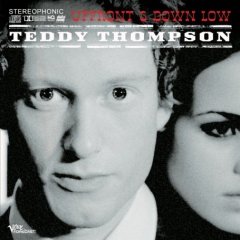
Two years on from Separate Ways, the last thing you might have expected as a follow up was an album in which Thompson gets in touch with his inner George Jones for an album of old school country covers of songs made famous by the likes of Merle Haggard, Dolly Parton, the Everlys, Elvis and, yes, that'll be She Thinks I Still Care, George himself.
Other than string arrangements (chum Rufus Wainwright tastefully coating them all over Dolly's Appalachian gospel heartbreak My Blue Tears), it's not even as if he's done anything especially radical with them. Rather they're affectionately faithful readings that have his vocal stamp but stay true to the spirit of the originals to the extent you could imagine hearing them crackling over the steam wireless from the Lousiana Hayride.
Not that there's any problem with that, especially given the gorgeous tearstained barroom melancholy of Felice and Boudleaux Bryant's Change of Heart with its clip clopping rhythm, a bluesy flavour to Ernest Tubb's Walking The Floor Over You, Haggard's waltzing hits (From Now On My Friends Are Gonna Be Strangers) and The Worst Is Yet To Come, and a guitar slapping perky version of Bob Luman's Let's Think About Living complete with the spoken passage about Marty and Patti.
It may not push any envelopes and, ultimately, it's probably a self-indulgent treat that may baffle those who bought his first two albums and see country die-hards being a bit sniffy. but it's hard not to be won over by his relaxed (and slightly Chris Isaak) rework of Elvis hit I'm Left, You're Right, She's Gone, the cover of the Ev's Don't Ask Me To Be Friends or his duet with Iris DeMent on My Heart Echoes.
And it's not totally without Teddy's own contribution, either. One of three tracks on which dad lends guitar, Down Low is a self-penned Oribson-esque country ballad that, haunted by the ghost of Gram, can confidently hold its head high among such esteemed company.
Mike Davies October 2007
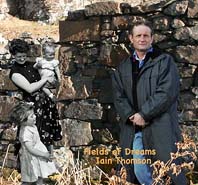
Iain Thomson, the "singing shepherd" from the Isle of Mull, has assembled a fine cast of folk musicians to help him bring his particular musical vision to disc. Caught somewhere between the sentimental and deeply felt love of home often found in folk music and the political agenda of a Dick Gaughan, this almost entirely self-penned album brings a selection of stories relating to Iain's own life, the people of his homeland and the people he encounters whose story catch his fancy. Which means that he covers ground as diverse as his own experiences driving a truck from Glasgow down the M74 and M6 all the way to the tale of the press gangs at the time of the Napoleonic wars trawling the west coast for 'recruits'.
Mostly, though, this album is a lament for lost times and a lost way of life; it is a fact that the west coast agriculture which has been Iain Thomson's own working life has been in ever more marked decline in the last few years. The stock, cows and sheep, have been steadily disappearing from the landscape, and with them have gone all the people who worked with such a deep sense of connection to the land and to all their forbears who had worked the same land in generations past. The reasons for this decline are many and debatable; economic pressures and political pressures play their part - as they do in steel towns, mining towns and all the rest in other parts of the UK. On Scotland's west coast, though, the old townships leave their ruins behind to induce a poignant longing for old certainties.
Iain's songs deal with all these things with an almost naïve simplicity and marry the words to a lyrical, wistful set of tunes. There's some gently beautiful playing from his many cohorts, with Marc Duff's whistle, piano and bouzouki playing being particularly prominent. That whistle, especially, often conjours the frequently bleak grandeur of the west coast. A thing I learned about music of gaelic origin a long time ago is that it sounds just brilliant in the open air, so I'd recommend you stick this on your personal player of choice and take a stroll up on a hill somewhere. You'll see what I mean. Failing that, you could do worse than follow up the story of the title song, Fields of Dreams. Alluding to the Kevin Costner film, Iain's song brings the tale of a west coast version of such single minded optimism. This is the true story of Calum MacLeod of Raasay who built a stretch of road to connect his own township to the council road in an effort to ensure the township's survival. The tale is told in Roger Hutcheson's excellent little book and is well worth checking out.
John Davy August 2010

Inge's point of origin (Fair Isle in the Shetland Islands) and principal musical occupation (accordion player) might betoken a fiercely traditional-sounding solo record; in which case, it's my duty to warn you that even Inge's previous musical adventures (stints with Harem Scarem, Drop The Box and latterly Karine Polwart's band, and a collaboration with Will Oldham) won't prepare you for this strikingly original aural onslaught: a whole album of almost indescribable, at times very techno-oriented song-centric music which will certainly cause permanent static on the airwaves of traditionalists and may even lead to a shipwreck or two in the placid voyages of conventional artistic sensibilities.
Sure, Inge's trusty accordion does feature in the sonic landscape, often quite prominently, but aside from the nigh-all-pervasive sound-surround of bleeps, gloops, clanks, clatters, twiddles, tingles, squeaks and suchlike (courtesy of Lau's mad-professor genius Martin Green being let loose on every effect the Wurlitzer electric piano is capable of plus all manner of programmey doodles), the primary unifying sound signature here is Inge's seductive, closely-present yet ethereally-textured singing voice, precariously breathy but emanating a solidity of purpose that's almost threatening at times in its strangely harsh power. It's both disturbing and weirdly comforting, and – contrary to what one might imagine for a disc so enveloped in electronica – surprisingly non-impersonal, actually exerting a considerable emotional pull. And once you're over the initial shock of the bizarre texturings, you might well be able to glean that musically speaking many of the tracks do in fact sound to have a basis (of a sort) in traditional music.
Arguably the most compelling tracks are those with an almost tangible presence outwith the purely aural dimension (hard to describe I know), where the audacity of the inventiveness leads to something that really shouldn't work but wow it does – Cycle, with its plucky repeated banjo motifs and weaving accordion, and the extraordinary Girl With The Swan's Head. Other intensely mesmerising moments are provided by the drifting Scoundrel Clouds, the sinister Marie Celeste and the tinkling lullaby Cradle Song (Tim Dalling's ingenious setting of Louis MacNeice's poem), the latter being one of five tracks on which Heidi Talbot provides vital vocal support. The spirit of the madhouse seems to be taking control momentarily on Where Do I Sign? and the discordant, fractured Fighting Song, but somehow we never quite need to get admitted to the asylum. And when all those electronic effects are largely forsaken, as on Take My Time and the aching, despairing How Far? (a tender duet with Rory Campbell), the impact of Inge's writing is even more telling.
It may otherwise be thought that the lyrics are subservient to the musical experimentation, and to an extent I can sympathise with this view (the inclusion of the song lyrics in the booklet might have helped matters here), but repeated post-shock plays do reveal more of substance than previously suspected. Although Inge's lovingly eccentric musical personality dominates (in the nicest possible way), and I've already mentioned the importance of the contributions of Martin and Heidi, those of Tom Cook (guitars, cello, banjo, glockenspiel) are also not to be underestimated. In all, the album's distinctively peculiar yet uniquely resourceful combination of disparate elements can appear barking mad or seriously inspired, or both – but be patient and you'll discover it for what it is: a stimulating and deliciously original (and yes, quirky too - a word I've managed to avoid till this point!) experience that one shouldn't shy away from.
David Kidman April 2010
The Thorns - The Thorns (Columbia)
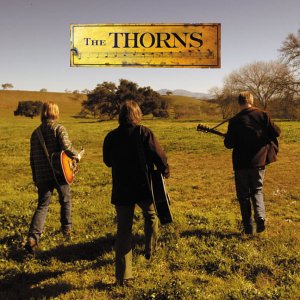
It was the spring of 2002. Shawn Mullins had just finished demoing his next album. Matthew Sweet and Pete Droge had just staggered back into the light after an intensive laying down of their respective solo projects. They all felt like just kicking back and stretching out, giving the soul-searching introspection a rest and just letting it hang. So through a combination of common managers, friends, sidemen and producers, the three of them decided to get together and pour their individual voices into one sound.
After a false start trying too hard and unsure of each other and the politics of the equation, things finally came together as they worked on I Can't Remember, their voices and the acoustic guitars finding just the right meld and balance. Two weeks at a Santa Barbara ranch later they had the foundations of the album and its sound. Which is basically three voices together in close harmony soft and soaring acoustic guitar poprock, laced with strings and rooted in shared affection for the 60s. It's nothing startlingly new and it's easy to wander through the album citing comparisons and influences; the Bee Gees ( I Can Remember), Beach Boys (Blue), Fleetwood Mac, Crosby, Stills & Nash (Think It Over has a definite Teach Your Children feel), the Raspberries, The Byrds (I Set The World On Fire), Jeff Lynne, and Tom Petty (the Free Falling shades of Runaway Feeling). Long Sweet Summer Nights could even have come from Grease. But who cares, the point is that it sounds terrific, the songs are drenched in melodies and tumbling hooks and all of them, No Blue Sky in particular, will sound great on the open road with the hood open and the sun beating down. Even if it's only in your imagination. A rose among Thorns.
Mike Davies
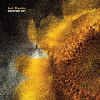
Written in the emotional fall out of his 29 year old wife's death from cancer, the Yorkshire singer-songwriter's third album is understandably veined with themes of loss, but there's also a celebration of life and love (both past and, with a five year old daughter and fiancee, present) to lend it an optimism you might not expect.
Listen to the surprised by joy sentiments of the slow waltzing Under My Skin as he sings 'she's a poppy field when you thought you'd see wheat' or the mixed emotions that inform Rosey (One More Time) and the lovely supplication of Love's Promised Land, and it's hard not to feel an inner warmth mingling with the sadness.
Predominantly acoustic, Thornton's finger-picking occasionaly augmented with strings, he's been compared to Roy Harper (evident on the Van Gogh referencing title track and Shake The Moon Down), while Crashing and Burning may well bring to mind Martyn Joseph. However, in both vocal inflections and the slight jazzy flavours he brings to the basic folk settings the more accurate reference point would be Bruce Cockburn. Indeed listen blindfolded and you might easily mistake He Does Not Deserve You and Shores of Forever for tracks from one of the Canadians early albums. It's hard to think of a better recommendation.
www.andythorntonmusic.co.uk
www.myspace.com/andythornton
Mike Davies July 2007
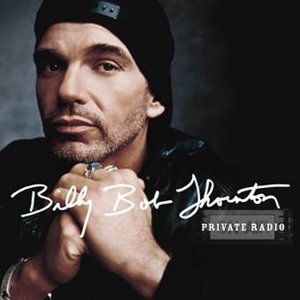
You can't blame Pushing Tin. Billy Bob was making music long before he unveiled his vocal talents on screen for Mike Newell. He formed his first band when he got his first drum kit at 9 (The McCoveys after baseball legend Willie McCovey if you must know), making his public debut age 10 playing an instrumental version of Barry Salder's redneck gung ho No 1 The Ballad of the Green Berets at a PTA meeting. Influenced by the likes of The Kinks and Beatles and the homegrown country and blues musicians from whom they borrowed, BB soon became a gigging veteran, forming his own soul group, Ho'Lanta, after finishing high school. Other bands followed, but it perhaps the most memorable wasTres Hombres, a ZZ Top tribute band who opened shows for the likes of everyone from Ted Nugent to Earl Scruggs.
In 1981, Thornton quit the drum stool and microphone to go into acting, but even though not playing in public music remained a passion. While shooting Slingblade in 95, he recruited some old band mates and put together jam sessions. This led to sessions with Nashville sessioners which led to his starting to write the songs that would form this album. Now, there are stories that this is in fact the second version after the label decided the first offering was, shall we say, not quite up to it. Some might wonder just how bad that must have been. But, give this a few listens and it begins to seep into the brain and those initial CW McCall and Wayne (The Singing Oilman) Nutt thoughts do recede.
He's no Richard Harris, but Thornton's throaty spoken bluesy vocals - the sort of voice you expect to hear on the other end of a dirty phone call - does have its gruff charm and the songs, which in keeping with his screenplays fall into the category of Southern Gothic, underline his ability as a storyteller.
Produced and often co-written by Marty Stuart, it unravels many of Billy Bob's personal experiences and those of people he knows, couching them in a mix of country, blues and r&b. No prizes for guessing whom Angelina is about ("I walked into an elevator and you walked into a wall" one of the more bizarre romantic opening lines you'll encounter), Ms Jolie also being the subject of Your Blue Shadow. The mood though is generally downbeat. The Starlight Lounge, a duet with Holly Lamar, tells of the doomed romantic encounter between two losers in a local bar, hillbilly rocker That Mountain concerns an old dear who never went to see the world over the hill because she was too scared of what she might find, and Watching Me Dark and Mad (very Tom Waits) is about an agoraphobic recluse driven insane by his own solititude, a theme of mental disturbance also addressed on the title track that concludes that the only way to stop the conflicting voices in your head is to stop living. Also. There's a couple of covers included, a lazy ramblin' version of Hank's Lost Highway and, rather better, the old Byrds song about the death of JFK, He Was A Friend of Mine with Stuart playing the same guitar used by Clarence White (not Whittle as it says in the press release) on the original. But by far the most compelling track has to be the near ten minute sparse acoustic Beauty At The Back Door, a richly evocative spoken narrative memoir of his childhood home in Hot Springs, Arkansas that smells of swamp moss and drips with Southern sexual perspiration as he recalls the incident with his daddy and the sultry siren of the title. He may not be the world's greatest singer and songwriter, but the man can sure tell a story.
Mike Davies
Who said the blues had to be "blue"? It's four songs in before this fabulous electric blues boogie band slows down a little and emphasises the "blues" bit of "blues/rock".
However, whether it's playing a hundred-miles-an-hour electric rocker, or a sensitive, soul-stroking tale of lost love, sung to a simple acoustic guitar, they do the business.
A band put together for a one-off gig seven years ago, Out Of The Blue were such a sweet slice of serendipity that, thank goodness, they never split up. The result is a sophisticated mix of influences from Britain and America - North and South. Blues and rock are the foundations of the sound, but there's funk, jazz, R&B, salsa and pop thrown in to the mix too. The two pillars of the Out Of The Blue sound are the transatlantic vocals of Kevin Thorpe himself, husky-yet-smooth, and the stunning guitar runs of Eddie Tatton, who attacks his solos and really goes for the throat, yet can add delicate texture to the more subtle numbers. The rest of the band keep up the standard. When seen live, the band is made up of Nigel Lobley (drums), Gary Wayne Rudd (bass) and Jason Ashworth (keyboards), but on the album their numbers are boosted John Dyke on keyboards, Lindsay Coulson on bass (there's no sign of Mr Rudd on Shadowplay) plus sparkling sax from Carl Stanley and percussion from Owen Campbell.
On four tracks, a third bass player, Scoobie Leggett, sits in - which is only fair because track four, a fabulously funky instrumental, is named in his honour. Scoobie contributes a great, driving, fat bass sound to "his" song, while the keys and sax interplay over the top. Superb! All the numbers on the album are written within the band, by some combination of Thorpe, Tatton and Lobley, and there are no duds. It's a great balance of the up tempo and the soulful. But the real star of the album is The Jungle Walk, which cleverly mixes both styles; starting as quite a relaxed piece, with seductive, Santana-esque rhythms punctuated by tasty guitar runs and licks, before dissolving seamlessly into a terrific piano solo from Ashworth that's worth the price of admission on its own. When that's then echoed by an epic guitar solo that Carlos himself would be proud of ... oh wow!
Shadowplay is a wonderful piece of work that deserves to get recognition far beyond the British blues circuit.
Phil Widdows
Simon Thoumire & David Milligan - Third Flight Home (Footstompin' Records)
A whole album of concertina-and-piano duets from two folk musicians with a strong jazz background might on the face of it seem to have rather a specialist appeal, not least for the listener, but trust me, this latest joint effort from Simon and David (it's not the third, although its predecessor, The Big Day In, was released as long ago as 2001) is both invigorating and compelling. Not only is the actual playing abundantly sparkling and suitably virtuoso in terms of all-round musicianship, but the choice of material and selection of pace nigh unchallengeable. Traditional and contemporary tunes are laced with jazzy touches without losing sight of the musical direction or the essential spirit of the dance, and while they treat their source material with respect there's never a shortage of humour in their phrasing and expression, a lightness and delicacy of touch that's so very infectious you can respond spontaneously on each successive play. Whether they're tackling a reel, jig or slow air, the two players' sense of purpose is impressively conveyed through their amazing sense of combined musicality and unity of delivery, not to mention also the way each of them gives the other exactly the right degree of freedom within the structure to express his individuality at the service of the music. They both exhibit a keen sense of flow in their playing, with their attention to detail and precise attention to dynamics never obscuring the desire to maintain onward momentum; their delight in melodic and rhythmic invention never flags. Of the original tunes here, there's around half-a-dozen of Simon's own, including a piece written for Irish piper Becky Taylor (which here is preceded by an improvisation from David's keyboard). Simon and David also turn in a lovely new version of Jimmy Shand's Welcome Christmas Morning (one of the first tunes they'd ever played together), before bringing on guest fiddler Clare McLaughlin for the final romp home on the album's title set. Contrasting adjacent tracks like the beautifully measured air My Mary and the "Russian Jelly Roll stomp" of Wedding In The Wild Forest Part II proves an interesting exercise, not least in trying to work out just quite how the duo weave their magic - but it's all both exquisitely managed and intensely satisfying. The wow factor remains very high throughout.
David Kidman December 2008
There have been many people who have covered Robert Johnson's songs but there can't be many who have covered them in such a way as Pyeng Threadgill. Ms Threadgill has turned these Delta blues classics into a fusion of reggae, jazz, soul and blues that would surely even make Robert Johnson sit up and take notice. The first thing to grab you on Love In Vain Blues is her sultry voice. This will captivate you and keep you under its spell long after you have finished listening. The song itself is given a reggae/jazz fusion and surprisingly, it works. Phonograph Blues has been given funky drums and although it has hints of hip-hop the blues ethos is still there and this is a winner. There's a New Orleans jazz feel to Last Fair Deal Gone Down and the song lends itself to this treatment. It's almost gospel like delivery would not, I'm sure, have been missed by Johnson. Milkcow's Calf Blues is given a slow, sultry execution and the added horns (they're there in most of the songs) are welcome. What comes next has to simply be the strangest version of When You've Got A Good Friend that I have ever heard. The string accompianment to this painfully slow offering is just surreal. Having said that, I do believe that Pyeng has the ability to become a modern day Bessie Smith.
She goes off into a little jazz movement for the syncopated I Believe I'll Dust My Broom and the ultra modern Dead Shrimp. They're Red Hot could be pigeonholed under modern R&B if you so wished but she has taken things too far with her jazz treatment of Sweet Home Chicago. This has to have a driving guitar theme and nothing else will ever do. Come On In My Kitchen is another that has a modern R&B feel but the blues is still at the heart of it. Ramblin' On My Mind is another that needs a driving guitar and this time it gets one. It's slower than the original but builds up very well.
I'm sure that Robert Johnson would be very pleased that people still consider his music important enough to try and fit it into their lives and there are versions here that he would probably be writing himself if he were around today.
David Blue April 2006
This retrospective compilation provides the opportunity for an entirely timely revisit for some classic recordings made in the mid-1960s by a grouping of talents from the folk scene, who at one point were even described as "a pop group" (sic) by The Times newspaper no less!
Comprising Leon Rosselson, Marian McKenzie and Ralph Trainer, with fourth member Martin Carthy and subsequently Roy Bailey, the group released two LPs: The Three City Four (1965) and Smoke And Dust: Where The Heart Should Have Been (1967). Their repertoire was "radical, subversive and dangerous" contemporary songs whose biting resonances intentionally provided a necessary antidote to the bland Englishness of much of the folk revival - songs by MacColl, Ian Campbell, Pete Seeger, Alasdair Clayre and - especially - Leon Rosselson himself (the latter including the celebrated History Lesson, Tim McGuire, Across The Hills and Do You Remember).
Their deep commitment to their repertoire, and their unshakable belief in its ongoing relevance, is reflected in Leon's own typically provocative and rightly opinionated introductory overview and sleeve-notes. As Leon says, "the songs share a serious (humorous) concern for the quality of contemporary life in general and of city life in particular", being "a hybrid creature that feeds on the rhythms and colloquialisms of everyday speech and sharpens its claws on the clichés of newspaper writers, politicians and ad-men". The singers' delivery is sincerely, obviously committed, if occasionally a touch preachy, but the earnest and intense vigour of the performances has its own appeal and these recordings haven't dated as much as might be expected, while of course the sentiments expressed are as pertinent as ever.
Insightful byways are explored with the youthful Martin's soulful and imaginative rendition of Sally Free And Easy, Marian's earthy acappella adaptation of Stan Kelly's famous "mucky kid" lullaby, the chilling Adrian Mitchell adaptation 15 Million Plastic Bags and Sydney Carter's potent protest song Standing In The Rain. The digital mastering of these tracks has been carried out with care, and apart from a degree of fierceness in places all sounds fine and faithful. It's a great collection, although (and here I guess I'm being mildly greedy!) I suspect it might have been rendered even more essential by the inclusion of a few more tracks (for, not having ever owned the original LPs, I'm curious to know what's missing).
Nonetheless, this is a highly recommendable compilation which furnishes a salutary reminder that the British folk revival of the 1950s, which was after all intrinsically rooted in left-wing politics, provided the impetus for the creation of some exciting contemporary writing in the following decade that still resonates significantly powerfully today.
David Kidman April 2010
Daft? No way – for these monkeys knowingly and gleefully refuse to be categorised or pigeonholed, and at times listening to their heady acoustic brew induces a certain aural vertigo I guess. This Cornwall-based trio, comprising Tim Ashton, Athene Roberts and Jamie Waters, make a very full sound, and their special frantic-yet-controlled brand of energy has made them a perennial hit at festival stages up and down the country over the past few years. This quality translates surprisingly well to silver disc, so full marks to the production team here. And the fiery zest of their devil-may-care musical hotpot throws up into the air anything from gypsy-folk to Celtic thrash to rebel-punk-funk, and somehow against all the odds achieves a strangely inevitable coherence.
What's markedly less successful, though, is the lyric content of some of their (all self-penned) material, for several of the album's songs rely too heavily on worthy but clichéd sentiments that all too obviously rail against the usual targets (capitalism, politics, etc) and embody over-much repetition however appealing and creative the musical backdrops might be. Guardian Angel is a case in point, coming over as a kind of cross between old-fashioned hippy performance-folk-rock à-la-Principal Edwards and the modern-day agit-folk of Seize The Day, but without either the pretensions or the acuity and level of writing skill that's the natural province of the latter outfit. Let 'Em In borders on suffering from a similar fate, but is redeemed by its bustling strathspey-jig setting. When during the second half of the disc 3 Daft Monkeys finally move away from the more overt preaching-cum-commentary arena, their music as a whole feels less contrived and in the end makes more sense to this listener, as on the attractive mid-tempo ballad Since, the fetching Mustaphas-bazaar-narrative of Monkey And The Slippers and the evocative instrumental finale Dance Of The Old Man Of Storr. The last-named provides a brilliant showcase for Athene's fine violin work, although to be honest her ducking-and-diving playing is a constant delight on the other tracks too, as is the joyful rhythmic impetus generated by the lively 12-string and funky bass playing of Tim and Jamie respectively. Elsewhere, we can forgive even the over-indulgence of animal noises and consequent lapse into silliness that makes the title track degenerate into cacophony.
A special mention, though, for the presentation, the City-Varieties-style music-hall-poster inserts that adorn the booklet, which afford hours of amusement and really do complement the music within. Having not yet heard the band's previous (four?) records, I can't comment on how Social Vertigo compares, but there's enough of interest therein to spur me on to hearing more of their output some time.
David Kidman June 2009
3:05am - I Don't Hear Jimmy Page (Yeaah!)
The danger of preconceptions. You see the name Noel Redding attached and you automatically think tedious 60s throwback blues rock best not allowed outside of Hendrix conventions. Redding spotted them and used them as warm up for his US tours, so more of the same then right? Er, no. Formed in 1996 and fronted by singer/guitarist Keith Dion, they do have a 60s air, but it's the breeze of West Coast psychedelic pop and Byrdsian folk rock. New Zealand born Dion's a veteran of several Kiwi outfits as well as former Rough Trade guitar band The Ophelias, while co-guitarist/mandolin player Patrick Fahey has served time with Pete Seeger, Jackson Browne and Dave Grisman. Put them together and you get a jangling combination of folk rock and power pop that's both musically and lyrically adept. The Celtic touches of Wise Man and the Fool or Cemetary call to mind The Hooters, Colorblind mixes together The Byrds, Doors and The Who in a psychedelic blender, the latter also evident on the power pop of the bitter Jan's Getting Married and (along with shades of George Harrison) their eponymous song of a housewife falling part while they're going Velvet Underground with Queen Street and Don't Need Love. And as if that wasn't enough Looking For The Action heads off into calypso and the opening Love Kills nods to the folkier aspects of Led Zep. The CD even throws in a sonic thrumming take on the intro to The Immigrant Song as a bonus track. The title? Something to do with working as a session guitarist for pretentious producers apparently. No, you won't hear Jimmy Page but listen with an open ear and you'll find strong rootsy 60s guitar pop from a band whose, ahem, time, could be fast dawning.
Mike Davies
Long-awaited, and finally launched this Easter at the Lancaster Maritime Festival, All 'Tide' Up ideally conveys the upfront performing style and infectious spirit of this irrepressible trio of maritime miscreants. Each of the three's a charismatic solo performer in his own right, and in that guise I suspect already welcomely familiar to some readers - the epithet "well-seasoned" applying every bit as much to cohorts Derek Gifford and Geoff Higginbottom as to Keith Kendrick himself! Or here, perhaps that ought to read "well-seasonged"?!… For what the three men have in common and in abundance (aside, that is, from being shamefully underrated in some quarters), is a great feel for the repertoire and idiom and a refreshingly original approach (purists might term it mildly irreverent at times!) to the presentation of the more well-trodden maritime material. For this CD they serve up a creditable menu that cannily juggles the familiar with the unfamiliar, accompanied with unaccompanied; it mixes traditional shanties and sea songs with a near-ideal pick of contemporary maritime compositions (a highlight among these being one of Geoff's own creations, here entitled I Sailed The Sea). In fact, the total product comes perilously close to what I'd have chosen to record meself (that is, if I were blessed with three good voices and could play guitar and concertina!), which only goes to prove what fine taste these chaps have! By bringing their wealth of combined experience in other "branches" of the folk music tradition to bear on their renditions of maritime classics, these renditions embrace a healthy individuality and make a positive virtue of "doing things differently" (take the bouncy - self-styled "Jolly Jack Tart"! - concertina part that accompanies Three Sheets' version of Bob Watson's potent commentary Shantyman, for instance, or their cut-price impression of a Joe-Meek-style "heavenly choir" on Gordon Lightfoot's Edward Fitzgerald). There's a welcome gutsiness and grit in their attack too, a quality that renders many present-day practitioners of maritime music lacklustre and anodyne by comparison. And first and foremost, Three Sheets are entertaining; they make the music fun without devaluing their source material or patronising their listeners. If I really need to fish for a carp (sic!), and mindful of the creative perspectives which Three Sheets bring to the music, perhaps one or two aspects of the recording aren't quite ideal - the lead voice on a handful of selections is a shade too far back in the mix, rendering the strong harmony lines too prominent (notably on The Ebenezer, Hog's Eye Man and Last Shanty), and perhaps the guitar part makes for unnecessary clutter on Goodbye To The Sea, where the jaunty pace distracts somewhat from the poignancy of the lyric, but these are minor matters when considering the overwhelming success of the CD as a whole, which so well balances the lighter and more serious sides of the maritime repertoire in performances that can't fail to delight sea song buffs and more generalist folk fans alike.
www.keithkendrick.co.uk
www.chanteycabin.co.uk
David Kidman
3Sticks is a newish three-piece combo wherein versatile young folk-roots fiddle player Jenny Newman is teamed with guitarist Andy Glass and drummer Pete Hemsley. Red Moon is their second CD, and very impressive it is too; Crossing Currents, their first, came out rather quietly in 2001, and good though it was, showing plenty of promise, the players were definitely finding their feet and testing the waters to see how much tradition-bending they could get away with, while there was perhaps a mild sense of going through the motions somewhat at times (specially on the first few tracks), But on Red Moon, a lengthier set than its predecessor, 3Sticks strut their stuff even more credibly – instrumentally, impeccably yet with feeling on a new collection of tunes trad and new. This time round the various influences are much more cohesively integrated, and new flavours tried with overwhelming success; here, the beats and rhythms range widely and believably from fairly standard-style folk-fusion through to jazz, military and samba (even though there's nothing to quite equal the manic swing of The Butterfly/Reel Beatrice set on their first CD!). Red Moon proves, however, and without a shadow of doubt, that 3Sticks are dynamic, passionate and full-bloodied, both in tightness of playing and depth of expression. The production also gives them a nicely upfront recorded sound that's full of presence. Red Moon proves to be a seriously tasty release that shows 3Sticks to be an outfit that's equally adept at urgent dancefloor foot-tapping and more intimate lyrical repose. I wonder where their third album will take them?…
David Kidman
The Thrills - Let's Bottle Bohemia (Virgin)
Having made an impressive splash with debut album, So Much For The City and songs such as One Horse Town bespeaking its love affair with San Francisco summers and Americana dreams, the Dublin quintet ably consolidate their fast rising status with this speedy sequel. It's no huge departure, the melody drenched songs steeped in tales of regret, ennui and loss, much informed by looking back at their Irish roots from the glossy alienation of LA.
Small town laments and themes of rejection and failure loom large, though generally couched in breezy falsettos, chiming guitars, sweeping strings and flourishes of brass. Hit single Whatever Happened To Corey Haim? succinctly encapsulates both the album's reference points and fears of passing from favour just as You Can't Fool Friends With Limousines sketches out the wariness of succumbing to West Coast phoniness and the guilt of success. Both sit happily alongside equally catchy but lyrically downbeat numbers like the stompy downtown Saturday Night, the lush but cracked Not For All The Love In The World and the jaunty lounge bouncer Faded Beauty Queens. Throw in the equally self-doubting and 'Catholic shame' of The Irish Keep Gate-Crashing and the tellingly titled The Curse of Comfort and you've got probably the most toe tapping radio friendly depressive pessimistic pop practitioners you're likely to meet.
Mike Davies
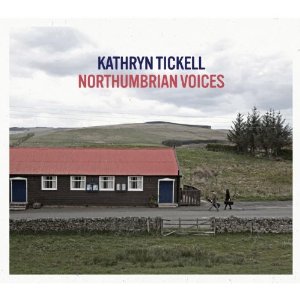
This really is the project that Northumbrian piper and fiddler Tickell was born to create. It interweaves all the rich and varied threads of her heritage in a close-on-two-hour tapestry of music and words that takes listeners on a magical journey through the culture and lore of her native North Tyne Valley.
Gathering together past and present members of her band with other up-and-coming musicians and her father Mike, she took this fantastic "multi-dimensional dialogue" on tour, from performances of which (at Cecil Sharp House last November) the recordings on this two-disc set were taken. Well, with a few exceptions…First, to set the scene and close proceedings, the main attraction is bookended by brief extracts of reminiscences of family and friends (taken off cassette tapes recorded at source some years ago by Tickell herself). Second, the voice of David McCracken (a working shepherd who was unable to go on tour) is added reading the words of Will Atkinson. And third, some piano accordion (Amy Thatcher) is overlaid on a couple of tracks. But the vast majority of what you hear is exactly as it was performed in the stage show, and the wonderfully friendly, relaxed, convivial feel of the live performance is vividly communicated. What comes across more than anything else is the entirely natural and overwhelming genuine affection and respect for the music and culture that all participants share, both within their own circle and community and outwards to their "willingly captive" audience.
The skills of Tickell and her director Annie Rigby in pulling it all together into a fabulous, integrated continuous show should not be underestimated. It's been lovingly conceived as a series of aural snapshots, each taking a theme from the culture and heritage and exploring it through the reading of texts (taken both from their own personal recollections and the memories and stories of local characters including Willie Taylor and Atkinson), tellingly interwoven with music either on the same theme or sharing or naming those very places or personalities. Inevitably, daughter and father provide the bulk of the spoken input and the strong unifying thread, and they brilliantly convey both the lively presence of the traditions and their impact on and from the ever-changing world around them. Themes tackled in the sequence include The Fiddle, Sheep, Getting To Dances, Childhood and Wildflowers & Grass, and individual sections are devoted to the aforementioned local musicians along the way. Taylor's epic tale of being lost in the snow forms a centrepiece of the section Hard Times.
The musicianship is outstanding, every bit as vibrant as the storytelling, Julian Sutton (melodeon), Patsy Reid and Hannah Rickard (fiddles) and Kit Haigh (guitar), all on superb form providing support. Alongside the expected traditional instrumental selections, tunes and mood pieces, there are some delightful but totally apt vocal items: an animated close-harmony rendition of Martin Simpson's portrait of Atkinson, an account of Hank Williams' Your Cheatin' Heart and Mike's own Song For The North Tyne and The Company Makes The Feast. All of which adds up to a quite monumental, and extremely poignant, experience, one that's so honest and moving it brings tears of laughter one minute and tears of sadness the next.
It's hard to give a flavour of this extravagant musical documentary, or of its captivating impact, without likening it in some way to Ewan MacColl's radio ballads, certainly in appreciating the intelligence with which the whole project has been created and assembled, but the principal difference – aside from the use and artistic manipulation of source recordings themselves in the radio ballads – is that Northumbrian Voices is conceived and performed by someone who's absolutely steeped in the life and traditions that she's celebrating, and from her unique personal perspective is able to speak both from the past and to the future by addressing us in the present. A mighty achievement, and one that's certain to remain a benchmark of its kind, not to mention crowning Kathryn's own career.
David Kidman October 2012
The charismatic Northumbrian piper and fiddler Kathryn Tickell is celebrating a full quarter-century of recording (almost all of it as a professional musician) with the release of this handsome, and quite exhaustive, 31-track, 2½-hour collection gathering together pretty much what the title promises: many of her very best recordings, drawn from no fewer than 11 of her 15 or 16 album releases to date, showcasing every facet of her talent and illustrating her long, varied and bravely adventurous career. The collection can either be taken as an introduction to her work, or just a neat way of encapsulating the broad and diverse essence of Kathryn's vivacious and thoroughly committed musical personality. An unexpected degree of diversity perhaps, considering the relatively narrow perceived parameters of her chosen instruments, but as it turns out a tremendously rewarding one for the listener.
Originally inspired by both her father Mike (himself heavily involved in the local traditional music scene) and the music of an older generation of traditional musicians such as Willie Taylor, Joe Hutton, Billy Pigg and Joe Hunter, Kathryn took up the Northumbrian smallpipes at the age of nine. By 13, she had not only won numerous piping competitions but also mastered the Shetland fiddle style; she then proceeded to rack up an impressive CV including recording two CDs, touring extensively and turning professional.
Kathryn believes that being brought up to be part of a tradition has given her the strength to move away from it from time to time, as that tradition helps to give her own music a distinctive voice and makes it easier for her to try different ideas. Her seemingly unquenchable thirst for musical exploration and the excitement she derived (and still does!) from it, first led to the formation of The Kathryn Tickell Band, whose 1990 recording supplies this collection's earliest musical examples. The ensuing years were a whirlwind of performing, composing, radio work, and recording with an array of other artists including the Chieftains and Sting (on whose latest seasonal record she's just guested too). Each new venture explored in some way the common ground Kathryn found with other musicians, often from completely different genres.
1997's widely-acclaimed The Gathering (represented by two tracks here) featured fellow-piper Patrick Molard, after which Kathryn triumphantly returned to her roots for a series of key releases. Firstly, in the company of several local musicians, she recorded 1998's The Northumberland Collection (the source for three superb selections), then conjured an album of music from the English-Scottish border (1999's Debatable Lands – a record here represented by four tracks including Our Kate, Kathryn's dedication to Catherine Cookson). Then came more innovation, with the strange, boundary-crossing Ensemble Mystical project (2000), from which comes the atmospheric Corn Fiddler, enshrining for posterity Kathryn's live-in-the-studio fiddle response to the recitation of a dialect poem.
Two years later, after a collaboration with saxophonist Andy Sheppard, a landmark appearance at the Proms (with her band) and a lively schedule of peripatetic teaching and lecturing (including taking on the directorship of the Folkestra North project), came a further disc of traditional music, Back To The Hills, which presented Kathryn in a series of solo, duo and trio contexts; four tracks from that lovely album are scattered throughout this collection. Her next band album was Air Dancing (2004), which provides three exciting and contrasted selections. Two years later, in 2006, Kathryn released two albums: firstly The Sky Didn't Fall (in tandem with harpist Corrina Hewat) proved a delightful, if wistful meeting of two like-minded souls, following which Strange But True was the eclectic umbrella under which Kathryn compiled a further series of intriguingly weird artistic collaborations culled from live and session tapes (three of which are included on this set). Finally, there are six tracks from Kathryn's most recent Park album Instrumental, and one from last year's What We Do (released in partnership with her fiddler brother Peter).
The whole collection is carefully sequenced: not chronologically, but creatively, to provide a satisfyingly varied tapestry of maximum listenability. The fact that it works so well on this level, as well as forming the perfect calling-card, is a tribute to Kathryn's own acute degree of self-knowledge as well as the skill of her fellow-compilers.
David Kidman February 2010
Tickled Pink - Tickled Pink (Talking Elephant)
This oversized (nay, elephantine?) ceilidh-band-with-more brought out their invigorating second CD Terpsichore Polyhymnia not all that long ago, on reviewing which I casually mentioned that I'd not caught up with their debut – and lo and behold, those good guys at Talking Elephant have reissued it, with three bonus tracks too! It's very much the ultra-enthusiastic, yet inevitably sometimes misguided "hey, look, here I am!" stance of a new band of Young Turks anxious on making an impression by being loudly and waywardly different. Rather like a talented teenager on hyperdrive, Tickled Pink were heavily intent on making a splash and proving themselves - and to a large measure succeeding - with some high-calibre musicianship and highly energetic, if at times quite frantic playing set to wildly imaginative musical flights of fancy, yet also making some painful pratfalls along the way! For instance, it may have seemed trendy and cutting-edge at the time (1991/2) to festoon the arrangements with electronica - cheap synthesiser trappings, lashings of sub-Star-Wars noises and suchlike effects - but these moments very quickly pall and here are revealed for the gimmicks they were. Shortly after the CD opens there's one such passage, which is best forgotten - but in truth much of what follows is markedly less embarrassing, and even if some of it isn't quite in the top league of stuff you'd want to listen to often, it's good fun for the most part and full of imaginative little surprises lurking in the spirited treatments of all manner of mostly trad material both instrumental and vocal (exceptions being a small contingent of tunes by Chris Wood and band members Guy Fletcher and Trevor Landen). Dub-folk can be fun (as Strawberry-flavoured Hornpipe demonstrates!), as is the mela-friendly Bombay Mix, while against the odds TP also manage to breathe new life into the tired Blackleg Miner. So, some dated rap episodes and sickly synth meanderings aside, there's plenty of still some invigorating music here, and it's not an album to be written off. As for the bonus tracks, two of these are of more recent vintage than the album, including a fairly epic (and quite retro-psychedelic in feel) 2001 Towersey Festival performance of the band's self-appointed sig-tune Need For Speed, while the third is the refreshingly unadorned Upton Park Jig that the notes claim was "originally hidden on our first album" (but I thought this was their first album?!) ... A couple of small but significant points of inconsistency spoil the credits: Rob Kay is named as Roy (twice), and young Mark Hutchinson still appears in the lineup listed even though as far as I'm aware he wouldn't have been in the band at the time the album was made (didn't he join the band only three years ago?) - but I'm willing to stand up and be corrected if I've got it wrong!
David Kidman
English dance music was considered decidedly unfashionable in the 70s and early 80s, and it was a brave outfit indeed that dared to feature it in their repertoire, folk-rock being decreed to have had its day by then. There had been a smattering of ensembles like the Old Swan Band, New Victory Band and Flowers & Frolics who delighted in reviving the English (as opposed to Celtic) rural dance music traditions, often in tandem with distinct nods to the music-hall repertoire too, while the Oyster Ceilidh Band took a more upfront, in-yer-face electric approach, but at that time no band had made the (obvious with hindsight) leap in forging the connection with ethnic/world musics. Until the rogue conglomerate Tiger Moth, that is. Tiger Moth was an ostensibly unwieldy and illogical combo that brought together melodeonist Rod Stradling from the Old Swan, Ian Anderson & Maggie Holland from the English Country Blues Band, hammer-dulcimer player Chris Coe from the New Victory, punk-folk axeman Jon Moore from the Jumpleads and ex-Albion/Cock & Bull drummer John Maxwell. Their stock-in-trade was to have enormous fun creating riotous and loud (ie noisy!) impromptu takes on English dance repertoire that deconstructed the original tunes by unashamedly bringing in elements of world musics, rock'n'roll, reggae, jazz, blues - the more disparate and outrageous juxtapositions they could get away with the better, and the more of a hoot it all was, while anything and everything was fair grist to the mill. Each member of the band delighted in introducing new musical sounds to the others, and invariably the result would be even more crazy inventiveness in the band's own music. In other words, the hit-and-miss/who cares? adventures of Tiger Moth were basically (though rarely credited for being such) the catalyst for the blaze of roots fusion music which were to occur in the 90s. In 1983 Tiger Moth unleashed on the unsuspecting world a landmark single (a for-its-day somewhat iconoclastic rendition of Speed The Plough), then in 1984 and 1988 there followed two LPs which increasingly took their cues from tunes from world sources (ie. other than English), an approach cemented on a grand 12" EP undertaken in conjunction with world musicians from the Gambia, Senegal, Sierra Leone and Tex-Mex stages under the proud name of Orchestre Super Moth! Tiger Moth quit while they were ahead at the beginning of the 90s amidst the burgeoning commitments of the band members, and the original CD compilation Mothballs, which took tracks from all the band's releases, was issued in 1995. Now, to mark the 20th anniversary of the band's first album and live gigs, a brief re-formation of the band (without John Maxwell, who sadly died three years ago) is on the cards, while Mothballs has been expanded and slightly altered for this new (mid-price) reissue. 19 of the 24 tracks have been retained from the original Mothballs, while the opportunity has been taken to "creatively tinker with" (ie remix) two tracks from the (Howling Moth) second LP (Conquer Your Glasses and La Bastringue), while at the same time Sestrina (from Howling Moth) has been jettisoned, Marshal Curwen's Polka from the first LP has been replaced by three different first-album tracks, and the OSM's cover of Dylan's New Pony (which had been dropped from the revised CD reissue of the ECBB's Unruly) has now been reinstated into a rightful place on Mothballs. Oh, and the Howling Moth track Sloe Benga now appears additionally here in a special 2004 remix. Confused? I bet - but unless (like me) you'll mourn just a bit that chance wasn't taken to expand the selection into a "complete Tiger Moth" edition, you'll find plenty that's stimulating and entertaining in this single disc, for the delightedly maverick experiments of the fantastic Tiger Moth have stood the test of time exceptionally well.
David Kidman
Kevin Tihista - Home Demons Vol 1 (Broken Horse)
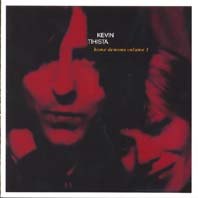
Briefly a member of Veruca Salt, this is Santa Criz born, Chicago based Tihista's fifth album, originally conceived as a mini album out takes companion piece to Wake Up Captain. It's emerged, however, as a 21 track (including Dracula intro and outro) collection of previously unreleased numbers, alternate takes and demos alongside a cover of Dave Mason nugget We Just Disagree.
Listening to his smooth easy pop you can understand why he cites the Lovin' Spoonful, The Beatles, Aztec Camera and The Smiths among his leading influences though vocally his soft timbre often sounds like a meeting point between Paul Simon and (especially on Can I Count On You and 15 Hundred Miles) Stephen Duffy.
It's inevitably a bit of mixed collection with Tihista straying all over the show into limpid country (I Don't Blame You), sunny 60s folkpop (Wake Up Captain), an orchestral #32 that owes much to Bacharach and David, the Lennon/McCartney Merseybeat of Stratford Upon Avon, the languid lounge hip hop I Love You, and casio tinkling power pop (Sparks meets The Cars) with Idiots. Listening to the musically tacky This Should Be A Duet (Really) and the words of the 70s piano rock Jim Henson's Blues it's obvious not everything here is meant to be taken too seriously, but even so it's hard to listen and not leave with a swooning smile on your face.
Mike Davies
The Tilston clan extends its presence on the nation's thriving acoustic music scene with a debut solo offering from this child of the erstwhile Steve Tilston-Maggie Boyle partnership. Joe's not hitherto been active on that scene, instead putting in the years by playing bass for the ska-punk-metal outfit Random Hand he founded in 2002. Now, however, he brings influences from both musical arenas to bear on Embers, an impressive collection of self-penned material that he's gathered together quietly over the past six years.
It may not initially appear an especially folk-flavoured collection, at least not in the more traditional sense, but it clearly bears (and wears quite lightly) scars inflicted (in the nicest and most positive way, I might add) by singer-songwriters whose careers bore first fruit in the late-60s/early-70s. Maybe I'm thinking especially of early Roy Harper, albeit mainly in terms of Joe's use of insistent modal guitar riffing for accompaniment (on tracks like Different Feet); and although Joe's lyrics are similarly questioning and soul-searching they're generally more personal than politically referential, albeit with a keen awareness of tradition and history too. In that sense, check out the eerie, bitter Kings Of Industry on one hand, the folk-ish Erosion and the folksy Liza & Henry on the other (the latter having already been delightfully covered by Maggie Boyle herself on her own latest solo CD).
It's hard also to avoid hearing traces of dad's vocal delivery in Joe's own singing style, particularly in matters of phrasing and melodic contour on such tracks as A Song For Old Friends, Erosion and The Railway Children. But Joe's singing, for all its outwardly sanguine demeanour, betrays an urgency and edginess from within, a gruffer lived-in quality that has its own attraction – and has no need for smoothness of impact, for all that it can seem a touch flat on occasion and certainly more than a little rough (in a peculiarly fragile kind of way).
Joe's music may seem to inhabit what the press release terms "calm and relaxed grooves", but its impact is not exactly relaxing, with a sense of prescient foreboding that dominates even when the musical climate seems at its least disturbed. The musical settings, although relying heavily on the textures of Joe's acoustic guitar, also gain much from the tasty and at times quite feisty flavours added to the mix by violinist Luke Yates and his creatively beautiful string arrangements, and (on Where Is The Love? and Little Scars) a slightly punk charge involving a rhythm section with drums courtesy of Random Hand colleague Sean Howe. Other contributors to the album comprise bassist Hugh Bradley, cellist Philippa Ratcliff, percussionist Robin Tyndale-Biscoe and producer Matt Tweed on bouzouki and electric guitar; Matt had been responsible for Martha Tilston's latest album, and she crops up here on backing vocals on Embers' opening track.
On the evidence of this characterful solo debut (which is, fittingly, dedicated to his parents), Joe surely has much to offer the acoustic scene.
David Kidman February 2013
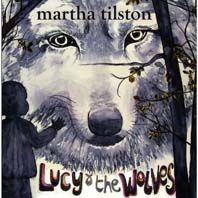
It's been a while since we last heard from Martha. After a spate of successful touring following her acclaimed 2007 CD Of Milkmaids And Architects, she took maternity leave, but she still busied herself writing new songs, ten of which have found their way onto this new album, released to coincide with her next scheduled return to touring during May.
Like its predecessor, Lucy And The Wolves is a brave and beautifully intimate record, replete with the enchantingly tactile poeticism and tremulously engaging delivery we've come to regard as Martha's personal trademarks. It's an inviting, distinctly captivating set, right from the introductory piano chords of the imposing opening song The Cape, which is almost classical in its austerity but typically rich in romantic imagery. Martha moves back to her guitar thereafter, for the limpid Rockpools and then for most of the remainder of the album, where the simply expressed intricacy of her own instrumental traceries is subtly and delicately augmented where appropriate by the brilliant double bass playing of Jon Thorne and mildly layered contributions from members of her backing band The Woods (on violins, viola, cello, bouzouki, extra guitars and percussion) and isolated appearances from guests Maggie Boyle (flute), Will Rumfitt (trombone), Chris Doney (banjo) and Steve James (piano).
The overall subtlety of expression extends to the often intriguing perspectives that some distant, almost subliminal miking of individual elements within the soundscape brings; Seabirds both furnishes a prime example of this technique and of the gentle but extraordinarily haunting power that characterises Martha's writing throughout. The rest of her new songs are hardly less compelling in their own seductive way: Who Turns is a restless late-night-fireside reflection trying quite desperately to make sense of everything, while Wild Swimming enticingly explores the forbidden fruits of tradition and My Chair further embraces wave-imagery in its flowing reminiscences. Old Tom Cat tellingly evokes the spirit of Leonard Cohen with its rippling guitar figures and minor-key elliptical questioning (not to mention its drawing to a close on the refrain "hallelujah").
Melodically, Lucy (the song) is perhaps slightly reminiscent of early Joni Mitchell, with its twisting turning swoops and dives through the vocal registers. And finally, the closing track, Wave Machine, seems to form a counterpart to The Cape with its crashing, tumbling momentum, strong water imagery and restless string figures. The disc's one non-original, the traditional Searching For Lambs, is theatrically played out acappella to an outdoor backdrop of cawing crows. The digipack artwork has, as always, been lovingly crafted and drawn by Martha herself, and it's just perfect for this gem of a record. Magic.
David Kidman April 2010
Since her (second) post-Mouse solo CD Bimbling, a couple of years back, Martha's been steadily consolidating her reputation on the acoustic nu-folk scene, writing prolifically and honing her performance skills even more confidently; she's also been gathering together a little "backing band" (which she calls The Woods) to take on tour with her. So now comes album number four (number three was a blink-and-you'll-miss-it download-only issue which I'm really miffed to have missed). It's another immensely assured effort, containing some determinedly original and intuitive new songs interspersed among which are Martha's concise, though quirky (and often therefore rather intriguing) takes on three traditional folksongs. Unlike the obscurely introspective and over-personalised ramblings of many a "Glastonbury child", Martha's writing is charmingly, refreshingly accessible and include (rather than cliquily exclude) the listener, and even though the special experiences she describes may not always be fully universal the feelings and emotions they arise or engender are. Milkmaid, where one's resigned acceptance of fate is bound up with a deep fascination for the past and family history, is a highlight of the set, while my other favourite songs, like Music Of The Moon and Scientist, conjure up an almost dreamlike kind of alternative reality that flows into and through your consciousness most satisfyingly.
Elsewhere, Martha's slightly tremulous delivery imparts an appealingly fragile, Tanyas-like air to Winter Flowers (a comparison reinforced by the backporch feel of Tim Cotterell's banjo accompaniment) and The Tulip Effect, a curious study in elliptical philosophy. Like Bimbling, Martha's new offering contains some pleasingly atmospheric evocations of Glastonbury life: Good World is one of those cumulative gentle rave-anthems that would go down well on the stage there, and Songs That Make Sophie Fizz is just delightful. As is Martha's singing, spellbinding throughout, and although her throbbing vibrato still gets in the way slightly on songs like Polly Vaughan, that trait is no longer the irritating mannerism it often was when Martha started out. Another improvement over Bimbling is that Martha's now relying less on samples to boost the soundscape; here their impact is more restrained and their function better defined.
Consistent with the earlier album, "The Woods" (Martha's young backing band) provide deft and apt accompaniment on various permutations involving guitars, mandolin, bouzouki, bass, violins, oboe, cello and gentle percussion, while Cate Ferris and Beth Perry add their voices to Martha's to quite magical effect, and the family connections are maintained with both her stepmother (Maggie Boyle) and sister (Molly) making brief cameo appearances (the latter appearing on the lovely hidden track, a wispy acappella rendition of I Wish, I Wish). I liked Milkmaids And Architects a lot, but I still found certain aspects of the presentation and packaging just a little infuriating: although the recycled-card sleeve folds out into four panels, it (disappointingly) only seems to find room for "some of the lyrics from a few of the songs", and those which are included are not at all easy to read due to the colour scheme chosen (attractive though the background artwork is).
David Kidman December 2006
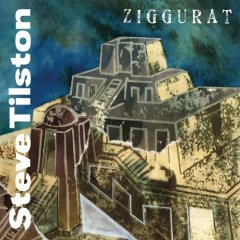
Normally, the release of an exhaustive box-set retrospective will either form a memorial, mark a significant anniversary or else signal that its subject has retired or run out of creative inspiration. Reaching Back, however, heralded none of these, and we can now celebrate Steve's triumphant return to the shiny-disc medium with the enigmatically-titled Ziggurat, his first new set of original songs since 2003's Such And Such.
Steve has candidly admitted that after writing Archipelago (shortly before the release of Reaching Back, on which its première recording appeared), there'd been a brief period of writer's block and self-doubt (at one point he even believed he'd written enough songs thankyou!), but (happily) Madame Muse paid a visit - and this "song about not being able to write a song" was ironically to prove the catalyst for further creativity.
These new songs still embrace Steve's trademark sense of history, but the difference is that this time (almost exclusively) it's the history of personal experience, albeit told with a distinctly universal perspective (as all the best songs are!), poignantly inviting listeners to draw parallels in their own lives. Even In-Between Years, for all that it focuses on some of his late father's own reminiscences, doesn't feel so private as to exclude the listener, while Archipelago may seem a simple love song but it has wider, both historical and geographical resonances. The Road When I Was Young, in a characteristically unassumingly first-hand manner, incidentally chronicles aspects of the early-70s acoustic music scene, while the abundantly happy 12-bar of Jacaranda leaps around in a manner that put me in mind of the sunny Grecian mode of The Dewy Ones.
There are some innately very beautiful songs here, whose immediate appeal is further enhanced by their truly lovely musical settings. Not only does Steve himself pick a mellifluous 12-string and some really tasty slide embellishments in addition to his customary highly expert six-string playing that always sounds so effortless, but there are also sympathetically understated contributions from a handful of musicians including Chris Parkinson (accordion, piano, organ), Dave Bowie (double bass) and Richard Curran (violin, viola), the latter transforming himself into a sublime mini-string-section for three key songs (I found After Summer Rain especially beguiling, but In-Between Years also has some gorgeous harmony voicing from Maggie Boyle).
The more caustic edges to Steve's world vision come with A Pretty Penny (and am I imagining it, or does its opening flourish also slyly back-reference Steve's famous ten-shilling note?) and, more savage still, The Spoils Of War, Steve's indictment of the sheer indifference of invading armies to their expedient wholesale destruction of a nation's cultural heritage (the iconic ziggurat being a prime example).
Finally, the disc also includes two typically well-considered arrangements of traditional songs, which might initially appear makeweights but can perhaps more accurately be regarded as the bridge leading from Steve's 2005 all-trad CD Of Many Hands into this Ziggurat. No: such is the unstinting quality of this fine new collection that Steve needn't resort to any dubious pyramid-selling techniques in order to shift copies!
David Kidman July 2008
In 1971, the tiny Bristol independent underground label Village Thing released Steve Tilston's fine debut LP; this artefact, far from mirroring the title's befuddled state of mind, turned out to be a very satisfying set with a consistency of vision which, though clearly containing its echoes of Steve's mentors and contemporaries, can now be evaluated as a work of startling originality which also gave a hefty indication that the then-just-20-year-old Steve would be a talent to watch and definitely no flash in the pan. It prefigured elements of Steve's mature writing style (indeed, the vast majority of its songs actually stand up well today), as well as his astounding guitar technique, which even then was judged quite exceptional. An Acoustic Confusion had in fact appeared on CD before, towards the end of the 90s, on the American label Scenescof, for which re-release two extra tracks were added from a 1978 session Steve did for Stefan Grossman; these, together with Steve's insightful 1997 liner notes, have been retained for this latest reissue (which also now restores the lyrics from the original VT package). Essential in anyone's book, I'd say.
David Kidman November 2007
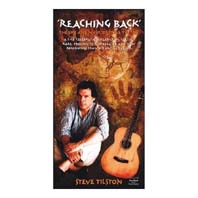
This latest release in the distinguished ongoing series of box-sets from Free Reed departs from the mould in that it celebrates a performer whose name isn't widely recognised as being "up with the Fairports of the folk scene" - well at any rate, I hasten to add, in terms of popular "household-name" acceptance and suchlike.
I'd consider Steve truly one of the unsung heroes of British folk, and forever deserving of a higher profile, which this splendid set should go a very long way in furnishing (for, let's be honest, Steve's not as "easy" an act to "sell" as, say, the Fairports or Steeleyes or Rusbys of the folk world, for whatever reason...).
Steve's been famously labelled "the songwriters' songwriter" (by Andy Kershaw), and he's often been singled out as a songwriter who possesses a special kind of sensitivity in tandem with a distinct talent for ironic wit and wordplay; his skills have been prominently endorsed by folk luminaries from Ralph McTell, Wizz Jones and Chris Smither to Nick Drake (and even Françoise Hardy!). Steve is also highly regarded, by fellow-musicians especially, for his virtuoso guitar-playing skills: his stylish, deft fingerpicking and gently ringing instrumental tone, once "clocked", become utterly impossible to mistake for anyone else.
Perhaps the reason Steve's music hasn't been accorded the widespread popular acclaim of some of his contemporaries, is that it doesn't shout in your face, ie. its virtues might by some be considered elusive; its dominant characteristic is its unassuming craftsmanship, and its mellow, relaxed, almost casual demeanour exudes an easy-on-the-ear mellowness that more often than not belies the more intense depth of response, feeling and expression - and creative intelligence - to be found therein.
Reaching Back thus presents within its five well-stocked CDs (four plus a bonus disc) a veritable connoisseur's collection which also functions as a sensible primer for the non-initiate (containing as it does all of his most famous creations - and I'd virtually guarantee your own favourite Steve Tilston song will be on it!). Throughout its heavenly length (just over 6½ hours), it also points up the (often subliminal) influence Steve has had on his contemporaries, an influence which has reached further than many might admit or even realise.
The box-set covers all possible bases in its endeavours to present a rounded and comprehensive assessment of Steve's life and work. For admirers of instrumental excellence, Steve's proud and matchless prowess as a guitarist is showcased on a fine selection of instrumental pieces from various stages of his career, while for those hard-core traditionalist folkies who tend to respond to Steve's name with a disparaging "oh, he's too contemporary", well the box includes a small but significant selection of his original takes on traditional material which should convince even the doughtiest of disbelievers. And as far as the songwriting is concerned, all of Steve's favourite concerns and thematic preoccupations are duly represented here, most notably perhaps the characteristic portrayal of those happenstances wherein "a contemporary and often prosaic situation brings to mind the history just beneath our feet". Aside of course from consideration of the stature of the set's subject, Steve himself, who is fully deserving of (and to my mind long overdue for) the celebratory-box-set treatment, a vitally important feature of this set, without whom etc. (which is in danger of getting overlooked, so I must pay its due here) is that it's been compiled by Nigel Schofield: someone who really knows, appreciates and understands what Steve's about; he knows the man, his "network" and the influences that have shaped him, and his music and songs, in depth; and he possesses the skill to communicate all those aspects with true insight and clarity. No-one could have done a better job in my opinion.
So, let's briefly guide you through the set, all the while humbly realising that all I can do is whet your appetite! A particular glory of the box is the large number of brand new recordings, many by Steve himself, which have been made especially for the set; these, which are arguably among his very best, comprise both fresh takes on older songs and original or first-and-only-time recordings of lost or forgotten songs that have (for one reason or other) never before managed to surface on record.
Disc 1, subtitled Who Made Up The Rules?, presents "the ground-breaking classic songs of Steve Tilston" from 1971 to 1990). Lifescape With Guitar, a pot-pourri instrumental rather like the overture or prelude to a musical or operetta, forms an ideal introduction to the whole set, stringing together a selection of musical themes from key songs, played by Steve himself with Chris Parkinson and Richard Curran in tow. The sequence continues with a brand new recording of And So It Goes, on which Steve is joined by daughter Martha and John Thorne. Then come three representative tracks from Steve's 1971 album, An Acoustic Confusion, which demonstrate just how massively accomplished a debut that LP was - and although his vocal phrasing had overtones of Donovan (Simplicity), his guitar work was even then quite extraordinary and certainly noteworthy. The next track, All In A Dream, is taken from 1972's followup Collection (not the compilation album the title appeared to suggest!), after which Steve treats us to a new recording of another landmark song Reaching Out, on which he's backed by the exceptional jazz guitarist Gary Boyle. An early example of Steve's genre-defying instrumental dexterity comes in the shape of Rock Salmon Suite from the first volume of Transatlantic's Guitar Workshop series, then it's back to song for Impressions, from 1976's Songs From The Dress Rehearsal (the latest of Steve's early albums to have been reissued by Market Square). A new live solo recording of Face Of A Friend (another Dress Rehearsal song) is inserted at this point for comparison, then, retaining the songwriting chronology, we encounter Time It Took Us By Surprise, written for and included on Dress Rehearsal but here for some reason taken from the 1998 Waz! version. An unreleased solo gem from 1978, Show A Little Kindness, precedes B-Movie and Red Sky, a pair of cuts from 1983's somewhat rocky (and ostensibly less remarkable) "band" album In For A Penny, In For A Pound, and two from 1987's Life By Misadventure (including the mbira-friendly kwela jive of Tsetse Fly Shuffle, a piece that still crops up in Steve's live sets). The simple yet fondly creative trad-arr of Verdant Braes Of Screen, taken from the superb 1988 Ship Of Fools "supergroup" album (a collaboration with John Renbourn, Tony Roberts and Maggie Boyle), precedes These Sea Dreams, a solo cut from 1992's duo album with Maggie Boyle (the masterly Of Moor And Mesa), and for its conclusion the disc returns to Life By Misadventure (with its title track).
Disc 2 (He Took Most Delight...), is, I suppose the disc which comes closest to forming a "Tilston's greatest hits". It takes Steve's story forward with the decade through to 2000 (the period when Steve gained the greatest leaps forward in terms of artistic recognition), and it includes selections from those lovely duo albums of the early-to-mid-90s Of Moor And Mesa and All Under The Sun, the solo classic And So It Goes, the band album Fully Chromatic with Maartin Allcock and Pete Zorn, aka Waz! (which enshrined the fruits of a particularly prolific songwriting phase), and the fine ensuing solo outing Solorubato (from which the choice of the epic The Turncoat is both expected and wholly essential). Into the midst of these tracks springs a previously unreleased 2001 studio take of Let Your Banjo Ring (with Mike Hockenhull, naturally!), and brand new recordings of those acknowledged-classic songs Here Comes The Night and Slip Jigs And Reels, the latter being undoubtedly Steve's most well-known and oft-covered composition (the known covers of which would fill a couple of discs or more I'm sure!). Oh, and a live rendition of Here's To Tom Paine taken from the 2002 Fairport Supporters tour.
Disc 3 (Staring At The Time), which takes the story forward into the middle of the present decade, is probably the most satisfying of the four for true Tilston devotees, for it contains a significant proportion of unreleased/forgotten/demo/rarely-heard-or-recorded material, including some enticing songs which hadn't hitherto seen the light of day. There's the intriguing, and unusually ultra-personal, To Bits And Back, for a start, then the elsewhere-unrecorded Old New World, the origjnal versions of Roman Road, Anthony Believes and A Rare Thing and a new recording of Archipelago (otherwise only outed on last year's Guitar Maestros DVD): quality songs all, and demonstrating that Steve's muse remains as powerful as ever. These gems are bookended by further sample tracks taken from the Solorubato, Such And Such and Of Many Hands CDs.
Disc 4 (Do What You Please) presents a clutch of covers by Steve himself of non-self-penned material, reinterpretations that so very ably prove his capacity for finding something new to say or unearthing the true meaning of songs from within a well-worn or oft-abused repertoire, a fresh slant hitherto usually overlooked by other performers. Beginning with his revelatory version of The Leaving Of Liverpool, then moving on through the crooners' classic Blue Skies to covers of songs associated with Buddy Holly, Elvis and the Platters, to more recent material such as Dylan's A Hard Rain's A-Gonna Fall (in a persuasive new recording), Blues Run The Game and Ralph McTell's Summer Skies. There's a second inventive trad-arr (Constant Lovers), then a track from Peter Bellamy's ballad opera The Transports, and two contrasting Les Barker compositions (one of which is the priceless Dipsticks And Seals parody). Oh, and another new Tilston original, a tribute to Big Bill Broonzy. Finally, Steve does indeed "do what he pleases" with the wonderful (if underrated) 23-minute instrumental Rhapsody, which he himself has jokingly dubbed "my Tubular Bells" (taken from 1990's Swans At Coole album), and which is replete with classical, baroque and Spanish influences.
The bonus disc is the set's oddity, and is exceptional in that Steve only appears in the capacity of performer on one of its 19 tracks (and even then only backing his daughter Martha). The disc provides several of the set's most interesting musical experiences, however, in that it presents a sequence of sometimes curious but invariably affectionate covers of Tilston songs, all specially recorded for the set, by artistes ranging from the inevitable (Fairport, Grace Notes) and/or welcome (Tom McConville, John Kirkpatrick, Wizz Jones, Steve Gillette & Cindy Mangsen, Pete Morton & Laura Hockenhull, Dolores Keane) to the entirely unexpected (Lunaseeds). All of these are sincere and genuinely respectful, and some are quite inspirational too. Standouts include Jez Lowe's All In A Dream, Bob Fox's Life Is Not Kind, Robin & Bina Williamson's charming, if eccentrically-scored rendition of The Proud Man and Brooks Williams' brilliantly swinging take on Here Comes The Night.
Finally to the typically lavish accompanying 98-page book, as always a labour-of-love on the part of the redoubtable Mr Schofield. This delivers, attractively configured amidst a backdrop of archive photographs and memorabilia, a veritable cornucopia of Tilstoniana taking the form of series of ultra-informative essays and notes. The introductory essay is presented as a chronological overview into which is interpolated a perceptive commentary, nay in-depth discussion, of each of Steve's album releases, which proves immensely valuable for its insights into Steve's development as an artist and its highlighting of Steve's willingness to imbibe and creatively absorb new flavours and influences (both musical and literary) into his own writing, whether instrumentally or lyrically. Then follows the tracknotes to each of the five CDs, which are interleaved with Steve's own observations and reminiscences and positively glisten with insights; most usefully, they also give details of alternative versions of the individual songs, whether those are by Steve himself or covers by other performers. There are also a few of those pithy explanatory or mildly tangential "reference-boxes" for which Free Reed sets are noted, and the booklet is laced throughout with ample and neatly quotable tributes from fellow-performers. Additionally, in between the notes for discs 1 and 2, four pages are devoted to a revealing little conversation with Steve's long-term musical collaborator, friend and erstwhile partner Maggie Boyle, and following the notes for disc 4 there's a timeline tracing Steve's perennial fascination with history as evidenced in his songs that "can be precisely located by the dust from their heels"…
The one small disappointment in the booklet comes with the notes for the bonus fifth disc, which are less illuminating regarding the actual songs (although to be fair, five of these appear elsewhere in the set and are annotated at the relevant juncture); there are also a few lines of text missing from the Brooks Williams paragraph. In addition, some significant discrepancies occur between inner and outer slipcase listings in terms of the actual running order of the disc. These latter glitches are most likely to reflect the more hasty last-minute production of the bonus disc - for, in the compiler's defence, this disc had sort-of grown organically (almost by misadventure you could say!)… Indeed, we learn that the original concept of the bonus disc - as a straightforward collection of previously-released cover versions of Steve's songs - had in fact become almost entirely surpassed, nay drastically altered, as so many of Steve's contemporaries had eagerly submitted their specially-recorded covers as tributes for inclusion even during the later stages of the process of compiling the main body of the set.
Never mind all that - for if this handsome and exhaustive box-set doesn't do Steve's cause a serious amount of good then nothing will: I'd say that not only is it a mandatory purchase for Steve's hard-core of loyal admirers (containing as it does such a high proportion of new or unreleased material) but it's also a pretty essential purchase for those already in the know about Steve but who wouldn't necessarily number themselves amongst the "inner circle" of devotees. And it proves a very rewarding set to listen to right through. In fact, I'd go so far as to say that it's a set you very probably need even if you don't think you do!…
www.steve-tilston.co.uk
www.free-reed.co.uk
David Kidman July 2007
Steve Tilston - Songs From The Dress Rehearsal (Market Square)
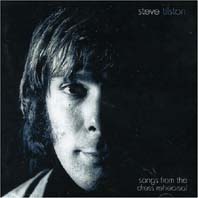
This remarkably consistent, quintessentially English singer-songwriter has been around longer than some are prepared to admit, and at long last we're getting the chance to re-evaluate some of his earlier work which was only available at the time on short-lived and/or obscure labels.
On this occasion, we have the enterprise of Market Square's Peter Muir to thank, for Songs From The Dress Rehearsal, Steve's much-sought-after 1976 release originally issued on his own Cornucopia label, has always been a rare and collectable item that even some of his staunchest admirers hadn't heard in its entirety.
For some years, Steve himself had been reluctant to bring it back into circulation, since as he admits that a lot of the songs therein document a period in his life which was not the happiest. Even so, Steve now all too modestly says that ?apart from the odd chord or two? he wouldn't change a bit of it! Whatever, it was a product of the white heat of creativity - almost literally, for it was recorded in the blistering summer of 1976 at King Crimson drummer Mike Giles's studio in the New Forest. There's a close and intense feel about the session, and the spare accompaniment conjured up by producer Rupert Hine for Steve and his guitar comprises just drums and bass (Mike Giles and John G. Perry), with occasional harmonica and keyboard (and an amazing extra guitar part from John Renbourn on The Greening Wind).
The Greening Wind, in fact, was the title of a compilation release Steve put together a few years back to illustrate his healthy back catalogue, and that compilation contained three particularly fine representative tracks from Dress Rehearsal - the good reception for which probably accounts for the present chance being taken to reissue the whole album. And what a wise decision it proves, for it really is an abnormally fine record that should never have languished in such obscurity for so long. Perhaps the very climate into which it was originally released is to blame for that - for the mid-to-late 70s was a time when ?jobbing? singer-songwriters were out of fashion and everyone wanted either WMC-jokers or serious traddies. But as these tracks prove, Steve was always far superior to the mere ?jobber?, with stylish and skilled and perennially inventive guitar work complementing his laid-back yet distinctively expressive singing on songs that struck the fine balance of making the highly personal attractive and accessible.
Almost any of the Dress Rehearsal songs would stand up well in a set-list today should Steve choose to revive them. And then I must mention the sizeable bonus material on this reissue, a half-dozen solo voice-and-guitar demos Steve recorded for Stefan Grossman for a projected album around 1979, all unreleased up till now and all of absolutely top quality. Nothing has dated in any way. The whole package is an exemplary presentation in fact, with full lyrics, Steve's own wry commentary and period-evoking photographs: exemplary as befits the brilliant musicianship on the disc within. It's also an apt appetiser for Steve's fine new CD Of Many Hands, to be released later this month - watch this space!
David Kidman
Steve Tilston - Of Many Hands (ADA Recordings)
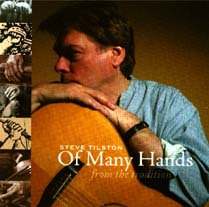
Here, one of my very favourite singer-songwriter-guitarists celebrates a self-imposed fallow writing period by getting round to putting together that album of traditional songs that he'd been meaning to do for ages!
Previously, of course, the trad-arr pieces had nestled like hidden pearls amongst the self-penned material on Steve's albums, but here he's allowed himself the luxury of recording a bonny bunch of songs that have touched him in a special way. The album title is a canny reference to the provenance of songs labelled traditional, which are seen to be the product ?of many hands? - and although the CD is stamped through with Steve's unmistakable warm musical personality, the recording itself is also evidently the product of many hands, with contributions from guest musicians Martin Simpson, Chris Parkinson, Nancy Kerr, James Fagan, Maggie Boyle, Scott Devine and Mike Hockenhull.
It's all magic of the highest order, assembled with typical Tilston tastefulness, yet yielding refreshing new insights into the songs. Musical delights abound, as befit Steve's respectful new interpretations of the songs, which are surely destined to prove as timeless as the songs themselves. Steve constantly delights us here, inviting us to look again at these songs and rediscover their meaning, one that's tended to be stripped away by decades of popular ?spinnery? and blatant misreading, whereby the poignant emotional journeys depicted in the songs have largely been rendered bland and jollified (The Leaving Of Liverpool) or else dull and dirge-like (Loving Hanna) by countless inferior or plain thoughtless retreads over the years.
The instrumental backings contain so many delicious, intelligent and thoughtfully imaginative (and fun) touches (being ?of many hands?, indeed) that I kept rewinding a few seconds just to hear them again. Martin Simpson's cool and characterful slide guitar counterpoint to Steve's slapped rhythm on Going To The West, Maggie Boyle's flutey echoes of the moorcocks ?crowing?, Mike Hockenhull's rippling banjo driving along the saga of Captain Ward, Chris Parkinson's cheeky harmonica blowing snatches of G&S in on the sea-breeze on Steve's Caribbean-tinged rendition of New York Girls? the list could be endless.
Steve's fortunate too in having commissioned Nigel Schofield to write the booklet notes, for these are well informed and supremely insightful and fully complement Steve's own attention to detail in acknowledging his multifarious sources (that includes owning up to writing the words to the closing Willow Creek, rather ?hot on the heels of The Naked Highwayman?!). And a special word of praise too for Mike Hockenhull's exceptionally fine production, for he's a man who knows Steve and his musical sensibilities inside out and he gets every intricate detail just right.
Yes, here's abundant persuasive proof that achievement of musical and artistic perfection doesn't ever have to bring listener-unfriendly sterility. This wonderfully exciting CD affirms the relevance of the tradition, exuding life, accomplishment and understanding. The CD will be launched during Whitby Folk Week; do try to get there, it promises to be quite an occasion! Till then, it's been a privilege to get to hear this CD in advance of the launch date. It's officially released on 24th of August.
David Kidman
Steve Tilston - Such And Such (Market Square Records)
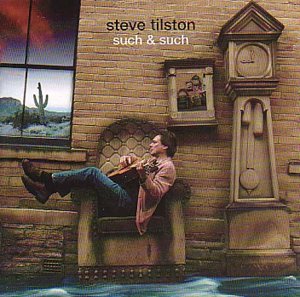
In my humble opinion, Steve's never given us a bad album, and several of his works remain firm favourites within my collection. I really thought the chamber-scale craftsmanship of Solorubato was unsurpassable. Yet even by Steve's own exacting standards, Such And Such is also one of Steve's most varied collections, easily yet ever unassumingly parading Steve's stylistic versatility, instrumental facility and consummate musicality. Opening with two of Steve's most catchy songs to date, you just know this is going to be a landmark CD. Rare Thing is quintessential Tilston, with an insidious refrain concealing depths of observation and feeling in ostensibly simple lyrics. Some Kind Of Sonnet has one of those infectious tumbling choruses where the words just cascade off the tongue. Here, as on several other songs on the CD, there's a distinctly Waz-like feel to the proceedings – not surprising when you notice Maartin Allcock's name among the supporting cast – and then there's Andy Sheppard's distinctive sax contributions, along with fellow-Fairport-Supporter annA rydeR (keyboards, accordion, French horn and backing vocals), and occasional subtle drumming from Roy Dodds, while Richard Curran returns to the fold on violin and viola, and there's also Keith Warmington on harmonica, and hey, Maggie Boyle and Gavin Randle on flutes! The one instrumental track Totterdown proves a natural and inevitable vehicle for Steve's meticulous and tasty guitar figures, but there are plenty of interesting licks to be found elsewhere on the album too as you'd expect! Some of the songs have been getting increasingly familiar through Steve's live appearances, and here they reach a definitive recorded form (for now?!). Anthony Believes (formerly available in solo form on Steve's Live Hemistry CD) is here transformed into a true Lied with masterly chamber texturings. But true to form, Steve uses the new CD as a vehicle for letting us hear several other of the songs for the first time – these include the epic Sniper's Tale, the pensive There Is A Song, the intriguing Mirror Dance and the easy-ramblin' Sweet Such And Such (which could have been written just for Chris Smither I reckon!). Although this CD is self-evidently the work of a contemporary singer-songwriter, Steve signs off with a nod towards traditional source material with a deliciously dainty, courtly setting for an inspired reworking of The Constant Lover. There's also a retrospective feel to many of the CD's constituent parts; in a way, it's a kind of Tardis trip that spans both Steve's musical influences and background and many of his former collaborators. The 12-bar ambience and Latin insouciance of I Need A Cup Of Coffee, for example, is at once a throwaway and a throwback. Perhaps this and one or two other tracks may prove too smoothly obvious for those seeking deeper listening, but in his defence you could say that Steve has a knack for varying the intellectual level of his material without seeming patronising! Whatever, I'd still pronounce Such And Such an outstanding album from a musician of quality and integrity.
David Kidman
Steve Tilston - Life By Misadventure (Market Square)
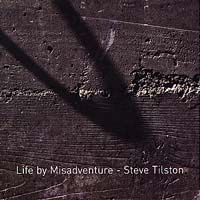
Sometimes words are a waste of time and it's right to let the music simply carry you away on a magic carpet ride. 'Life By Misadventure' is one such collection of songs - a totally compelling album from a consummate artist. But I will talk about it, because I want you to go out and buy it - if it's not in your collection already!
This is a re-release of Tilston's 1987 10-track masterpiece of fluid fingerstyle guitar in all its beauty and purity. Half the songs are played on the classical guitar with classical dexterity but there's warmth and tenderness too. Tilston has breadth and depth: here are classical Spanish themes, gentle Caribbean rhythms, string bending blues, seemingly simple songs with cello or flute accompaniment (always the perfect counterpoint to the acoustic guitar) and, finally, the bonus track (and then some!). At 23 minutes, the instrumental 'Rhapsody' from 'Swans At Coole' is Tilston's own celtic Tubular Bells - with largely classically-trained musicians, whose flute, whistles, cello, violin, ullean pipes and bodhran, together with Tilston's guitar and mandolin, he has woven to make a sumptuous and satisfying whole of simple airs.
A small digression: if you have the opportunity of seeing him play live, look out for the Arpegionne, a copy of the 19th century bowed guitar, which he has been including in his performances for over a decade.
Many of Tilston's songs have become folk standards covered by others since his first album 'Acoustic Confusion' thirty years ago. Much of his back catalogue is not available except by mail order from his website, so it is gratifying that 'Life By Misadventure' will be out there in the racks, courtesy of Market Square Records, in September. Why not buy two? Someone will love you for the gift of it!
www.steve-tilston.co.uk
marketsquarerecords.co.uk
Sue Cavendish

German blues label Ruf have a reputation of showcasing rising North American blues artists in Europe. The latest of these are three female singer/guitarists Sue Foley (Canada), Deborah Coleman (USA) and Roxanne Potvin (Canada), collectively known as Time Bomb. The Telecaster (I love Sue Foley's Paisley pattern one) wielding trio strut their stuff on the eponymous title track, which is a festival of guitar playing as all three showcase their skills. Hitting On Nothing has Potvin on lead vocal and is classic R&B. This is a stylish song and shows that these girls can certainly play. Sue Foley takes on lead vocal for the Country flecked stormer, So Far, and shows herself to be a very good singer indeed; probably the best of the three. Talking Loud has the third of the trio, Deborah Coleman, on vocal. This is funky and has plenty of attitude. Strong Enough To Hold You has Roxanne on lead vocal but it is a nondescript ballad.
Sue Foley returns on Show Me, a great bar room blues with a sleazy vocal. Motor City is a driving blues with Coleman on vocal but is not too inspiring. Get Up has a Pretty Woman style drum beat from Billy Thommes and Potvin takes the vocal. The only thing that this funky R&B is missing is a more powerful bass line. Two Moons Gone is Foley's final song and she signs off in fine form on this speedy blues. Don't Start The Car has a good blues riff and has Coleman on vox -- great rock stuff. In The Basement closes the set and has all three on vocal. They all bring different facets to the table on this R&B mix and provide a good finish. Sue Foley is the most experienced of this trio, having already released ten albums but I am sure that she, and the other two, will go on from strength to strength on the back of this album.
www.suefoley.com
www.deborahcoleman.com
www.roxannepotvin.com
www.rufrecords.de
David Blue May 2007
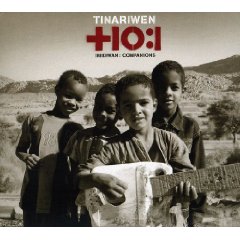
The Touareg musicians' collective that is Tinariwen has just reached a new pinnacle of acceptance by winning this year's Uncut Music Award, and listening to their fourth CD release, Imidiwan, that's hardly surprising, for their music, while hypnotic and compelling, is also strangely accessible to what might be termed western ears and sensibilities.
Tinariwen began as a loose collection of displaced Touareg musicians who came together in the late 1970s with a shared passion for everything from traditional Touareg music and poetry to western rock and pop, and over the ensuing years steadily built a reputation in and around the Sahara desert before moving back to Tessalit in Northern Mali, the village home of key band members Ibrahim Ag Alhabib and Hassan Ag Touhami, where their 2001 debut album The Radio Tisdas Sessions was finally recorded - and to which location they returned to record Imidiwan. The intervening years have seen the band touring extensively and much feted across the world; their sound, with its intense and rather sultry guitar work, grinding and often unpredictable rhythmic elements and wild vocals, has found a great deal of unexpected crossover appeal.
Imidiwan finds all these elements still in evidence, stronger in terms of presence and confidence, with an organic feel to the construction of each individual piece that allows for space around the basic structures while enabling the words to breathe and stretch over melodic lines in a less constrained way. Although increasingly chill-friendly nowadays, their music also broods in your consciousness as it casts a powerful spell over the senses: creative rhythms and rhythmic turns, arcane political poetry, ululating chanting, gritty, often fierce desert-rock guitar licks and riffs, all adding up to a pretty unique experience that's freshly minted, brilliantly recorded and yet not at all easy to define, even within the normal parameters used by those more experienced in African music matters. The accompanying booklet usefully includes personnel credits, also (even more importantly) translations and transcriptions of the original Tamashek lyrics, but there are no explanatory notes beyond exposition of "magic desert moments! I guess this adds to the general air of mystique.
So, for all that the music itself is exciting and penetrates the very soul, the whole experience is quite subtle in many ways and thus still needs some work, and close attention, on the part of the listener in order to cut through its often puzzling iconography and its initial trance-like impact. The disc package also includes a half-hour DVD, but this is even more impressionistic and only a couple of the audio CD tracks are illuminated (one is reprised in its entirety and one is excerpted) by their inclusion therein.
David Kidman November 2009
Tindersticks -Waiting For The Moon (Beggars Banquet)
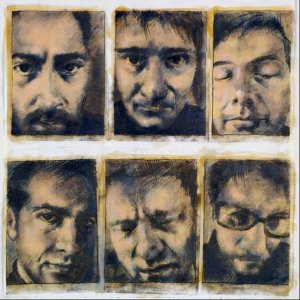
Souled out after the last two albums, it's back to business as usual for everyone's favourite British gloom boys. So more slow songs sloping along on the back of mournful guitars and strings washed melancholic melodies, romance pulled through the gutter, rain washing on night streets as a tormented Stuart Staples attempts to keep psychosis at bay as thoughts of betrayal or revenge crowd in. 'My hands round your throat. If I kill you now, well they'll never know' he sings on the cheery opener Until The Morning Comes.
Maybe its down to their flirtations with urban soul but they seem somewhat less musically intense this time round, the songs somehow looser, more fluid, even something like the fraying nerves mood of Say Goodbye To The City somehow more casual and relaxed. There are angular shards, most specifically on 4.48 Psychosis, its spoken words taken from the late Sarah Kane's play and intoned over a Velvets like drone while by contrast Just A Dog has an almost jaunty Jacques Brel goes country lope, but otherwise it's elegant slow waltzing and panoramic orchestral vistas such as the languid widescreen nocturnal seven minute epic of My Oblivion and Sometimes It Hurts their Lee and Nancy duet with husky Mexican-American Lhasa De Sala. It's not exactly pushing any band frontiers, but when you're swallowed up in something quite so full of such beautiful hurt as the title track, then contempt is the last thing its familiarity breeds.
Mike Davies
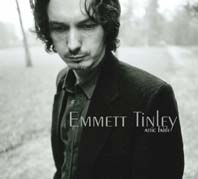
Having spent 12 years garnering critical acclaim but little else with Dublin outfit The Prayer Boat, Chicago born Tinley has allowed the band to quietly sink and embarked on a solo voyage. Not that he's thrown away the old rigging, the new album still carrying a cargo of lushly orchestrated tales of lovelorn yearning and romantic wanderings, imbued with a sense of an outsider's isolation. Here you'll find songs titled Comfort Me, Heart Still Breaking and Killing The One I Love and lines about love unobtainable or lost, the object of his affection emotionally or physically (often both) distant, leaving him crying 'I want you' or trying to forget. He sails to Columbus, to the Great Lakes, to Chicago and Amsterdam looking to resolve the emptiness in his heart, but the story remains the same, the 'failing kiss', the fading joy, the silence echoing the emptiness.
Musically, these are largely still and mellow waters, disturbed only by the occasional storm that quickly passes as arrangements flow and ebb, Tinley's soulful sweetly pained vocals soaring and soothing by turns. Given the radio play, Christmas Street could well find favour among those who quite like James Blunt but want a bit more emotional blood, but while such numbers as Closer To Happy, the winter kissed piano ballad Snow Dome and Two Years On leak romantic melancholy they're sadly unlikely to find him sailing any closer to breakout success than his former band. 'Boats are leaving, boats are coming home', he sings on Amsterdam Weeps, a song of grief partly inspired by the suicide of Hermann Brood. You could do worse than work your passage on Tinley's.
Mike Davies November 2006
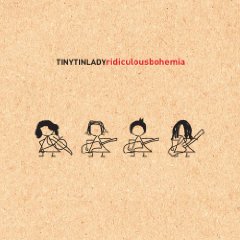
This Merseyside (St. Helens)- based girl band recorded their debut CD (the unreasonably doomily-titled The Sound Of Requiem) early in 2006, after they'd been together just a little over a year. It was released to wide acclaim that summer, and a well-received appearance at that year's Glastonbury festival followed. Since then, the trio (comprising sisters Danni and Beth Gibbins and Helen Holmes) has been converted into a foursome with the addition of violinist Katriona Gilmore; and here is their long-awaited second CD. It shares with the first a bright, infectious pop sensibility, but is not without its deeper moments, with repeated plays revealing many subtleties beyond its often breezy surface accessibility.
The band demeanour is strong and confident, and the boldness of imagery conjured up by elder sis Danni (TTL's chief songwriter, who's penned all but three of the tracks) is matched by a similarly direct and punchy quality in the arrangements, especially in respect of Helen's inventively underpinning bass lines, whereas the more poignant nuances are reflected in Kat's swooning, shimmering fiddle lines. All of which serves as a great backdrop for Danni and Beth's trademark sibling vocal harmonies (superbly captured and balanced by producer Mark Tucker).
The overall band sound is masterly too, for TTL are fortunate to have obtained the services of Fairport stalwarts Gerry Conway (drums on two-thirds of the disc) and Ric Sanders (violin on two tracks), with further high-calibre guests including Mark Tucker, Dave Sanderson and Mike Smith. On initial acquaintance, I felt just a touch unconvinced at times by the world/roots flavours (ska, klezmer, gipsy, ragtime) that colour individual tracks, but in most cases that first-impression of almost-pastiche is fairly swiftly redeemed by the interest generated by the lyric content (it's a pity, by the way, that the package doesn't include the lyrics, and they're not available on the TTL website either). The opening track (Fall Into Line) is untypical in its brassy swaggering ska, while later on the girls dip their tootsies into country-rockabilly (Dubble Bummage and the album's title track) with some quite charming silly-season drunkenness (My Heineken Keg) to finish. Even so, for me the set's strongest moments come on the epic psych-folk of Growing Pains, the brooding In My Room and the percipient Love Is A Duel, the heartbreaking angst of Green And Brown And Grey (one of Beth's two writing contributions), and the edgy alienation behind the smooth melody of The Road To Ridiculous Bohemia. Yes, this record has been worth the wait, and should readily throw open a few more doors for the girls.
David Kidman October 2008
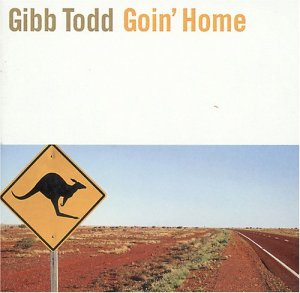
www.members.aol.com/Oscarsfolk/gibbtodd.htm
www.compassrecords.com
David Kidman
Tomato & The Hot Stuff - Taking A Chance (Blue Rhythm)

Deborah Maddalon is Tomato - say it with an American accent to make any sense of it - and she learned her craft as part of a 50s showband supporting the likes of The Drifters, Shirelles, Bo Diddley and Chubby Checker on the US cabaret circuit. The Hot Stuff are staffed by musos with pedigrees that include It's A Beautiful Day, Dr. John, Willy De Ville, Irma Thomas, Stevie Wonder, Harry Connick, Ernie K. Doe and The Dixie Cups. In short, this Tomato is well seasoned. What they play is R&B blended from the finest Stax and New Orleans ingredients. The rhythm section drives hard without sacrificing the deftness to make the ballads float; a fat Hammond underpins it all whilst a fine horn section conjure up the spirit of the marvellous Memphis Horns perfectly and guitarist Billy Gregory - the ex Beautiful Day man - fuses Cropper and Cray. If there's a fault it's that Tomato herself tries too hard and tips into blues cliché all too easily and some of the material is soul by numbers. That said, the fact that producer Dave Williams put together this authentic sounding southern states soul stew together in the wilds of Norfolk makes it a mighty fine achievement for all.
Steve Morris
She takes on piano duties for Lonely Tonight and her shrill voice just adds to the overall power. Infidelity is Indie rock and such a powerful song must mean there is a place for her at the table. Losing You is another piano-led track, a rock ballad that also brings Evanescence to mind and highlights her good vocal range. There is a live feel to Accusations as Goss gets into a groove on guitar and drums. He then adds bass (busy boy) to funk it up on another personal song that carries the theme of a love lost throughout. Never Ever is a passionate and soulful piano song and her versatility is shown on another rocker, Your Way. This also confirms her songwriting talent which was first noticed at the tender age of 10. You thought that there would be a happy ending, didn't you? Well, you are out of luck as Poison rocks out the album to the end. However, this is not one of her best and leaves you with a sense of disappointment. Overall, this is an excellent, if black, album. Chrystina says "thanks to this album I've had the chance to express all of my emotional baggage". You don't say!!
David Kidman October 2007
Tompaulin - Into The Black (Track & Field)
Four years on from their debut album, Blackburn's fey four piece return with a long overdue follow up and further excursions into Americana tinged lo fi swooning melodies with Stacey McKenna's vocals designed to get reviewers reaching for those Cowboy Junkies comparisons. Their brand of doomed romance and bruised souls is especially apposite to This Desire where the weary sadness of the delivery sits curiously at odds with the burning passion of the lyrics. It's not the only time they juxtapose form and content, Promised land reversing the process to set a lament of despair to a gently jogging melody.
It has to be said that they're not generally prone to bathing in sunshine. The Beautiful South like duet between McKenna and guitarist Jamie Holman on Useless bears the line "You promised that you'd save me but you didn't say from what, You promised we'd be happy but I promise you I'm not" while the sparse, hushed brittleness of All The Words For Please sees Holman positively falling apart. Even Brave, arguably the most positive of the downbeat songs, talks of 'darkness in my bones'. They've been taken to task for not letting the blood boil more often, but as 3 In The Morning dribbles in bongos, Always Winter shimmers with a Velvetish psychedelic blues, Days Fall Away bows out on acid storms of guitars and lonesome banjos pluck away at When The Night Comes Like A Thief, you have to say that they can perfectly judge what colours enhance their palette to best effect.
Mike Davies
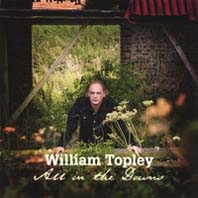
Formerly front man with The Blessing, Topley's been solo for some years now but has still never found the wider success that was once predicted. This, his sixth solo release and the second through his own imprint, isn't likely to bring any belated overnight stardom but it does serve up a solid, often inspired, collection of soul rock songs about bruised hearts in the venerable tradition of Graham Parker and Van Morrison, to whom his rich voice often bears comparison.
Are You One Of Us gets the ball rolling in Southern soul boogie form with a melody line not too far removed from Nutbush City Limits and Topley's throaty vocals in fine fettle. Once the motor's running, the journey explores laid back sideroads with the dreamy Morrison meets Marc Cohn Holding On and the Bahamas inspired Lotus Eaters, kicks up the highway dust on Quicksand, prowls around cellar bar rock blues with Traitor's Gate, and stops over for Saint Emilion & The Sinner's gospel wine nutrition. He even dips into his English folk heritage for the closing Sweet William, a near seven minute inspired by John Gay's poem Black Eyed Susan's Farewell To Sweet William; though I doubt he ever envisaged such a soulful guitar fade.
With Colin Vearncombe co-write Chapter And Verse, the sort of track that makes you want to go and buy an open top Cadillac just so you can cruise the freeways with it blasting from the speakers, it may not be the 'future classic' producer Nick Davis claims but I can guarantee you'll still be digging it to play years from now.
www.williamtopley.comMike Davies February 2008
The disc's contents reflect this to perfection, with seven of Joe's classy self-penned originals topped up with some unusually inspired covers of traditional songs and a couple of what might be called standards. The originals are beautifully crafted and thoughtful creations which deal subtly but effectively with topics ranging from resisting violence (Holding On To Love), media expectations (Circus Girl), protest against the inaction of governments faced with natural disaster (How High), and relationships (The Last First Kiss and the charming, rather Carteresque All Coming Back To Me Now), to canny pen-portraits (Trouble and William McKenzie & The Devil): every one a winner in my book. Joe also treats us to an attractively plaintive, traditionally-inflected setting of Tennyson's Come Not When I Am Dead (put together for the poet's bi-centenary). Among the covers, Joe turns in especially persuasive accounts of Bonny Light Horseman and She Moved Through The Fair (the latter, a bonus track, having been recorded live), and Fats Domino's Walking To New Orleans is both a welcome and inevitable choice that receives a powerfully resonant reading.
The disc winds down nicely with keenly-realised adaptations of Little Red Rooster and Georgia On My Mind. Throughout, Joe's mellow yet heartfelt vocal delivery is backed by his own intricate, intensely accomplished guitar work, and he receives some ancillary help from Miranda Sykes (double bass, vocals), Joe Wright (fiddle, mandolin) and Richard Adams (percussion). The immaculate nature of the performances are matched by Paul Adams' exemplary production. This is topping stuff, for sure.
www.joetopping.co.uk
www.myspace.com/josephtopping
David Kidman April 2010
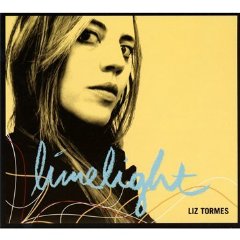
That said, it's not a recurring comparison and those who've likened her sultry tones, perceptive lyrics and softly persuasive melodies to Aimee Mann and Neko Case aren't far wide of the mark.
Her songs largely centring around ended or ending relationships (as Amy Helm duet Better Days shows, even when things are going well she anticipates them taking a downturn), she can turn emotional troughs into gently lilting lullabies (Limelight), broodingly desert night blues (the six minutes intensity of Black Luck) or something rocky like the ultimately hopeful Fade Away.
There's country traces to her melodies and the occasional catch in her voice that bear testimony to those Nashville days but she's more mature folk pop than anything, a groove superbly evidenced on Maybe You Won't where, to a simple choppy acoustic guitar backing, she shares vocals and romance doubts with Teddy Thompson.
With musicians that include Blue Rodeo keyboard player Bob Packwood, Rufus Wainwright bassist Jeff Hill and guitar wizard Jason Crigler (whose played for both Thompson and his mother Linda), it's a deceptively unassuming album that reveals and beguiles more with each listen and, if it garners the exposure it deserves, should provide a firm foundation for a long career.
www.myspace.com/liztormes
www.liztormes.com
Mike Davies July 2009
David Kidman
Raised in Pasadena but now living in the UK, Guy Tortora has been a bit of a wanderer. His travels have taken him from the USA to Canada, on to mainland Europe before finally settling in London. He has played at festivals and clubs throughout Europe and shared a stage with Peter Green and John Mayall. The eponymous title track opens things up and the blues based dobro is fine. It is well produced and Giles King's harmonica wails away in the background. Blind Willie Johnson's Nobody's Fault But Mine has been recorded many a time and Tortora gives it a slow, jazzy treatment with prominent piano. It's a bit too clean if you know what I mean but it is well played on acoustic guitar though. Like It That Way has some gentle sounds to take you away in a dream. Cotton Was King is a bit of a history lesson and the spoken vocal is powerful and thought provoking. Earthy harmonica from Giles King once again. God Don't Change is a blues based soft rocker with plenty of chanting in the background. The jazzy Super Blue has him going electric for once and this JJ Cale song has a telling guitar break.
Mama's Tired is an acoustic blues but the snappy drums from Mike Thorne gives it a contemporary feel. White Boy Blues has prominent Hammond organ from the excellent Janos Bajtala and it shuffles along in a slow groove. Tortora's voice could do with a little more edge. People Get Ready is the Curtis Mayfield song recorded by many including a duet by Rod Stewart and Jeff Beck. This version compares favourably with the best of them and the slide guitar fits in very well. The Gospel feel to it makes it a highlight. Share Croppers makes it two crackers in a row and Tortola is really getting into it now. This acoustic Americana is very well played and Olly Blanchflower's double bass is a point in question. The album is finishing strongly and it would seem that his place should be in Americana - he is far better in this field. There are some backing vocals and Richard Studholme's mandolin on Falling and it certainly makes for a fuller sound. To finish off, there is a bonus track in the form of Don't Do It. This is a blues on the rock n roll side and is a bit of fun to complete a fine selection.
Guy Tortora has a future for himself in Americana, he just has to realise it.
David Blue April 2008
Touchwood is an Australian vocal trio (Kate Andrews, Christina Mimmocchi and Terry Clinton), whose slogan ("a little bit folky, a little bit funky and a little bit fa-la-la") almost - but not quite - sums up their approach, sound and exceedingly eclectic choice of repertoire. The latter ranges from members' original compositions to covers of standards (Strange Fruit), pop (Vince Clarke's Only You), S&G (Hazy Shade Of Winter), cod-cowboy (Old Blevins) and traditional folk (I Know My Love, Sailor Boy), via a 16th century Spanish song by Juan Vasquez and a typically melancholy lute-song from John Dowland's Lachrimae collection. Quite fairly, Touchwood compare their musical philosophy to the behaviour of their country's bower bird - gathering all manner of treasures from near and far for the delight of a potential mate. And sure, to transfer the analogy to the UK, the magpie is often seen to be a beautiful bird, but its habit of picking up anything and everything can sometimes be mildly infuriating. That's how Touchwood turn out, in fact. There's no denying the trio's high degree of polish and accomplishment, and when their arrangements work well the result is invigorating and satisfying. Wild Nights, a Juliet Prager setting of Emily Dickinson, is superb, while I thought Paul Spencer's reflective Ode To Soil, Phil Ochs' strange I've Had Her, Sting's Fragile and Everything But The Girl's The Night I Heard Caruso Sing also emerge most credibly from their treatments, but just occasionally there's a nagging feeling that Touchwood are just parading their wide range of musical appreciation (or else trying to prove a point regarding their versatility). In fact, actually I'd probably vote for the impressive array of originals, rather than the covers, as the most durable and interesting of the material on offer on this, Touchwood's second CD. I feel that some of the trio's chosen material (Michael Marra's Like Another Rolling Stone, for instance) doesn't sound ideally comfortable in the self-consciously-arranged, quasi-barbershop harmony-and-counterpoint approach they adopt, and such pieces can seem overly cultivated, even a mite pretentious. By the way, not all of the album's 17 tracks are performed a-capella; on around half of them, there's a modicum of backing on guitar or vihuela, and three additional musicians are used sparingly (I particularly liked Louise Watson's cello contributions). And the presentation of the CD includes song notes, lyrics (or links to them) and other bizarre information on "things that are big to the band" (all viewable through your PC rather than on the physical package itself). Touchwood are definitely worth hearing, even if in the end you may not like everything they do.
David Kidman
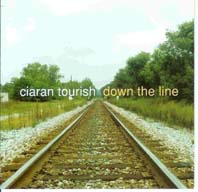
Ciaran Tourish, long established as the fiddle player with Altan brings (to my knowledge) his first solo-ish recording and of course the leading question is why is it his first? For here we have a performer at the peak of his career who knows a thing or two about getting the best from his main instrument and he's no slouch on the whistle either. Unlike many of his fiddle playing friends Ciaran has decided not to concentrate on the fiddle as the only instrument featured on the CD but by utilising artists such as Paul Brady, Alison Krauss, Tim O'Brien and Maura O'Connell shows its beauty in the accompaniment on songs including Brady's 'Dreams Will Come', 'Are You Tired Of Me Darling?' and the Gaelic 'Slan Le Maigh'. Joined by other musicians the calibre of Arty McGlynn (guitar), Jim Higgins (percussion), Neil Martin (cello) and Jerry Douglas on dobro and all in all you have pretty impressive package. On his own composition 'Old Town' Tourish has it about right in his sleevenotes when he mentions that McGlynn's chord arrangement captures the mood of the tune brilliantly - but then again, what else do you expect - when you work with the best you get the best. Good listening!
Pete Fyfe
This young box player from Donegal is, you guessed it, nephew to that fine fiddle player Ciarán from the long-running band Altan, and his musical partnership with Cavan-born bouzouki player Luke has produced an enjoyable CD full of lively musicianship and abundantly sparkling playing. The majority of the tunes played here turn out to be Máirtín's own compositions, and fine examples they are too, right inside the traditional idiom and betraying a distinct Donegal imprint (no bad thing!); several are namechecks for members of the Tourish clan - and why not?! Máirtín's use of the piano accordion (instead of the button accordion we usually associate with Irish trad) brings dividends too, with his playing altogether bright and flexible, while Luke's accompaniments are a model both of taste and adroitness (and I'm glad he also gets the chance of a solo outing, on the beautiful lullaby Leanbh Mo Chroí which Máirtín composed for the bouzouki). Although the faster tunes provide most of the menu here, one real showstopper here is Máirtín's full-on performance of his own powerful slow air, the lament Caonadh Ár Cultúr. Other highlights for me were the Fortune Teller set (track 4) and the Stage Fright set (which combines another air with an Asturian jig). Máirtín and Luke are joined by a small number of guests, including Ciarán himself (fiddle on The Tourish Set), Terry McGinty (basses), Ciarán Tackney (organ), Stiofan O'Brien (bodhrán), Steve Cooney (guitar on Ardara Sessions and bass on Skitatoes), and then there's even two stepdancers who join in the hooley on the finale! Grand stuff, this.
David Kidman, July 2006
Henry Townsend - The Real St. Louis Blues (Arcola)
Multi-instrumentalist Townsend is captured here on three recording days in August 1979 and the 17 tracks that were produced, 16 by Townsend and a version of Little Walter's My Babe, are just what the album proclaims - the real St Louis blues. The album opens with the acoustic Can't You See, a different and, in my opinion, better version of the song also found on the Big Al Calhoun album reviewed by me earlier in the year. Townsend's instrumental talent shows when he switches to piano on Mercy, a classic St Louis style blues.
Can't Help Myself has Townsend on electric guitar and listen for the parakeet in the background - I've never heard anything like this before. He returns to the piano for So Long So Long, another classic St Louis blues before trading the keys for acoustic guitar on Pleasin' Myself with its laconic vocal and lively guitar breaks. The only track on the album that Townsend didn't write is My Babe, not the Little Walter track but one written by James 'Stump' Johnson. Played on piano and 45 years after he had last heard it.
Crying Won't Make Me Stay has producer Bob West on guitar and its live feeling was achieved by a one-take recording. There's a certain truth to Sad Story, as everything from the plaintive vocal to the sombre lyrics on this track will give you a feeling of melancholy. I've Got To Go is in a Delta blues idiom and showcases Townsend's ability to play different styles whereas Long Ago is a rolling piano blues.
Playing without picks, as ever, Townsend turns in some of his finest work on Bye Bye St. Louis before returning to the piano for Room And Board. This slow boogie-woogie tune shows that he is just as at home on the ivories as he is on the guitar. What's On Your Mind is acoustic and has the classic blues theme of man can't get on with his woman etc. Maintaining the switch between piano and guitar, Let Her Go is an early version of one of my favourite songs, St. James Infirmary. Laden with emotion, this is a highlight.
I Regret is a straightforward acoustic blues but Townsend hits the heights and gives it his all on Every Once In A While, which was recorded on his own piano and in his own home. The album finishes with Going Back Home, which is played on the harpsichord. This is the first time that I've heard a blues song played on that instrument and the effect is very good although I'd like to hear it on piano as I feel that it would give the strong rhythms a rounder sound.
Congratulations have to Bob West and Arcola Records for preserving this, and other, recordings and I'm sure that many a generation will give thanks for the likes of Henry Townsend.
David Blue
Joe's a composer and violinist at the cutting edge of the British theatre scene who's performed with (among others) Laurie Anderson; Martin, on the other hand, is perhaps best known as an accordionist who's performed with Joan Baez and performed and recorded with both Eliza Carthy and Linda Thompson. Considering one's possible expectations given the personnel involved, then, Return To The Woods turns out to be emphatically not a succession of tunes, but more of a quasi-theatrical soundtrack, its ten tracks forming a continuous aural soundscape or even mood picture that inhabits the ambient minimalist world of Steve Reich every bit as much as the darker folky musings of the English Acoustic Collective. It's an unequivocally brave project, which draws much of its impact from the hypnotic mystery of the minimalist ethic while continuing to espouse the power of folk memory and structure.
The album, which was mixed by the legendary Grant Showbiz (who's produced for The Cure and Billy Bragg), inhabits a well-nigh unique sound-world. The musicians not only play their core instruments superbly, but also have incorporated some imaginative recording techniques and additionally have brought into the picture electric piano, electric guitar and a number of less orthodox stringed instruments such as Mongolian cello. The results are as eclectic as you could wish, yet strangely logical and entirely satisfying, especially if you persist beyond one playthrough! Pulse, the album's opening section, at times evokes the sombre, time-frozen milieu of late-Bartók string quartets, and Swirly Wurli drifts and ripples like a cross between Mike Oldfield and Terry Riley; Quicklime builds from a hectic gamelan figure into a jazzy Balkan dance, and 36 This Day muses sleazily around a bluesy primal-Ellingtonian arpeggio sequence, whereas Greetings And Partings fuses Parisian café music with the eerie tones of the musical saw and the broken rhythms of gypsy music.
The album's overall dedication to the late Joe Scurfield is an entirely appropriate gesture, too, for Joe's generous and freewheeling spirit of fun and adventure is aptly personified, most notably perhaps on Friday Morning, which boogies on down the long Cajun road and into the sunset. Like the rest of the album's music, in fact, it positively revels in being "constantly changing yet somehow familiar". As for the whole of its 49-minute timespan, this Return To The Woods certainly has the desired effect of setting the sun free as far as my musical horizons are concerned!
David Kidman
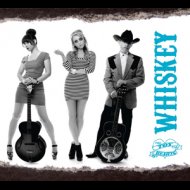
The fourth album by the Birmingham father and daughter trio further marks their expansion from bluegrass into gypsy jazz, western swing and old time country, the opening self-penned Bring On The Swing! seeing Hannah and Sophia Johnson giving Imelda May and the Puppini Sisters a run for their money.
Recorded in their hometown studio but edited and mixed in Nashville (where Eamon McLoughlin also added his fiddle parts), it's their finest, smoothest accomplishment yet, building on the crossover potential of the last album's Femme Fatale and The Captain download singles with the band's fiddle backed, brushed drums and steel Louisiana Hayride era title track sounding as though it would be right at home on an Emmylou Harris album.
It's a heady half and half of originals and covers, though only those in the know would be able to tell them apart. The latter turn up a sprightly version of I Hear You Talkin', not the Faron Young number but smoky voiced 40s/50s Texas songwriter Cindy Walker (who also penned Dream Baby, You Don't Know Me and Distant Drums) alongside a sashaying swing around Bob Wills nugget Ridin' On Down and a frisky romp through Moon Mullican's Lonesome Hearted Blues with some fine picking from Stewart Johnson and Hannah mixing spice in with the sweet.
On top of which comes a cool but hot itchy foot treatment of Ronnie Tillman's rockabilly Big Fool with John Potter on double bass and consummate loose limbed drumming by Dean Berseford, and, switching liquors, Harry Burke's Me And My Gin which, while perhaps not as 100% proof as the wailing blues Bessie Smith original, is still a potent tonic with some fine barrelhouse piano courtesy Danny McCormack.
The remaining cover is of relatively newer vintage, being a faithful version of Thunderstorms and Neon Signs, the title track of Wayne Hancock's 1995 debut, although Hannah sounds a little less like a yodelly Hank Williams than he does.
Of the other four band numbers, Mary Jane's cat house blues has Hannah getting slinky, purring and flashing claws, a hot club rolling Stutter Blues rides the rails of scraping fiddle and a nimble Stewart solo, Pass The Jack's the album's only real nod to the bluegrass that first set their wheels rolling and, with a catchy melody hook and tasty twangy guitar from Sophia, the soft chugging Another Right Note takes them into the sort of effortless country pop Allison Krauss forgot how to do some years ago.
Over the past six years, they've been bolstering their musicianship, songwriting and reputation to the point where, if they continue making music like this, fully warrant becoming the first British inductees to the Country Music Hall of Fame.
Mike Davies April 2012
Having recorded their first two albums in more or less their own backyard, it's good to see the Birmingham bluegrass outfit getting to make the third in their spiritual home of Nashville. On the downside, costs and distance meant only the Johnson sisters, Sophie and Hannah, and their father Stewart could make the trip while regular fiddle player Howard Gregory and current (I assume) double bassist Lauren Rogers stayed home. On the upside, that meant their musical places were taken respectively by Cadillac Sky's Ross Holmes and eight time IBMA bass player of the year Missy Raines. My ears have no complaints.
Produced by Holmes' Cadillac Sky colleague David Mayfield who also adds mellotron, guitars and harmonies, with Jesse Cobb of Infamous Stringdusters providing second mandolin and yet another Cadillac Sky member, Bryan Simpson duetting on the title track, it's a sizzling acoustic collection of blues, bluegrass, Gypsy jazz and swing with all tracks sell-penned (even if they borrow the title of old tyme country Tear Stained Letter from Richard Thompson) save for Carolina by Nick Forster of 80s bluegrass outfit Hot Rize.
Whether it was being so close to the well or just natural progression, but this is their best work yet, Hannah's smoky, sultry vocals both confidently relaxed and sounding like she's never strayed more than a spit from an Appalachian cabin. Honestly, listening to opening track Good For Me is enough to make Po Girl throw in the towel and work diners.
Although there's only one fully fledged instrumental, Creek Bluff Drive, plenty of the numbers afford opportunity for the trio to demonstrate their dexterity, Stewart's banjo, Sophia's Django-esque guitar and Holmes' fiddle scorching friction marks across the playful This Little Kitty.
Deftly balancing swinging hot club jazz (Tequila And High Heels with its dazzling dobro), old school Western swing (She Got There First) and sprightly bluegrass breakdowns (The Beck Is Rising) with the folk roots balladry of the heartachingly lovely The Captain, they fully deserves to be the first British act nominated for a bluegrass Grammy. We should consider ourselves lucky, Nashville didn't confiscate their passports so they couldn't ever leave!
www.toyhearts.co.uk
www.myspace.com/thetoyhearts
Mike Davies September 2010
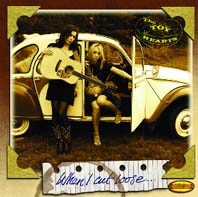
Fronted by the Johnson sisters, Hannah (lead vocal and mandolin) and Sophia (guitar/harmonies) with dad Stewart on banjo and dobro, Howard Gregory again handling fiddle duties and Lauren Rogers taking over double bass, this is a fine consolidation of the Birmingham old school bluegrass outfit's If The Blues Come Calling debut. This time with all 11 tracks self-penned tales of love's ups and downs and each providing perfect settings for their vocal and instrumental dazzle.
Sounding like they've spent their lives in the Kentucky hills rather than Kings Heath, they open the set with Stronger, a title that aptly sums up Hannah's vocals that (as the title track also demonstrates) are raunchier than before.
Girl In Each State showcases the sort of picking that would make Ricky Scaggs envious while The Angels Sing To Me (namechecking Bill Monroe's high lonesome sound) finds them waltzing around the honky tonk floor with beer in one hand and a Bible in the other, Giving You Back Your Troubles hits the hot club and jazz-blues notes, Montepellier Street and Girl That You Can't Fool swing with Grapelli grooves and Fast Raging River conjures thoughts of early Johnny Cash recast as a bluegrass Lucinda Williams.
The musicianship here is breathtaking, the interplay between Stewart, Howard and Hannah quite simply some of the hottest bluegrass to be found in the genre, and when they let rip and set the strings smoking on Sly North Wind and Gregory squeezes sparks from his fiddle on I'll Keep Waiting, you can almost hear Monroe bestowing his blessing from the great beyond.
Mike Davies August 2008
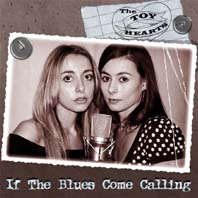
Hailing from Kings Heath in Birmingham (UK, not Alabama), the Toy Hearts came together in 2001 fronted by lead singer Hannah Johnson and guitarist/harmony sister Sophia (who's also part of flamenco guitar outfit Trio Gitano), daughters of top dobro/banjo player and fellow founding member Stewart. The current line up also features Jamie Fekete on mandolin, Howard Gregory on fiddle and double bassist Chris Shirley.
Inspired by and drawing on the music of Bill Monroe (whose songs provides their name) and Bob Wills with its influences of Western Swing, jazz and country they've been scorching up the UK bluegrass scene for a while but this is their first recording. With nine of the eleven tracks self-penned, mixing up instrumentals and songs, this sounds so authentic it could have come straight from the Kentucky mountains, dragging a still behind it.
Sophia is one hot flat picker, fingers positively burning up the frets, and although not yet in the Alison Krauss league, Hannah's voice swings fluidly from coy sweetness (On My Way Home) to sexy raunch (Leave This Heart Alone), at times (as on the lovely hot club sounding cover of Bob Wills's Right Or Wrong) evocative of a young Patsy Cline while the sister's harmonies lick a tingle down the spine.
It goes without saying that their father's sprightly and dazzling banjo and dobro work provides the album's backbone, but all of the musicians can hold their own in any illustrious company; the interplay of fiddle and banjo on Piccadilly Special a treat to the ears with Gregory really coming into his own on the sassy The Ocean Wide. Hav0ing tore up bluegrass chestnut John Henry, they round things off with the dreamy hay ride dancefloor swayer Restless, stars twinkling overhead and hula girls floating off on the clouds; these Hearts beat to an irresistible rhythm.
www.toyhearts.co.uk
www.myspace.com/thetoyhearts
Mike Davies, Sept 2006
The Hip's sound is honest and rather comfortable, rich and full, built around a crashing but intelligent twin-axe line and a solid punchy backbeat, while the extra touches of orchestration and keyboards employed at times here would I'd guess be a trademark of producer Bob Rock. Sometimes the band themselves appear a little swamped, yet at other times the fulsome arrangements give the songs an epic grandeur that they don't entirely always deserve. Having not heard The Hip's previous work I can only consider We Are The Same in isolation, but the band's accessible-roots style, which variously owes something to Tom Petty, U2 and maybe Counting Crows, with hints of ELO even, is certainly attractive and makes a big impression, especially on more driven material like Frozen In My Tracks and the broad canvas of Now The Struggle has A Name, not to mention the more ambitious nine-minute Depression Suite. The finale Country Day perhaps best sums up The Hip's approach and scale.
The Hip's songs are self-styled "odes to Everyman", concerned with universal experiences of humanity on their native plains and open spaces, but these don't always convince when a vehicle for plodding stadium-rock gestures or ominous disco, and so perhaps the most pleasing moments are those where the band blend, or alternate, moments of quieter folky passion with hard-nosed, forthright bursts of lead guitar, as on Queen Of The Furrows. Having said that, Love Is A First, although evidently a full-on rock number, is a successful departure from the country-rock conventions. Even so, "Bring on the requisite strangeness", they sing on The Depression Suite: I rather like that notion, and I'd echo that call.
David Kidman July 2009
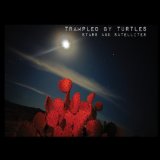
Minnesota ain't perhaps the first place that comes to mind when you think bluegrass, but this hard-touring five-piece from Duluth play and sing as though steeped in the tradition. Even so, while the strength and power of their musical voice is informed by genre hallmarks like hot picking and keenly managed vocal harmonies, there's a thoroughly contemporary feel to both their writing and their sense of instrumental colour and proportion, the latter's sophisticated textures incorporating some often quite gorgeous layerings.
This is the band's sixth album and stands in deliberate contrast to album five (Palomino, which was recorded all over the place and captured the sound and spirit of a band on the road) in that it sets out to represent a solid and unified piece of work. Although it has its turbo-charged moments, there's markedly less in the way of relentless, driven fast-paced material than its predecessors, and a majority of the disc's 11 self-penned (mostly the work of guitarist Dave Simonett) tracks are taken at a steady pace or bathed in reflective melancholy.
Opener Midnight On The Interstate is a case in point, as is the lyrical High Water, while Alone makes even fuller use of the creative combination and juxtaposition of mandolin and banjo riffs with sumptuous multitracked fiddle and viola/da gamba ostinati (rather reminiscent of early ELO). Singularly tight picking and excellent control of internal dynamics are a feature both of higher-octane cuts like Walt Whitman and breakneck instrumentals Rise and Don't Look Down, and the more relaxed-paced items such as Widower's Heart and Beautiful, and the band's sense of ensemble is faultless.
But there's so much more to celebrate in TbT's special instrumental blend and the inventive individual and collective expertise demonstrated by fiddle maestro Ryan Young, mando ace Erik Berry, banjo man Dave Carroll, guitarist Dave Simonett and bassist Tim Saxhaug.
David Kidman May 2013Transmissionary Six - Go Fast For Cheap (Normal)
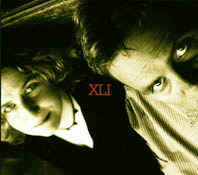
Originally recorded as a floating pirate radio acoustic session as a present for their webzine fans, then touched up and remixed for limited commercial release, this brings together Walkabouts drummer Terri Moeller on vocals, Willard Grant Conspiracy founder Paul Austin on guitar and Jesse Sykes's violinist Anne Marie Ruljancich with Kevin Suggs providing mournful pedal steel for 11 tracks (though one's a radio intro and the nine minute Shortwave Goodbye includes six minutes of static) of muted and spooked Americana, the blend of guitar and percussion on I Believe In You and Purely Medicinal also showing their feel for 60s folk psychedelia. Oh yes, there's also the unexpected contribution of a cat.
With six taken from their self-titled studio album and I assume the others trailing the upcoming, er, Spooked, the result's not a million miles away from the Junkies' Trinity Sessions crossed with the Red House Painters and the Walkabouts ability to conjure the sound of nights under wide open desert skies, all put to the service of a David Lynch soundtrack. Moeller's husked, breathy and tremulously dusky voice curl around ruminative guitar lines and broodingly melancholic melodies. These are tales plucked from the darkness, haunted ghosts of lovers and losers, veined with desolation, regret, and despair, a world where "nobody in this room is going to Heaven, nobody in this room is going to hell," and "where everyone's waiting around for the real big game." One to listen to in splendid solitude.
Mike Davies
Had the press blurb not listed the line-up, on several tracks I could have easily persuaded that this check-shirted Manchester six piece was actually Stephen Duffy and The Lilac Time in disguise. From which you'll gather they make shimmering cosmic country-folk pop with rippling melodies, softly burred vocals and jangling guitars. Recorded in New York with producers Eric Amble and Tim Hatfield whose CV includes Steave Earle and Ryan Adams, with instrumentation that includes banjo, pump organ and accordion, they do it rather well too.
I have to say though, that the refrain of opening track and single Only Waiting does rather sail close to The Beatles' Blackbird and (without album notes it's hard to know who) the lead vocal is a little too strangled and whiny for my ears.
But that's a minor quibble in the light of what follows, particular standout favourites having to include Angel Of The Morning (no, not that one), Diamond Flighted Arrow, Fragments Of Green and the 60s psychedelic folk-pop Desolate Icicle which, bizarrely, puts me in mind of a cross between Keith West and the Idle Race. They were winners of this year's Glastonbury New Talent, earning themselves the opening slot on the Other Stage. You can be pretty sure they'll be higher up the list next time they appear.
www.thetravellingband.com
www.myspace.com/thetravellingband
Mike Davies November 2008
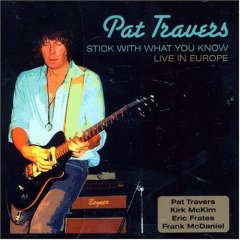
Life In London is an outstanding track from his back catalogue and he has lost none of his power in the intervening period. This takes me back to my late teens when I would eagerly wait for each new Pat Travers album to come out. A high octane start which will not disappoint Travers' fans. Crash And Burn is not a sign of what is to come and although his voice has seen a bit of action over the years there's not much sign of it. He is still a top guitarist as well as he shows on a trademark wailing solo. I Don't Care is a traditional rocker with a rebellious theme and the headbanging really starts by the time we get to Heat In The Street and Pat starts to warm to the task. Elijah is storming rock with soaring guitar and the Jimi Hendrix classic, Red House, gets a first play by Travers. This has been covered by many, including Albert King, and this is as good a version as any that I have heard. Travers is a very expressive guitarist and it is this that has kept him on top for so long. Another cover follows and this time it is Robert Johnson's If I Had Possession Over Judgement Day. He rocks this up big time for a fantastic track. The third cover in a row is an Albert King song, Oh Pretty Woman, most famously covered by Gary Moore. How good would it be to have the two of them trade licks on this? Travers' version is powerful, as you would expect. The strangely titled PT Nutz Aka Linus And Lucy gives the bass player a bit of the spotlight. It's a rocking instrumental with manic drumming and shows his latest band to be a tight unit. Snortin' Whiskey doesn't conjure up anything other than hard rock but, in fact, it's a blues, albeit on the hard rock side. Snortin' whiskey and drinkin' cocaine, don't you just love the bad boys? Boom Boom (Out Go The Lights) is an old favourite of mine and one of the songs that turned me on to the blues. He rocks up the intro but when he gets into the song, it is marvellous. There is a big audience participation on this one as he puts in an electric performance. This has dual guitars throughout and he comes back for two encores as the audience bays for more. The first of these is PT's Solo Time. He gets all the pedals out for this one and he makes his guitar produce all kinds of sounds, including violin at one point. He has to be indulged, don't you know! He closes with the third of the associated Albert King songs, Born Under A Bad Sign. He tries to keep on familiar tracks with this one but he can't help himself and before long he's off into one of his solos.
Not many are better and even less have lasted longer - young pretenders, you have just had your ass kicked.
David Blue December 2007
Travis - The Invisible Band (Independiente)

The Man Who has been such a constant chart presence it comes as a surprise to find its time for a new album from Fran Healy and the gang. And, on first, second play even, you're wondering if they've blown it. With no Turn or Driftwood putting an instant armlock on your ears, maybe one of those new Travis outfits will prove to live up to the tag. But by the third play, it's seeping into your pores beginning with the chorus of Sing's country inflected weary pop that's now hard to dislodge from your hum bank. Second track Dear Diary refutes any suggestions that Healy may have signed on for the rock n roll animal party lifestyle. Melancholic introspection remains his mood of choice, forlorn vocals picking the broken bones of relationships on the rocks with The Cage and the truly black Last Train but occasionally looking up to catch a glimpse of sunlight streaming through the bedsit window on Side, the disarmingly lovestruck Flowers In The Window and Follow The Light. When it comes down to it, it's more of the same. Probably not as big a seller, probably not launching as many big hit singles, but why break what doesn't need fixing. And any band that can turn something called The Humpty Dumpty Love Song into the soundtrack for a nation of student heartbreaks really does deserve to be cherished.
Mike Davies
The Tom Travis Bluegrass Incident - A Small Patch Of Blue (No label)
Recorded in Kilkenny, Ireland, and mastered in Nashville, comes this latest CD from "Mr. Bluegrass UK", veteran of the British bluegrass scene, Tom Travis. Some of you may recall the duo Tom & Smiley from the 60s folk scene? Well that was Tom… Sure, Tom's charismatic vocals and trademark driving guitar still take the lead here, but he enjoys spirited backing from his band, which comprises some of Europe's finest bluegrass musicians (fiddler Bob Winquist, banjoist Bill Forster, mandolinist Dave Howard with Clem O'Brien and Brian Booth). In a departure from his previous recordings, Tom's written all 17 tracks for this album himself, and in them he demonstrates his mastery of the idiom in all its guises. The acapella gospel of We Will Be Kind includes some interesting harmonic adventures and defies predictability, as does the mixed-tempo approach of Way To Go! (inspired, says Tom, by the work of the Stanley Brothers). Some songs (Oysters On Beale Street, Wood Smoke, David's Song) are arguably closer to mainstream romantic country than strictly bluegrass. Not all of these songs completely satisfy, at least on initial plays. And, attractive though many of the songs undeniably are, there were times when I thought the strong timbre of Tom's voice just a touch too loud, even forceful, for bluegrass; occasionally too (as on Hello!) the jaunty delivery seemed almost too perky for its own good, and the good-humour aspects a trifle laboured (The Pickup, Little Does She Know). Having said that, I certainly liked this album a lot more once I'd got used to Tom's singing style. The two instrumental cuts (a sizzling-tempo Chinese Whispers and an altogether more relaxed Waltz For One) prove genuinely invigorating. For at least here I don't get the pervasive impression of bland auto-pilot that one all too often gets with contemporary bluegrass albums – to his credit, Tom conveys true individuality while working recognisably within a time-honoured, tried-and-tested template.
David Kidman
The Cheshire-based Trebuchet (named after an obscure medieval European siege weapon, apparently!) turns out to be a trio of musicians experienced in playing traditional folk music with jazz and early music influences; it comprises Keith Carter-Harris (guitar, bouzouki), Steve Mansfield (flute, whistles, recorders, English concertina) and Mark Seyler (5- and 4-string electric fiddles), and though they all sing Keith takes lead vocal duties. Trebuchet's music is described as "tradition-based but forward-looking" , tho' this tag doesn't quite square with what I hear on Salvo, the trio's debut CD. Having said that, it's still a very appealing disc whose music has plenty of positive features, not least the musicians' evident commitment and expertise. Some of the instrumental colourings and blends they achieve are quite unusual too; this is I suspect at least partly due to the specific instruments Mark uses (a five-string electric fiddle and a four-string model at cello pitch), while it also helps that the musicians have an intuitive ear for achieving a full sound with minimal resources. In this latter regard there's a certain aura of 70s' experimental-folk about much of the music on this disc, an impression betrayed also by a peek at the subject matter they tackle, from a retelling of the Death And The Lady ballad to the Tolkienesque Wizard's Will to the rather would-be-saltiness of Down To The Sea. Once you've got a handle on Trebuchet, in fact, you'll find they have quite a distinctive sound, even though there were still times when I was reminded (in that respect anyway, rather than lyric-wise) of Forest, Prism, Amazing Blondel, and among more recent outfits Napper, Bliss in particular (but that's no bad thing is it?). Four out of the eleven tracks are purely instrumental, ranging from ingenious concoctions like Martya (a set of English tunes with a definite Bulgarian edge) and Spootiskerry (a medley combining 18th century, Scottish and Cheshire sources) to an acceptable enough recasting of the ubiquitous Sheebeg & Sheemore. Of the vocal tracks, the "cuckoo in the nest" is a take on the old Inkspots' number I Don't Want To Set The World On Fire, which, though quite imaginatively paired with a schottische "acquired from Pyewackett", in the end lives up to the intent signalled by its title due to the slightly mannered nature of the singing. On some other tracks (eg Tom The Butcher, Lord Robson) the singing is perhaps just a touch abrasive or over-emphatic in some of its phrasing: maybe it's just a surfeit of enthusiasm, but either way it's not a serious criticism. In that respect Trebuchet come across a bit like one of those perfectly worthy 1970s second-string folk acts that might have appeared on one of the small independent labels such as Cottage, but with a greater degree of technical competency. Lest that sound like I'm damning with faint praise, that's not my intention, for I much enjoyed Trebuchet's music and I think they've a lot to offer.
David Kidman December 2006
Sometimes one is down, sometimes one is up. I'm usually down, liking the darker side of music. This new CD by the very interesting band Treebeard does 'the stuff' quite well. The self penned songs by Mr McMahon are splendidly self searching - ever killed a unicorn lately?
The instrumental tracks, well known jigs and reels from the folkrock cannon, are carried off vith verve and passion ... but it's the covers of, in my humble opinion, some fantastic songs that makes this CD a total cracker. U2's Still Haven't found What I'm Looking For - excelent harmonies. REM's - The End Of The World - works a treat. It's nice to see a Rory Gallager song included - Barley and Grape Vine - cool arrangement. 'Nothing ever happens, nothing at all' from that Scottish band - we love this song, and this performance is spot on. JRRT - Oh my - JRRT - Far over the Misty Mountain great words (of course) works a treat. (Read The Hobbit)
If a band has to do The Hangman and the Papist and The Wreck of the Edmund Fitzgerald it must be a mighty brave band - good try folks, but not quite there - but thanks for trying:) Other than the two songs mentioned above, and I'm only critical because I love the originals so much, this is a damn fine album.
Jon Hall
Tree By Leaf is a New England trio based around the writing and singing of siblings Garrett and Siiri Soucy, and much of their special appeal derives from the synergy between those two quite different singing voices, while third member, keyboardist Clifford Young, adds distinctive flavourings of his own to the mix. Tree By Leaf have grown up musically over the past six or seven years through four albums of increasing sophistication, yet all the while retaining an attractive simplicity of expression that works best when they're at their least frenetic and keep things stripped down to relative essentials, as here on the atmospheric velvety Americana of Chicago At Night. Album number five, There Is A Vine, swings like a pendulum in more or less equal equilibrium between Garrett and Siiri taking lead vocal, and this aspect characterises the songs themselves as much as the singer, with Garrett's being more frantic and more overtly-involved, Siiri's more languid and creepily memorable. It's a bit like the contrast you get with the Handsome Family, but not as extreme or as gothic. Having said that, it's Siiri's leads that linger in the mind longest: Believe It is bewitching gentle strummy psych-pop, and Fraud seems to hark back to early-music styling, while Prince Or Pauper's a touch Gillian Welch but with more than a touch of flutey eastern exoticism. On Garrett's leads it's a different story, for as far as the writing goes, Garrett's juddery, nervy delivery reflects his feelings as he strives to put over his desperation, fear and oppression; sometimes (as on the untypically pushy opener Over And Under) it feels unduly over-emoted, but the good thing is that Garrett nearly always manages to communicate precisely those feelings. His songs are couched in imagery which can be oblique, for much of the time overtly religious in tone, and if I'm totally honest I'd express a reservation about the last few songs, the final two (and the bonus track Doxology) in particular, which don't quite square with the more universal vision of the rest of the set. Musically, Tree By Leaf veer between alt-country, folk and indie, yet considering the precision and delicacy of the band's occasionally quirky instrumentation, the rhythmic impetus is surprisingly primal (congrats to drummer Eric Sanders) and tho' it sometimes seems a bit clumsy everything's actually well in place and the effect is as spontaneously hypnotic as it is controlled. The above minor reservations aside, then, Tree By Leaf make pretty haunting music, and they repay patient further investigation.
David Kidman April 2007
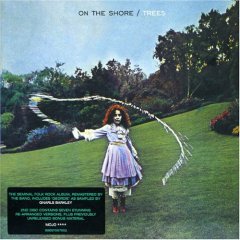
This has to be one of the candidates for reissue of the year! Barely a footnote in the annals of folk-rock, the band Trees came and went largely unnoticed by the majority of music-lovers, whether folkies or fans of the "progressive underground" scene. Trees formed in 1969, but by 1972 they'd disbanded – not, however, before they'd recorded two monumental and genuinely groundbreaking LPs for CBS, The Garden Of Jane Delawney and On The Shore.
These albums may loosely be termed folk-rock or psych-folk, but in truth they had an ambience and sensibility that was unique to themselves; sure, there were elements of the Steeleye approach to transmutation of traditional source material, and they also audibly had aspects in common (at any rate instrumentally) with the rocked-up stance of Fairport, but there was an ethereal mien, an almost other-worldly demeanour to Trees' music that was (and remains) hard to describe, not to mention well-nigh-impossible to replicate. Searching for clues to the band's originality leads us to its genesis, an almost accidental coming-together through a network of friends.
Teenage folk enthusiast and guitarist David Costa was heavily influenced by Martin Carthy, while lead guitarist Barry Clarke took on board the eclectic stylings of Davy Graham; singer Celia Humphris was blessed with a light and pure timbre with a kind of unearthly overtone perfectly suited to the mysterious and exciting supernatural qualities of the traditional ballads; the lineup was completed by songwriting bassist Bias Boshell and world-traveller drummer Unwin Brown. Each member thus brought something distinctive to the mix, and the potentially wild eclecticism gelled in to something quite special; as the excellent booklet notes for this new reissue posit, Trees did what they did, in an era when anything seemed possible and, quoting Bias from his honest contribution to the notes, "the tradition was alive and (freely) subject to all and any other influences".
Only last year, indeed, a key passage from an On The Shore track (Geordie) was sampled by chart-toppers Gnarls Barkley, folk being declared the "new rare groove" by Time Out mag… ho hum…! But you could say that Trees, after all, "were only sampling too" in their own way and with such resources as were available to them in 1970. Back in the land of reality, though, just you take a listen to the original Trees masterwork and hey ho, it doesn't sound at all dated, but fresh and pioneering in its musical shifts and turns. The band's almost accidental musical vision of the developing tradition was nevertheless even at the stage of their debut album well-developed, with vital elements such as the acoustic-electric guitar conflagration and the force of Bias' own quasi-traditional songs already in place amongst the then-inevitable but still intensely attractive pastoral whimsy.
By the time the band came to record On The Shore, however, even those remarkable features had moved on apace, the songs of innocence swiftly becoming songs of experience if you like, with an astonishing assuredness and maturity extending to all aspects of Trees' art. Perhaps the most stunning illustration of Trees at their finest is the their seven-minute rendition of Streets Of Derry, which builds from a sensitive narrative to a seriously spine-tingling guitar-duel coda, but the entire LP is chock-full of fabulous, if wilfully opaque moments that emphatically reward your repeated (and prolonged) aural investigation. Its inherent elegances hide an inner strength that's born of intense commitment, and this is perhaps no more apparent than on the band's epic, sprawling (ten-minute) wave-tossed treatment of Cyril Tawney's Sally Free And Easy, whose sense of spontaneity and extraordinarily organic onward momentum shows just how far the band had travelled since the episodic version of Lady Margaret that graced a comparable pole position as extended Side One closer-cum-showpiece on their debut LP.
Trees' interpretation of Polly On The Shore, which closes On The Shore, is notable for its incredible sense of numbed resignation and subliminal tension amidst the deliberate, "plodding" inevitability – elements which would be seen as deficiencies in another band's rendition but here they're turned to the narrative's advantage. Between those tracks (ie the remainder of the original Side Two), On The Shore may seem a bit of a stylistic ragbag, with the enigmatic Fool, a truncated medieval tune, the strange Jekyll-&-Hyde nature of While The Iron Is Hot (rippling faux-chamber-folkery turns into driving rock axework) and the oldtime-country Little Sadie framing the brilliantly controlled passion of the aforementioned Geordie; and yet it all hangs together curiously logically when listened to in sequence now.
Now, as if having this heady 49-minute original LP in spruced-up remastered sound on this new reissue weren't enough, the bonus second disc is a real revelation and worth the outlay even if you have the earlier (BGO) CD issue of the album. This second disc presents what are termed "refurbished" versions of seven of the eleven album tracks, for which the original extant eight-track tapes have been remixed and in some areas augmented to reflect the band's continuing experiments with keyboard textures (becoming increasingly important to their music at the time of the album's release) and additional vocal harmonies. In the main, these changes turn out to be highly significant. For instance, the already sinister drama of Murdoch has been drawn into another dimension entirely by the addition of a brooding Welsh-valleys church-organ part; Fool gains from the exhumation of a jazzy piano break which had hitherto lain buried under layers of 12-string guitar, and Little Sadie emerges altogether leaner and arguably more satisfying, while extra vocals and a creative piano part imparts Polly On The Shore with a new sense of unity with the rest of the LP.
I'm not sure the remix process is quite all gain, though: the addition of sampled sweeping eastern-style cellos on Streets Of Derry may bring an added sense of majesty to the coda but to my mind this dilutes something of the coruscating impact of the guitar duel. Anyway, the successes of these remixed versions vastly outweigh my minor reservations. The final pair of tracks on Disc 2 are previously unreleased cuts, and valuable to have: Forest Fire (one of Bias's anthemic compositions) comes from a 1971 BBC radio session (hence the unavoidably fluttery nature of the recording), while Little Black Cloud is an original demo of an early Bias song.
Both Trees albums were re-released by BGO a few years ago, and I'm not sure whether Garden is still available or whether Sony are planning their own enhanced reissue, but whatever, it's worth getting a copy, for it's that important an album. Meanwhile, do get this exceptional new edition of On The Shore while you still can; it's one of the very few albums outside of the accepted canon of psych-folk and folk-rock classics that I'd class among the seminal records of their era and thus unreservedly recommend for a place on your posterity shelf (outside which exalted bracket more transient addictions and trends may come and go as they please).
David Kidman July 2007
The Glasgow quartet's third album in as many years, save for Cold Heart Of Mine it doesn't have quite the same Americana influences of the previous Abandoned Love, but, led by drummer Alex Neilson and with classically trained soprano Lavinia Blackwell on vocals, the electric and acoustic mix of folk rock, Early music, British trad, and 60s psychedelia remains present and correct.
Opener Just as The Rainbow only lacks the skirl of pipes to be a rousing Scottish slow march, a celebratory To See You Again is the sort of crumhorn and clavichord rock n roller that makes you want to find the nearest maypole while All My Favourite Mistakes is a pysch folk stomp duet that imagines early Fairport jamming with McGuinn and the Grateful Dead at some 60s West Coast happening.
Elsewhere, Dylan influences are filtered into a gavotte for Colour Of Night, the dramatic Where Do I Go From You? spans the centuries to reimagine the minstrel Blondel as Jim Steinman and the piano, cello and violin playout of doomed romance Torn Between Loves is pure baroque fugue.
Given the medieval touches and Blackwell's Sandy Dennyish tones, comparisons to Fotheringay are inevitable, but band and album are also informed by other pillars of 60s English electric folk with strong hints of The Incredible String Band, Gryphon, Dr Strangely Strange, Steeleye Span, Eclection and Pentangle, although even the latter's jazzy inclinations never extended to the sort of brass and bass thrumming and free improvisation freak out of the surging Otley Rock Oracle, a song named, don't you know, for a small Yorkshire market town.
Neilson's Yorkshire roots also surface on the rather lovely slow swaying dance tune style of Goathland with its warm Northern brass and real ale reference while they see the album out with the lovely sad New Year's Eve, The Loneliest Night of the Year, a song which deserves to take its place alongside Fairytale of New York as the finest bittersweet seasonal year end anthems.
The only reservation is a production that tends to make things sound somewhat fuzzy and sees Blackwell's voice a little too far back in the mix, though, if I remember What We Did On Our Holidays correctly, I guess that's in authentic keeping with the sound of 60s English folk rock too.
www.myspace.com/tremblingbells
Mike Davies March 2011
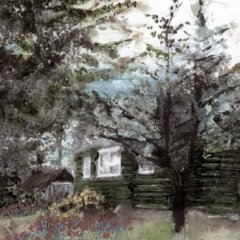
Signed to Damon Albarn's label and put together by drummer and singer-songwriter, Alex Neilson, this Glasgow quartet is a highly intriguing proposition. Featuring the soprano tones of singer Lavinia Blackwall and with instrumentation that includes strings, trombones and organ, it draws deeply on English and Scottish folk traditions and, in Neilson's own words, looks to "reanimate the hidden, mythic landscapes of Yorkshire and Glasgow via a love of canonical rock, Earlie Musik and traditional folk."
It doesn't always come off. Neilson's offkey singing mars the a capella duet Seven Years A Teardrop and, a bit of a rattling clattery affair, The End Is The Beginning Born Knowing's pottage of discordant jazz, 60s prog folk, Captain Beefheart, pagan chant, wailing vocals, and Northern brass may be inventive but it makes for uncomfortable listening. Likewise, although the medieval and march beat When I Was Young is musically finely crafted, it starts at high pitch and doesn't really go anywhere.
However, with obvious nods to the Incredible String Band and Dr Strangely Strange in the structure and phrasings of Your Head Is The House Of Your Tongue and the provocatively titled wheezing I Took To You (Like Christ To Wood), the positives far outweigh any niggles.
Opening track, I Listed All Of The Velvet Lessons, is a personal favourite with Blackwall's sharp double tracked warble, droning church organ (sounding like pipes), part Yorkshire choral, part Appalachian chapel. But other highlights would have to include the liltingly anthemic Willows of Carbeth (which only lacks a skirling piper for full effect), Garlands Of Stars where a trad folk ballad skin is scraped by abrasive distorted guitar and goblin brass, and, designed for dusk gathering evenings by a tarn on a heather covered hillside, the hymnal Summer's Waning. Listening takes a bit of work to appreciate what they have to offer, but persistence brings rewards and they certainly don't sound like any other folk act you've encountered in recent years.
www.myspace.com/tremblingbells
Mike Davies June 2009
Two years, three day jobs and one child after the release of debut album Sweetwater, Caitlin Cary, Lynn Blakey and Tonya Lamm have got back together for a second album, recording not in native North Carolina but in London with guest musicians Nick Lowe, Geraint Watkins and Bill Kirchen all dropping by to add their contributions.
Its title referring to the girls' nicknames (though they're interchangeable) as well as three specific songs (Shade Trees In Bloom, Red and the Watkins co-penned My Love), it doesn't stray far from the debut's old school Americana with its blend of jazz, folk, pop and country. No problem there though, especially not when delivered in their fabulous wistful harmonies.
A dreamy 60s softly rolling pop flavoured nugget My Love is one of three non-originals here, the others being opening Appalachian gospel stunner Drop Me Down from Charlotte outfit Lou Ford and a pedal-steel rippled cover of Johnny Carver turntable hit If You Think That It's All Right. Otherwise, individually or collaborative, it's all Blakey and Cary's material, embracing the former's blues tinged Only Broken and the plaintively gorgeous Slips So Easily, her teaming with Cary on the waltzingly cutting lost love Red (sounding not unlike something Kirsty MacColl might have done), and the latter's own 400 Flamingos.
Reflective, even lazily laid back at times (the brushed slow dance Stone Love Song) it does tend to stick to its mid-tempo pacing and you wish they'd pick up the pace a bit more often as they do on the skiffly Man Of The People, but, really, faced with songs of such quality and voice of such purity and grace you'd be churlish to gripe.
Mike Davies, April 2006
Tres Chicas - Sweetwater (Yep Roc)
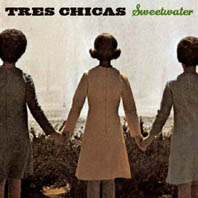
Formed in 1999 as an ad hoc project, the North Carolina femme trio have a fairly illustrious pedigree with Lynn Blakey a former member of Let's Active and Oh Ok and now frontwoman for Glory Fountain, Tonya Lamm a founding member of the now defunct Hazeldine and Catlin Cary, of course, the one time Whiskeytown violinist who's carved a nifty solo career of her own.
Produced by Chris Stamey, who provides bass, they blend their own material with old country covers to produce a yearning close harmony sound that's been called a female anwer to The Thorns. Frankly, they're actually better and a more worthy comparison would be the collaborative recordings of Harris, Ronstadt and Parton.
Taking the cover material first, you'll find a sassy Nashville rocking take on Loretta Lynn's Deep As Your Pocket, George Jones's barroom gospel handclapper Take The Devil Out Of Me and, on a more contemporary note, a border country mandolin and banjo accompanied version of Lucinda Williams's Am I Too Blue.
It's testament to their individual writing skills though that the best material here is all self-penned. Predominantly strummed acoustic singed love songs about cheating lovers and mistakes made, Blakey opens proceedings with two of the album's highlights, the title track and Heartbeat, a song Roy Orbison would surely have recorded had he been Emmylou Harris. She also shares credits with her fellow Chicas on the regret hued When Was The Last Time, while, contributing three co-written numbers, Lamm's Foot of the Bed honky tonk waltz round desire and a desire for romance is another gem. Desire rears its head again on, er, Desire, Cary's co-write with Stamey, a song that boasts the great line "I asked Desire to consider a threesome, She told me she'd give it a try." It's Cary and Lamm who provide perhaps the saddest song here, In A While with its portrait of time passing, world weary disappointment and loneliness, aching with images of coming home with the smell of the bar in your hair, sitting by the phone and little-girl wishes as dead as the pony in the ground. Hearts don't break much better than that.
Mike Davies
Emma Tricca - Gypsies and Red Chairs (Fairylands)
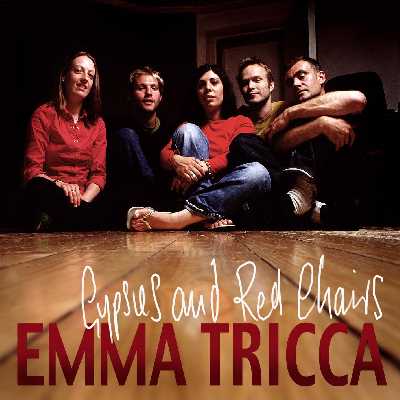
Born in Italy, relocated to Oxford and now based in London, singer-songwriter guitarist Tricca was discovered by John Renbourn, been praised by Carolyn Hester, and compared to Joan Baez. By which you should figure that she's pretty much into the folk scene, mixing in English trad moods with those of Greenwich Village, That she is, but she's given her roots an alluring twist with the use of unexpected instruments, violin, cello and both Indian and African percussion painting her arrangements with some mesmerising and evocative colours, most notably on An Echo where Celtic fiddle and tablas join forces to striking effect.
Her dark pure voice too is unusual. Baez yes, but also Tanita Tikaram, Gay Woods, June Tabor and Judy Collins in her Brecht-Weill mood, the tendency to soar to high notes and hint of an accent giving it almost an otherworldly flavour of cobwebbed leafy glades where unicorns and sprites might lurk. She's a damn good guitarist too, her folk, jazz and world style well versed in the influences of Drake and Renbourn.
A nervy and slightly spooked trad Lily of the West is the only non-original here, and while Tricca's poetry inclined writing (love songs mostly) sometimes feels awkward on the page translated into song with the benefit of the emotional resonances in the playing and performance, she can, on the hauntingly wonderful Where The Yellow Runs Free, make lines like "she said 'there are plates to wash in the sink and there are people in prison locked up just as in a film'" make your heart tumble.
Mike Davies
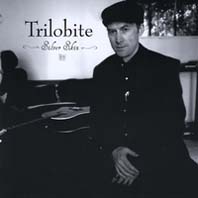
Obsessive Handsome Family completists might care to know that klezmer lurching opening song For The Empress features Brett Sparks on saw. In addition, brother Darrell provides the album's bass and harmonica. I mention this because it's the sort of record likely to appeal to Family followers with its sparse backwoods folk and blues vibe, organic instrumentation (including a 30s pump organ) and a plethora of songs about murder and death.
Although other musicians help out, Trilobite is actually a vehicle for New Mexico singer-songwriter Mark Ray Lewis, a Stanford graduate and award winning short story writer and author of autobiographical novel Long Sad River. He's named his band after the three lobed marine arthropods, the fossils of which date back some 540 million years. The sound fits perfectly.
As you'd expect the songs are literate and narratively enigmatic, titles coming with annotations so that the subject matter of Tin Trombone is summed up as 'disrespect of a musical instrument leads to fratricide' while Mark Twain notes that 'young people skip stones, male love, lose". With its references to jealous brothers, axes, spades, and graves, murder ballad Putnam Silt Loam gives Nick Cave a run for his money while other highlights would have to include the strummed shuffling Spite The Sky with its mark of Cain reference, the creepy Against Moontide where a baby gets set adrift down the river in a small basket, and the spooked Del's Prayer where, backed by that creaking pump organ, a world weary and desperate man calls on God to 'take me now'.
Apparently, Ross Godfrey from Morcheeba is a big fan after hearing a track on the Bob Harris show. Give this a listen and you might become one too.
Mike Davies March 2010
Is Trilobite the title of the record, or of the band, or both? Whatever, it is a fine wine, to be sipped and savoured so that all its many flavours might be revealed. Mark Ray Lewis is the mainman; already an acclaimed author, it seems unfair that he should have talent left over to produce such an inventive and intensely musical piece of work. His lyric writing is fantastic, so poetic and atmospheric, dancing from the small detail to the big picture in the space of a few words; thankfully, the beautifully produced "Songbook" that is included with the cd lets you into the secrets of the words because his singing style is more of a murmur than anything, as if he's talking to himself. Michelle Collins, who sang with Nels Andrews on "Sunday Shoes", provides backing vocals, but she too murmurs her lines, sounding like a spirit presence sitting on Mark Lewis' shoulder. Several of these songs are just so poignant, stating emotional truths that are buried between the lines of people's customary speech. "The Pumpkin Farmer", for one, gets right inside the mind of the son of the soil, disappointed by a crop that goes half unsold and yet he is ready, literally, to plough on and start all over again.
And then there's the music. Ten musicians and half an orchestra of instruments make for a lot of options, and most of the songs end up as a beautiful mosaic of sound, instruments coming and going, sometimes just playing a few bars of great delicacy like the pedal steel on "A Man of God". Adding up to more than the sum of its parts, everything contributes to the atmosphere of the whole and I can't think how many times you'd have to hear this album before every detail became familiar. Other reviewers, I know, have picked up on the pump organ and tuba that oompah their way unexpectedly through several songs, but for me the use of the string section is what stands out, the violin and cello bringing such strong character into the music whenever they appear. But there are such riches here that you can take your pick and then thrill to something different the next time round. Determinedly low-key, even the songs that could cut loose are not given rein; the beauty is in the detail and I would just love to see this performed with the full complement of musicians. Boris McCutcheon covered "Caves of Burgundy" on his own recent album (Cactusman versus the Blue Demon) and showed you could conjure a radio friendly arrangement from Mark Lewis' work; however, I'm not really expecting to hear Trilobite themselves much on the radio; you'll just have to seek this record out and then enjoy.
www.myspace.com/trilobite
www.cdbaby.com/cd/trilobitemusic
John Davy September 2007
A bit of a hyped-up title methinks, but there's absolutely no shortage of superb pickin' on this disc, which marks Tony's return to acoustic bluegrass terrain. Tony's a veteran of bluegrass banjo, which he began playing, back in 1963 at the age of 14, inspired by Earl Scruggs, Bill Keith and Don Reno, the era's cutting-edge banjoists. Tony subsequently pioneered an individual and innovative style of playing, and explored the many facets of the history and culture of his much-maligned instrument, but this is his first recorded foray into the double banjo concept (sometimes referred to as "twin banjos"), first introduced in the mid-50s by the aforementioned Don Reno and the Osborne Brothers. Here he joins with Scruggs himself (now in his 80s and still going strong!) and several other influential pickers (including Scott Vestal, Alison Brown, Bill Emerson, Noam Pikelny, Kenny Ingram and Tom Adams) on fourteen tracks which each feature the sounds of two banjos, either playing harmony in tightly-arranged duet style (as at the start of Bon Aqua Blues) or taking turns in a kind of conversation (as on the joint Trischka/Fleck composition Ivory Toad Of Catalan). But it's not all furious flyin'-fingers, there's plenty of intelligent use of light and shade and some genuinely imaginative arrangements. Maybe the desire to provide a cinematic sweep of episodic glory is a mite strong on the extended Twilight Kingdom (featuring Béla Fleck), though the efficiently stunning guitar and mandolin solos (from David Grier and Mike Compton respectively) compensate. Armando's Children, on the other hand, which employs the restricted palette of the two banjos of Trischka and Fleck alone, is a masterly exploration of Eastern European modes. And there are a couple of tracks which feature Steve Martin (the actor and comedian), who's no mean picker himself – one of which is Steve's own composition The Crow. The album's less satisfactory moments generally come with the (few) tracks featuring vocals, like the throwaway Fox On The Run (yes, the old Manfred Mann hit), although Run Mountain is redeemed by the supporting playing of Chris Thile and Michael Daves. But I'd not wish to play down the high desirability of this release; it's a good 'un alright!
www.tonytrischka.com
www.myspace.com/tonytrischka
David Kidman April 2007
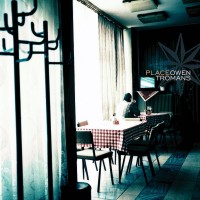
Former frontman with post rock outfit San Lorenzo and currently doing the same duties with the similarly inclined After Rome, recorded in Italy this is Tromans' third solo album (though the first to get anything resembling wide distribution) and continues to mine his interests in English folk and Americana. The result is something of a cocktail of Will Oldham, Lloyd Cole, Nick Drake, Buffalo Tom and, on Thread in particular, Billy Bragg.
So, a mixture of fuzzy guitar waves like those carrying along the chiming Like Rheticus or St Teresa Inbetween and more stripped back acoustic strums in the vein of the rootsy One From The Long Drive, medieval folk drone Swiss Army Song and The Spanish Flag with its echoes of Al Stewart.
The instrumental Upstairs is an odd one, picked out acoustic guitar noodling with what sounds like him writing down the notes on paper as they emerge, but the tracks that strike most are the dark trad folk ballad sounding Some Black Plan and the ten minute closer, John's On The Bridge, a bruised but not broken love song where the Bragg influence marries church plainsong and touches of Neil Young, spare voice and guitar eventually giving way to a golden rush of fuzz and drums before a gentle dying fall. Well worth seeking out by those looking to explore the lesser charted fringes of the alt-folk genre.
Mike Davies
Greg Trooper - Make It Through This World (Sugar Hill)
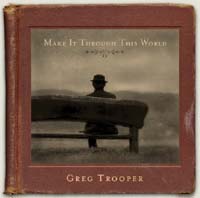
There's an easiness about Geg Trooper on Make It Through This World. It's as if everything he's been searching for in his previous seven releases, is suddenly within easy reach.The thing is that you have to work very hard, for a very long time to sound this relaxed.
The songs on the album are given acres of space in which to roam and grow and much of that is surely down to 'super producer' Dan Penn. Penn, the writer of I'm Your Puppet, Do Right Woman, Do Right Man and Dark End Of The Street guides Trooper unerringly to the very core of each track, anything even remotely superfluous or uneccessary doesn't even to make it to the start line of this wonderful journey.
A perfect example of Penn's influence, comes at the start of the recording process when he invited Trooper to sit and play his songs instead of standing. Immediately the atmosphere moved from a day at the office, to a musician sitting round doing what he loves, playing music for people who appreciate it.
Quoting Hank Williams, Otis Redding and Bob Dylan as influences, as Trooper does, is the easy part. Living up to those legends is another thing all together and yet on This I'd Do, Trooper mines the same rich seam of soul that Redding did, in this case it's called soul music because that's where it comes from. While Sad Sad Girl and Close To The Tracks brings the heart of a man into sharp focus in a lyrically clever Dylan way and just to round things off neatly When I Think Of You My Friends cloaks itself in a jaunty air to sweeten the bitter pill of an altogether darker tale, like Williams' music the tragic sting in the tale isn't too far below the surface.
But it's Trooper's gift alone to write and perform songs that attach themselves to the listener's psyche immediately, Make It Through This World is an album of classics, the only difference is that these are new classics. While the driving force is Greg Trooper and Penn provides the ever-steady guiding hand, the recruitment of drummer Ken Blevins (John Hiatt, Sonny Landreth), Dave Jacques (John Prine) on electric bass and upright, Kevin McKendree from Delbert McLinton's band on keyboards and Bill Kirchen on guitar was an inspired move. It grounds and roots the songs with an all-star country backing.
The meeting of glorious equals is apparent from the album's opening track. With the country blues Dream Away The Blues and then Lonesome For You Now - which provides a fitting close to the journey - as evidence, you don't have to listen too long, too hard to hear the music of a band totally immersed in what it's doing.
I imagine that when you've recorded seven albums, gained the approval Steve Earle, Emmylou Harris and Buddy Miller along the way, there must come a point when you realise there's nothing to prove, not even to yourself. You then start to record music that reflects exactly how you'd like to be remembered. Make It Through This World is not only a fitting and worthy testament to a great musician, it's an album that will stand the test of time.
Michael Mee
Greg Trooper - Floating (Sugar Hill)
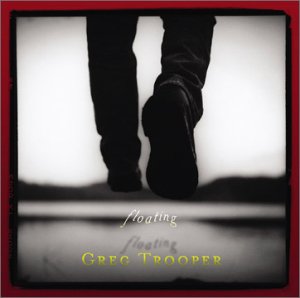
But by far the album's two best songs are firm evidence that Trooper's songwriting gifts are equal to his vocal talents. The slow country title track begins as a gentle memoir of childhood and, lazing on the river, staring up at the sun but come the third verse it's turned into a murder mystery as he recalls a young girl's blood drained body found on the river banks, the final verse suggesting the singer may know more about she got there than anyone other than the river itself.
And then there's Muhammed Ali (the Meaning of Christmas), the song Earle in his sleeve notes says he had to go home and learn as soon as he heard it; an elegant seasonally tinged waltz time salute to 'the old warrior', as a fighter, not in the ring, but in his dignified battle with Parkinson's and the message of strength, humanity and generosity it bespeaks. If this doesn't earn Trooper his full stripes it's hard to see what will.
Mike Davies
These Troubadors are a Wakefield (West Yorks)-based four-piece outfit purveying a refreshingly forward-driving yet also intelligently balanced brand of alt-country/Americana that at several points betrays that Steve Earle is their clearest role-model - although they also list among their inspirations Jackie Leven, Edwina Hayes, Gt Turbo, Lucinda Williams and The Good Intentions alongside the perhaps more expected names of Neil Young, Tom Petty and Chuck Prophet.
The Troubadors' repertoire is based around the songs and voice of mainman and multi-instrumentalist extraordinaire Steve Chapman Smith (who apparently used to be in Red Lorry Yellow Lorry, Ghostdance and Fiat Lux - well fancy that!): the band's debut full-lengther gives us eleven of these originals plus a cheeky hidden bonus track (which I'll come to later). Steve's lyrics are gritty and laced with insight, his delivery gutsy and authentic as they come - and yet his songs can also be surprisingly mellow too. Opening cut Sometimes is one of those brilliant feel-you've-known-it-for-ages hook-laden instant-replay-demanding ditties with more than a touch of radio-play-friendliness about its contours; this is complemented by the classic Brit-pop vibe of Lost Faith, while How About That sees Steve moving into the realm of protest (the Iraq war) while maintaining his Americana-cred: quite an achievement! Elsewhere too, Steve manages to remain upbeat while reflecting - albeit often with abundant melancholy - on matters of life, love and loss.
But in spite of the strong nature of virtually all of the individual songs, the curious thing is that the album's overall impact seems less cumulative and the dominant desire when you've reached the end is to go right back and hear the first three tracks over again. And I can't fathom the rationale for leaving a good five minutes' gap between Steve's anguished, if resigned final song White Dress and the aforementioned bonus track (a goodtime footstompin' backwoods-banjo rendition of Oh Susanna, which, though perfectly competent, doesn't really belong here). But these Troubadors, with their excellent instrumental work and keen feel for contemporary and classic Americana, can come steal my time any time!
www.myspace.com/thetroubadorscouk
David Kidman March 2010
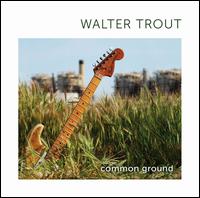
Every time a Walter Trout album lands on my desk I feel the excitement in the air and this one does not disappoint. Common Ground is Walter Trout's 20th album and it is testament to his talent that it sounds just as fresh as his solo debut in 1990. Walter has raised the bar immediately with the acoustic slide based opener May Be A Fool. This pounding blues rocker builds and builds as he introduces the band and finally his electric guitar to the mix. Acoustic guitar starts Open Book too. This is a standard rock ballad, if anything by Walter Trout is standard, but it is lifted from the pack by his superb guitar playing. The notes just fall from his guitar. There's a theme running here as Her Other Man also starts acoustically. Trout's voice is on top form and the guitar interludes are just what you expect from a master of the fret board. The eponymous title track has a spiritual feel to it. Bon Jovi written all over it and guitar ringing like a bell at the end. Danger Zone adds some funk to the rock and is held together by the snappy drums of Kenny Aronoff. Hudson Had Help is a good time barrelhouse blues and a bit of a highlight.
Loaded Gun is the type of song that you would attribute to Walter Trout right away. Loud, bawdy blues rock and one to get the party started with. Rousing, especially with Jon Cleary's piano getting hammered as well as Trout's guitar and driven on superbly by Hutch Hutchinson on bass and the aforementioned Aronoff on drums with some of the best guitar you are likely to hear this year! Song For My Guitar is exactly what is says. Walter gives his guitar almost human status. Some may think it a bit twee but a guitar can become a member of the family. Eyes Of A Child is a mid-paced blues with a touch of swing. No Regrets is a slow, chugging blues with Trout's voice and guitar in perfect unison. His guitar scorches as he bends the strings to breaking point. Wrapped Up In The Blues is a more standard type of electric blues. Harmony vocals and shuffling beats makes for another highlight. He finishes with Excess Baggage, a slow, sultry blues with Cleary's Hammond organ to the fore - just what I would expect from one of my keyboard favourites. This is a powerful finish to the album and Walter Trout just keeps on being outstanding.
David Blue July 2010
Walter Trout & The Radicals - Relentless (Ruf Records)
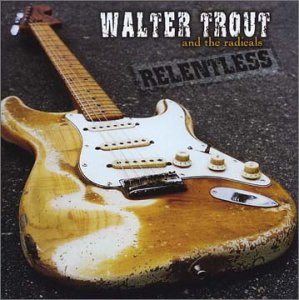
Relentless opens with the screaming blues of 'I'm Tired'. Why would he be tired of what he's supposed to be though? He's Walter Trout, no fear! The guitar solo is what you've come to expect from Trout and he's ably backed up by the marvellous rhythm section of Jimmy Trapp on bass and Joey Pafumi on drums. 'The Life I Chose' is another road song – enough said. The band is on form again as this song trucks along nicely with its chugging beat.
A turn to the acoustic guitar next for 'Jericho Road' and we have a continuation of the travelling theme. Trout turns in one of his best vocal performances here with an earthy quality to his voice. Sammy Avila is to the forefront here with the easily recognisable Hammond organ. Things are slowed down for 'Work No More' but there's a return to the searing guitar as he burns up the frets. The song is dedicated to Irene Green who I confess I don't know but there are some excellent thoughts in there.
'Talk To Ya' brings us some more fretwork wizardry but this time with a swing beat. There's also a return to the travelling theme and this has the best keyboard work on the album. 'Cry If You Want To' is a standard rock ballad and there could have been a better time to release a song called 'Chatroom Girl' what with the highly publicised withdrawal of the Microsoft chat rooms. Nevertheless, this has the trademark driving guitar and pounding bass.
'My Heart Is True' is the longest track on the album and is a standard slow blues but it does have the added treasures of a frenetic and frantic guitar solo and some more excellent Hammond. The short, sweet and simple acoustic 'Lonely Tonight' follows and the now customary guitar and Hammond return for 'Helpin Hand'.
'Collingwood' with its Blue Oyster Cult style guitars and gritty vocal is, quite simply, a great rock song and Trout serves up some meaty slide work on 'Empty Eyes'. The album finishes with two up-tempo rockers, 'The Best You Got and 'Mercy'. On the former we're given some frenetic keyboards and the best guitar solo of the set as Trout plays up to the crowd. The final track is outside lane of the motorway music and by the end you'll all be screaming for mercy.
I think that Walter Trout and The Radicals took a gamble on this album but it has certainly paid off as they have managed to produce an atmospheric set of songs to be proud of.
David Blue
Originally a native of Fall River, Massachusetts (whose 19th century name gives Michael his own surname), Michael reflects through his songs both the life of that locality and the qualities of its inhabitants: hardworking, and with something to say and stories to tell. His writing style is lyrical, his finger-picking guitar work skilled yet unobtrusive and his voice rich yet gravelly. There's a comforting familiarity about Michael's writing, and no wondewr that he won the songwriting contest at 2004's Boston Folk Festival, for his idiom is attractive and accessible, while at times also a little reminiscent of folks as diverse as Gordon Lightfoot and Tom Pacheco. There's plenty of interesting incidental detail, too, in his Massachusetts brand of Americana – his songs are replete with references to local industry and employment (textile mill workers, fishermen, carpenters), all gleaned from his own direct experience of such working lives which enables him to get inside his characters and portray them convincingly in song. To Michael, and rightly so, these workers are ordinary heroes leading noble lives, and so their music is comparably honest and direct, plaintive and communicative. Michael's songs, like his characters, preach tolerance, patience and understanding, in the best troubadour songwriting tradition. Standouts include the poignant Love Song, the Dylanesque fable The Thief, the socially aware Ricky The Kid, the heartfelt Jacinta's Song, the passionate questioning of Scare Crow - all these point to Michael being one of life's survivors, espousing simple yet lasting values. Accompaniments are kept simple, with Michael's rippling acoustic guitar boosted by violin, cello, bass, piano, occasional electric guitar, banjo and gentle percussion. Adept and astutely judged indeed, and adroitly mirroring Michael's writing.
David Kidman
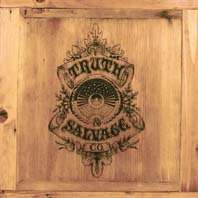
A six piece from LA with four singers and songwriters, they're signed to the label owned by Chris Robinson of the Black Crowes, who also produced the debut album. That Southern influence is evident with the soulful piano, harmonies and hooks laden melodies over a dozen tracks that should easily place them on the radar.
Opening with the appropriately titled Hail, Hail, a linked arms singalong bar room tune where you'll hear shades of The Band, Dylan and The Eagles, that 70s Cali roots-rock rings throughout.
From the bounce along sunshine twang of Welcome To L.A., where The Mavericks meet The Rainmakers, the radio friendly anthemics of Call Back and boogie shuffle See Her to the Sam Cooke-tinted country gospel soul roller She Really Does It For Me and, sounding like a backwoods Kings Of Leon, piano ballad closer Pure Mountain Angel.
If they can avoid slipping into the same sort of Nashville slickened country rock n roll that's neutered the like of Lonestar, they could well shift truckloads of albums and retain an Americana cred.
Mike Davies August 2010
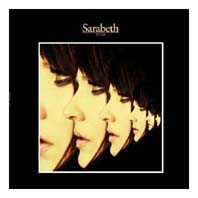
Born in Miami, raised in Manhattan and soaking up such diverse influences as Cat Stevens, Simon & Garfunkel, Neil Young, The Velvet Underground, Elliott Smith, Dylan and Joy Division, Tucek's been around the fringes for a while, providing backups for both Smog and Brian Jonestown Massacre. However, she's now stepping into her own spotlight with her brittle but beguiling self-titled debut.
Lead off single Something For You crosses Coldplay's Yellow, the Velvets and hushed psychfolk to scintillating effect while Nico influences are evident on the bluesy slouch of Stillborn and Neil informs Hot Tears and the freak out erupting Holy Smoke. Elsewhere there's the country pop flavours percolating through Nobody Cares and the likes of Ambulance, the lullaby-like Come Back, Balloon and a chiming Broken Kisses that will go down well with admirers of early Beth Orton. You want warm brass and strings soaked fragile balladry, check out Home.
Suitably pensive and sarcastic in equal measure, Tucek's whispery intimate voice luring you closer to hear her confessionals about busted relationships, be prepared to find yourself hooked in her narcotic web.
www.myspace.com/sarabethtucekMike Davies March 2008
This two-disc set is an expanded and freshly remastered edition of the very first Jethro Tull album, originally released almost 40 years ago. Not only do we get the mono mix of the album itself (which has never appeared on CD before), but also a new stereo mix. Actually the differences between them aren't perhaps madly significant (though the new stereo mix opens out the perspective nicely, with an even greater presence than the previous CD reissue, while at the same time it's interesting to note the relative clarity and punchiness of the mono version), and there are shifts in balance here and there and the occasional extra few seconds of music (and little touches like the exhortation to "pass the bottle" at the close of A Christmas Song), but it's not a bad idea to achieve completeness. In any case, there's no argument with the record's claim to seminal status in terms of the development of blues-rock and, with hindsight, the career of leader Ian Anderson himself. Tull was always a strange kind of band, its music didn't fit readily into any sub-category being neither strictly blues nor hard rock nor folk nor prog - although it contained strong elements of all three at times. This Was, being the one and only Tull album to feature Mick Abrahams' distinctly rock-oriented guitar work (before he departed to form Blodwyn Pig), had a character all its own, and some of its musical adventures were never revisited by Tull as a band, particularly the jazz-tinged blues of Move On Alone and It's Breaking Me Up, the guitar-extravaganza of Cat's Squirrel and the delta-blues of Some Day The Sun Won't Shine (and even the obligatory "drum-solo vehicle" Dharma For One), although tracks such as Serenade To A Cuckoo prefigured Ian's burgeoning flute skills and his on-stage showmanship that has been such a distinctive hallmark for the band ever since, while Beggar's Farm and My Sunday Feeling provided early examples of Ian's unusual approach to melody and time-signature in his compositions. Song For Jeffrey and the single Love Story then provided the blueprint for what became the driving "Tull sound", contrasting with the band's gentler aspect (and Ian's penchant for arrangement) as exemplified by the latter single's B-side A Christmas Song. We also gain additional perspective on the band's activities around the time of This Was by the inclusion on disc one of nine tracks recorded for John Peel's radio show in July and November of 1968, firstly as a taster for, and then capitalising on, the album's release that autumn (the generous airtime John gave to the band was partly responsible for the record's high chart position). As well as two bluesy non-album numbers (So Much Trouble and Stormy Monday), the radio sessions bring us versions of songs from the album which are (in common with many Peel session performances of the period) significantly better than routine. Finally, disc two of this anniversary edition brings us the A-side (though, mysteriously, not the flip) of the very first Tull single, Sunshine Day (at the time, miscredited to Jethro Toe!), which appeared on MGM, and the B-side of Song For Jeffrey, the non-album cut One For John Gee. Jethro Tull are (is) celebrating this big anniversary (40 years as a band) with a long UK tour that started a week or two back and continues through into May. Worth catching - and celebrating.
David Kidman April 2008
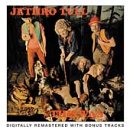
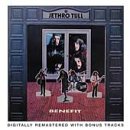
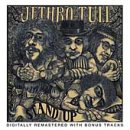
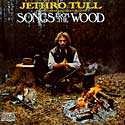
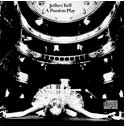
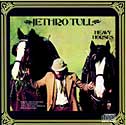
And so to the second trio of reissues: it embraces on one hand perhaps the most consistently misunderstood and arguably least accessible Tull album (A Passion Play) - universally slammed by the critics at the time, and many have termed it lyrically obscure and even impenetrable - alongside on the other hand two of the most acclaimed, easily listenable and (to my mind) most satisfying of the entire Tull canon so far. Actually, for all its apparent lack of focus and wilfully obtuse prog ambitiousness, I still have a soft spot for A Passion Play, which has every right to be deemed at very worst a truly honourable failure, albeit originally cultivated optimistically in the wake of the spoof-concept Thick As A Brick. There are some glorious moments, particularly during what was Side 2 (after the fable), and aspects of the instrumentation are genuinely intriguing, while the album's excesses are forgivable if viewed as lessons learnt in respect of structural integrity and economy of expression in Anderson's future songwriting. In lieu of a bonus track, this is an enhanced CDR which also contains the video for the fable of The Hare Who Lost His Spectacles and the theatre programme. Moving on nearly four years, Tull had moved on through further ill-fated and musically inconsistent concept albums to arrive at a new simplicity for Songs From The Wood, which has been described as one of the prettiest albums the band has ever released and a definite treat for those who appreciate their more folk-oriented material. With abundant justification, for the music therein strikes an almost ideal balance between the elegant pastorality of distinctly English folk music and the stridency of harder rock templates, at times more ideally so in fact than the (to all appearances similarly-inclined, but in actuality rather differently motivated) often more laboured contemporaneous offerings of Tull's then-labelmates Steeleye Span. Heavy-handed it wasn't, and the resulting album is one of the acknowledged Tull classics, which even in those reactionary days of early punk had gained a good press. Bonus track Beltane fits in a treat in this exalted company, and a live version of Velvet Green is also thrown in for good measure. One year later, Tull came up trumps again with Heavy Horses, their 11th studio album, which developed the folkloric sensibility and economy of expression of the Songs From The Wood material, although with a harder, less whimsical edge, while at the same time succeeding on the progressive front with two longer, more obviously heavyweight cuts (No Lullaby and the tremendous title track). The band's passion and commitment were even more in evidence on this album, and totally in keeping with the new realism (the thoroughly contemporary take on country living and practices) of Anderson's lyrics. The two bonus tracks (Living In These Hard Times and Broadford Bazaar) are perfectly appropriate. Heavy Horses is another Tull album that I simply wouldn't want to be without.
David Kidman
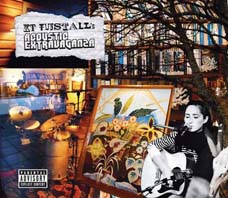
She's been kept so busy constantly touring on the back of Eye To The Telescope, she's not had time to get down to the business of making a follow-up. So, next best thing, she's come up with an unplugged set. Recorded live over the course of one day in Skye last year (an accompanying DVD charts the making of the album), it shares a couple of songs with Eye To The Telescope (Miniature Disasters, Universe & U) but the approach is decidedly different, stripping away her debut album's pop sheen in favour of a rawer, more alt-country mood. Elsewhere she revisits other previous material in the shape of countrified reworked B sides Girl & The Ghost, One Day, and the laid back bluesy back porch Boo Hoo complete with slide and Hammond, alongside a hushed near lullaby stripped back reading of Throw Me A Rope from her debut EP.
More than sufficiently different as not to be simply duplicates if you already own the originals, the album also has the incentive of featuring new versions of Gone To The Dogs and Change which appeared on the now impossible to get self-released Tracks In July, her brushed and lazing cover of Beck's Golden Age and the loping country rocking Ashes, a seemingly brand new number full of attitude and a line in expletives that aren't going to earn it any Radio 2 play if it surfaces on the next studio album.
Originally only available via her website and downloads, it now has a full commercial release, attractively packed in a gatefold sleeve and complete with a booklet packed with photos of the session. Rather more than just a stop gap before the next multi-million seller, it confirms Tunstall as a developing and enduring talent who isn't about just rehashing proven formulas.
Mike Davies, Sept 2006
www.wildgoose.co.uk
www.thewrentrust.co.uk
David Kidman August 2007
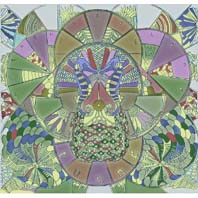
There's been a few changes in the Tunng camp since the last album. Sam Genders, the band's founding member, singer and songwriter, has left, they've acquired a new lyricist, collaborated with Malian blues outfit Tinariwen, revisited their early experiments with electronics, moved Becky Jacobs into the vocal spotlight and found their inner folksy pop sensibilities.
Nowhere is that more evident than on the opening track and single, Hustle, an acoustic shuffle of piano, guitars and banjos with an African lilt and the shared breathy vocals of Jacobs and Mike Lindsay. Summery and sunny, it skips along with a feelgood groove that carries over into It Breaks, its trad folk feel melody coloured with clattering percussion and itchy rhythms. The trad influence is there too on October with its Pentangle-like raggy waltz rhythm and shared vocals and the largely a capella shanty These Winds, while, in contrast, a five minute The Roadside shows the Malian influence in its glistening busy bee pizzicato Motorik keyboard line, gradually fleshing out to embrace electronic shudders, Santiago hiccups around looped handclaps and both Don't Look Down Or Back and the instrumental By Dusk They Were In The City edge towards the fringes of progressive folk, the latter featuring a rock guitar solo.
Closing up shop with Weekend Away which slides between samba, synth pop and saloon bar vaudeville before a wheezing hidden track that evokes memories of The ISB and Dr Strangely Strange, it may take a while to persuade those who subscribed to the first three albums but there's a spell here that should prove ultimately hard to resist.
Mike Davies March 2010
Since their second record, the fascinating, meandering wyrd-folktronic fragility of Comments Of The Inner Chorus, Tunng have expanded in more ways than one: both in the literal sense (for Good Arrows is the first Tunng CD to be recorded in its entirety by the full six-piece lineup) and in the very audible sense of the new album possessing (or being possessed by!) a sound that I can only describe as being altogether more "present". The great thing is that their music hasn't lost any of its intimate open-air charm in the process, even though it's now if anything even more edgily experimental. The distinct air of elusiveness that characterised albums one and two, that feeling of aural focus often shifting slightly out of the frame of our earshot, has been replaced by both a sharper busy-ness in terms of texturing, with even more brittle percussion and effects and a bolder, more primary – and often more tangibly disturbing - quality of the imagery in the lyric writing. Tunng set out their stall determinedly with the catchy Take, which pits a clangorous hammered dulcimer against scratches and scuffs, a distinctively quirky setting for those deceptively sweet-toned lyrics by Sam Genders (Sam has written, or co-written, the lyrics to all but two of the album's songs). Songs like Hands and Bullets appear to have a creepy, almost sinister preoccupation with mutilation of body parts, but this is treated non-morbidly, with a rather childlike delight. Similarly, Arms is almost sensual in its viscerality, further emphasised by the eerie backdrop of a crackling fire, and String is like a folk-hymn to the body corporeal. Bullets has a kind of sunshine-pop breeziness built into its vocal parts, a cheery singalong to balance the grim images within. At the other extreme, Secrets - after its conspiratorial introduction - brings in some decidedly commonplace images for its incantatory instruction. Jittery, skittery, wilfully strange and even scary, Tunng's music may at times seem unconscionably weird, but its brilliantly inventive and ever-intriguing conjunction of sounds and words is tremendously compelling, with a surprise lurking deliciously round every corner. A line from the shufflesome closing track Cans is worth quoting, for it typifies my response to Tunng's wondrous music: "and if you find you feel you're falling through the floor just put your hand out in the dark and feel the bones inside you singing out again". For today, indeed, the band's brand of sideways, gentle hippie humour is - and should be - highly fashionable (dare I call it "tunng-in-chic"?!). So, lest you feel unsettled by the dark, child's-nightmarish demeanour of the Tunng philosophy, take comfort in their whimsical dream-logic: "it's okay because one day we will be dead".
David Kidman January 2008
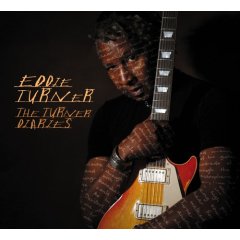
It's been a while since I reviewed Eddie's last album, Rise, and it has been a wait with baited breath for this latest offering. Eddie shows that he has lost none of his power with the opener, Dangerous. Turner likes to push the boundaries and this chugging blues rock with its undercurrent of menace is what I imagine Jimi Hendrix would have been playing nowadays. This is followed by So Many Roads, a sleepy blues with echoed vocals, offset drums and a funky solo. Eddie returns to blues rock for Cost Of Freedom, a busy song in the classic style before turning to acoustic guitar for I'm A Man I'm A Man. Eddie Turner is not your classic bluesman but does like to be an innovator. However, the traditional style is still in his mind and he builds this song up so well. He turns all mean and moody again for Save My Life, a blues based rocker with wailing guitar. Confessions is a slide guitar laden instrumental packed with fuzz and distortion that cements Eddie Turners reputation as one of the finest blues guitarists around.
The mood of euphoria with what has gone before is slightly changed with the somewhat disappointing New Day. It is weak and wishy-washy and not like Turner at all. He's back on form with the hypnotic Shake 4 Me and it's full of blues innuendos - how does he keep it up! Pomade is a slowish blues instrumental with Eddie's trademark guitar and Jody, a medium paced R&B with insipid female backing does not set the heather on fire. The eponymous title track starts off as a samba then goes into a blues rock but the samba drums remain in the background throughout. He closes with a swinging version of the classic I'm Tore Down and this is the highlight of the set and goes to show that it's the simple ones that often go down best. Eddie Turner is certainly in the premier league of modern blues guitarists.
www.northerblues.com
www.eddieturnermusic.com
David Blue Sept 2006
Juliet Turner - Season of the Hurricane (Hear This)
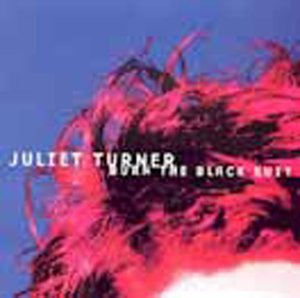
It's some three years now since everything seemed to be coming up roses for Turner, her Burn The Black Suit album being picked up for UK release through EastWest, in search of another Irish star to add to their Corrs and David Gray collection. Overnight success didn't come quick enough for the label however and despite glowing reviews Turner's low gigging profile didn't shift the necessary units. And so, having parted company, she's back on her own label for her third outing.
Already a hit in Ireland where she was recently named Best Contemporary Artist, with Wogan having picked up on first single, Everything is Beautiful (which finds her a sort of cross between Norah Jones, The Corrs, Dido and Natalie Merchant), she may yet find her star rising on these shores.
While keeping the last album's edgy jazzy folk feel honed, it's a poppier, more playful affair with songs about sexual attraction (the sultry, reggae underpinned The Greatest Show On Earth), sexual urges (the smoky One Night) and sexual vampirism (See Another Side melding melodic vulnerability with predatory intent) mingled with more wistful memories of fumbled childhood romance (an uptempo, almost rocking 1987), steadfast love (Business As Usual sounding very Eddi Reader) and aching betrayals and regrets (the 5am cityscape mood of Vampire, the melancholic, spare No Good In This Goodybe). Social and spiritual issues are addressed too in the driftingly dreamy but downbeat title track, a quietly angry Suzanne Vega-ish The Signal and the Noise and the enigmatic, faith-themed slow waltzingly acoustic Elvis Is In The Building.
Wrapped up with a cover of Nancy Sinatra hit Sugartown, it's a consummately crafted affair that never loses its passion and soul beneath the musical polish, and if this time round she puts in the necessary footwork promoting it over here, then hopefully it'll be the one to bring her the exposure and audience she deserves.
Mike Davies
Steve's name should strike a chord of familiarity in readers, if only of the "remember him from… where has he been hiding?" variety. Yes, Manchester-born Steve was a member of Tyneside quartet Canny Fettle in the 1970s, then made four increasingly well-received LPs for Fellside, after which he spent a dozen years away from the folk scene (building a violin-retailing business). However, with folk music having a habit of getting into one's blood, it was perhaps inevitable that Steve would return there sooner or later – which is fortunate for us. Since 2004, Steve's returned to live performance and been warmly welcomed, and now his recorded comeback couldn't have been better timed, for the resultant album has found a natural outlet on the Tradition Bearers label, home to performers who are genuinely carrying on a tradition and who have earned the respect of their fellow singers.
Steve is a very strong performer, with a supremely confident style of playing and singing. His chosen instrument for accompaniment is the English concertina, but he plays a model which is unusual in that it has four buttons with "anglo" action (thus extending the instrument's range to 68 notes). This accounts for the wonderfully full, complete sound he obtains (you could easily be forgiven for thinking Steve's double-tracked on this CD, but no he ain't!); however, this richness of texture may also partly derive from a self-admitted influence of guitarists on his (self-taught) playing. Steve puts his trusty concertina aside just three times during the course of the CD: to concentrate on singing The Rambling Beauty (here he's accompanied by Martin Carthy), picking up the cittern to accompany The Poor And Single Sailor and the tenor banjo to augment The Brave Dudley Boys. As a singer, Steve has a forthright and passionate delivery, always displaying a clear sense that he knows exactly where he's taking the song; occasionally on this CD the impact can seem just a little "shouty", but this may well be a result of balancing the voice slightly too forward in the mix since I've not noticed that trait in Steve's live performances. Which leads me to another important facet of this CD: although it's manifestly Steve's solo record, shot through with his distinctive musical personality, only three tracks are performed entirely solo with concertina; elsewhere, we're treated to some superb contributions from other musicians, and these give Steve's performances another dimension without in any way undermining Steve himself – not an easy trick to pull off (credit to producer Ollie Knight here!). In addition to the aforementioned Mr. Carthy (his other appearance is backing Steve on a sensibly condensed Child ballad, Sir Colvin), we encounter Gill Redmond (a gorgeous cello part on Bonnie George Campbell), Nancy Kerr, Miranda Sykes, James Fagan and Ollie Knight; and Pete Flood drums along quite deliciously through two tracks, one of which is a spirited "reassessment" of Stephen Foster's The Glendy Burke. Perhaps my favourite of all the guest contributions, though, is that of slide guitarist Kevin Brown, whose own poignant tune One Bad Link In The Chain forms a heart-rendingly beautiful postlude to Steve's rendition of The Dry Cardrona. Steve's self-confessed mission, to extend the boundaries both of what might be considered traditional song and of the potential of concertina accompaniment, is well realised by the selection of material on this CD (and even more so in his live performances, I might add); the disc ends with an entirely credible setting of Handel's Where'er You Walk which (though operatic arias aren't everyone's cup of tea) is unlikely to be bettered by any "folk" performer. This is a very fine CD indeed: Steve is still a modest man, yet he maintains self-imposed high standards, which he certainly reaches here with this splendid comeback recording.
David Kidman July 2008
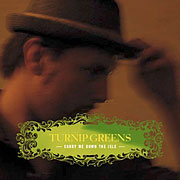
Blues and roots music is very popular in Scandinavia and this is being reflected in the number of bands coming from the area. Turnip Greens are four seasoned musicians from Denmark, influenced by the likes of Dr. John, Daniel Lanois, Ry Cooder and Muddy Waters amongst others. They open with Carry Me Down The Aisle, like the rest of the songs on the album, an original composition, and it's a painfully & achingly slow opener. This is very appropriate as it is about death and a funeral (a common theme for blues music) and is surprisingly powerful despite being a strange one to start with. The pace doesn't really pick up much on the quirky blues The Reverend In Town. This is a hypnotic tale about a disaffected Reverend who has a brush with the devil who considers him too weird to take into hell. My Baby Loves Me sees the pace pick up slightly and there's some evidence of lead guitar from the capable Henrik Bruhn who also takes on the vocal duties. This is a driving blues where drummer Sune Nielsen does ballistic at times. The acoustic Gather My Bones is haunting and returns to the slower pace. I absolutely love this and it is so laid back, it's horizontal. Electric guitars return on Top Of The Hill but with the drums sounding like they're in an echo chamber perhaps the boys have gone a little too quirky this time. The basic song is there but it's just on the peripheral.
SixSixtySix has more references to the devil but it does mark a return to form with slide guitar and a driving rhythm. There's a slight change in direction on the almost Country offering Kissed Her On The Cheek before they go back to the quirky side for Two Sets Of Rules but maybe this one doesn't work so well. A Man Said Goodbye is another of the albums standout tracks with fuzzed vocals and idiosyncratic beat that reminds me very much of Canadian Joe Fournier. Quite Often confirms the fact that Turnip Greens have a style all of their own and they finish much in the manner in which they have conducted most of the album - slowly. A slightly disappointing uninspired finish to what is, overall, a clever, original album.
www.turnipgreens.dk
www.black-and-tan.com
David Blue November 2006
I suppose you could say that the duo who comprise Turtle Soup should indeed be "happy together"...! Seriously tho' - Turtle Soup draw their inspiration from a little later on in the 60s, and from a deeper folk wellspring altogether. Based down there in Basildon, Essex (not normally regarded as a promising locale, you must admit!), Turtle Soup comprise Fran Kempster and Steve Segar. On The Caffeine Conspiracy - named, I suspect, loosely after the Dylan cover (One More Cup Of Coffee)that comes next-to-last in the running order for this CD - they perform a damnably fine set of twelve songs, two-thirds of which are pretty stunning self-penned originals. Stylistically, Turtle Soup inhabit a milieu very much inspired by late-60s prog- or acid-folk, but the songs themselves aren't anything like so weird or esoteric in terms of subject-matter, being more about - er, ordinary things, like the weather, the seasons, love, places, etc but treated memorably poetically. Performance-wise, although I was often reminded of Renaissance Mk.1, here the dominant sound is Fran's amazing voice, which manages to have that straight-ahead "go for it!" quality that you used to find in singers of that era - ie. attractively cutting and forthright, with a deliberate control of vibrato that speaks of a decisive strength in interpretation more important than a "trained" vocal technique. Steve's accompaniment, though in simple terms best described as mainly no-frills strummed guitarwork, is actually much more than that, for it's both able and tender and strongly characterised; sometimes he's augmented with (or replaced by) Fran's piano, and on quite a few of the songs they add a harmonica or flute to go soaring above the top in decorative flourishes. It's all largely acoustic in execution, though the duo's occasional excursions into replacement electric instrumentation (Little Bee, for example) are admirably restrained and prove most effective. In addition to the eight self-penned songs and the aforementioned Dylan cover (which comes complete with a florid mex-style flute improvisation as coda), Turtle Soup give us arrangements of three traditional songs, never less than imaginative and often equally stunning; Bushes And Briars turns out to be quite unsettling in the unusual, irregular pacing chosen (mirroring the uneasiness of the protagonist's state of mind perhaps?), while Courting Is A Pleasure is given a fairly measured, stately rendition that's as much reminiscent of early Jacqui McShee as anything more overtly contemporary, at any rate in terms of overall approach. The standout among the traditional tracks however is a rich, spine-tingling unaccompanied performance of The Irish Girl. As a debut recording, The Caffeine Conspiracy makes a very strong impression indeed, not in the least by managing to be both likeable and substantial in a decisive and positive manner that's highly reminiscent of those classic cusp-of-the-60s folk albums we still treasure. I for one am eager to hear more of Turtle Soup, and soon.
David Kidman
(Obscurely?) subtitled New Constellations For Wind, Sole And Drawing Instruments, this is the soundtrack album to a performance piece which was performed by the two musician-Karens with dancer Kerry Fletcher and visual artist Keith McIntyre in 2004 at the Baltic Centre for Contemporary Art, Gateshead. It was originally mooted as 2K Plot, bringing together the two musicians from different genres, but the project grew over the subsequent months following meetings with Keith and then Kerry, both of whom overwhelmed the Karens with their ideas for collaboration! Whatever, the soundtrack music is sufficiently engaging to stand up on its own, even if some listeners might find the decidedly fruity, and strongly individual, timbres of piano-accordion and sundry clarinets a touch unyielding for their tastes. Actually, I find the necessarily restricted tonal palette quite refreshing in its own way, if you take it on its own terms and revel in the sheer variety of tones, textures and approaches the musicians are able to coax from their respective instruments (they sure can play!!). It's not as esoteric as it might sound from the description, for the truly excellent quality of the recording ensures that not a nuance is lost, too. The whole work comprises an intelligently managed sequence of shorter pieces which traverse musical genres with the ease of a nomadic caravan trundling across a landscape, alighting occasionally for a more leisurely exploration of one feature or another here or there. The theme of "space" provides a loose connecting thread - the individual pieces are blessed with witty and apt titles like The Moon In The Man, Astronocturnes and Shopping In Celestial Skies - but despite the overall contemporary-futuristic idiom and musical language, there's a timeless ethnicity about much of the melodic content too, with world-musics impinging at times to inspire the more modernist passages into flights of fancy. Sky Viewing, for instance, is one of those rumbustiously jaunty dance-like tunes that could've tripped off the stage of the Old Rope String Band as accompaniment to a hilariously clever routine involving three bananas and a vacuum-cleaner (no, I kid you not!); while Arts And Crafts features some ungainly-sounding foot-percussion setting the stage for a series of silent-movie-style gesturings (slapstick humour is never far away!). The repose of Etoile De Lusignac conjures a mood of slightly uneasy meditation, sitting in front of a jazzy Parisian café at dusk, say. And the finale, Reel Quantum, is rather like one of those delectably irregular folkdance concoctions that Hoover The Dog specialise in. Soundtracks don't as a rule tend to make for good sustained listening independent of the visual stimuli, but 4K Plot proves one of the notable exceptions to the rule.
David Kidman August 2006
Tweed & Cutting - One Roof Under (Fyasco)
Two superb folk accordionists come together on record again after a long hiatus (all of seven years, if my memory's not playing tricks) during which they've been immensely busy on numerous projects – even including touring together sometimes! – and constantly in demand. A whole album of instrumental pieces featuring two accordions might sound like a recipe for aural hell, but fear not – boring and samely it ain't, for there's plenty of variety in pace and texture even without considering the very occasional augmentation from Ian Carr's acoustic guitar. And – to state the obvious – the tones and textures of the duo's favoured instruments (Karen's piano accordion and Andy's button accordion) make for an absorbing blend in any case. Consider also the different milieus in which the two operate – Karen working with the Poozies and/or Ian Carr, Andy with Welsh band Fernhill and fiddle player Chris Wood – and the virtually unlimited scope for intriguing combinations of influences that such occupations might imply. Both Karen and Andy display an individual – and finely-honed – virtuosity that's probably best described as gently dazzling, always vibrant yet never needing to parade in front of your ears to grab your attention. Listening to this CD, it's patently obvious that these two musicians not only have a musical relationship that's extremely empathic but that they have an extraordinary capacity for learning much from, and responding instantly to, each other. And that holds true whatever the musical idiom or ethnic style they've chosen to feature – they're equally at home in Swedish polskas or waltzes, Irish or Northumbrian jigs, or tunes from France or Quebec, and oh so easily combine tunes from different sources within the same set, invariably to good effect. Several tracks also spotlight Andy's own compositional skills, while the charming opener Wark combines two of Karen's own. Particular favourites of mine among the album's ten tracks are the lovingly textured Johsefines, which utilises a Swedish christening waltz to introduce a Sussex tune with a Chris Wood composition as finale, the abundantly infectious vitality of the St. Michael's Mount set, and the elegantly beautiful closer Åsa. This is truly an album to savour.
David Kidman
Two Dollar Pistols - Hands Up (Yep Roc)
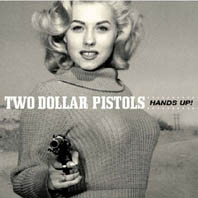
Formed in 96 by sideburn and stetson sporting baritone John Howie Jr, the band first found favour with a seven track EP that introduced the wider world to the vocal charms of Tift Merritt. They don't date anymore, but Howie's boys can still guarantee a good night out down the honky tonk where tears keep the beer level topped.
Drawing on such influences as George Jones, Buck Owens (Runnin' With The Fools and How's Life On Top Of The World are pure cut authentic), Roy Orbison and anything that ever came out of Bakersfield they're cut from the same old school country cloth revival as Dave Alvin and The Mavericks and if they've yet to find the track that will bring them the same acclaim and success there's still plenty of sobbing heartbreak in which to wallow. If Howie's love life is as desperate as the songs make out you wonder how he ever manages to get out of bed in the morning knowing he's going to be lied to and cheated on a dozen or more times before he climbs back in. However between the breakfast beer and the barroom floor he and the band manage to translate misery into melody to aching effect on the likes of Without Goodbye, There Goes My Baby (very much the Big O), Don't Start Me Wonderin' and the crying classic It's All Fun And Games (Til Someone Breaks A Heart).
Amazingly they do manage to find a few moments to indulge in an upbeat (if only musically) mood with the title track, the rockabilly slapping Lonely All Alone and Too Bad That You're Gone, but happily (sic) the twang and the tears two step prove too much for them or indeed you to resist.
Mike Davies
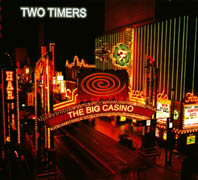
David Kidman
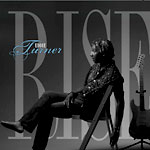
Cuban born and Chicago raised Turner has been influenced by his Cuban roots and the blues, rock and R&B that he heard in his youth. This all shows in his debut for Canadian label NorthernBlues. Turner played with Otis Taylor in 1995 and is generally credited with creating the Otis Taylor sound using his psychedelic guitar to great effect.
The eponymous opener is an eerie beginning but you will be hypnotised by the unceasing rhythm. Ask Myself Why is a sleazy blues. Turner has a silky voice and an easy guitar style that belies his talent. He turns to acoustic slide par excellence for The River and this is as fluid as any of the great rivers. It's always a brave decision to take on a Jimi Hendrix song and Eddie's version of The Wind Cries Mary is certainly passable. The only criticism that I have is that his voice is just a little wispy for the song.
Resurrection has him back on form – searing electric slide over an almost Western acoustic base. It's Me has psychedelic guitar that will take you back to the late 60s/early 70s and the Johnny 'Guitar' Watson song, Gangster Of Love is given a strange, almost spoken vocal. This is a little disjointed at times but probably has the best straight guitar playing so far. Eddie looks for inspiration in gospel for Sin and the almost a cappella treatment works well.
Freddie King's Play It Cool is given the full Turner treatment and, with stinging guitar, a few more like this would have gone down well. Privileged Life is a sophisticated urban blues and Confusion Illusion shows that it's not always too difficult to come up with something new. The album closes with Secret, a funky amalgamation of all that Eddie Turner is about.
David Blue
"Uncle" John Turner is the legendary blues drummer and Woodstock survivor that has played with some of the best. This latest album features old friend and guitar genius, Johnny Winter and is a fine return to form. Roll Roll Roll is an upbeat opener with slightly fuzzed guitar from Winter and good vocal from Turner. The album is called Texas Blues and that's exactly what you get on Just A Little Bit, where Turner gives the impression that he will still be a very good live performer. Divorce Court is dramatic and has Winter's snappy guitar and Drivin' Wheel is a lovely rolling Texas Blues. His voice goes a couple of times here and the guitar is no more than functional. You're Humbuggin' Me is upbeat and another that will be a great live track. The band is on form and Winter serves up his best guitar yet. I Got It Made is excellent and They Call Me lazy is more quality Blues from a quality artist. The slurred harp is a great addition.
With the title Allons Dancez you would expect a little Cajun and you won't be disappointed. Unfortunately, it is not the best that I've heard though. Tales of guns and infidelity are Blues staples and Shoulder Holster fits in well. Great guitar from Johnny Winter and a fair recompense to the man who convinced Winter to start a blues band. Hey Senorita is not the best track on offer and is a bit disappointing considering that he once starred alongside Stevie Ray Vaughn in Krackerjack. Winter adds some T-Bone guitar style on T-Bone Intentions, which is complimented by Turner's laid back drumming. I-10 Hurricane Blues is delivered in an Elmore James style apart from the vocal. It's short and sweet. The daftly titled Oooh Poo Pa Doo finishes things off and he does put a bit of grit into his vocal but it is the humour that comes over most of all. This is an artist having a good time doing what he does best. You would expect no less from a man of whom B.B. King once said "Man, I can set my watch to your time!"
David Blue April 2007

There seem to be any number of Canadian bands named Tequila Mockingbird, playing anything from folk to pop to hard rock. Winnipeg's Dave Quanbury used to be guitarist in one of them. Then, in 2003 he released a solo album that apparently earned him a lot of kudos back home. The following year he teamed up with local girl Brandy Zdan to record an album under both their names. Two years later their second release, Bethune, saw them rechristened as Twilight Hotel and in 2008 sophomore album Highway Prayer earned a Juno nomination as Roots & Traditional Album of the Year.
Since then, they've relocated to Austin where album number three took shape, but while the country might be different the music retains its distinctive feel, drawing on such influences as Tom Waits, Nick Cave, Neil Young and the Cowboy Junkies but also evidencing an European feel with its moody vocals, guitar melodies and use of accordion evoking cabarets and French cafes.
The default mode is bluesy alt-country, he providing the softer breathy tones, she the darker, more forceful notes, coming together in an often intoxicating blend. The hushed title track opens the album, repetitive bass drum beat providing the rhythm, gypsy accordion wheezing in the background and the twin vocals weaving a mesmerising spell that suggests images of spooked European carnivals.
Accordion leads the way on the second number, the decidedly Gallic noir What Do I Know About Love where Zdan adopts a sort of Dietrich femme fatale approach and a sultry saxophone leans on a lamppost in the dimly lit Paris alleys. It's the sort of song you could imagine a young Leonard Cohen or Jacques Brel playing as part of his seduction technique.
The style and mood shifts though on Mahogany Veneer, Quanbury taking lead on an acoustic folk tune with a slow marching beat that gradually builds through the lyrical road trip through the promise of New York, the decay of Memphis and the ghostly wounded New Orleans and on to Nashville and Kentucky by way of a suicide's funeral detour while driving across Saskatchewan.
They tell evocative stories in simple, broad strokes. Poor & Hungry a percussive, reverb drenched tale of a woman taken in by a charmer's lies and how the truth "unravels like your favorite sweater sleeve" while the slow swaying Frozen Town evokes emotional stasis where "the snow sounds like crushed rails".
It doesn't all work. The rumbling desert psychobilly surf rock Ham Radio Blues and The Darkness, a five minute track of which over half is a rumbling distortion heavy guitar and sax dominated instrumental before Zdan wails the three line lyric like a gospel singer lost in the void, don't feel quite at home in the company of the Young-like country ache of Dream Of Letting Go or the soaringly wonderful Golden Eagle with its steady beat, Zdan's quivering vocals and molten electric guitar solo.
But those are minor complaints about an album that's going to be heard a considerable amount around my house, and, hopefully yours too.
Mike Davies February 2011
The album's title is translated as "A Jump Over The River", which gets across admirably the lithe, athletic, spacious outdoor feel of the playing of this new-wave dance band. Twm Twp hail from Wales yet are based in Brittany; their repertoire is rooted in Welsh dance tunes, yet with plenty of juicy Breton inflections built in. Their instrumental complement is unusual - Mike James' accordion takes the lead, pumped along by a brass-heavy bass and occasional ancillary melody line from trombone/euphonium and two saxes (courtesy of Trefor Bennett, Hervé Dréan and Richard Goodwin), all of which is vamped along nicely by Rachel Goodwin's piano and (sometimes) Martin Goodwin Dréan's drumkit or darabuka. Intermittent use of a whistle or bouzouki (Hervé again) adds some textural variety on tracks like the set of polkas. And a couple of sets (notably the wonderfully bouncy trio of ice-breaking hornpipes that make up track 8) invite a scrumptious carefree mardi-gras vibe. Given the above-mentioned "heavy brigade", though, the whole sound turns out to be distinctly light and airy, thoroughly tempting the listener to pace it out on the floor for him/herself (the dance instructions are appended as pdf files!). It's dances all the way, except for two vocal tracks, where Mike delivers a characterful, if (compared to what we're used to!) restrained rendition of A Miner's Life aka. Union Miners (further augmented by a Breton brass band!) and, to close the album, Ambell I Gân, a fetching little waltz-time song from Bala (sung here by Rachel) which was found in the Peter Kennedy collection. All things considered, Naid Tros Afon is an intriguingly different dance-band release that bears closer listening alongside the more expectedly energetic, determinedly foot-friendly responses.
David Kidman
Not to be confused with The Two Duos Quartet of Wood/Cutting and Tweed/Carr, this particular 2 Duos is a fortuitous teaming of two established pairings of young musicians in the process of discovering and celebrating common ground between their respective traditions. 2 Duos comprises Claire Mann (flute, whistle, fiddle) and Aaron Jones (singer and bouzouki player with Old Blind Dogs), with German musicians Gudrun Walther (singer and fiddler/accordionist) and Jürgen Treyz (guitar), each of whom is well accustomed to band work too (leading Secret Orders and the German outfit Cara respectively). On the face of it, a collaboration between Scottish and German musicians might seem an unlikely prospect, but their friendship, initially formed over a three-day session-blitz at 2006's Wimborne Folk Festival, quickly crystallised into a three-week tour of Germany last April and the parallel live-in-the-studio recording of just under half of this CD, the remaining tracks then being completed via cyberspace. Not that you'd be able to spot the difference, for a tremendously relaxed joie-de-vivre characterises all the performances, which focus on group dynamics and a refreshingly unhurried quality within the ensemble playing rather than on parading individual virtuosity per se (not that this aspect is ever lacking!).
Interestingly, then, only three of the tracks turn out to be purely instrumental, session-style tune-sets: Beyond The Glen combines two Scottish tunes with an Asturian street-march, Spike Island Set fits a Barra puirt-a-beul between two storming Irish tunes, and Tube Station (pairing John Carty with Stockton's Wing) kicks off with some superb twin-fiddling. The disc's vocal contingent is even more enterprising; while it's inevitably defined by the distinctive qualities of the quartet's two lead singers, some tight and well-considered harmonies from Claire and Jürgen also form an integral component of the sound-picture. Aaron gives us keen and abundantly lyrical interpretations of songs both well-loved (Braw Sailing, Beeswing) and less-known (Midlothian Mining Song and David Francey's Saints And Sinners), and a especially fine version of Sandy Denny's Solo is laced with a lovely dobro part (Jürgen). Gudrun concentrates exclusively on German-language folk material, providing some really delightful discoveries: the beautiful song of unrequited love Stets In Trauer (originally from Switzerland), two ballad-narratives and an "evening-song" (adult lullaby), The diversity of the material proves no drawback whatsoever, and this CD delivers a subtly enthralling new project that doesn't need to shout to prove its worth.
David Kidman May 2009
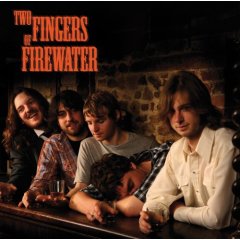
Country rock and bluegrass from Guilford, the press blurb talks about the five piece in terms of Gram, early Eagles, the Burritos and Byrds. That's a tad ambitious and banjo playing Jon Clake's slightly flat voice doesn't have the timbre or quality to warrant the comparisons. Nor is the production exactly sympathetic in the way the instruments figure in the mix, the drums far too upfront and clunky. But they certainly have a feeling for old school jangle and play up a storm on several of the tracks. Like Uncle Tupelo, they cover 20s gospel number Satan, Your Kingdom Must Come Down but throw urgent squeeze box into the train chugging rhythm while B Mando gives it some South of the Border flavours and The World Can Turn has an attractive GP honky tonk waltzing air with some keen pedal steel and mandolin. I daresay the likes of The Night Ends, the Hank sounding Endless Highway and I'm Not Sad whip up the crowd live, but if they're going to make a mark in a very competitive field, the next time they go into the studio they need to a stronger producer, punchier songs and more vocal training.
Mike Davies June 2008
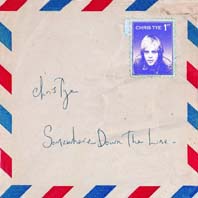
Over the past couple of years the Nuneaton born, Birmingham based singer-songwriter's been slowly building a reputation with a constant string of low key pub gigs, demos and a couple of self released EPs. I've always said his time would come and, with the release of this debut album it seems it's finally approaching.
His soul drawn to the 60s folk roots of London and Greenwich Village, Tye's blessed with a soft Buckleyesque voice that sounds like it's been on the earth forever and a guitar style than calls to mind the work of Davy Graham and Bert Jansch.
According to Tye the album's a "series of statements documenting how I became a songwriter", so fair enough then it opens with Joanne, a sadness drenched tale of lost love and one of the first songs he wrote. To the best of my knowledge, it and Electric Tracks are the only numbers to have previously surfaced on record.
Pegging itself on themes of home and change, it's not ashamed to wear its influences like a badge of honour; Like Wild Fire, a song he has as yet never played live, dates from a period listening to Van Morrison while the beautiful Come Undone is haunted by both Paul Simon and Nick Drake, Sidesteps nods to early Dylan and Beautiful Morning is coloured with tones of an ambient John Martyn.
Though most is hushed and low key, the closing Slow Sad Swing Song does show him lifting the sonics up a notch or two with scraping violin, guitar storms and jazzy drums, and it also plays out into the bonus hidden live version of Come On Everyone. He's already material recorded for the follow up, among them All There, a track that will feature contribution from Stephen Fretwell. The 'new Ed Harcourt' headlines start here.
Mike Davies, June 2006
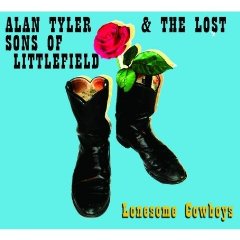
Following on from last year's So Far collection of favourites covers and self-penned reworks, the smoke and honey voiced former Rockingbirds frontman returns with an album of all new material that, once again, confirms his position among the leading lights of UK Americana. The blurb calls him alt-country, but his roots are far more old school, as can be heard in such influences as Don Williams (Rambling Girl), Merle Haggard (Something You Haven't Told Me), Willie (Time To Pay) and Waylon (Feel Better). Indeed, among the bluegrass and banjo and fiddle flavours brought by Jim Morrison, the most contemporary colour comes with a hint of the Burritos on the psychedelic tinged electric rocking folk O'er The Hill And Far Away.
With guests that include Hannah Elton-Wall of Redlands Palomino Company and fellow former Rockingbirds Sean Read and Chris Clarke, it's great crying in your beer or toe-tapping stuff, a Camden town hoe down that even Nashville natives might find it hard to distinguish from the homegrown thing. And plus points too for digging into the vaults and coming up with a cover of the splendid I'm A Gambler (complete with almost original strings arrangement), written by Pete Dello of Honeybus fame and a turntable hit back in the late 60s when he recorded it with short-lived outfit Lace.
www.alantyler.com
www.myspace.com/alantylerandthelostsonsoflittlefield
Mike Davies September 2008
Former leader of the late lamented Rockingbirds, Tyler's new solo album finds him getting back to basics, without any pressure to please anyone but himself and his fans.
Gathering his current band, The Lost Sons of Littlefield, and some other musician friends (Emily Barker among them) around a figurative weekend camp fire in fellow former Rockingbird Sean Read's living room, Tyler recorded the songs live and acoustic, putting his deep dust and smoke tones to work revisiting some personal country favourites and refurbishing old songs of his own.
Kicking things off with a quartet of country classics in the shape of If I Needed You, Luckenbach Texas (where he actually sounds like Willie Nelson), Honky Tonkin' and A Thing Called Love, it would have been easy to slip into country karaoke or pub singer territory. So, plaudits all round for making it sound more like a Grand Old Opry radio session by a bunch of mates gathered together to share their mutual love of the genre without feeling any need to reinvent the wheel.
Other covers here embrace a lovely authentic back porch reading of In The Pines, an old school Appalachian fiddled version of I'm So Lonely I Could Cry that would bring a smile to Hank's lips, a bluegrassed Gram and Emmylou styled Sweet Dream Woman and even a rework of trad folk chestnut Scarborough Fair that reconstructs it out among the Carolina pines. A personal favourite though has to be his liltingly lovely, banjo flecked cover of In Tall Buildings by the much underrated John Hartford.
It says much that Tyler's own material slots seamlessly alongside these time honoured oldies, the Bobbie Gentry referencing Gradually Learning a dreamily lazy song for a sunny day while Standing At The Doorstep Of Love could easily have been lifted from the Nelson archives. And unless you knew better, you wouldn't want to place money on the turkey trotting There's A Place In My Heart I Call Texas not being a forgotten Bob Wills or Waylon outtake.
Is it an essential album? No. But buy a copy and you'll find yourself playing it a lot more often than you'd imagine.
www.alantyler.com
www.myspace.com/alantylerandthelostsonsoflittlefield
Mike Davies December 2007
Alan Tyler - Faithful (Littlefield Records)
It's been seven years since The Rockingbirds played their farewell gig, their potential dissipated in a reputation for hard partying that overshadowed the music. Tyler went on to form Famous Times with 'birds co-singer Sean Read, but that too fell apart after two singles. Disillusioned, he shut up music biz shop in 98, content to run informal sessions in a Camden pub and muse over forming a Waylon Jennings tribute band. But then his pen got itchy again resulting in the songs that make up his solo debut an album which, with helping hands from assorted members of the old band, pedal steel man BJ Cole and guitarist Paul Lush, pretty much picks up where he left off.
The opening Everybody Is A Cowboy Now, a meditation on fame and the mythology of the Old West, may bring thoughts of Tindersticks to mind, but otherwise it's the old school old faves who colour his country most, Cash, Gram, longtime hero Jennings and, on I Will Never See The Light Of Day Again especially, Willie Nelson, albeit now informed (as with Knee High) by his recent listening to English folk performers such as the Watersons.
Tina nods the head to Townes Van Zandt, even referencing Pancho & Lefty, Nickel In A Diamond Mine (a duet with newcomer Hannah Reese) gives it some goodtiming slap bass and Did You Miss Me? Chugs along on a lonesome train rhythm, all of which succinctly encapsulate the album's musical moods and reflective themes. He's obviously on a golden streak as far as the writing goes, the album stuffed with highlights, but pushed to nominate a couple it'd have to be Ivanhoe, a true tale of a Memphis Sun Records stalwart who moved to London, got togged up in medieval clothes and set himself up as a wandering minstrel, and the closing poignant Silver Whisker. There's A Place In My Heart I Call Texas he sings on the album's good old boy stomping live recording. Close your eyes and you'll be taken there too.
Mike Davies
This Tyneside-based duo is one of the most compelling musical partnerships on the scene, and since releasing their excellent Dumb Supper album a couple of years ago they've really been "going places" with radio appearances and excellent critical feedback a-plenty. Their followup album is a further triumph of less-is-more, of integrity and genuine empathy, and once again grants us a highly concentrated and intimate musical experience that penetrates to the very rawest essence of folk tradition.
Both Phil and Cath are well-versed in exploring - and exploiting - the power of lo-fi music-making (Cath's stint as key member of punk-indie-oldtime champions Cordelia's Dad is legendary), and they maintain their uncompromising commitment to the stark and unrivalled effectiveness of bare-bones performance on this latest set, on which they assail some bastions of the traditional folk repertoire, mostly fitting the ancient texts to their own (new) melodies (the spectral Three Maidens is an exception); especially striking in this regard is their tender and surprisingly lyrical new tune for Our Captain Cried. There may sometimes be a discomforting air to their innovations, but creative authenticity is never in doubt. As ever, Cath's unassuming vocal delivery exhibits that characteristic uncanny, nigh-unnatural naturalness of expression that eerily tells the compleat story (as it were), with Phil's gently measured and economical guitar accompaniment the perfect foil, where every note and stroke tells; you really do hang on every note and nuance.
The duo's togetherness is striking, exactly mirroring each other's moves even when bar-lines are ragged around the edges (as on Imaginary Trouble, which sounds like a not-too-distant cousin of Katy Cruel), and this quality surely gives an object lesson in internal dynamics and pacing, even on the rougher, more untutored-sounding moments like the closing backporch-style Long Time Travelling. Occasionally the very basic texture of voice and guitar is augmented by a second instrumental line, as when an accordion joins in on the final verses of Dearest Dear, or when the guitar is joined by fiddle (on Castle By The Sea). And further opportunity for playful embellishment (curveball-style) is afforded by the sinisterly modal, quaintly ungainly dance-like instrumental Whip Poor Will (nice sadistic play on words there!), where a clanking banjo counterpoints the fiddle and guitar lines and is later joined by Cath lilting the tune. Whatever the level of textural activity, however, the duo's masterful interpretations always retain a heightened intrinsic clarity of vision and execution.
David Kidman May 2010
New Jersey-born Cath Tyler (née Oss), latterly relocated to the UK and domiciled with husband Phil in Newcastle, you'll remember as a key force (with Tim Eriksen) in Cordelia's Dad, that exceptional band who pioneered a gutsy marriage of punk and deep-traditional American folk of all kinds; while her pedigree as a solo interpreter of American traditional song is impeccable, she's also a well-regarded teacher of Sacred Harp singing. Phil has for some time been an important member of the indie-underground scene in Newcastle and the North-East, while he's also an expert guitarist, banjo and fiddle player whose intense knowledge and understanding of, and complete empathy with, traditional and oldtime music perfectly complements Cath's. For together they make an unrivalled team, as Dumb Supper makes abundantly clear. It's a true collaboration, forming the duo's actual official recorded debut, and is an extraordinarily fine record, one that I'd rate as arguably one of the most satisfying - and satisfyingly authentic - records of American traditional music to come out of this country in recent years. Cath and Phil's performances are driven, tight, gritty and idiomatic, exactly to the spirit and manner of their sources, containing the raw essence of the music in that primitive, hard-edged quality, that priceless immediacy of execution which Cordelia's Dad were renowned for bringing to their own stunning reworkings and reinterpretations, yet with a free-rein flexibility in line and contour that comes straight from the source singers; Cath's voice in particular is absolutely ideal in this repertoire. The actual song-titles as given on the disc's tracklist may not at the outset sound overly familiar, but many conceal enterprising (and economical) versions of Child and other ballads (the most obviously recognisable is Devil Song, an almost gleeful treatment of The Devil And The Farmer's Wife). Almost as an aside, Cath and Phil cheerfully admit they "changed some of the words and wrote some of the tunes" - which after all is the folk process in action, and totally fine by me guv! Two of the selections (Morning and Farewell My Friends) are creative adaptations of Sacred Harp pieces, while midway through the disc there's a wholly delightful (and completely authentic-sounding) original banjo tune by Phil (Yellowhammer). While the closing pair of tracks, Slumber Boats (by Alice Riley and Jessie Gaynor) and Wild Stormy Deep (by Homer Cornett), sound every bit as tho' they're traditional. Just one song (Queen Sally) is performed unaccompanied (ooh those searing voices and spine-chilling harmonies!); the vast majority of the rest are blessed with an exemplary sparse, uncluttered, close-miked accompaniment (guitar, banjo and/or fiddle in various permutations) that really sets the tone and supports the vocal part. Occasionally Cath and Phil augment these basics with jew's harp, cello, smidgens of percussion even, and there's a blast of electricity (a bolt from the heavens?) from a garage-fuzz-guitar on Morning (very Cordelia's Dad or Io, that!). Even so, the atmosphere of the whole disc is timelessly primitive and powerfully compelling, it gets thru' to you so much so that the entire disc demands immediate repeated play; it's now got to the stage that I'm reluctant to prise it out of the player and carry on with listening to other discs! Dumb Supper is distributed by Forte, by the way.
David Kidman February 2008
Gordon's latest record is unlikely to drive the proverbial old puss away, for it's a generous hour's worth of "traditional music on acoustic guitar", intelligently and straightforwardly played (ie no gimmickry) yet with abundant technical virtuosity and both respect and feeling for the material. Gordon's one of the most highly proficient guitarists on the folk scene, yet he tends to be overshadowed by the "big guns": a pity, and so this technically superb and admirably skilled new collection should be mandatory listening for aspiring guitarists wishing to hear how this music should be played. And so to the choice of material: this largely comprises English dance music of one kind or another, with (naturally!) a sizeable representation from Yorkshire (primarily, but not exclusively, from the Bowen/Shepherd collection of Joshua Jackson's music) and plenty of excellent tunes from Playford's 1651 Dancing Master. Gordon's nimble dexterity and sprightly dancing fingerwork are especially well demonstrated on selections like the set of Oxfordshire morris (Kimber) tunes Trunkles/The 29th Of May, while his feel for creative instrumental interpretation of sung balladry comes into its own on a sensitive, quite moody rendition of Lord Bateman. Dynamics are typically well-judged throughout the disc, and Gordon's playing has an acute sense of poise; his phrasing of a set of tunes from John Clare's notebook is both suitably spry and wholly delectable. As well as the English repertoire, Gordon also treats us to his adaptations of some Scottish jigs and bagpipe tunes. Ten of the album's 17 tracks are indeed "what it says on the tin" – ie. just acoustic guitar – whereas the remainder employ the odd flute or whistle and/or some gentle (electronic) percussion and a very occasional smidgen of keyboard. These textural "extras" gently enhance the presentation of the music, whereas on the other hand there are just a few instances of over-squeaky action noise on some tracks (and one or two minor engineering glitches) which mildly distract. Finally, Gordon has provided brief but informative liner notes which provide significant insights regarding the sources without overdosing on technical detail, and whose value's increased by some attractive "jackdaw" line drawings (is there no limit to this man's talents?!) and yes, an explanation of the disc's enigmatic title!
David Kidman February 2008
Gordon Tyrrall - Drive Old Puss Away (Gaho)
Stalwart of the folk scene, Leeds-based Gordon is now entering his 25th year as a full-time musician; to celebrate this, albeit not quite in the way you might expect, he's releasing this new CD. And its very soundscape is a big surprise. Typically, a Gordon Tyrrall CD would purvey (basically) deft, accomplished but gentle acoustic guitar playing with a touch of flute. But this new one opens with somewhat clunky-sounding programmed beats, only eventually ushering in a set of reels. Other tracks feature eerie electronica alongside the guitars and flute; on several Gordon plays electric guitar, and in a very fetching fashion it turns out. His skill as an instrumentalist is never in doubt, and his singing displays all the attributes normally associated with his work. But in order to provide a point of reference for all you out there, the most obvious comment I can muster is that much of this new album seems to sound more like what you may have been led to expect from the much-lauded Jim Moray – that is, if Jim only had the benefit of the experience and in-depth understanding of the tradition that Gordon so evidently has right under his belt. Naturally, Gordon's is an insider's informed approach, honed over that quarter-of-a-century, that takes into account the vast amount of water that has flown under the bridge of the folk revival, embracing infusions of country-rock, world roots and early folk-rock experimentation on through to latter-day fusion treatments. As far as the kind of material presented here goes, though, the usual variety to be expected by those who know Gordon (ie., a healthy mix of traditional and self-composed songs and a smattering of tunes) survives intact. Many of the songs will be familiar to those of us with an interest in the folk tradition, but Gordon's new versions (or variants) are communicated with a real creative insight. Gordon turns in a version of Lovely On The Water that's every bit as sublime in its own way as the classic Steeleye reworking, while he also allows himself to stretch out on a handful of the classic ballads, penetrating right to their core (any slight indulgence on The Outlandish Knight being wholly forgivable!). Then there's Gordon's own songs (four in number), which trade in philosophy and thoughtful commentaries, laced where appropriate with a healthy dose of fantasy. Backings are admirably well judged; the pithy optimism of Perfection proves an ideal closer after the lustiness of Swing Brothers Swing. Drive Old Puss Away is more than anything else a brave attempt on Gordon's part to address new (and as he admits himself, surprising) ways of performing old favourites; be mindful that so potentially bland a mission statement or summary critical appraisal hides vastly more resourcefulness than the cliché it might imply.
David Kidman
This 50-minute collection is a very fair selection that accurately presents Seán as a gifted performer with a unique voice that surely qualifies him for the epithet "master interpreter" bestowed on him in this disc's sleeve note. He has the ability to make even the most frequently-performed, even hackneyed songs sound fresh - just listen to the magic he weaves for Wild Mountain Thyme for instance, and even Bill Caddick's John O'Dreams, which reveals new layers of plaintiveness and subtlety in Seán's wonderful rendition. Also included are some of the songs which one might say have been (it seems) forever associated with Seán, like One Starry Night (which Seán co-arranged with Liam Weldon), as well as some ostensibly curious repertoire choices (like the music-hall number Side By Side). This collection closes with three of Seán's justly celebrated settings of poetry (W.B. Yeats, John Boyle O'Reilly and James Fitzharris) - highlighting yet another of the man's talents! Seán's vocal gifts are neatly counterpointed by his undoubted skills in self-accompaniment (principally on tenor guitar or mandocello), while other musicians (notably Brendan Mulligan, Liam Lewis and Davy Spillane) are brought in from time to time to very good effect. There's even one brief instrumental set along the way. The accompanying notes are good for the individual tracks, except that they don't delineate the sources of the recordings; if you don't have any of Seán's (three is it?) album releases in your collection, this probably won't matter, but it's no consolation when the box cover proudly proclaims "includes previously unreleased tracks", but you're unable to identify how many or which these are! Never mind, this is a sensibly representative and very useful introduction to the artistry of the man.
David Kidman
Veteran Canadian singer/songwriter Ian Tyson is nowadays arguably better known for his songs than from his own singing of them, although for some years he achieved a good measure of fame as a performer through his partnership with former wife Sylvia. It's no wonder that fellow-performers were queuing up for the chance to pay tribute to Ian, who has been responsible for the composition of some of the most enduring country-and-western classics of recent times. Most of his finest appear on this tribute collection, which begins stylishly with Blue Rodeo's fine take on one of Ian's earliest hits, Four Strong Winds. That would always be a hard act to follow, but Corb Lund makes a good fist of the job with MC Horses. Not only is the remainder of the roster of artists impressive, but they're appropriately chosen to match the songs, which each and every one of them performs with due respect and commitment. Gordon Lightfoot turns in a priceless rendition of Red Velvet, Chris Hillman gives us a muscular What Does She See, and David Rea tackles The Gift itself. I liked Jennifer Warnes' Blue Mountains Of Mexico, but found the arrangement a tad cloying, whereas Cindy Church's cowboy-reggae treatment of Range Delivery didn't do a lot for me. On the other hand, Tom Russell's Old Cheyenne and the McDades' Smuggler's Cove are ideally judged and sympathetic, as are (perhaps surprisingly) the contributions of Amos Garrett (Some Kind Of Fool, a song with obvious deep resonances for him) and Ramblin' Jack Elliott (Will James). Another unexpected triumph is Someday Soon (one of my own favourite Tysongs), done here with real feeling by Buddy Cage with The Circus In Flames. I can't help wondering though, why nobody saw fit to tackle Navajo Rug... for, that lone omission aside, surely no-one can complain about the 14 songs chosen for this project, a fitting tribute to a gifted writer - or the excellent quality of the performances. Oh and by the way, after the instrumental Moondancer, as a small bonus item there's a short compilation of snippets of interviews with Ramblin' Jack and Buddy Cage.
David Kidman March 2008